Srlmad-Bhagavatam

ALL GLORY TO SRI GURU AND GAURANGA
Srlmad-Bhagavatam of K�SNA-DVAIPAYANA VYASA
�(f('4Riltcnif � ��q� I q��;_ftsqf��ms�.,�li'( ����II

aham eviisam eviigre niinyad yat sad-asat param pasciid aham yad etac ca yo'vasi§yeta so'smy aham (p. 507)
 OTHER
OTHER
BOOKS
by His Divine Grace A.C. Bhaktivedanta swami Prabhupada
Bhagavad-g!tii
As It Is
Teachings of Lord Caitanya
Kr�rw, the Supreme Personality of Godhead (2 volumes)

Sr!lsopani�ad
Easy Journey to Other Planets
Krfirra Consciousness: The Topmost Yoga System
The Nectar ofDevotion
The Kr�rra Consciousness Movement is the Genuine Vedic Way
Back to Godhead Magazine (Founder)
Srimad-Bhagavatam
Second Canto
"The cosmic Manifestation"
<Part Two-Chapters 7-10>

With the Original Sanskrit Text, Its Roman Transliteration, Synonyms, Translation and Elaborate Purports by His Divine Grace

A.C.
Founder-Acarya of the International Society for Krishna Consciousness
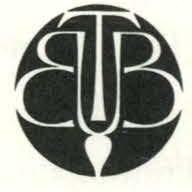
Bhaktivedanta
swami Prabhupada
THE BHAKTIVEDANTA BOOK TRUST New York· Los Angeles· London· Bombay
Readers interested in the subject matter of this book are invited by the International Society for Krishna Consciousness to correspond with its Secretary.
International Society for Krishna Consciousness
3959 Landmark Street Culver City, California 90230
© 1972 the Bhaktivedanta Book Trust
ALL RIGHTS RESERVED
Library of Congress Catalogue Card Number: 70-127183
International Standard Book Number: 0-912776-35-8
Printed by Dai Nippon Printing Co., Ltd., Tokyo, Japan

CHAPTER SEVEN
Scheduled Incarnations with Specific Functions

TABLE OF CONTENTS
Gigantic Boar Incarnation His Lordship Kapila The Four Kumaras The Spell of Womanly Attraction Prince Dhruva Maharaja Emperor l,{.�abhadeva Hayagr1va Incarnation Lord Fish Lord Tortoise Narasimhadeva The Holy Name Is Worth Chanting Vamanadeva Favors Bali Maharaja HariJ.savatara Instructs Narada Manvantara Incarnations Dhanvantari Inaugurates Medical Science Parasurama Uproots the Thorns of the Earth Srtmad Riimiiyar_ta Summarized The Lord with Beautiful Black Hair Piitana Witch Killed by Kr�l).a The Venomous Kaliya Snake Chastised Govardhana Hill Lifted by Lord Kr�l).a v 337 340 344 347 350 354 355 356 358 359 362 365 369 371 372 374 375 380 382 384 389
How Demons May Attain Salvation
The Tree of Vedic Knowledge
Kalki: the Supreme Chastiser
The Prowess of Vi9l).U
The Hoax of Altruism
Surrendering unto the Lord
The Ultimate Benefactor
Bhiigavatam in a Nutshell
CHAPTER EIGHT
The Faithful and the Infidels
The Nectar of the Message
Vi91)uratas Should Hear Srimad-Bhiigavatam
CHAPTER NINE
Answers by Citing the Lords version
One Is King

vi
Descending Process of Disciplic Succession Professional Bhiigavatam Reciters Are Useless Autumnal Rains upon Muddy Pools Home after a Troubled Journey Questions to Establish Philosophical Basis of Bhiigavatam Actions and Reactions of Karma Scientific Divisions of Human Society Common Religious Affiliations Devotees Can Defeat Mystic Yogis
Questions by King Parik�it
Ocean
Plying the Boat in the
Dreaming
Different Dresses Offered by Illusory Energy Misconceptions of "I" and "Mine" 393 394 397 400 403 405 412 416 421 425 426 428 429 436 439 441 443 445 448 452 454 457 459 461
that
Kp�l)a's Form Is Sac-cid-iinanda
Penance: the Wealth of the Briihmap.as

Transcendental Sound from the Right Source
Spiritual Sky Manifested to Lord Brahma
Conspicuous Absence of Time
Ladies Beautiful as Lightning
Intoxicating Sight of the Lord
Paramaharhsas Free From Malice
The Lord Shakes Hands with Brahma
Highest Perfectional Ingenuity
Potential Power Is Penance Only
Desiring Is the Living Symptom
l<.f�Qa Plays Like a Spider
The Pitfall of Pride
The
The
CHAPTER TEN Bhagavatam Is The Answer

vu
Paraphernalia of Devotional Service The Creator "I" and the Created "I" Take Shelter of the Light of the Lord Eyes Smeared with the Ointment of Love
Life
Dresses
Dead Men
The Ultimate Goal of
Is Vi�QU
for
The Fire Is Always Fire
Cream of Srimad-Bh(igavatam
of Life Brahma Recreates the Universe
Completely Satisfied Stage
Brahma-Sampradaya
Narada, the Dearmost Son,of His Father The
Sixteen Elementary Manifestations The Right Direction of Life 464 467 471 472 475 479 482 485 488 491 494 496 498 501 503 507 512 517 521 524 528 531 534 537 540 545 550 552


Vl.U Winding Up the Cosmic Manifestation The Supreme Fountainhead The Controller and the Controlled One Should Praise the Engineer The Glance of the Lord Sense Organs and Sense Perceptions Man Proposes and God Disposes Aural Reception of Knowledge Dutiful Occupational Sacrifice Begetting Offspring Supersoul Sits In the Heart Eternal Forms of the Lord The Almighty Father Vi�l).U The Frog in the Well Kr�Da's Pleasure Feature The Exhaling and Inhaling of Vi�l).U Intelligence Behind the Beauty Appendixes References Glossary Sanskrit Pronunciation Guide Index of Sanskrit Verses General Index 555 556 558 562 567 570 570 575 578 580 584 589 594 597 600 604 608 613 615 621 623 633

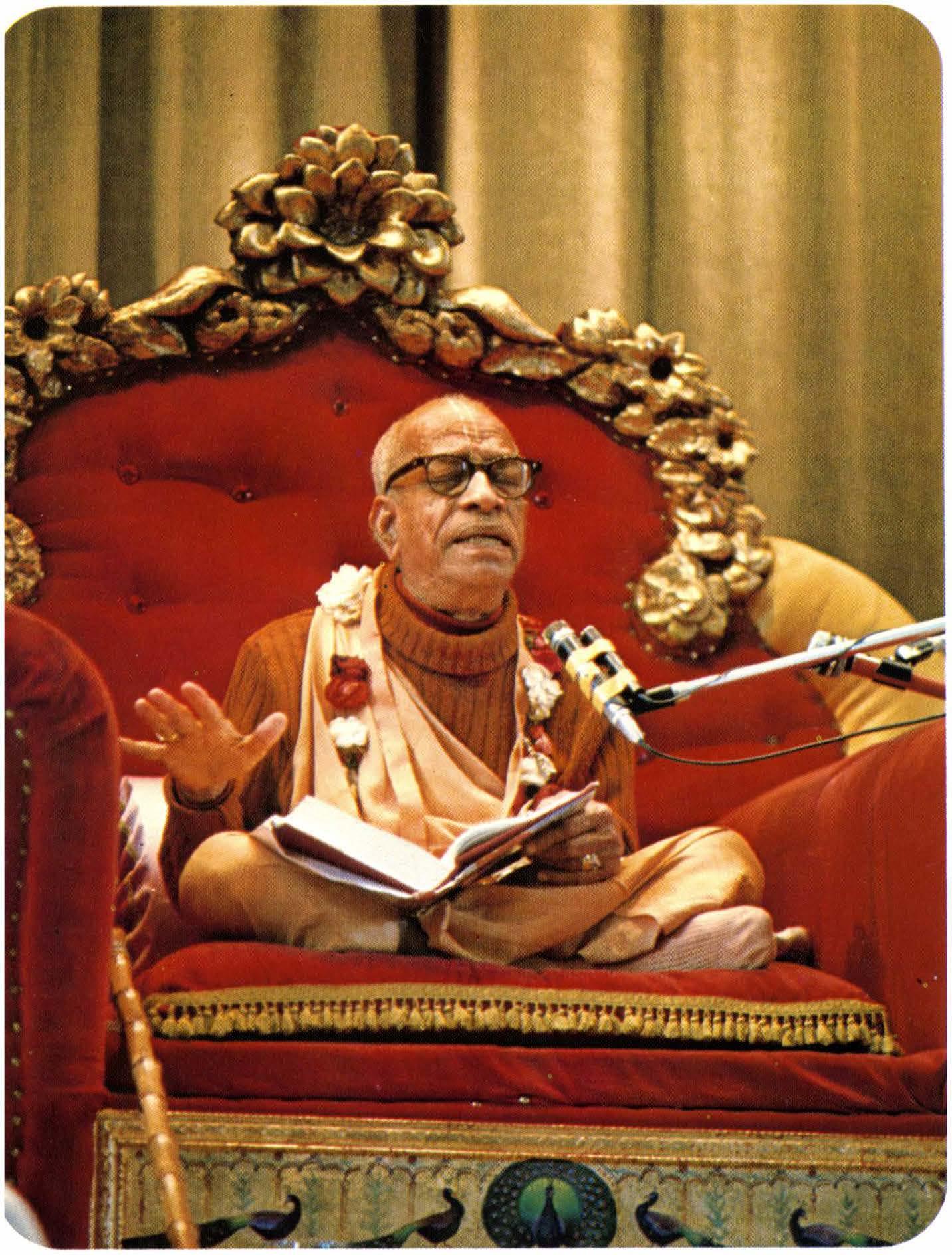 His Divine Grace
A.C. Bhaktivedanta Swami Prabhupada
His Divine Grace
A.C. Bhaktivedanta Swami Prabhupada

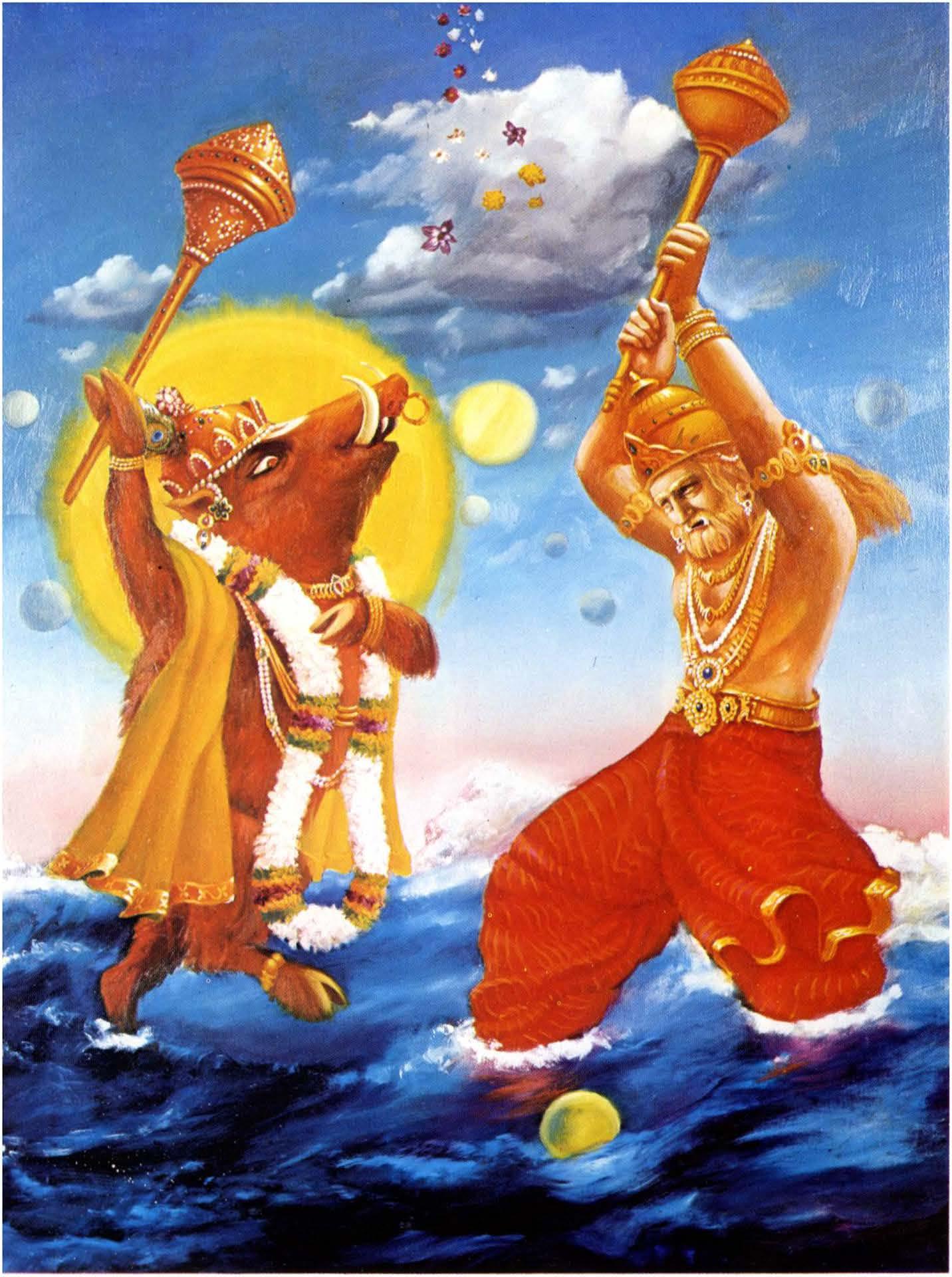 Plate 1 The Lord assumed the gigantic form of a boar and fought with the demon HiraQyiik�a. (p. 338)
Plate 1 The Lord assumed the gigantic form of a boar and fought with the demon HiraQyiik�a. (p. 338)

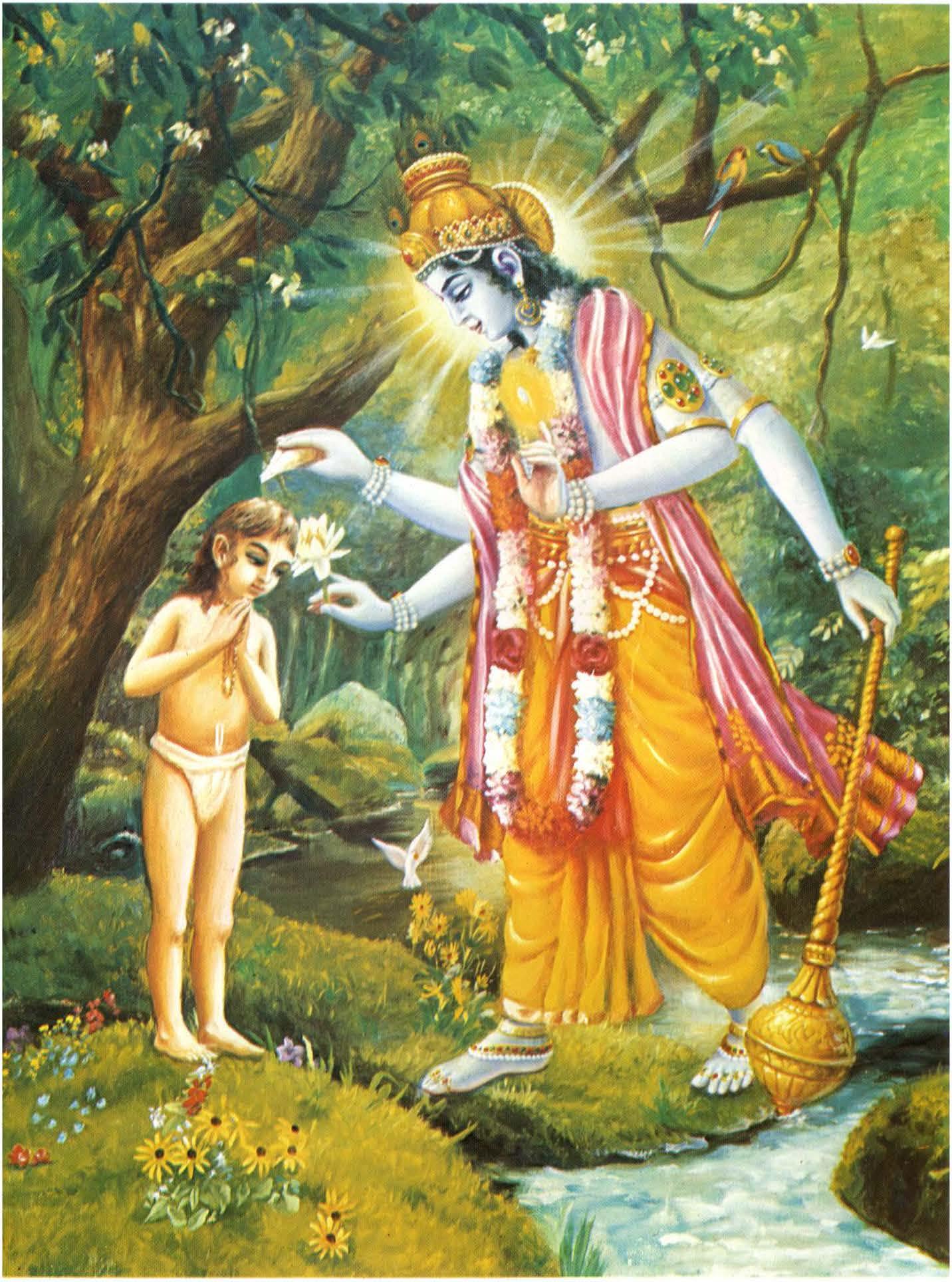 Plate 2 Dhruva Maharaja is benedicted by the Personality of Godhead. (p. 350)
Plate 2 Dhruva Maharaja is benedicted by the Personality of Godhead. (p. 350)
Plate 3
To help the demigods, the primeval Lord assumed the incarnation of a gigantic tortoise, swimming in the ocean of milk. (p. 358)
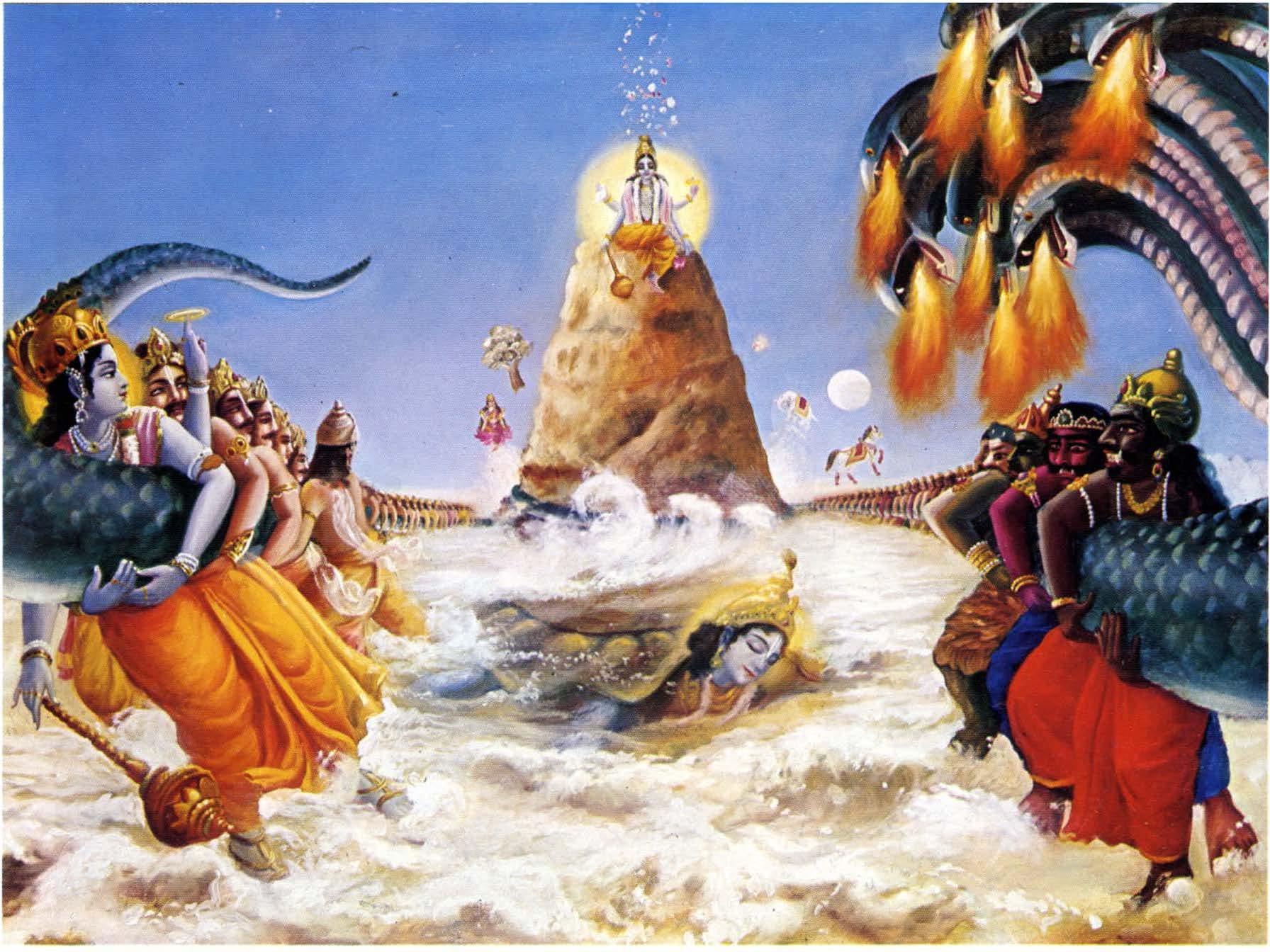


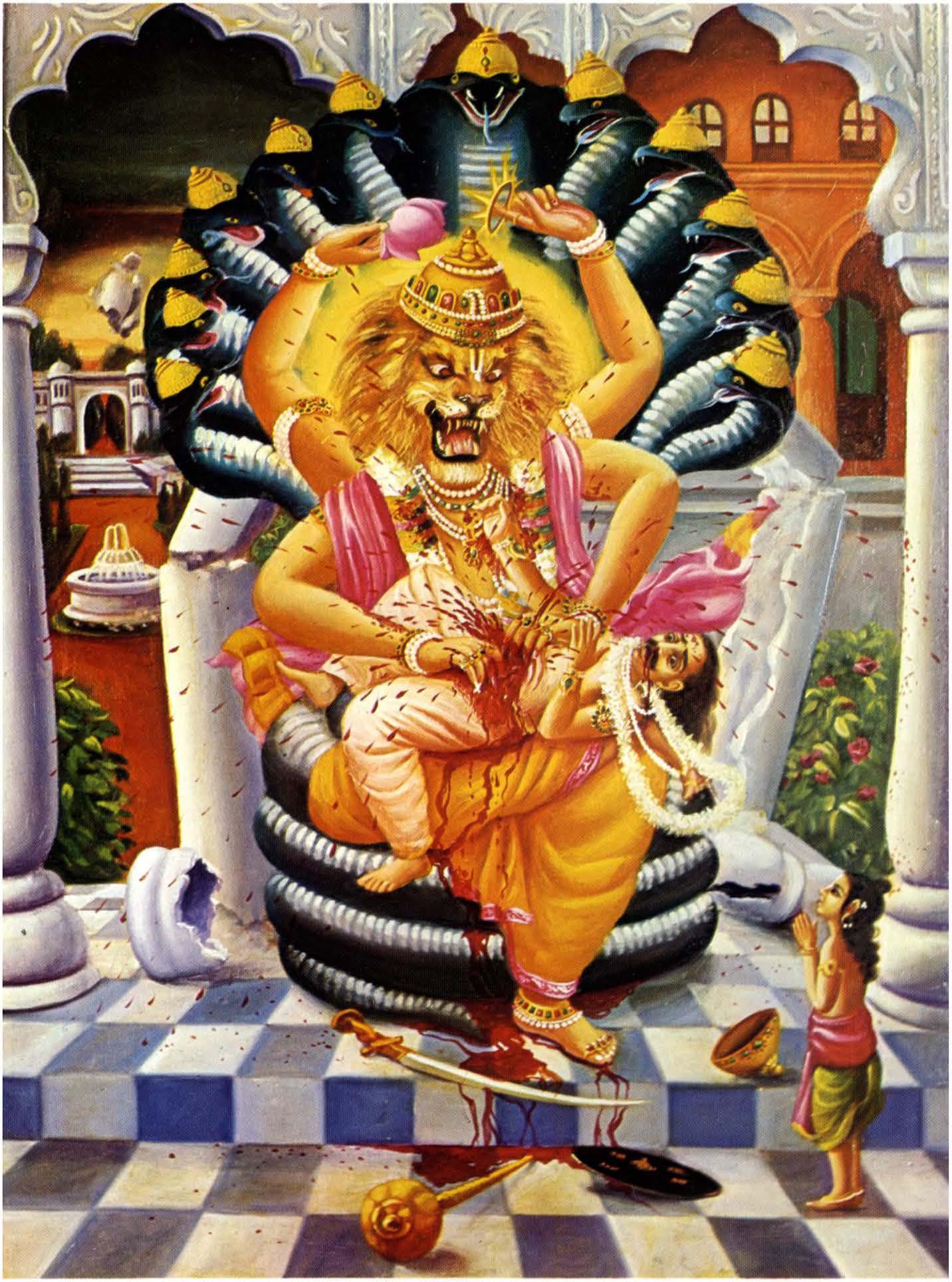 Plate 4 The Personality of Godhead Narasinihadeva killed the demon Hiral)yakasipu by piercing him with His nails. (p. 359)
Plate 4 The Personality of Godhead Narasinihadeva killed the demon Hiral)yakasipu by piercing him with His nails. (p. 359)

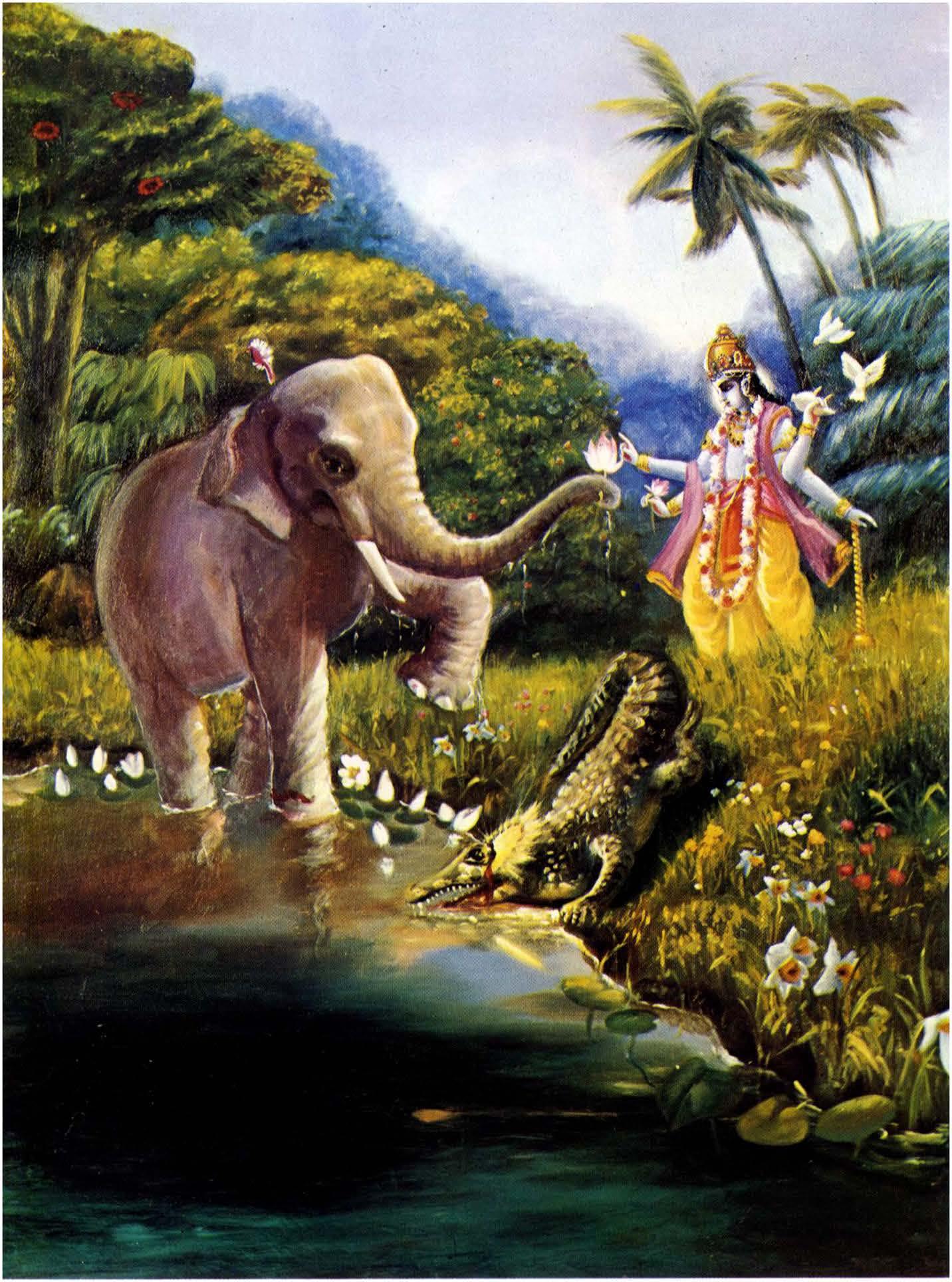 Plate 5 After hearing the elephant's plea, the Lord cut the mouth of the crocodile to save the elephant. (p. 364)
Plate 5 After hearing the elephant's plea, the Lord cut the mouth of the crocodile to save the elephant. (p. 364)
Maharaja wasvery glad to receive the Lord'sremaining step onhishead.
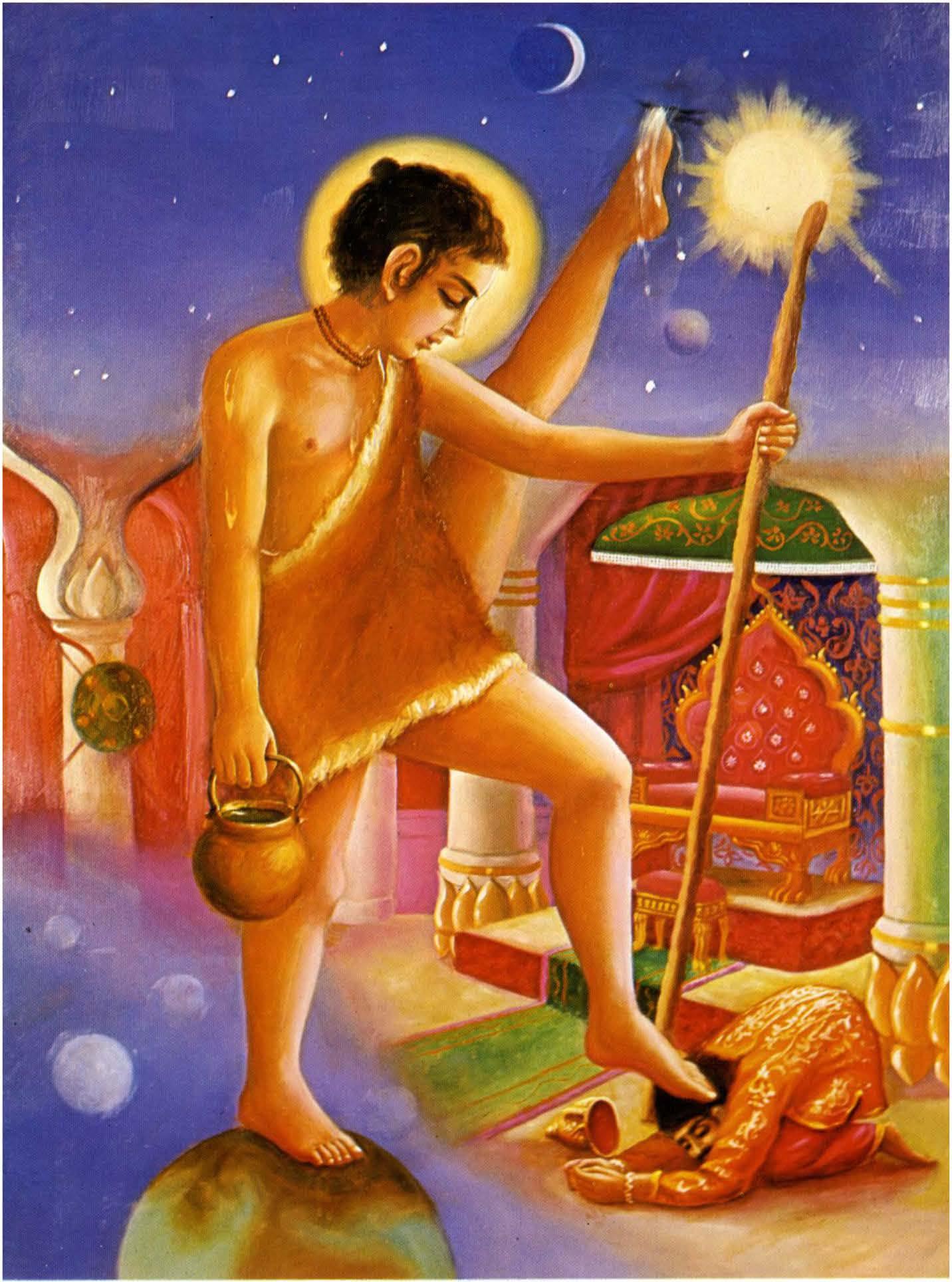
 Plate6 Bali
(p. 366}
Plate6 Bali
(p. 366}

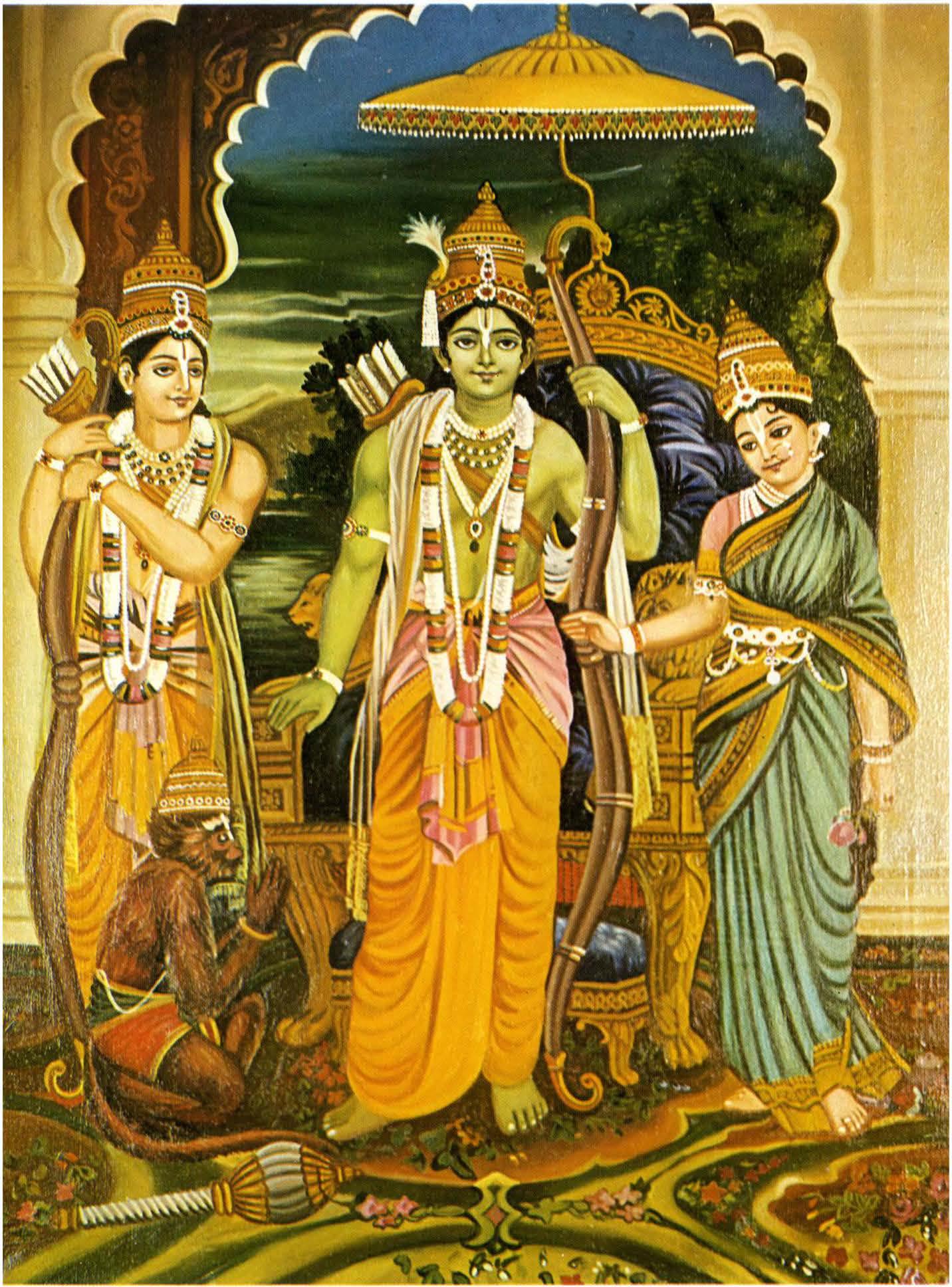 Plate 7 Lord Ramacandra appeared along with His eternal consort Sfta, brother Lak�maQa and servant Hanuman. (p. 375)
Plate 7 Lord Ramacandra appeared along with His eternal consort Sfta, brother Lak�maQa and servant Hanuman. (p. 375)
Plate 8
ln order to diminish the burden of the world, Lord Kt�Qa appeared with His immediate expansion Lord Balariima. (p. 381)
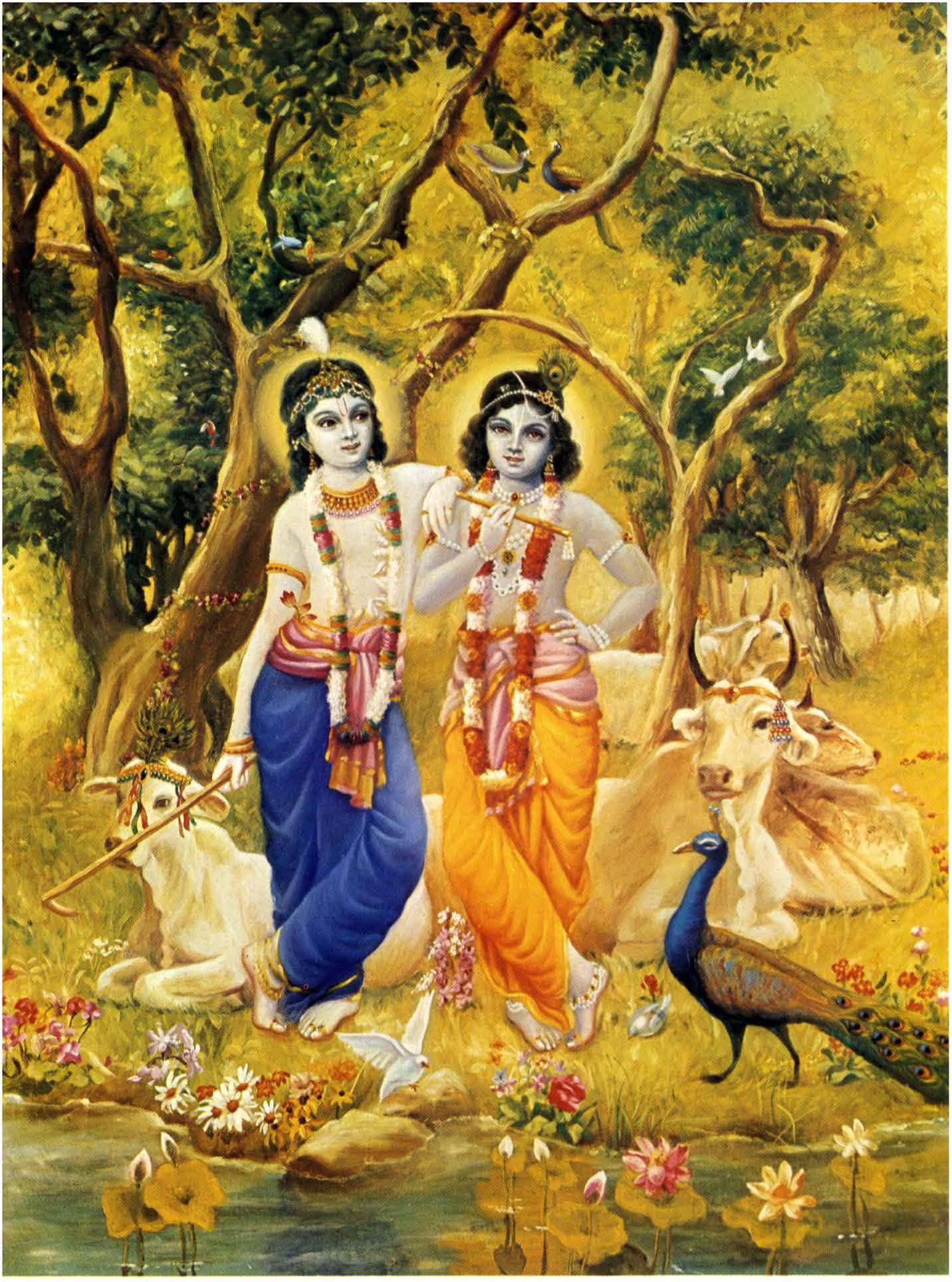


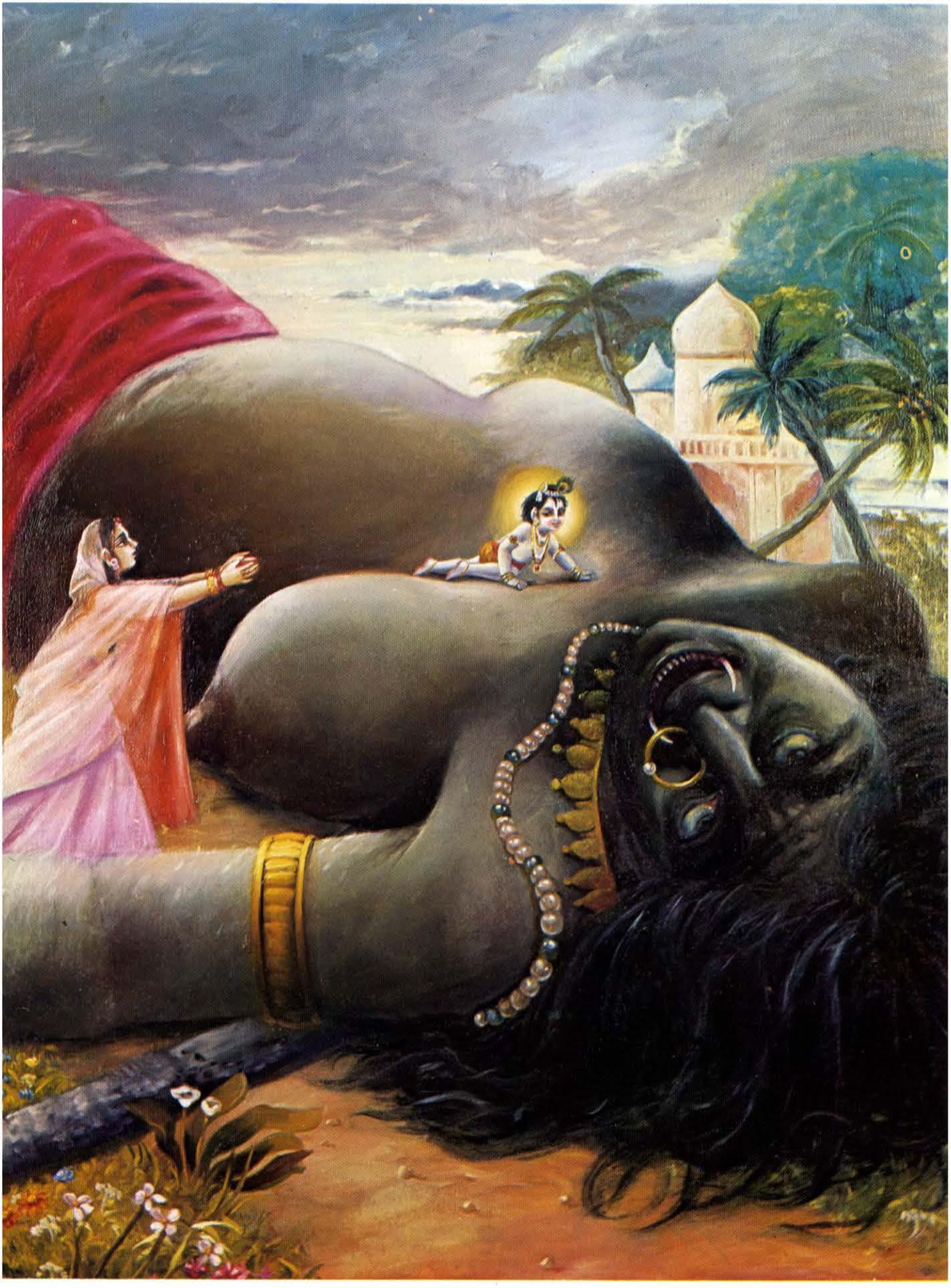 Plate 9 The Lord sucked the breast of the Putana witch along with her life air, and the demon's gigantic body fell down. (p. 383)
Plate 9 The Lord sucked the breast of the Putana witch along with her life air, and the demon's gigantic body fell down. (p. 383)

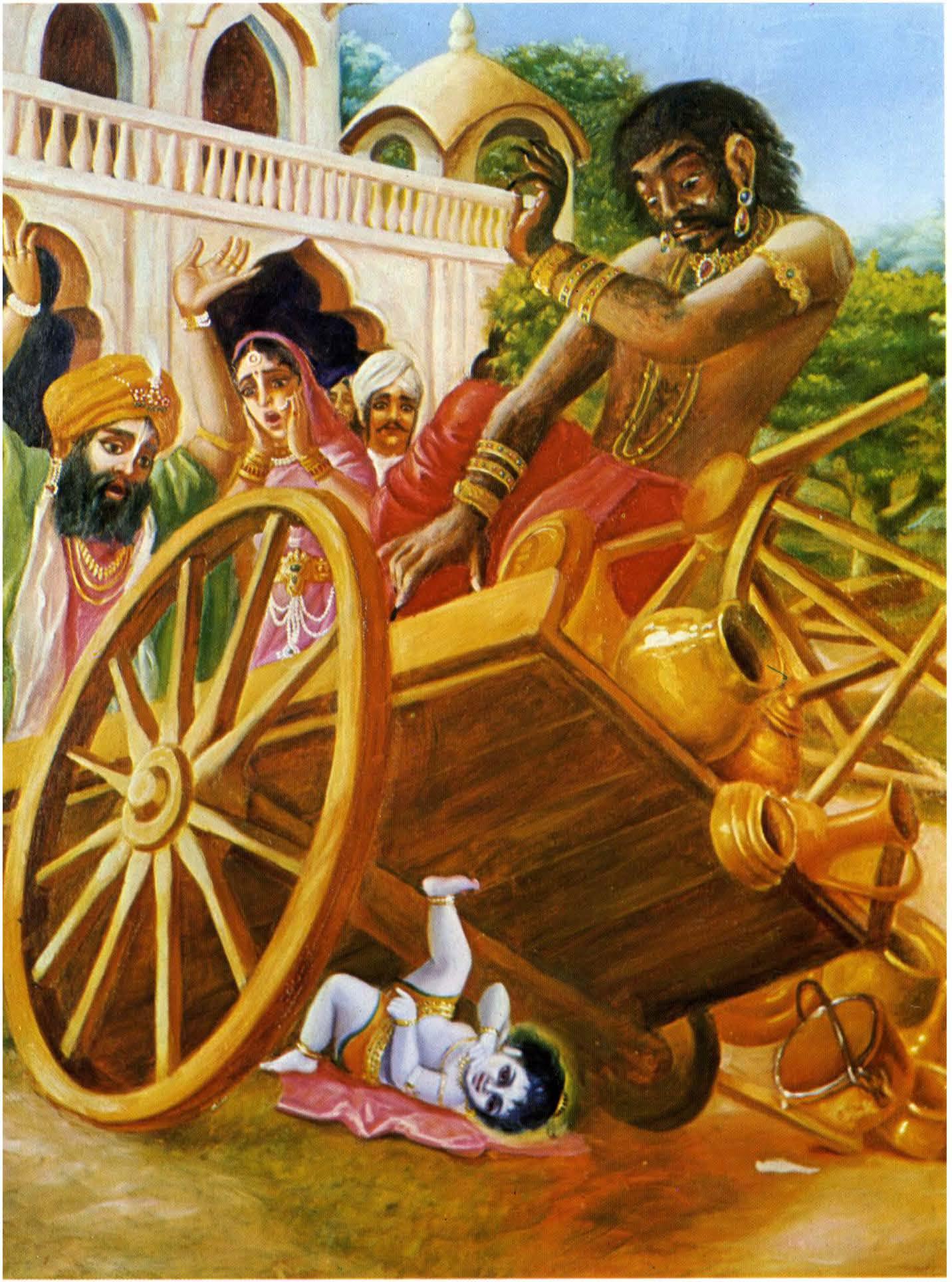 Plate 10 At the age of three months, Lord Kmta killed the Sakatasura demon, who had remained hldden behind a cart. (p. 383)
Plate 10 At the age of three months, Lord Kmta killed the Sakatasura demon, who had remained hldden behind a cart. (p. 383)

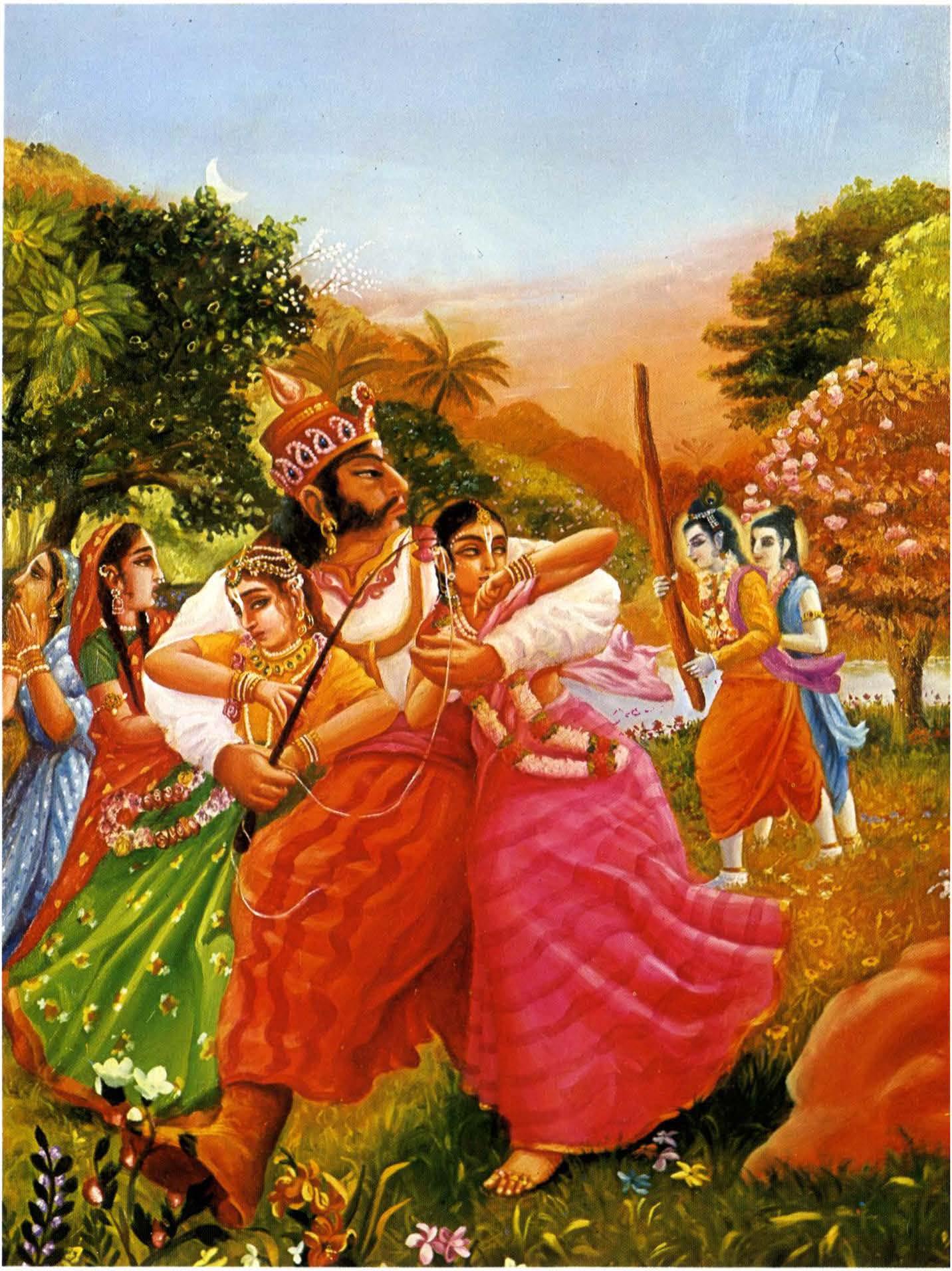 Plate 11 A demon of the name Sarikhaclic;!a tried to kidnap Kr�t;�a's cowherd damsels. (p. 391)
Plate 11 A demon of the name Sarikhaclic;!a tried to kidnap Kr�t;�a's cowherd damsels. (p. 391)

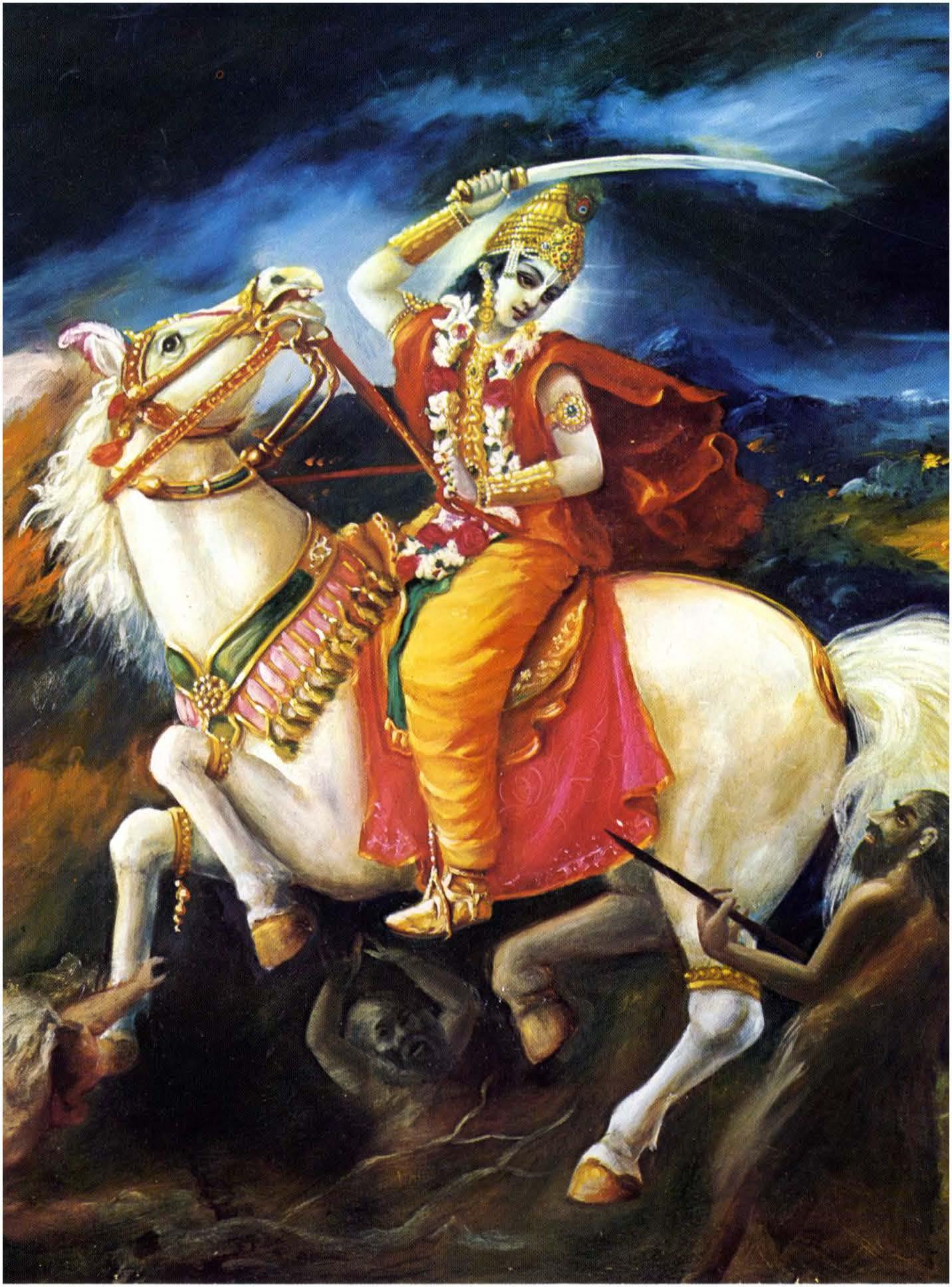 Plate 12
At the end of Kali-yuga the Lord appeared as the supreme chastiser. (p. 397)
Plate 12
At the end of Kali-yuga the Lord appeared as the supreme chastiser. (p. 397)
CHAPTER SEVEN
ScheduledIncarnations withSpecificFunctions
brahmoviica yatrodyata[l. k§iti-taloddhararziiya bibhrat krau!lim tanum sakala-yajiia-mayim ananta[l. antar-mahiirrzava upiigatam iidi-daityam tam darh§trayiidrim iva vajra-dharo dadiira

brahmii uviica-Lord Brahmii said;yatra-at that time (when); udyata[l.attempted; k§iti-tala-the earthly planet; uddhararziiya-for the matter of lifting; bibhrat-assumed; krau!lim-pastimes ; tanum-form; sakala-total; yajiia-mayim-all-inclusivesacrifices; ananta[l.-theUnlimited; antar-within the universe; mahii-arrzave-the great Garbha Ocean; upiigatam-having arrived at; adi-the first; daityam-demon; tam-him; darh§traya-by the tusk; adrim-the flying mountains; iva-like ; vajra-dhara[l.-the controller of the thunderbolts; dadiira-pierced.
TRANSLATION
Lord Brahma said: At the time when the unlimitedly powerful Lord assumed the form of a boar as a pastime, just to lift up the earthly planet, which was drowned in the great ocean of the universe called the Garbhodaka, the first demon [Hira�ya�a] appeared, and the Lord pierced him with His tusk.
TEXT 1 �&tsm:r �mn ��IJIFf � sttif ���;r.:Q: �� �'Wliji{rn:�� ij ���tfaflrcr �� � II � II
337
PURPORT

Since the beginning of creation, the demons and the demigods or the Vai��avas are always the two classes of living beings to dominate the planets of the universes. So Lord Brahma is the first demigod, and Hira�yak§a is the first demon in this universe. Only under certain conditions do the planets float as weightless balls in the air, and as soon as these conditions are disturbed, the planets may fall down in the Garbhodaka Ocean which covers half the universe. The other half is the spherical dome within which the innumerable planetary systems exist. The floating of the planets in the weightless air is due to the inner constitution of the globes, and the modernizeddrilling of the earth to exploit oil from within is a sort of disturbance by the modern demons resulting in a greatly harmful reaction of the floating condition of the earth. A similar disturbance was created formerly by the demons headed by Hira�yak�a (the great exploiter of the gold rush), and the earth was detached from its weightless condition and fell down into the Garbhodaka Ocean. The Lord, as the maintainer of the whole creation of the material world, therefore assumed the gigantic form of a boar with a proportionate snout and picked up the earthly planet from within the water of Garbhodaka. Sri Jayadeva Gosvami, the great V ai��ava poet, sang as follows:
vasati dasana-sikhare dharari tava lagnii
sasini kalanka-kaleva nimagnii
kesava dhrta-siikara-riipa
jaya jagadisa hare.
"0 Kesava! 0 Supreme Lord who has assumed the form of a boar! 0 Lord! The earthly planet rested on Your tusks, and it appeared like the moon engraved with spots."
Such is the symptom of an incarnation of the Lord. The incarnation of the Lord is not the concocted idea of a fanciful class of men who create an incarnation out of imagination. The incarnation of the Lord appears under certain extraordinary circumstances like the above-mentioned occasion, and the incarnation performs a task which is not even imaginable by the tiny brain of mankind. The modern creators of the many cheap incarnations may take note of the factual incarnation of God as the gigantic boar with a suitable snout to carry the earthly planet.
When the Lord appeared to pick up the earthly planet, the demon of the name Hira�yak§a tried to create a disturbance in the methodical functions of the Lord, and therefore he was killed by being pierced by the Lord's tusk. According to Srila ]iva Gosvami, the demon Hira�J.yiik§a was killed by the hand of the Lord. Therefore his version is that after being
338 Srimad-Bhagavatam [Canto 2, Ch. 7
killed by lhc hand of the Lord, the demon was pierced by the tusk, and Srila Visvanatha Cakravartl Thakur confirms this version.
TEXT 2

jiito rucer ajanayat suyamiin suyajiia iikuti-sunur amariin atha dak§i[Liiyiim loka-trayasya mahatim aharad yadiirtirh sviiyambhuvena manunii harir ity anukta[l.
jiitafi.- was born; ruce[l-of the wife of Prajapati; ajanayat-gave birth; suyamiin-headed by Suyama; suyajiia[l.-Suyaj ii.a; iikuti-siinur-of the son of Akuti; amariin-the demigods; atha-thus; dak§irtiiyiim-unto the wife of the name DakJ?iJ;�ii; loka-the planetary systems; trayasya- of the three; mahatim-very great; aharat-diminished; yat-all those; iirtim- distresses; sviiyambhuvena-by the Manu named Svayambhuva; manunii- by the father of mankind; hari[l.- Hari; iti-thus; anukta[l.-named.
TRANSLATION
:rhe Prajapati first begot Suyajiia, in the womb of his wife Akiiti, and then Suyajria begot demigods, headed by Suyama, in the womb of his wife Dak�iJ;Iii. Suyajria, as the lndradeva, diminished very great miseries in the three planetary systems (upper, lower andintermediate), and because he so diminished the miseries of the universe, he was later called Hari by the great father of mankind, namely Svayambhuva Manu.
PURPORT
J n order to guard against the invention of unauthorized incarnations of God by lhc fanciful less intelligent persons, the name of the father of the bona fide incarnations is also mentioned in the authorized revealed scriptures. No one, therefore, can be accepted as an incarnation of the Lord if hi father's name, as well as the name of the village or place in which he appears, is not mentioned by the authorized scriptures. In the BhiigavataPuriira the name of the Kalki incarnation, which is to take place in almost
Text 21 Scheduled Incarnations with Specific Functions 339
������ �� �'Pirn:�TRY ��;nrnffi�:ll
illret �;p;rq_W1ill'l�
�II
400,000 years, is mentioned along with the name of His father and the name of the village in which He will appear. A sane man, therefore, does not accept any cheap edition of incarnation without reference to the authorized scriptures. TEXT
jajiie ca kardama-grhe dvija devahutyiim stn""bhi{!, samam navabhir iitmagatirh sva-miitre uce yayiitma-samalam gur-a-sanga-pankam asmin vidhUya kapilasya gatim prapede
jajiie-took birth; ca-also; kardama-the Prajapati·named Kardama; grhe-in the house of; dvija-0 briihmar.a; devahutyiim-in the womb of Devahuti; stn""bhi{!, - by women; samam-accompanied by; navabhi[l,-by nine; iitma-gatim- spiritual realization; sva-miitre-unto His own mother; uce-uttered; yayii-by which; iitma-samalam- coverings of the spirit soul; gur.a-saliga- associated with the modes of nature; palikam-mud; asminthis verylife; vidhuya-beingwashed off; kapilasya-of Lord Kapila; gatimliberation; prapede- achieved.





TRANSLATION
The Lord then appeared as the Kapila incarnation, being the son of the prajapati brahmal).a Kardama and his wife Devahuti, along with nine other women [sisters]. He spoke to His mother about self-realization, by which, in that very lifetime, she became fully cleansed of the mud of the material modes and thereby achieved liberation, the path of Kapila.
PURPORT
The instructions of Lord Kapila to His mother Devahuti are fully described in the Third Canto (Chapters 25-30) of the Srimad-Bhiigavatam,
340 Srimad-Bhagavatam [Canto 2, Ch. 7
� " "" • :q � �t:4�5tfl �'TM:«ti;w�ffi� I �� �<:i{�l440 ����wrrtfifq�t'fffi�
� II
3
II
and anyone who follows the instructions can achieve the same liberation obtained by Devahuti. The Lord spoke Bhagavad-gita, and thereby Arjuna achieved self-realization, and even today anyone who follows the path of Arjuna can also attain the same benefit as Sri Arjuna. The scriptures are meant for this purpose. Foolish unintelligent persons make their own interpretations by imagination and thus mislead their followers, causing them to remain in the dungeonof material existence. However, simply by following the instructionsimpartedby Lord Kr��a or Lord Kapila,one can obtain thehighest benefit, even today.

The word iitma-gatim is significant in the sense of perfect knowledge of the Supreme. Oneshould notbe satisfied simplyby knowing the qualitative equality of the Lord and the living being. One should know the Lord as much as can be known by our limited knowledge. It is impossible for the Lord to beknown perfectly as He is,even by such liberated persons as Siva or Brahmii, so whatto speak of other demigods or menin this world. Still, by following the principles of the great devotees and the instructions available in the scriptures, one can know to a considerable extent the features of the Lord. His Lordship Kapila, the incarnation of the Lord, instructed His mother fully about the personal form of the Lord, and thereby she realized the personal form of the Lord and was able to achieve a place in the Vaikurthaloka where Lord Kapila predominates. Every incarnation of the Lord has His own abode in the spiritual sky. Therefore Lord Kapilaalso has Hisseparate V aiku�tha planet. The spiritual sky is not void. There are innumerable Vaiku�tha planets, and in each of them the Lord,by His innumerable expansions,predominates,and thepure devotees who are there also live in the same style as the Lord and His eternal associates.
When the Lord descends personally or by His personal plenary expansions, such incarnations are called aritsa, kala, gura, yuga, and manvantara incarnations, and when the Lord's associates descend by the orderof the Lord, such incarnations are called saktyavesa incarnations. But in allcases all the incarnations are supported by the invulnerable statements of the authorized scriptures, and not by any imagination of some self-interested propagandist. Such incarnations of the Lord, in either of the above categories, always declare the Supreme Personality of Godhead to be the ultimate truth. The impersonal conception of the supreme truth is just a process of negationof the formof the Lord from the mundane conception of the supreme truth.
The living entities, by their very constitution, are spiritually as good as the Lord, and the only difference between them is that the Lord is always
Text 3] Scheduled Incarnations with Specific Functions 341
supreme and pure, without contamination by the modes of material nature, whereas the living entities are apt to be contaminated by association \>\<'ith the material modes of goodness, passion and ignorance. This contamination by the material modes can be washed off completely by knowledge, renunciation and devotional service. Devotional service to the Lord is the ultimateissue, and therefore those who aredirectly engaged in the devotional service of the Lord do not only acquire the necessary knowledge in spiritual science, but also attain detachment from material connection and are thus promoted to the kingdom of God by complete liberation, as is stated in the Bhagavad-g'itii (Bg. 14.26):
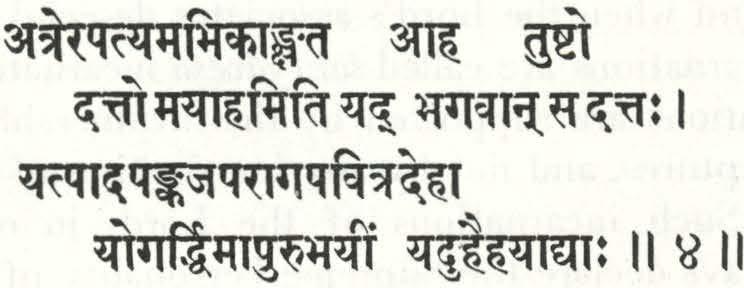
miim ca yo· 'vyabhiciirerta bhakti-yogena sevate sa gurtiin samat'ityai 'tan brahma-bhiiyiiya kalpate
Even in the nunliberated stage, a living entity can be directly engaged in thetranscendentalloving service ofthe Personality of Godhead Lord Kr��a or His plenary expansions Rama, N arasimha, etc. Thus, with the proportionate improvement of such transcendental devotional service, the devotee makes definite progress in the matter of brahma-gati, or iitma-gati, and ultimately attains kapilasya gati, or the abode of the Lord, without difficulty. The antiseptic potency of devotional service to the Lord is so great that it can neutralize the material infection even in the present life of a devotee. A devotee does not need to wait for his next birth for completeliberation.
TEXT 4

atrer apatyam abhikiink§ata iiha tu§to datto mayiiham iti yad bhagaviin sa datta{l
yat-piida-pankaja-pariiga-pavitra-dehii yogarddhim iipur ubhay'im yadu-haihayiidyii[l.
342 Srimad-Bhagavatam [Canto 2, Ch. 7
atref!,-of the sage Atri; apatyam-issue;abhikiilik§ataf!,-having prayed for;aha-said it; tu§tafl-being satisfied; dattaf!,-given over;mayii-by me; aham-myself; iti-thus; yat-because; bhagavan-the Personality of Godhead; saf/,-He; dattaf!,-Dattatreya; yat-pada-one whose feet; pankajalotus;pariiga-dust;pavitra-purified;dehiif!,-body;yoga-mystic; rddhimopulence; apuf!,-got; ubhayim-for both the worlds; yadu-the father of the Yadu dynasty;haihaya-adya�-and others, like King Haihaya.

TRANSLATION
The great sage Atri prayed for offspring, and the Lord, being satisfied with him, promised to incarnate as Atri's son, Dattatreya [Datta, the son of Atri]. And by the grace of the lotus feet of the Lord, many Yadus, Haihayas, etc., became so purified that they obtained both material and spiritual blessings.
PURPORT
Transcendental relations between the Personality of Godhead and the livingentities are eternally established infivedifferent affectionate humors, which are known as santa, dasya, sakhya, vatsalya and madhurya. The sage Atri was related with the Lord in the affectionate vatsalya humor, and therefore, as a result of his devotional perfection, he was inclined to have the Personality of Godhead as his son. The Lord accepted his prayer, and He gave Himself as the son of Atreya. Such a relation of sonhood between the Lord and His pure devotees can be cited in many instances. And because the Lord is unlimited, He has an unlimited number of fatherdevotees. Factually the Lord is the father of all living entities, bul out of transcendental affection and love between the Lord and His devotees, the Lord takes more pleasure in becoming the son of a devotee than in becoming one's father. The father actually serves the son, whereas the son only demands all sorts of services from thefather; therefore a pure devotee who is always inclined to serve the Lord wants Him as the son, and not as the father. The Lord also accepts such service from the devotee, and thus the devotee becomes more than the Lord. The impersonalists desire to become one with the Supreme, but the devotee becomes more than the Lord, surpassing the desire of the greatest monist. Parents and other relatives of the Lord achieve all mystic opulences automatically because of their intimate relationship with the Lord. Such opulences include all
Text 4] Scheduled Incarnations with Specific Functions 343
details of material enjoyment, salvation and mystic powers. Therefore, the devotee of the Lord does not seek them separately, wasting his valuable time inlife. The valuable time of one's tife must therefore be fully engaged in the transcendental loving service of the Lord. Then other desirable achievements are automatically gained. But even after obtaining such achievements one should be on guard against the pitfall of offenses at the feet of the devotees. The vivid example is Haihaya, who achieved all such perfection of devotional service but, because of his offense at the feet of a devotee, was killed by Lord Parasurama. The Lord became the son of the great sage Atri and became known as Dattatreya.
TEXT 5

taptarh tapo vividha-loka-sisrk§ayii me iidau saniit sva-tapasa[l. sa catu[l.-sano 'bhut priik-kalpa-samplava-vina§tam ihiitma-tattvarh samyag jagiida munayo yad acak§atiitman
taptam-having undergone austerities; tapa[l-penance; vividha-lokadifferent planetary systems; sisrk§ayii-desiring to create; me-of mine; iidau-at first; saniit-from the Personality of Godhead; sva-tapasa[l.-by dint of my own penances; sa[!.-He, the Lord; catu[l.-sana[l.-the four bachelors named Sanat-kumara, Sanaka, Sanandana and Sanatana; abhiitappeared; priik-previous; kalpa-creation; samplava-in the inundation; vina§tam-devastated; iha-in thismaterial world; iitma-the spirit; tattvam -truth; samyak- incomplete; jagiida-becamemanifested; munaya[l.- sages; yat-that which; acak§ata-saw clearly; iitman-the spirit.
TRANSLATION
In order to create different planetary systems I had to undergo austerities and penance, and the Lord, thus being pleased with me, in-
344 Srimad-Bhagavatam [Canto 2, Ch. 7
��wit�it 31�ij'ffi{_�ij: � :qij!ij;ft�I �q('t+gt4�@:+RI� �������11�11
"'
carnated in four sanas [Sanaka,
Sanatkumara, Sanandana and Sanatana].
In the previous creation the spiritual truth was devastated, but the four sanas explained it so nicely that the truth at once became clearly -perceivedby the sages.

PURPORT
In the Vi.§r-u-sahasra-niima prayers there is a mention of the Lord's name as saniit and saniitanatama. The Lord and the living entities are both qualitatively saniitanam, or eternal, but the Lord is saniitanatama or the eternal in the superlative degree. The living entities are positively saniitanam, but not superlatively because the living entities are apt to fall to the atmosphere of noneternity also. Therefore, the living entities are quantitatively different from the superlative saniitana, the Lord.
The word san is also.used in the sense of charity; therefore when everything is given up in charity unto the Lord, the Lord reciprocates by giving Himself unto the devotee. This is confirmed in the Bhagavad-gitii also (Bg. 4.11): ye yathii miim prapadyante. Brahmaji wanted to create the whole cosmic situation as it was in the previous millennium, and because, in the last devastation, knowledge of the Absolute Truth was altogether erased from the universe, he desired that the same knowledge again be -renovated; otherwise there would be no meaning in the creation.Because there is prime necessityfor transcendentalknowledge, the ever-conditioned souls are given a chance for liberation in every millennium of creation. This mission of Brahmaji was fulfilled by the grace of the Lord when the four sanas, namely Sanaka, Sanatkumara, Sanandana, and Sanatana, appeared as his four sons. These four sanas were incarnations of the knowledge of the Supreme Lord, and as such they explained transcendental knowledge so explicitly that all the sages could at once assimilate this knowledge without the least difficulty. By following in the footsteps of the four Kumaras, one can at once see the Supreme Personality of Godhead within oneself. TEXT
Text 6] Scheduled Incarnations with Specific Functions 345
6 � ���R! � ;m:r:run � �fij �:�f.{: 1 t�l�+t�l� f9ttt+tltt€tti �O'lf@fif��;n��wtfl: II �II
dharmasya dak§a-duhitary-ajanUjta murtyiim niiriiyap,o nara iti sva-tapal) prabhiival)

dr§tviitmano bhagavato niyamiivalopam devyas tv ananga-prtanii ghatitum na sekuft
dharmasya-of Dharma (the controller of religious principles); dak§aDa�a, one of the Prajapatis; duhitari-unto the daughter; ajani:}ta-took birth; murtyiim-of the name Murti; niiriiyap,a[l-Naray�a; naraft-Nara; iti-thus; sva-tapa/)-· personal penances; prabhiivaft-strength; dntvii- by seeing; iitmanal)-of His own; bhagavata[l-of the Personality of Godhead; niyama-avalopam-breaking the vow; devyaft- celestial beauties; tu-but; ananga-prtana[l-companion of Cupid; ghatitum-to happen; na-never; sekuft-made possible.
TRANSLATION
In order to exhibit His personal way of austerity and penance, He appeared in twin forms as Naraya�a and Nara in the womb of Miirti, the wife of Dharma and the daughter of D�a. Celestial beauties, the companions of Cupid, went to try to break His vows, but they were unsuccessful, for they saw that many beauties like them were emanating from Him, the Personality of Godhead.
PURPORT
The Lord, being the source of everything that be, is the origin of all austerities and penances also. Great vows of austerity are undertaken by sages to achieve success in self-realization. Human life is meant for such tapasya, with the great vow of celibacy or brahmacarya. In the rigid life of tapasya, there is no place for the association of woman. And because human life is meant for tapasya, for self-realization, factual human civilization, as conceived by the system of saniitana-dharma or the school of four castes and four orders of life, prescribes rigid dissociation from woman in three stages of life. In the order of gradual cultural development, one's life may be divided in four divisions: celibacy, household life, retirement, and renunciation. During the first stage of life, up to twentyfive years of age, a man may be trained as a brahmaciiri under the guidance of a bona fide spiritual master just to understand that woman is the real binding force in the material existence. If anyone wants to get freedom from the material bondage of conditional life, he must get free from the
346 Snmad-Bhagavatam [Canto 2, Ch. 7
attraction for the form of woman. Woman, or the fair sex, is the enchanting principle for the living entities, and the male form, especially of the human being, is meant for self-realization. The whole world is moving under the spell of womanly attraction, and as soon as a man becomes united with a woman, he at once becomes a victim of material bondage under a tight knot. The desires for lording it over the material world, under the intoxication of a false sense of lordship, specifically begin just after the man's unification with a woman. The desires for acquiring a house, possessing land, having children and becoming prominent in society, the affection for community and the place of birth, and the hankering for wealth, which are all like the phantasmagoria or illusory dreams of life, encumber a human being, and he is thus impeded in his progress toward self-realization, the real aim of life. The brahmaciiri, or a boy from the age of five years, especially from the higher castes, namely from the scholarly parents (the briihmar-as), the administrative parents (the k§atriyas), or the mercantile or productive parents (the vai.Syas), is trained until twenty-five years of age under the care of a bona fide guru or teacher, and under strict observance of discipline he comes to understand the values of life along with taking specific training for livelihood. The brahmaciiri is then allowed to go home and enter householder life and get married to a suitable woman. But there are many brahmaciiris who do not go home to become householders but continue the life of nai§thika-brahmaciiris, without any connection with women. They accept the order of sannyiisa, or the renounced order of life, knowing well that combination with women is an unnecessary burden that checks self-realization. Since sex desire is very strong at a certain stage of life, the guru may allow the brahmaciiri to marry; this license is given to a brahmaciiri who is unable to continue the way of nai§thikabrahmacarya, and such discriminations are possible for the bona fide guru. A program of so-called family planning is needed. The householder who associates with woman under scriptural restrictions, after a thorough training of brahmacarya, cannot be a householder like cats and dogs. Such a householder, after fifty years of age, would retire from the association of woman as a viinaprastha to be trained up to live alone without the association of woman. When the practice is complete, the same retired householder becomes a sannyiisi, strictly separate from woman, even from his married wife. Studying the whole scheme of disassociationfrom women, it appears that a woman is a stumbling block for self-realization, and the Lord appeared as Narayai:la to teach the principle of womanly disassociation with a vow in life. The demigods, being envious of the austere life of the rigid brahmaciiris, would try to cause them to break their vows by dis-

Text 6] SchedUled Incarnations with Specific Functions 347
patching soldiers of Cupid. But in the case of the Lord, it became an unsuccessful attempt when the celestial beauties saw that the Lord can produce innumerable such beauties by His mystic internal potency, so there was no need to be attracted by others externally. There is a common proverb that a confectioner is never attracted by sweetmeats. The confectioner, who is always manufacturing sweetmeats, has very little desire to eat them; similarly, the Lord, by His pleasure potential powers, can produce innumerable spiritual beauties and not be the least attracted by the false beauties of material creation. One who does not know, foolishly alleges that Lord Kr�tta enjoyed women in His riisa-lilii in Vrndavana, or with His sixteen thousand marriedwives at Dvaraka.
TEXT 7

kiimam dahanti krtino nanu TO§a-dr§tyii
ro§am dahantam uta te na dahanty asahyam
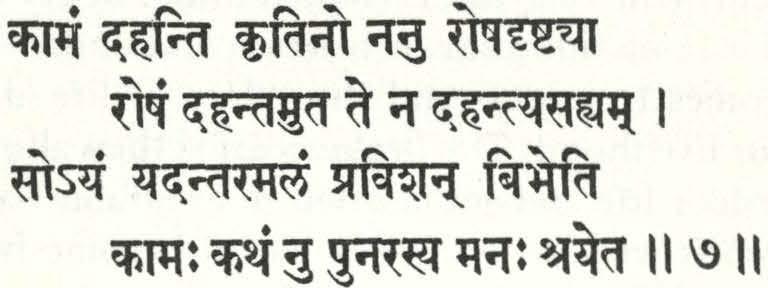
so 'yam yad antaram alam pravi.San bibheti
kiima� katham nu punar asya mana[l srayeta
kamam-lust; dahanti-chastises; krtina[l,-great stalwarts; nanu-but; ro§a-dntya-by wrathful glance; ro§am-wrath; dahantam-being overwhelmed; uta- although; te-they; na-cannot; dahanti-subjugate; asahyam-intolerable; sa�-that; ayam- Him; yat-because; antaram-within; alum-however; pravi.San-entering ; bibheti-is afraid of; kama[l,-l ust ; katham-how; nu-as amatter of fact; puna[l-again; asya-His; mana[l-mind; srayeta-take shelter of.
TRANSLATION
Great stalwarts like Lord Siva can, by their wrathful glance, overcome lust and vanquish him, yet they cannot be free from the overwhelming effects of their own wrath. Such wrath can never enter into the heart of
348 Srimad-Bhagavatam [Canto 2, Ch. 7
Him [the Lord], who is above all this. So how can lust take shelter in His mind?
PURPORT
When Lord Siva was engaged in severely austere meditati.on, Cupid, the demigod of lust, threw his arrow of sex desire, and Lord Siva, thus being angry at him, glanced at Cupid in great wrath, and at once the body of Cupid was annihilated. Although Lord Siva was so powerful, he was unable to get free from the effects of such wrath. But in the behavior of Lord Vigm there is no incidence of such wrath at any time. On the con· trary, Bhrgu Muni tested the tolerance of the Lord by purposely kicking His chest, but instead of being angry at Bhrgu Muni the Lord begged his pardon, saying that Bhrgu Muni's leg might have been badly hurt due to His chest being too hard. The Lord has the sign of the foot of Bhrgu-piida as the mark of tolerance. The Lord, therefore, is never affected by any kind of wrath, so how can there be any place for lust, which is less strong than wrath? When lust or desire is not fulfilled, there is the appearance of wrath, but in the absence of wrath how can there by any place for lust? The Lord is known as iipta-kiima�, or one who can fulfill His desires by Himself. He does not require anyone's help to satisfy His desires. The Lord is unlimited, and therefore His desires are also unlimited. All living entities but the Lord are limited in every respect; how then can the limited satisfy the desires of the unlimited? The conclusion is that the Absolute Personality of Godhead has neither lust nor anger, and even if there is sometimes a show of lust and anger by the Absolute, it should be considered an absolute benediction.
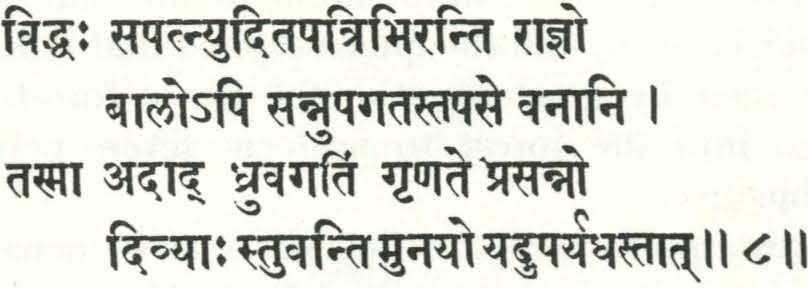
TEXT 8

viddhaft sapatny-udita-patribhir anti riijiio balo 'pi sann upagatas tapase vanani
tasmii adiid dhruva-gatim gwate prasanno divyiift stuvanti munayo yad upary-adhastiit
Text 8) Scheduled Incarnations with Specific Functions 349
viddha[l- pinched by; sapatni-a co-wife; udita-uttered by; patribhi[lby sharp words; anti-just before; riijiia[l-of the Icing; biila[l-a boy; apialthough; s an-being so; upagata[l-took to; tapase- severe penances; vaniini- in a great forest; tasmai-therefore; adiit-gave as a reward; dhru.vagatim-a path to the Dhruva planet;g.T[late-on being prayed for; prasanna[l -being satisfied; divyii[l-denizens of higher planets; stuvanti-do pray; munaya[l-great sages;yat-thereupon; upari--up; adhastiit-down.

TRANSLATION
Being insulted by sharp words spoken by the co-wife of the king, even in his presence, Prince Dhruva, though only a boy, took to severe penances in the forest. And the Lord, being satisfied by his prayer, awarded him the Dhruva planet, which is worshiped by great sages, both upward and downward.
PURPORT
When he was only five years old, Prince Dhruva, a great devotee and the son of l\laharaja Uttanapada, was sitting on the lap of his father. His stepmother did not like the King's patting her stepson, so she dragged him out, saying that he could not claim to sit on the lap of the King because he was not born out of her womb. The little boy felt insulted by this act of his stepmother. Nor did his father make any protest, for he was too attached to his second wife. After this incidence, Prince Dhruva went to his own mother and complained. His real mother also could not take any step against this insulting behavior, so she wept. The boy inquired from his mother how he could sit on the royal throne of his father, and the poor queen replied that only the Lord could help him. The boy inquired where the Lord could be seen, and the queen replied that it is said that the Lord is sometimes seen by great sages in the dense forest. The child prince decided to go into the forest to perform severe penances in order to achieve his objective.
Prince Dhruva performed a stringent type of penance under the instruction of his spiritual master, Sri Narada Muni, who was specifically deputed for this purpose by the Personality of Godhead. Prince Dhruva was initiated by Narada to chant the hymn composed of eighteen letters, namely om namo bhagavate viisudevii.ya, and Lord Vasudeva incarnated Himself as Prsnigarbha, the Personality of Godhead with four hands, and
350 Srimad-Bhagavatam [Canto 2, Ch. 7
awarded the Prince a specific planet above the seven stars. Prince Dhruva, after achieving success in his undertakings, saw the Lord face to face, and he was satisfied that all his needs were fulfilled.
The planet awarded to Prince Dhruva Maharaja is a fixed Vaikuptha planet, installed in the material atmosphere by the will of the Supreme Lord Vasudeva. This planet, although within the material world, will not be annihilated at the time of devastation, but will remain fixed in its place. And, because it is a Vaiku!J.tha planet never to be annihilated, it is worshiped even by the denizens of the seven stars situated below the Dhruva planet, as well as the planets which are even above the Dhruva planet. Mahar�i Bhrgu's planet is situated above the Dhruva planet.
So the Lord incarnated Himself as Prsnigarbha just to satisfy a pure devotee of the Lord. And this perfection was achieved by Prince Dhruva simply by chanting the hymn mentioned above, after being initiated by another pure devotee, Narada. A serious personality can thus achieve the highest perfection of meeting the Lord and attain his objective simply by being guided by a pure devotee, who automatically approaches by dint of one's serious determination to meet the Lord by all means.
The description of Prince Dhruva's activities can be read in detail in the Fourth Canto of Snmad-Bhiigavatam. TEXT 9 ���wtij�:q$;l•ld f�FPtC£�MG'{1�il� �

��"ll�f;r��lf;r II � II
yad venam utpatha-gatarh dvija-viikya-vajra
ni§plu§ta-pauru§a-bhagarh niraye patantam
triitviirthito jagati putra-padarh ca lebhe
dugdhii vasuni vasudhii sakaliini yena
yat-when; venam-unto King Vena; utpatha-gatam-going astray from the righteous path; dvija-of the briihmar-as; viikya-wor ds of cursing; vajra-thunderbolt; ni§plu§ta-being burnt by; pauru§a-great deeds; bhagam-opulence; niraye- into hell; patantam-going down; triitvii-by de-
Text 9] Scheduled Incarnations with Specific Functions 351
q�� I �wrn �tffif � � �
livering; arthita[l,- so being prayed for;jagati-on the world;putra-padamthe position of the son;ca-as well as; Zebhe-achieved;dugdhii--exploited; vasuni--produce;vasudha-theearth; sakaliini-all kinds of ;yena-by whom.
TRANSLATION
Maharaja Vena went astray from the path of righteousness, and the brahmal)aS chastised him by the thunderbolt curse. By this King Vena was burnt with his good deeds and opulence and was en route to hell. The Lord, by His causeless mercy, descended as his son, by the name of Prthu, delivered the condemned King Vena from hell, and exploited the 'earth by drawing all kinds of crops as produce.
PURPORT
According to the system of varrasrama-dharma, the pious and learned briihmaras were the natural guardians of society. The briihmaras, by their learned labor of love, would instruct the administrator kings how to rule the country in complete righteousness, and thus the process would go on as a perfect welfare state. The kings or the k�atriya administrators would always consult the council of learned briihmaras. They were never autocratic monarchs. The scriptures like Manu-samhitii and other authorized books of the great sages were guiding principles for ruling the subjects, and there was no need for less intelligent persons to manufacture a code of law in the name of democracy. The less intelligent mass of people have very little knowledge of their own welfare, as the child has very little knowledge of its future well-being. The experienced father guides the innocent child towards the path of progress, and the childlike mass of people need similar guidance. The standard welfare codes are already there in the Manu-samhitii and other Vedic literatures. The learned briihmaras would advise the king in terms of those standard books of knowledge and with reference to the particular situation of time and place. Such briihmaras were not paid servants of the king, and therefore theyhad the strength to dictate to the king on the principles of scriptures. This system continued even up to the time of Maharaja Candragupta, and the briihmara Cal)akyawas hisunpaidprimeminister.
Maharaja Vena did not adhere to this principle of ruling, and he disobeyed the learned briihmaras. The broad-minded briihmaras were not self-interested, but looked to the interest of complete welfare for all the

352 Srimad-Bhagavatam [Canto 2, Ch. 7
subjects. They wanted to chastise King Vena for his misconduct and so prayed to the Almighty Lord as well as cursed the king.
Long life, obedience, good reputation, righteousness, prospects of being promoted to higher planets, and blessings of great personalities are all vanquished simply by disobeying a great soul. One should strictly try to follow in the footsteps of great souls. Maharaja Vena became a king, undoubtedly due to his past deeds of righteousness, but because he willfully neglectedthe great souls,he was punishedby theloss ofall the abovementioned acquisitions. In the Viimana Puriir-a, the history of Maharaja Vena and his degradation are fully described. When Maharaja Prthuheard about the hellish condition of His father, Vena, who was suffering from leprosy in the family of a mleccha, he at once brought the former king to Kuru�etra for his purification and relievedhimfrom all sufferings.
Maharaja Prthu, the incarnationof God, descended by theprayer of the briihmar-as to restore the disorders on earth. He produced all kinds of crops. But, at the same time, He performedthe duty ofa son who deJjvers the father from hellish conditions.The word putra meansone who delivers from hell, called put. That isa worthy son.
TEXT 10

�1�:q:qR
�: Sffilrij�UJ: qft�:ltZ o II
niibher asiiv r§abha iisa sudevi-siinur
yo vai caciira sama-drgja{la-yoga-caryiim yat piiramaharhsyam �ayaftpadam iimananti
svasthaft pra5iinta-karartaftparimukta-sanga[t
niibheft-byMaharajaNabhi; asau- thePersonalityofGodhead; !§abhaft:t;t�abha; iisa-became; sudevi- Sudevi; siinuft- the son of; yaft- who; vaicertainly; caciira-performed; sama-drk-equibalanced ; ja{la-material ;yogacaryiim-performance of yoga; yat-which; piiramaharhsyam- the highest stageofperfection;r§ayaft-thelearned sages ;padam- situation ; iimanantidoaccept; svasthalt- self-reposed ;prasiinta-suspended; karartalt- the materialsenses;parimukta-perfectlyliberated; smiga[l.-material contamination.

Text 10) Scheduled Incarnations with Specific Functions 353
�� 3ffit ���-
����iSiit�l=il�t�
I �"[ltf{�
The Lord appeared as the son of Sudevi, the wife of King Nahhi, and was known as ��ahhadeva. He performed materialistic yoga to equihalance the mind. This stage is also accepted as the highest perfectional situation of liberation, wherein one is situated in one's self and is completely satisfied.

PURPORT
Out of many types of mystic performances for self-realization, the process of ja(_}.a-yoga is also one accepted by authorities. This ja(_}.a-yoga involves practicing becoming like adumbstone withoutbeingaffectedby material reactions. Just as a stoneisindifferenttoallkindsofattacksand reattacks of external situations, similarly one practices ja(_]a-yoga by tolerating voluntaryinflictionofpain upon thematerialbody.Such yogis, out of many self-infliction methods, practice plucking out the hairs on their head, without shaving and without any instrumental help. But the real purpose of such ja(_]a-yoga practice is to get free from all material affection and to be completely situatedin theself. Atthelaststageof his life, Emperor ��abhadeva wandered like a dumb madman without being affected by all kinds of bodily mistreatment. Seeing him like a madman, wandering naked with long hair and a long beard,less intelligentchildren andmen in the streetusedtospitonhim andurinateonhisbody. Heused to lie in his own stool and never move. But the stool of his body was flavored like the smell of fragrant flowers, and a saintly person would recognize him as a paramahamsa, one in the highest state of human perfection. One who is not able to make his stool fragrant should not, however, imitate Emperor J:{.�ahhadeva. The practice of jm}a-yoga was possible by ��abhadeva and others on the same level of perfection, but such an uncommon practice is impossible for an ordinary man.
The real purpose of ja(_]a-yoga, as mentioned here in this verse, is prasiinta-karar-a"ft, or subduing the senses. The whole process of yoga, under whatever heading it may be, is to control the unbridled material senses and thus prepareoneselffor self-realization. Inthisage specifically, this ja(_]a-yoga cannot be of anypractical value, butontheother handthe practiceof bhakti-yoga isfeasiblebecauseit isjustsuitableforthisage. The simple method of hearing from the rightfulsourceof Srimad-Bhiigavatam willleadonetothe highest perfectionalstageof yoga. ��abhadeva wasthe son of King Nabhi and the grandson of King Agnidhra, and he was the
354 Srimad-Bhagavatam [Canto 2, Ch. 7
TRANSLATION
father of King Bharata, after whose name this planet earth was called Bhiiratavar§a. ��abhadeva's mother was also known as Merudevi, although her name is mentioned here as Sudevi. It is sometimes proposed that Sudevi was another wife of King Agnidhra, but since King ��abhadeva is mentioned elsewhere as the son of Merudevi, it is clear that Merudevi and Sudevi are the same person under different names.
TEXT ll

satre mamiisa bhagaviin haya-sira§iitho siik§iit sa yajiia-puru§as tapaniya-van;w� chandomayo makhamayo 'khila-devatiitmii viico babhiivur usatift svasato'sya nasta�
satre-in the sacrificial ceremony; mama-of mine; iisa-appeared; bhagaviin-the Personality of Godhead; haya-sira§ii-with His horselike head; atha- thus; siik.siit- directly; sa[l- He; yajiia-puru§a[l- the person who is pleased by performances of sacrifice; tapan iya-golden; var[la[l-hue; chandomaya[l-personified Vedic hymns; makhamaya�-personified sacrifices; akhila-all that be; devata-iitmii-soul of the demigods; viicafi-sounds; babhiiva[l-become audible; usatt[l-very pleasing to hear; svasata[t-while breathing; asya- His; nasta[l-through the nostrils.
TRANSLATION
The Lord appeared as the Hayagriva incarnation in the sacrifice performed by Brahma. Hewas thepersonified sacrifices, and the hueof Hisbodywasgolden.HeisthepersonifiedVedas as well, andtheSupersoul of atl demigods. When He breathed, all the sweet sounds of the Vedic hymnscameoutofHisnostrils.
Text ll] ScheduledIncarnationswithSpecificFunctions 355
� � +lTf.Jr-{ ��wit � � ���·H�tq;{\t(�OJ: I ....... ..... ..... ,...... ..... �� �@ltrlST�t«<R�l �q���*fl:�ms��:ll�Zll
PURPORT
The Vedic hymns are generally meant for sacrifices to be performed by the fruitive workers who also want to satisfy the demigods to achieve their fruitive result. But the Lord is the personified sacrifices and personified Vedic hymns. Therefore one who is directly a devotee of the Lord is a person who has automatically both served the purposes of sacrifices and pleased the demigods. The devotees of the Lord may not perform any sacrifice or may not please the demigods as per Vedic injunctions, and still the devotee is on a higher level than the fruitive workers or the worshipers of different demigods.
TEXT 12

matsyo yugiinta-samaye manunopalabdha�
k§OIJimayo nikhila-jiva-nikiiya-keta� visraritsitiin uru-bhaye salile mukhiin me adiiya tatra vijahiira ha veda-miirgiin
matsya[l-incarnation of the fish; yuga-anta-at the end of the millennium; samaye-at the time of; manunii-the would-be Vaivasvata Manu; upalabdha�-seen; k§OIJimaya�-up to the earthly planets; nikhila-all; jiva-living entities; nikiiya-keta�-shelter for; visraritsitiin-emanating from; uru-great; bhaye-out of fear; salile-in the water; mukhiit-from the mouth; me-mine; adiiya-having taken to; tatra-there; vijahiira- enjoyed; ha-certainly; veda-margan-all the Vedas.
TRANSLATION
At the end of the millennium, the would-be Vaivasvata Manu, of the name Satyavrata, would see that the Lord in the fish incarnation is the shelter of all kinds of living entities, up to those in the earthly planet. Out
356 Srimad-Bhagavatam [Canto 2, Ch. 7
"" "' �T ��tl ��;n�: �r�tr1f;IT�m��ij:l Fi���� m�� ��� �1�ij��m��lll��IIZ�II
""
of fear of the vast water, at the end of the millennium, the Vedas come out of my [Brahma's] mouth, and the Lord enjoys those vast waters and protects the Vedas.
PURPORT
During one day of Brahma, there are fourteen Manus, and at the end of each Manu, there is devastation up to the earthly planets, and the vast water is fearful even to the personality of Brahma. So in the beginning of the would-he Vaivasvata Manu, such devastation would he seen by him. There would he many other incidences also, such as the killing of the famous Sankhasura, etc. This foretelling is by past experience of Brahmiiji, who knew that in that fearful devastating scene, the Vedas would come out of his mouth, hut the Lord in His fish incarnation not only would save all living entities, namely the demigods, animals, man and the great sages, hut would also save the Vedas.

TEXT 13

�'h:1���1���1�T
���ijlll�� 3l���:
�o;t 3q'E4�•��1:TH: tlT:t
I
�llllS�tfl�lUlifiO�: II Z �II
k§irodadhiiv amara-diinava-yuthapiiniim unmathnatiim amrta-labdhaya adi-deva[t
Pf§thena kacchapa-vapur vidadhiira gotrarh nidriilc§arw,dri-parivarta-ka§iirta·kart!Iu[t
k§ira-milk; udadhau-inthe oceanof; amara-the demigods; diinava-the demons; yutha-piiniim-of the leaders of both hosts; unmathnatiim-while churning; amrta-nectar; labdhaya-for gaining; iidi-deva[t-thc primeval Lord; pr§thena-by the backbone; kacchapa- tortoise; vapu[t-body ; vidadhiira-assumed; gotram-the Mandara Hill; nidriih§arwft-while partly sleeping; adri-parivarta-rolling the hill; ka§iirw- scratching ; kart!liifl.itching.

Text 13] Scheduled Incarnations with Specific Functions 357
"' "' •
TRANSLATION
The primeval Lord then assumed the tortoise incarnationin order to serve as a resting place [pivot] for the Mandara Mountain, which was acting as a churning rod. The demigods and demonswere churning the ocean of milk with the Mandara Mountain in order to extract nectar. The mountain moved back and forth, scratching the back of Lord Tortoise, who, while partly sleeping, was experiencing an itching sensation.
PURPORT
Although it is not in our experience, there is a milk ocean within this universe. It is accepted even by the modern scientist that there are hundreds and hundreds of thousands of planets hovering over our heads, and each of them has different kinds of climatic conditions. SrimadBhiigavatam gives much information which may not tally with our present experience. But as far as Indian sages are concerned, knowledge is received from the Vcdic literatures, and the authorities accept without any hesitation that we should look through the pages of authentic books of knowledge (siistra-cak§usvat). So we cannot deny the existence of the ocean of milk as stated in the Srimad-Bhiigavatam unless and until we have experimentally seen all the planets hovering in space. Since such an experiment is not possible, naturally we have to accept the statement of Srimad-Bhiigavatam as it is because it is so accepted by spiritual leaders like Sndhara Svam1, J!va Gosvam1, Visvanatha Cakravarti and others. The Vedic process is to follow in the footsteps of great authorities, and that is the only process for knowing that which is beyond our imagination.
The primeval Lord, being all-powerful, can do whatever He likes, and therefore His assuming the incarnation of a tortoise or a fish for serving a particular purpose is not at all astonishing. Therefore we should not have any hesitation whatsoever in accepting the statements of the authentic scriptures like Srimad-Bhiigavatam.
The gigantic work of churning the JTiilk ocean by combined effort of the demigods and the demons required a gigantic resting ground or pivot for the gigantic Mandara Hill. Thus to help the attempt of the demigods the primeval Lord assumed the incarnation of a gigantic tortoise, swimming in the oceatl of milk. At the same time, the mountain scratched His backbone as He was partly sleeping and thus relieved His itching sensation.

358 Srimad-Bhagavatam [Canto 2, Ch. 7
TEXT 14 �mq���T � �m��

trai-pi§taporu-bhaya-hii sa nrsimha-rupam hrtvii bhramad-bhrukuti-dam§tra-kariila-vaktram daityendram iisu gadayiibhipatantam iiriid urau nipiitya vidadiira nakhai[t sphurantam
t rai-pi§tapa-the demigods; uru-bhaya-hii-one who vanquishes great fears; sa[t-He, the Personality of Godhead; nrsimha-rnpam- assumingthe incarnation Nrsiritha; krtuii-doing so; bhramat-by rolling; bhru-kutieyebrows;dam§tra-teeth; kariila-great lyfearful; vak l ram--mout h; daityaindram-the king of the demons; ii.Su-immediately; gadayii-with club in hand; abhipatantam-whilefallingdown;iiriit-nearby; urau-on thethighs; nipiitya- placing on; vidadiira-pierced; nakhai[t-bythenails; sphurantamwhile challenging.
TRANSLATION
ThePersonalityofGodhead assumedtheincarnation ofNarasirithadeva in order to vanquish the great fears of the demigods. He killed the king of the demons [Hiral).yakasipu], who challenged the Lord with a club in his hand, by placingthedemon on Histhighsandpiercing him with His nails, rolling His eyebrows in anger and showing His fearful teeth and mouth.
PURPORT
The history of Hira�yakasipu and his great devotee son Prahlada Maharaja is narrated intheSeventh Canto of Srimad-Bhiigavatam. 1-Iiral).yakasipu became very powerful by material achievements and thought himself to be immortal by the grace of Brahmaji. Brahmaji declined to award him the benediction of immortality because he himself is not an immortal being. But Hira�yakasipu derived Brahmaji's benediction in a roundabout way, almost equal to becoming an immortal being. Hira�yakasipu was sure that he would not be killed by any man or demigod or by
Text 14)
ScheduledIncarnationswithSpecific Functions
" .
�" r��'ll'g ��Tl�CIJ:IRT�f". "' � �TRlmtfN��';1\Cf: �;:ij1'{_11 Z '11II
'liC�H �q���T��.�Cf.U�e{Cf;ft{_ I
359
any kind of known weapon, nor would he die in day or night. Tlw Lon!, however, assumed the incarnation of half-man and half-lion, which was beyond the imagination of a materialistic demon like Hira�yakasipu, and thus, keeping pace with the benediction of Brahmaji, the Lord killed him. He killed him on His lap, so that he was killed neither on the land nor on the water nor in the sky. He was pierced by Narasimha's nails, which were beyond the human weapons imaginable by Hiral).yakasipu. The literal meaning of Hiral).yakasipu is one who is after gold and soft bedding, the ultimate aim of all materialistic men. Such demonic men, who have no relationship with God, gradually become puffed up by material acquisitions and begin to challenge the authority of the Supreme Lord and torture those who are devotees of the Lord. Prahlada l\laharaja happened to be the son of Hiral).yakasipu, and because he was a great devotee, his father tortured him to the best ofhis ability. In this extreme situation, the Lord assumed the incarnation of Narasimhadeva, and just to finish the enemy of the demigods, the Lord killed Iliral).yakasipu in a manner which was beyond the demon's imagination. Materialistic plans of godless demons arealwaysfrustrated by the all-powerful Lord.
TEXT 15

�:e<�("4�;{
�m:��liiR<4���
(f�w.£: l!>l��W�w:rT&:f� II� �II
anta[l.-sarasy uru-balena pade grhito
griiherta yiitha-patir ambuja-hasta iirta[l.
iihedam iidi-puru§iikhila-loka-niitha
tirtha-sravaft sravarta-mwigala-niimadheya
antaft-sarasi-within the river; uru-balena-by superior strength; padeleg; grhita[l.- being taken up; griiherta-by the crocodile; yiitha-pati[l.-of theleader ofthe elephants; ambuja-hastaft-with alotus flower in Lhehand; iirta[l.-greatly aggrieved; aha-addressed; idam-like this; iidi-puru§a- the originalenjoyer;akhila-loka-niitha-the Lord oftheuniverse; tirtha-srava[l.-
360 Srimad-Bhagavatam lCanlo 2, Ch. 7
q� �'Tat � 1{?;fqftRl�ill�� 3lRJ: I
as famous as a place of pilgrimage; sravarza-mangala-all good simply by hearing the name; niima-dheya- whose holy name is worth chanting.
TRANSLATION

The leader of the elephants, whose leg was attacked in the river by a crocodile of superior strength, was much aggrieved. Taking a lotus flower in his trunk, he addressed the Lord, saying, '0 original enjoyer, Lord of the universe! 0 deliverer, as famous as the place of pilgrimage! All are purified simply by hearing Your holy name, which is worthy to be chanted.'
PURPORT
The history of delivering the leader of the elephants, whose leg was attacked in the river by the superior strength of a crocodile, is described in the Eighth Canto of Srimad-Bhiigavatam (Bhiig. 8.2.4). Since the Lord is absolute knowledge, there is no difference between His holy name and the Personality of Godhead. The leader of the elephants was much distressed when he was attacked by the crocodile. Although the elephant is always stronger than the crocodile, the latter is stronger than the elephant when it is in the water. And because the elephant was a great devotee of the Lord in his previous birth, he was able to chant the holy name of the Lord by dint of his past good deeds. Every living entity is always distressed in this material world because this place is such that in every step one has to meet with some kind of distress. But one who is supported by his past good deeds engages himself in the devotional service of the Lord, as is confirmed in the Bhagavad-gitii (Bg. 7.19). Those who are supported by impious acts cannot be engaged in the devotional service of the Lord, even though they are distressed. This is also confirmed in the Bhagavad-gitii (Bg. 7.15). The Personality of Godhead Hari appeared at once on the back of His eternal bearer Garu�a and delivered the elephant.
The elephant was conscious of his relation with the Supreme Lord. He addressed the Lord as iidi-puru§a, or the original enjoyer. Both the Lord and the living beings are conscious and are therefore enjoyers, but the Lord is the original enjoyer because He is the creator of everything. In a family, both the father and his sons are undoubtedly enjoyers, but the father is the original enjoyer, and the sons are subsequent enjoyers. A pure devotee knows well that everything in the u�:J,iverse is the property of the Lord, and a living entity can enjoy a thing as ordained by the Lord. A
Text 15) Scheduled Incarnations with Specific Functions 361
living being cannot even touch a thing which is not alloted to him. This idea of the original enjoyer is explained very nicely in the lsopan4ad. One who knows this difference between the Lord and himself never accepts anything without first offering it to the Lord.

The elephant addressed the Lord as akhila-loka-niitha, or the Lord of the universe, and as such He is the Lord of the elephant also. The elephant, being a pure devotee of the Lord, specifically deserved to be saved from the attack of the crocodile, and because it is a promise of the Lord that His devotee will never be vanquished, it was quite befitting that the elephant called upon the Lord to protect him, and the merciful Lord also at once responded. The Lord is the protector of everyone, but He is the first protector of one who acknowledges the superiority of the Lord without being so falsely proud as to deny the superiority of the Lord or to claim to be equal to Him. He is ever superior. A pure devotee of the Lord knows this difference between the Lord and himself. Therefore a pure devotee is given first preference because of his full dependence, whereas the person who denies the existence of the Lord and declares himself the Lord is called asu ra, and as such he is given protection by the strength of limited power subject to the sanction of the Lord. Since the Lord is superior to everyone, His perfection is also superior. No one can imagine it.
The elephant addressed the Lord as tirtha-srava�, or "famous asthe place of pilgrimage." People go to places of pilgrimage in order to be delivered from the reactions of unknown sinful acts. But one can be freed from all sinful reactions simply by remembering His holy name. The Lord is therefore as good as the holy places of pilgrimage. One can be free from all sinful reactions after reaching a place of pilgrimage, but one can have the same benefit at home or at any place simply by chanting the holy name of the Lord. For a pure devotee, there is no need to go to the holy place of pilgrimage. He can be delivered from all sinful acts simply by remembering the Lord in earnestness. A pure devotee of the Lord never commits any sinful acts, but because the whole world is full of the sinful atmosphere, even a pure devotee may commit a sin unconsciously, as a matter of course. One who commits sinful acts consciously cannot be worthy of becoming a devotee of the Lord, but a pure devotee who unconsciously does something sinful is certainly delivered by the Lord because a pure devotee remembers the Lord always.
The Lord's holy name is called sravar-a-mangala. This means that everything aus icious is received simply by hearing the holy name. In another place in Srimad-Bhiigavatam, His holy name is described as pur-ya-sravar-a-


362 Snmad-Bhagavatam [Canto 2, Ch. 7
kirtana. It is a pious act simply to chant and hear all about the Lord. The Lord descends on this earth and acts like others in connection with the activities of the world just to create subject matter for hearing about Him; otherwise the Lord has nothing to do in this world, nor has He any obligation to do anything. He comes out of His own causeless mercy and acts as He desires, and the Vedas and Puriirws are full of descriptions of His different activities so that people in general may naturally be eager to hear and read something about His activities. Generally, however, the modern fictions and novels of the world occupy a greater part of people's valuable time. Such literatures cannot do good to anyone; on the contrary, they agitate the young mind unnecessarily and increase the modes of passion and ignorance, leading to increasing bondage to the material conditions. The sam<' aptitude for hearing and reading is better utilized in hearing and reading of the Lord's activities. This will give one all around benefit.


It is concluded, therefore, that the holy name of the Lord and things in relation with Him are alwaysworth hearing, and therefore He is called here in this verse niima-dheya, or one whose holy name is worth chanting. TEXT
srutvii haris tam ara!liirthinam aprameyas
cakriiyudhaft patagariija-bhujiidhirnflhaft
cakrerw nakra-vadanam vinipiitya tasmiidd
haste pragrhya bhagaviin krpayojjahiira
srutvii-by hearing; hari�-the Personality of Godhead; tam-him; ara[Iaarthinam-one who is in need of help; aprameya[l-the unlimitedly powerful Lord; cakra-wheel; iiyudha[l-equipped with His weapon; pataga-riijathe king of the birds (Garu�a); bhuja-adhirnflha[l -being seated on the wings of; cakre[Ia-by the wheel; nakra-vadanam-the mouth of the crocodile; vinipiitya-cutting in two; tasmiit-from the mouth of the crocodile; haste-in the hands; pragrhya-taking hold of the trunk; bhagavan-the
Text 16] Scheduled Incarnations with Specific Functions 363
...... • r--. " ��ar ���� Fn�crlOl ij���ij �ll� �iffi'i_ivTT�R II � �II
16
Personality of Godhead; k:payii-out of causeless mercy; ujjahiira-delivered him.


TRANSLATION
The Personality of Godhead, after hearing the elephant's plea, felt that he needed His immediate help, for he was in great distress. Thus at once the Lord appeared there on the wings of the king of birds, Garu�a, fully equipped with His weapon, the wheel [cakra] . And with the wheel He cut to pieces the mouth of the crocodile to save the elephant, and He delivered the elephant by lifting him by his trunk.
PURPORT
The Lord resides in His V aiku!J.tha planet. No one can estimate how far away this planet is situated. It is said, however, that anyone trying to reach that planet by airships or by mindships, traveling for millions of years, will find it still unknown. Modern scientists have invented airships which are material, and a still finer material attempt is made by the yogis to travel by mindships. The yogis can reach any distant place very quickly with the help of mindships. But neither the airship nor the mindship has access into the kingdom of God in the Vaiku!J.thaloka, situated far beyond the material sky. Since this is the situation, how was it possible for the prayers of the elephant to beheard from such an unlimitedly distant place, and how could the Lord at once appear on the spot? These things cannot be calculated by human imagination. All this was possible by the unlimited power of the Lord, and therefore the Lord is described here as aprameya, for not even the best human brain can estimate His powers and potencies by mathematical calculation. The Lord can hear from such a distant place, He can eat from there, and He can appear simultaneously in all places at a moment's notice. Such is the omnipotency of the Lord.

364 Srimad-Bhagavatam [Canto 2, Ch. 7
TEXT 17 'J'ill;;rli �lifm:�)st�f�ij: ijar�t "' " " �f.t��'tli��?.fll�: I �qt trt� iii�� f;rq�;;3� " '"'� ttl�:q�"Sf��'ill�:IIZ \911
jyiiyiin gurwir avarajo'py adite� sutiiniirh lokiin vicakrama imiin yad athiidhiyajna�

k§miirh viimanena jagrhe tripadacchalena yiicniim rte pathi caran prabhubhir na ciilya�
jyiiyiin- the greatest; gurw*-by qualities; avaraja�-transcendental; api- a!though He is so; adite�-of Aditi; sutiiniim-of all the sons known as Adityas; lokiin-all the planets; vicakrame-surpassed ; imiin-in this universe;yat-one who;atka-therefore; adhiyajiia�-the Supreme Personality of Godhead; k§miim-all the lands; viimanena-in the incarnation of Vamana; jagrhe- accepted; tri-pada- three steps; chalena-by pretention; yiiciiam-begging; rte-without; pathi ca ran-passing over the right path; prabhubhi�-by authorities; na-never to be; calya�-to be bereft of.
TRANSLATION
The Lord, although transcendental to all material modes, still surpassed all qualities of the sons of Aditi, known .as the Adityas. The Lord appeared as the youngest son of Aditi. And because He surpassed all the planets of the universe, He is the Supreme Personality of Godhead. On the pretense of asking for a measurement of three footsteps of land, He took away all the lands of Bali Maharaja. He asked simply because without begging, no authority can take one's rightful possession.
PURPORT
Thehistory of Bali Maharaja and his charity to Vamanadeva is described in the EighthCanto of Srimad-Bhagavatam. Bali Maharaja conquered all the planets of the universe by rightful possession. A king can conquer other kings by strength, and such possession is considered to be rightful. So Bali Maharaja possessed all the lands of the universe, and he happened to be charitably disposed toward the briihmar-as. The Lord therefore pretended to be a beggar briihmar-a, and He asked for a measurement of three footsteps of land from Bali Maharaja. The Lord, as the proprietor of everything, could take from him all the lands that Bali Maharaja possessed, but He did not do so because Bali Maharaja possessed all those lands by king's rights. While Bali Maharaja was asked by Lord Vamana for such small charity, the spiritual master of Bali Maharaja, namely Sukracarya, objected to this proposal because he knew that Vamanadeva was Vi��u
Text 17] Scheduled Incarnations with Specific Functions
365
Himself, pretending to be a beggar. Bali Maharaja did not agree to abide by the order of his spiritual master when he understood that the beggar was Vi�!lu Himself, and he at once agreed to give Him in charity the land requested. By this agreement Lord Vamana covered all the lands of the universe with His first two steps and then asked Bali Maharaja where to place the third step. Bali Maharaja was very glad to receive the Lord's remaining step upon his head, and thus Bali Maharaja, instead of losing everything that he possessed, was blessed by the Lord's becoming his constantcompanion and doorman. So, bygiving everything to the cause of the Lord, one does not lose anything, but he gains everything that he could never otherwise expect.
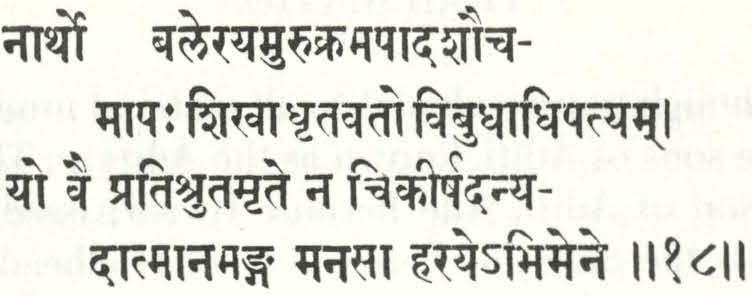
TEXT 18

niirtho baler ayam urukrama-piida-saucam iipaft sikhii-dhrtavato vibudhiidhipatyam yo vai pratiSrutam rte na cikir§ad anyad iitmiinam anga manasii haraye' bhimene
na-never; artha[t-of any value in comparison with;bale[t-of strength; ayam-this;urukrama-piida-saucam-the water washed from the feet of the Personality of Godhead; iipaft-water; sikhii-dhrtavata[t-of one who has kept it on his head; vibudha-adhipatyam-supremacy over the kingdom of the demigods;yaft-one who; vai-certainly; pratisrutam- what wasduly promised; rte na-besides that; cikir§at-tried for; anyat-anything else; iitmiinam-even his personal body; anga-0 Narada; manasii-within his mind;haraye-unto the Supreme Lord;abhimene-dedicated.
TRANSLATION
Bali Maharaja, who put on his head the water washed from the lotus feet of the Lord, did not think of anything else besides his promise, in
366 Srimad-Bhagavatam [Canto 2, Ch. 7
spite of being forbidden by his spiritual master. The king dedicated his own personalbody to fulfill the measurement of the Lord's third step. For such a personality, even the kingdom of heaven, which he conquered by his strength, was of no value.
PURPORT
Bali Maharaja, by gammg the transcendental favor of the Lord in exchange for his great material sacrifice, was able to have a place in the V aiku:p.!haloka with equal or greater facilities of eternal enjoyment; therefore he was not at all the loser by sacrificing the kingdom of heaven, which he possessed by his material strength. In other words, when the Lord snatches away one's hard-earned material possessions and favors one with His personal transcendental service for eternal life, bliss and knowledge, such taking away by the Lord should be considered a special favor upon such a pure devotee.
Material possessions,however alluringthey maybe, cannot be permanent possessions. Therefore one has to voluntarily give up such possessions, or onehas to leavesuch possessions at the time of quitting this material body. The sane man knows that all material possessions are temporary, and the best use of such possessions is to engage them in the service of the Lord so that the Lord may be pleased with himand award him a permanent place in His param dhiima.
In the Bhagavad-gitii, the param dhiima of the Lord is described as follows:
nirmiina-mohii jita-sanga-do§ii adhyiitma-nityii vinivrtta-kiimii{l dvandvair vimuktii[l. sukha-du[l.kha-samjiiair gacchanty amiiflhiift padam avyayam tat
na tad bhiisayate suryo na sasiinko na piivaka[l yad gatvii na nivartante tad dhiima paramam mama (Bg. 15.5-6)
One who possesses more in this material world, in the shape of houses, land, children, society, friendship and wealth, possesses these things only for the time being. One cannot possess all this illusory paraphernalia, ere-

Text 18] Scheduled Incarnations with Specific Functions 367
ated by miiyii, permanently. Such a possessor is more illusioned in the matter of his self-realization; therefore one should possess less or nothing, so that he may be free from artificial prestige. We are contaminated in the material world by association with the three modes of material nature. Therefore, the more one is spiritually advanced by devotional service to the Lord, in exchange for his temporary possessions, the more one is freed from the attachment of material illusion. And to achieve this stage of life one must be firmly convinced about spiritual existence and its permanent effects. To know exactly the permanency of spiritual existence, one must voluntarily practice to possess less or the minimum only to maintain the material existence without any difficulty. One should not create artificial needs. That wiU help one to be satisfied with the minimum. Artificial needs of life are activities of the senses. The modern advancement of civilization is based on these activities of the senses, or, in other words, it is the civilization ofsense gratification. Perfect civilization is the civilization of iitmii, or the soul proper. The civilized man of sense gratification is on anequallevel withanimals because animals cannot go beyond the activities of thesenses. Above the senses there is the mind. The civilization of mental speculation is also not the perfect stage of life because above the mind there is the intelligence, and the Bhagavad-gitii gives us information of the intellectual civilization. The Vedic literatures give different directions for the human civilization, including the civilization of the senses, of the mind, of intelligence, and the civilization of the soul proper. The Bhagavad-gitii primarily deals with the intelligence of man, leading one to the progressive path of the civilization of the spirit soul. And Srimad-Bhiigavatam is the complete human civilization dealing with the subject matter of the soul proper. As soon as a man is raised to the status of the civilization of the soul, he is fit to be promoted to the kingdom of God, and the kingdom of God is described in the Bhagavad-gitii as per the above verses.
The primary information of the kingdom of God informs us that there is no need of sun nor moon nor of electricity, which are all necessary in this material world of darkness. And the secondary information of the kingdom of God explains that anyone able to reach that kingdom by adoption of the civilization of the soul proper, or, in other words, by the method of bhakti-yoga, attains the highest perfection of life. One is then situated in the permanent existence of the soul, with full knowledge of transcendental loving service for the Lord. Bali Maharaja accepted this civilization of the soul in exchange for his great material possession and thus became fit for promotion to the kingdom of God. The kingdom of heaven, which he achieved by dint of his material power, was considered mosl insignificant in comparison wiLh the kingdom of God.

368 Srimad-Bhagavatam [Canto 2, Ch. 7
Those who have attained the comforts of material civilization, made for sense gratification, should try to attain the kingdom of God by following in the footsteps of Bali l\laharaja, who exchanged his acquired material strength, adopting the process of bhakti-yoga as recommended in the Bhagavad-gitii and further explained in the Srimad-Bhiigavatam.
TEXT 19

tubhyarh ca niirada bh[Sarh bhagaviin vivrddhabhiivena siidhu paritu§ta uviica yogam jniinarh ca bhiigavatam iitma-satattva-diparh yad viisudeva-sara[tii vidur aiijasaiva
tubhyam-unto you; ca-also; niirada-0 Narada; bhrsam-very nicely; bhagaviin-the Personality of Godhead; vivrddha-developed; bhiivena-by transcendental love; siidhu-your goodness; paritU§taft- being satisfied; uviica-described; yogam- service; jniinam-knowledge; ca-also; bhiigavatam-the science of God and His devotional service; iitma-the self; satattoo-with all details; dipam-just like the light in the darkness;yat-that which; viisudeva-sarariift-those who are souls surrendered unto Lord Vasudeva; vidu[l-know them;aiijasii-perfectly well; eva-as it is.
TRANSLATION
0 Narada, you were taught about the science of God and His transcen· dental loving service by the Personality of Godhead in His incarnation of Hamsavatara. He was very much pleased with you, due to your intense proportion of devotional service. He also explained unto you, lucidly, the full science of devotional service, which is especially understandable by persons who are souls surrendered unto Lord Vasudeva, the Personality of Godhead.
Text 19) Scheduled Incarnations with Specific Functions 369
. . "
:q ;m� � ��Ft.T�li� m�qft�i3CJR �ill{_ I � :q +ii416Jij+ii�Jiij"ij� ��ef�m:lllT Tq��� IIZ�II
�1:1'
Thedevotee and devotional service are two correlative terms. Unless one is inclined to be a devotee of the Lord, he cannot enter into the intracacies of devotional service. Lord Sri Kr��a wanted to explain the Bhagavad-gitii, which is the science of devotional service, unto Sr'i Arjuna because Arjuna was not only a friend of Lord Kr��a, but was a great devotee as well. The whole process is that all living entities, being constitutionally parts and parcels of the supreme living being, the Absolute Personality of Godhead, have proportionately minute independence of action also. So the preliminary qualification for entering into the devotional service of the Lord is that one become a willing cooperator, and as such one should voluntarily cooperate with persons who are already engaged in the transcendental devotional service of the Lord. By cooperating with such persons, the prospective candidate will gradually learn the techniques of devotional service, and with the progress of such learning one becomes proportionately free from the contamination of material association. Such a purificatory process will establish the prospective candidate in firm faith and gradually elevate him to the stage of transcendental taste for such devotional service. Thus he acquires a genuine attachment for the devotional service of the Lord, and his conviction carries him on to the point of ecstasy, just prior to the stage of transcendental love.
Such knowledge of devotional service may be divided into two sections, namely preliminary knowledge of the nature of devotional service and the secondary knowledge of execution. Bhiigavatam is in relation with the Personality of Godhead, His beauty, fame, opulence, dignity, attraction and transcendental qualities which attract one towards Him for exchange of love and affection. There is a natural affinity of the living entity for the loving service of the Lord. This affinity becomes artificially covered by the influence of material association, and Srimad-Bhiigavatam helps one very genuinely remove that artificial covering. Therefore it is particularly mentioned herein that Srimad-Bhiigavatam acts like the lamp of transcendental knowledge. These two sections of transcendental knowledge in devotional service become revealed to a person who is a soul surrendered unto Vasudeva; as it is said in the Bhagavad-gitii (Bg. 7.19), such a great soul, fully surrendered unto the lotus feet of Vasudeva, is very, very rare.

370 Srimad-Bhagavatam Canto 2, Ch. 7]
PURPORT
�H�
N'lg ��elf ��P.f*tft�: II� oil
cakram ca dik�v avihatam dasasu sva-tejo
manvantare�u manu-vamsa-dharo bibharti
du�te�u riijasu damam vyadadhiit sva-kirtim
satye tri-pr�tha usatim prathayams caritra*
cakram-the Sudarsana wheel of the Lord; ca-as well as; dik�u-in all directions; avihatam-without being deterred; dasasu-ten sides; sva-teja[tpersonal strength; manvantare�u-in different incarnations of Manu; manuvamsa-dharaft-as the descendant of the Manu dynasty; bibharti-rules over; du�te�u-unto the miscreants; riijasu-upon the kings of that type; damam- subjection; vyadadhiit- performed; sva-kirtim-personal glories; satye-in the Satyaloka planet; tri-pr�the-the three planetary systems; u8atim-glorious; prathayan-established; caritra*-characteristics.
TRANSLATION
As the incarnation of Manu, the Lord became the descendant of the Manu dynasty and ruled over the miscreant kingly order, subjecting them by His powerful wheel weapon. Undeterred in all circumstances, His rule was characterized by His glorious fame, which spread over the three lokas, and above them up to the planetary system of the Satyaloka, the topmost in the universe.
PURPORT
We have already discussed the incarnations of Manu in the First Canto. In one day of Brahma there are fourteen Manus, changing one after another. In that way there are 420 Manus in a month of Brahma and 5,040 Manus in one year of Brahma. Brahma lives for one hundred years in his calculation, and as such there are 504,000 Manus in the jurisdiction of one Brahma. And there are innumerable Brahmas, and all of them live only during one breathing period of Maha-Vi�l).u. So we can just imagine

Text 20] Scheduled Incarnations with Specific
Functions TEXT 20 � � ��:rfuij ��5 ��IJ1t ii�ij� ii����t Fi�ffll � � �q c;��m� mlfcf
371
how the incarnations of the Supreme Lord work all over the material worlds, which comprehend only one-fourth of the total energy of the Supreme Personality of Godhead.

The Manvantara incarnation chastises all the miscreant rulers of different planets with as muchpower as that of the Supreme Personality of Godhead, who punishes the miscreants with His wheel weapon. The Manvantara incarnations disseminate the transcendental glories of the Lord.
TEXT 21

dhanvantaris ca bhagaviin svayam eva kirtir niimnii n,r[liirh puru-rujiirh ruja iisu hanti yajne ca bhiigam amrtiiyur-aviivarundha iiyu§ya-vedam anusiisty avatirya lake
dhanvanta ri�-the incarnation of God named Dhanvantari; ca-and; bhagaviin- the Personality of Godhead; svayam eva-personally Himself; kirtifl.-fame personified; niimnii-by the name; nr[tiim puru-rujiim-of the diseased living entities; rujaft-diseases; iisu-very soon; h anti-cures; yajne -in the sacrifice; ca-also; bhiigam- share; amrta-nectar; iiyuft-duration of life; ava-from; avarundhe-obtains; iiyu§ya-of duration of life; vedam -knowledge; anuSiisti-directs; avatirya-incarnating; lake-in the universe.
TRANSLATION
The Lord in His incarnation of Dhanvantari very quickly cures the diseases of the ever diseased living entities simply by His fame personified, and due to Him only the demigods achieve long duration of life. Thus the Personality of Godhead becomes ever glorified. He also exacted a share from the sacrifices, and it is He onJy who inaugurated the medical science or the knowledge of medicine in the universe.

372 Srimad-Bhiigavatam [Canto 2, Ch. 7
�qqt"l �lf.r�;rtm�art��illt� 3Tm�� 1 � � +{trf�f!{�I��I:T 3T�Qf�i;\+i@ � II� Z II
�ijR�
PURPORT
As stated in the beginning of the Srimad-Bhagavatam, everything emanates from the ultimate source of the Personality of Godhead;it is thereforeunderstoodin thisverse that medical science orknowledge in medicine was also inaugurated by the Personality of Godhead in His incarnation Dhanvantari, and thus the knowledge is recorded in the Vedas. The Vedas are the source of all knowledge, and thus knowledge in medical science is also there for the perfect cure of the diseases of the living entity. The embodied living entity is diseased by the very construction of his body. The body is the symbol of diseases. The disease may differ from one variety to another, but disease must be there just as there isbirth anddeath for everyone. So, by the grace of the Personality of Godhead, not only diseases of the body and mind are cured,but also the soul is relieved ofthe constant repetition of birth and death. The name of the Lord is also called bhavau§adhi, or the source of curing the disease of material existence.
TEXT 22

k�atrarh k�ayaya vidhinopabhrtarh mahatma
brahma-dhrug ujjhita-patharh narakarti-lipsu
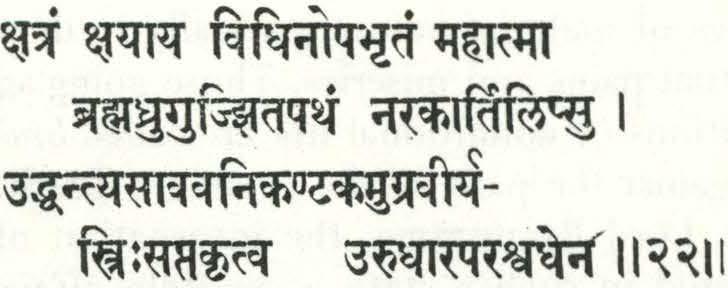
uddhanty asiiv avanikar-takam ugra-viryas
trifl-sapta-krtva urudhiira-parasvadhena
k�atram-the royal order; k�ayaya-for the matter of diminishing; vidhina-by destination;upabhrtam-increased in proportion;mahiitmiithe Lord in the form of the great sage Parasurama;brahma-dhruk-the ultimate truth in Brahman;ujjhita-patham-those who have given up the path of Absolute Truth;naraka-arti-lipsu-desirous to suffer pain in hell; uddhanti-exacts; asau-all those; avanikar.takam-thorns of the world; ugra-virya[l-awfully powerful;trifl-sapta-thrice seven times;krtoofl-performed;urudhara-very sharp;paraSvadhena-by the great chopper.
Text 22] Scheduled Incarnations with Specific Functions 373
Whenthe ruling administrators,who are known as the l�atriyas, turned astray from the path of Absolute Truth, being desirous to suffer in hell, the Lord, in His incarnation as the sage Parasurama, uprooted those unwanted kings, who appeared as the thorns of the earth. Thus He thrice seven times uprooted the�atriyaswith His keenly sharpened chopper.
PURPORT
The k§atriyas, or the ruling administrators of any part of the universe, either on this planetor on other planets, arefactually the representatives of the Almighty Personality of Godhead, and they are meant to lead the subjects towards the path of God realization. Every state and its administrators, regardless of the nature of the administration-monarchy or democracy, oligarchy or dictatorship or autocracy-have the prime responsibility to lead the citizens toward God realization. This is essential for all human beings, and it is the duty of the father, spiritual master, and ultimately the state to take up the responsibility to lead the citizens towards this end. The whole creation of material existence is made for this purpose, just to give a chance to the fallen souls who rebelled against the will of the Supreme Father and thus became conditioned by material nature. The force of material nature gradually leads one to a hellish condition of perpetual pains and miseries. Those going against the prescribed rules and regulations of conditional life are called brahmojjhita-pathas, or persons going against the path of the Absolute Truth, and they are liable to be punished. Lord Para8urama, the incarnation of the Personality of Godhead, appeared in such a state of worldly affairs and killed all the miscreant kings twenty-one times. Many k�atriya kings fled away at that time fromIndia to other parts ofthe world,and according to the authority of the Mahii.bhii.rata, the kings of Egypt originally migrated from India because of Parasurama's program of chastisement. The kings or administrators are similarly chastised in all circumstances whenever they become godless and plan a godless civilization, and that is the order of the Almighty.
TEXT 23

374 Snmad-Bhagavatam [Canto 2, Ch. 7
TRANSLATION
3l�<:st(1l<:JW�: �� � ��ffi;ffl � g(lf.\� I
asmat-prasiida-sumukha� kalayii kalesa ik�viiku-vamsa avati'rya guror nidese ti�than vanam sa-dayitiinuja iivivesa yasmin virudhya daia-kandhara iirtim iircchat

asmat-unto us, beginning from Brahma down to the insignificant ant; prasiida-causeless mercy; sumukha�-so inclined; kalayii-with Hisplenary extensions; kalesa�- the Lord of allpotencies; ik�viiku-Maharaja Ikeyvaku, in the dynasty of the sun; vamse-family; avatirya-by descending in; guro�-of the fatheror spiritual master;nidese-under theorderof; t�than -being situated in; vanam-in the forest; sa-dayitii-anuja�-along with His wife and younger brother; iivivesa-entered in; yasmin-unto whom; virudhya-being rebellious; daia-kandhara�-Rava�a, who had ten heads; iirtim- great distress; arcchat-achieved.
TRANSLATION
Due to His causeless mercy upon all living entities within the universe, the Supreme Personality of Godhead, along with His plenary extensions, appeared in the family of Maharaja lk�vaku as the Lord of His internal potency, Sita. Under the order of His father, Maharaja Dasaratha, He entered the forest and lived there for considerable years with His wife and younger brother. RavaQ.a, who was very materially powerful, with ten heads on His shoulders, committed a great offense against Him and was thus ultimately vanquished.
PURPORT
Lord Rama is the Supreme Personality of Godhead, and His brothers, namely Bharata, Lak�ma�a and Satrughna, are Hisplenary expansions. All four brothers were Vi§ru-tattva and were never ordinary human beings. There are many unscrupulous and ignorant commentators on Srimad Riimiiyara who present the younger brothers of Lord Ramacandra as ordinary living entities. But here in the Srimad-Bhiigavatam, the most
Text 23) Scheduled Incarnations
with Specific Functions � � «�� mN� ��'"��3l1Rhu4Ea:ll��ll
375
authentic scripture on the science of Godhead, it is clearly stated that His brothers were His plenary expansions. Originally Lord Ramacandra is the incarnation of Vasudeva, Lak�mapa is the incarnation of Sankar�apa, Bharata is the incarnation of Pradyumna, and Satrughna is the incarnation of Aniruddha, expansions of the Personality of Godhead. Lak�mijl Sita is the internal potency of the Lord and is neither an ordinary woman nor the external potency incarnation of Durga. Durga is the external potency of the Lord, and she is associated with Lord Siva.
As stated in the Bhagavad-gitii (Bg. 4.7), the Lord appears when there is discrepancy in the discharge of factual religiousness, and Lord Ramacandra also appeared under the same circumstances, accompanied by His brothers, who are expansions of the Lord's internal potency, and by L�miji Sitadevi.

Lord Ramacandra was ordered by His father, Maharaja Dasaratha, to leave home for the forest under awkward circumstances, and the Lord, as the ideal son of His father, carried out the order, even on the occasion of His being declared the King of Ayodhya. One of His younger brothers, Lak�mapajl, desired to go with Him, and so also His eternal wife, Sitajl, desired to go with Him. The Lord agreed to both of them, and all together they entered the Dal).gakaral).ya Forest, to live there for fourteen years. During their stay inthe forest, there was some quarrel between Ramacandra and Raval).a, and the latter kidnapped the Lord's wife, Sita. The quarrel ended in the vanquishing of the greatly powerful Raval).a, along with all his kingdom and family.
Sita is L�nu]I, or the goddess of fortune, but she is never tobe enjoyed by any living being. She is meant for being worshiped by the living being along with her husband, Sn Ramacandra. A materialistic man like Raval).a does not understand this great truth, but on the contrary he wants to snatch Sitadevi from the custody of Rama and thus incurs great miseries. The materialists, who are after opulence and material prosperity, may take lessons from the Riimiiyara that the policy of exploiting the nature of the Lord without acknowledging the supremacy of the Supreme Lord is the policy of Raval).a. Raval).a was very advanced materially, so much so that he turned his kingdom, Lanka, into pure gold, or full material wealth. But because he did not recognize the supremacy of Lord Ramacandra and defied Him by stealing His wife Sita, Raval).a was killed and all his opulence and power destroyed.
Lord Ramacandra is a full incarnation with six opulences in full, and He is therefore mentioned in this verse as kalesaft, or master of all opulence.
376 Srimad-Bhagavatam [Canto 2, Ch. 7
TEXT 24

II�IJII
yasmii adiid udadhi riiflha-bhayiinga-vepo miirgam sapady ari-puram haravad didhak§o/t
dure suhrn-mathita-ro�a-susorra-dr§ tyii tiitapyamiina-makaroraga-nakra-cakraft
yasmai-unto whom; adiit-gave; udadhift-the great Indian Ocean; riiflha-bhaya-affected by fear; anga-vepaft- bodily trembling; miirgamway; sapadi- quickly; ari-puram-the city of the enemy; haravat-like that of Hara (Mahadeva); didhak§o[l-desiring to burn into ashes; dureat a long distance; su-hrt-intimate friend; mathita-being aggrieved by; ro�a-in anger; su-sorra-red-hot; dntyii-by such a glance; tiitapyamiinaburninginheat; makara- sharks ;uraga- snakes;nakra- crocodiles;cakraflcircle.
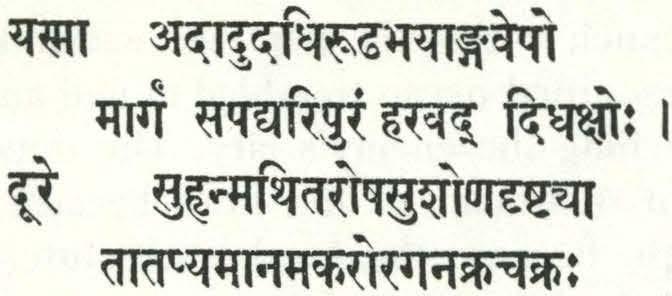
TRANSLATION
The Personality of Godhead Ramacandra, being aggrieved for His distant intimate friend [Sita], glanced over the city of the enemy RavaQ.a with red-hot eyes like those of Hara [who wanted to burn the kingdom of heaven]. The great ocean, trembling in fear, gave Him His way because its family members, the aquatics like the sharks, snakes and crocodiles, were being burnt by the heat of the angry red-hot eyes of the Lord.
PURPORT
The Personality of Godhead has every sentiment of a sentient being, like all otherliving beings,because He is the chief and originalliving entity, the supreme source of all other living beings. He is the nitya, or the chief eternal amongst all other eternals. He is the chief one, and all others are the dependent many. The many eternals are supported by the one eternal, and thus both the eternals are qualitatively one. Due to such oneness, both the eternals have constitutionally a complete range of sentiments, but the difference is that the sentiments of the chief eternal are different in
Text 24] Scheduled
Incarnations with Specific Functions
377
quantityfrom the sentiments ofthedependent eternals. When Ramacandra was angry and showed His red-hot eyes, the whole ocean became heated with that energy, so much so that the acquatics within the great ocean felt the heat, and the personified ocean trembled in fear and offered the Lord an easy path for reaching the enemy's city. The impersonalists will see havoc in this red-hot sentiment of the Lord because they want to see negation in perfection. Because the Lord is absolute, the impersonalists imagine that in the absolute the sentiment of anger, which resembles mundane sentiments,must be conspicuous by absence. Due to a poor fund of knowledge, they do not realize that the sentiment of the Absolute Person is transcendental to all mundane concepts ofquality and quantity. Had Lord Ramacandra's sentiment been of mundane origin, how could it disturb the whole ocean and its inhabitants? Can any mundane red-hot eye generate heat in the great ocean? These are factors to be distinguished in terms of the personal and impersonal conception of the Absolute Truth. As it is said in the beginning of the Srimad-Bhiigavatam, the Absolute Truth is the source of everything,so the Absolute Person cannot be devoid of the sentiments that are reflected in the temporary mundane world. Rather, the different sentiments found in the Absolute, either in anger or in mercy, have the same qualitative influence, or, in other words, there is no mundane difference of value because these sentiments are all on the absolute plane. Such sentiments are definitely not absent in the Absolute, as the impersonalists think, making their mundane estimation of the transcendental world. TEXT




378 Srimad-Bhagavatam L Canto 2, Ch. 7
25 �:�q!(l(i�;>f'i���ll� I ��fll: � rc.��qfu �N���msf� 11�'-\11 vak§a�-sthala-sparsa-rugna-mahendra-viihadantair vUJ.ambita-kakubju§a u!lha-hiisam sadyo'subhi� saha vine§yati diira-hartur visphurjitair dhanu§a uccarato'dhisainye
vak§a�-st hala-chest; sparsa-touched by; rugna-broken; mahii-indrathe Kingof heaven; vaha-theconveyor; dantai�-by the trunk; vi!fambitailluminated; kakubju§a�- all directions thus being served; u!fha-hiisamovertaken by laughter; sadya�- within no time; asubh*-by the life; saha-along with; vine§yati-was killed; dara-hartu�-of the one who kidnapped the wife; visphiirjitai�-by the tingling of the bow; dhanu§a�bow; uccarata�-strolling fast; adhisainye-in the midst of the fighting soldiers of both sides.
TRANSLATION
When Rava�a was engaged in the battle, the trunk of the elephant which carried the King of heaven, lndra, broke in pieces, having collided with the chest of Rav�a, and the scattered broken parts illuminated all directions. Rava�a therefore felt proud of his prowess and began to loiter in the midst of the fighting soldiers, thinking himself the conqueror of all directions. But his laughter, overtaken by joy, along with his very air of life, suddenly ceased with the tingling sound of the bow of Ramacandra, the Personality of Godhead.
PURPORT
However powerful a living being may be,when he is condemned by God no one can save him, and, similarly, however weak one may be, if he is protected by the Lord no one can annihilate him.
TEXT 26

M�ot14:414:4tfi�l���{: I
�RI: ��Rt
bhumefi. suretara-variitha-vimarditayafi. klesa-vyayaya kalaya sita-kmw-kesafi. jatafi. kaT"4yati jananupalak§ya-margafi, karma[Li catma-mahimopanibandhanani
Text 26) Scheduled Incarnations with Specific Functions 379
��:
w�����:
��: �IJ(:;m�ll��ll
bhume�- of the entire world; sura-itara-other than godly persons; variltha-soldiers; vimarditayaft-distressed by the burden; klesa-miseries; vyayaya-for the matter of diminishing; kalaya-along with His plenary expansion; sita-kmw-not only beautiful but also black; kesa�- with such hairs; jatafl-having appeared; ka1"4yati-would act; jana-people in general; anupalak§ya-rarely to be seen; marga� -path; karma!li-activities; ca:also; atma-mahima- glories of the Lord Himself; upanibandhaniini-in relation to.
TRANSLATION
When the world is overburdened by the fighting strength of kings who have no faith in God, the Lord, just to diminish the distressed condition of the world, descends with His plenary portion. The Lord comes in His original form, with beautiful black hair. And just to expand His transcendental glories, He acts extraordinarily. No one can properly estimate how great He is.
PURPORT
This verse is especially describing the appearance of Lord Kr��a and His immediate expansion, Lord Baladeva. Both Lord Krwa and Lord Baladeva are one Supreme Personality of Godhead. The Lord is omnipotent, and He expands Himself in innumerable forms and energies, and the whole unit is known as the one Supreme Brahman. Such extensions of the Lord are divided into two divisions, namely personal and differential. Personal expansions are called the Vi§ru-tattvas, and the differential expansions are called the jiva-tattvas. And in such expansional activity, Lord Baladeva is the first personalexpansion of Kr��a,the Supreme Personality of Godhea'd.
In the Vi§!lU Purara, as well as in the Mahabharata, both Kr��'a and Baladeva are mentioned as having beautiful black hair, even- i11 Their advanced age. The Lord is called anupalak§ya-marga[l. or, in-still more technical Vedic terms, avan-manasa-gocara: one who is never to be seen or realized by the limited sense perception of the people in general. In the Bhagavad-gita it is said by the Lord, naharh prakasa� sarvasya yogamaya samavrtafl (Bg. 7.25). In other words, He reserves the right of not being exposed to anyone and everyone. Only the bona fide devotees can know Him by His specific symptoms, and out of such many, many symptoms, one symptom is mentioned here in this verse, that the Lord is sita-knrakesa[t, or one who is observed always with beautiful black hair. Both Lord

380 Srimad-Bhagavatam [Canto 2, Ch. 7
Krgta and Lord Baladeva have such hair on Their heads, and thus even in advanced age They appeared like young boys sixteen years old. That is the particular symptom of the Personality of Godhead. In the Brahma-samhitii it is stated that although He is the oldest personality among all the living entities, still He always looks like a new, youthful boy. That is the characteristic of a spiritual body. The material body is symptomized by birth, death, old age and diseases, hut the spiritual body is conspicuous by the absence of those symptoms. Living entities who reside in the Vaiku!Jthalokas in eternal life and bliss have the same type of spiritual body, without being affected by any signs of old age. It is described in the Bhiigavatam (Canto Six) that the party of Vi�:r:mdutas who came to deliver Ajiimila from the clutches of the party of Yamariija appeared like youthful boys, corroborating the description in this verse. It is ascertained thus that the spiritual bodies in the Vaiku�thalokas, either of the Lord or of the other inhabitants, are completely distinct from the material bodies of this world. Therefore, when the Lord descends from that world to this world, He descends in His spiritual body of Atma-miiyii or internal potency, without any touch of the bahirangii-miiyii or external material energy. The allegation that the impersonal Brahman appears in this material world by accepting a material body is quite absurd. Therefore the Lord, when He comes here, has not a material body, but a spiritual body. The impersonal brahmajyoti is only the glaring effulgence of the body of the Lord, and there is no difference in quality between the body of the Lord and the impersonal ray of the Lord, called brahmajyoti.
Now the question is why the Lord, who is omnipotent, comes here to diminish the burden of the world, created by the unscrupulous kingly order. Certainly the Lord does not need to come here personally for such purposes, hut He actually descends to exhibit His transcendental activities in orderto encourage His puredevotees, who want to enjoylife by chanting the glories of the Lord. In the Bhagavad-gitii it is stated (Bg. 9.13-14) that the mahatmas, great devotees of the Lord, take pleasure in chanting of the activities of the Lord. All Vedic literatures are meant for turning one's attention towards the Lord and His transcendental activities. Thus the activities of the Lord, in His dealings with worldly people, create a subject matter for discussion by His pure devotees.
TEXT 27


Text 26] Scheduled Incarnations with Specific Functions 381
tokena jiva-hararwrh yad uliiki-kiiyiis trai-miisikasya ca padii sakato'pavrtta[t
yad ringatiintaragatena divi-sprsor vii unmulanarh tv itarathiirjunayor na bhiivyam
toke na- by a child;ji"va-hararam-killing a living being; yat-one which; uliiki-kiiyiift- assumed the giant body of a demon; trai-miisikasya-of one who is only three months old; ca-also; padii-by the leg; sakatalt upavrtta[t-turned over the cart; yat-one who; ringatii-while crawling; antaragate n a- being overtak.en;divi-high in the sky; sprsoft - touching;vii-either; unmulanam-uprooting; tu-but ; itarathii-anyone else than; arjunayoftof the two arjuna trees; na bhiivyam-was not possible.


TRANSLATION
There is no doubt about Lord Kr��Ja's being the Supreme Lord, otherwise how was it possible for Him to kill a giant demon like Piitana when He was just on the lap of His mother, to overturn a cart with His leg when He was only three .months old, to uproot a pair of arjuna trees, so high that they touched the sky, when He was only crawling. All these activities are not possible for anyone other than the Lord Himself.
PURPORT
One cannot manufacture a God by one's mental speculation or by numerical votes, as has become a practice for the less intelligent class of men. God is God eternally, and an ordinary living entity is eternally a part and parcel of God. God is one without a second, and the ordinary living entities are many without number. All such living entities are maintained by God Himself, and that is the verdict of the Vedic literatures. When Kr�!la was on the lap of His mother, the demon Putana appeared before His mother and prayed to nurture the child in her lap. Mother Yasoda agreed, and the child was transferred onto the lap of Putana, who was in the garb
382
Srimad-Bhagavatam
[Canto 2, Ch. 7
of a respectable lady. Putana wanted to kill the child by smearing poison on the nipple of her breast. But when everything was complete, the Lord sucked her breast along with her very air of life, and the demon's gigantic body, said to be as long as six miles, fell down. But Lord Kr��a did not need to expand Himself to the length of the she-demon Putanii, although He was quite competent to extend Himself more than six miles long. In His Vamana incarnation He posed Himself as a dwarf briihmara, but when He took possession of His land, promised by Bali Maharaja, He expanded His footstep to the top end of the universe, extending over thousands and millions of miles. So it was not very difficult for Kr��a to perform a miracle by extending His bodily feature, but He had no desire to do it because of His deep filial love for His mother, Yasoda. If Yasoda would have seen Kr��a in her lap extending six miles to cope with the she-demon Putana, then the natural filial love of Yasoda would have been hurt because in that way Yasoda would come to know that her so-called son, Krwa, was God Himself. And with the knowledge of the Godhead of Kr��a, Ya8oda mayi would have lost the temper of her love for Kr��a as a natural mother. But as far as Lord Kr��a is concerned, He is God always, either as a child on the lap of His mother, or as the coverer of the universe, Vamanadeva. He does not require to become God by undergoing severe penances, although some men think of becoming God in that way. By undergoing severe austerities and penances, one cannot become one or equal with God, but one can attain most of the godly qualities. A living being can attain godly qualities to a large extent, but he cannot become God; whereas Kr��a, without undergoing any type of penance, is God always, either in the lap of His mother or growing up or at any stage of growth.
So at the age of only three months He killed the Sakatasura who remained hidden behind a cart in the house of Yasodamay'i. And when He was crawling and was disturbing His mother from doing household affairs, the mother tied Him with a grinding pestle, but the naughty child dragged the pestle up to a pair of very high arjuna trees in the yard of Yasodamayi, and when the pestel was stuck in between the pair of trees, they fell down with a horrible sound. When Yasodamayi came to see the happenings, she thought that her child was saved from the falling trees by the mercy of the Lord, without knowing that the Lord Himself, crawling in her yard, had wreaked the havoc. So that is the way of reciprocation of love affairs between the Lord and His devotees. Yasodamay'i wanted to have the Lord as her child, and the Lord played exactly like a child in her lap,but at the same



Text 27] Scheduled Incarnations with Specific Functions 383
time played the part of the Almighty Lord whenever it was so required. The beauty of such pastimes was that the Lord fulfilled everyone's desire. In the case of felling the gigantic arjuna tree, the Lord's mission was to deliver the two sons of Kuvera, who were condemned to become trees by the curse of Narada, as well as to play like a crawling child in the yard of Y asoda, who took transcendental pleasure in seeing such activities of the Lord in the very yard of her home.
The Lord in any condition is Lord of the universe, and He can act as such in any form, gigantic or small, as He likes.
TEXT 28

yad vai vraje vraja-pa.Sun vi§atoya-pitii.n pii.lii.ms tv ajivayad anugraha-dnti-vr�tyii tac-chuddhaye'ti-vi§a-virya-vilola-jihvam uccii.tayi§yad uragam viharan hradinyii.m
yat-one who; vai-certainly; vraje-at Vrndavana; vraja-pa.Sun-the animals thereof; vi§a-t oya-poisoned water; pitan-those who drank; pii.lii.n- the cowherd men; tu-also; ajivayat-brought to life; anugraha-dnti -mercifuJ glance; vntyii.- by the showers of; tat-that; suddhaye-for purification; ati-exceedingly; vi§a-virya-highly potent poison; vilola-lurking; jihvam-one who has such a tongue; uc cii.tayi§yat-severely punished; uragam-unto the snake; viharan-taking it as a pleasure; hradinyii.m-in the river.
TRANSLATION
Then also when the cowherd boys and their animals drank the poisoned water of the River Yamuna, and after the Lord [in His childhood] revived them by His merciful glance, just to purify the water of the River Yamuna He jumped into it as jf playing and chastised the venomous Kaliya snake,
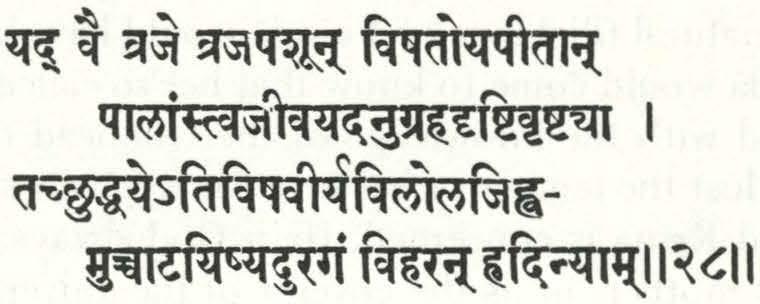
384 Srirnad-Bhagavatam [Canto 2, Ch. 7
which was lurking there, its tongue emitting waves of poison. Who can perform such Herculean tasks but the Supreme Lord?
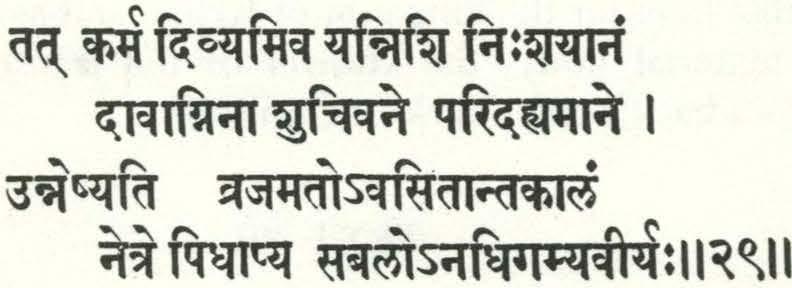
TEXT 29

tat karma divyam iva yan niSi niftsayiinam diiviigninii suci-vane paridahyamiine unne�yati vrajam ato'vasitiinta-kiilam netre pidhiipya sabalo'nadhigamya-virya[l.
tat-that; karma-activity; divyam -superhuman; iva -like; yat-which; niSi-at night; ni[l.sayiinam-sleeping carefreely; diiva-agninii-by the flare of the forest fire; suci-vane-in the dry forest; paridahyamiine-being set ablaze; unne�yati-would deliver; vrajam- all the inhabitants of Vraja; ata[l.-hence; avasita-surely; anta-kiilam-last moments of life; netre-on the eyes; pidhiipya-simply by closing; sabala[l.- along with Baladeva; anadhigamya-unfathomable; virya[l.-prowess .
TRANSLATION
On the very night of the day of the chastisement of the Kaliya snake, when the inhabitants of Vrajabhumi were sleeping carefreely, there was a forest fire ablaze due to dry leaves, and it appeared that all the inhabitants were sure to meet their death. But the Lord, along with Balarama, saved them simply by closing His eyes. Such are the superhuman activities of the Lord.
PURPORT
Although in this verse the Lord's activity has been described as superhuman, it should be noted that the Lord's activitiesarealways superhuman, and that distinguishes Him from the ordinary living being. Uprooting a gigantic banyan or arjuna treeand extinguishinga blazing forest fire simply
Text 29] Scheduled Incarnations with Specific Functions 385
by closing one's eyes are certainly impossible by any kind of human endeavor. But not only are these activities amazing to hear, but in fact all other activities of the Lord, whatever He may do, are all superhuman, as is confirmed in the Bhagavad-gitii (Bg. 4.9). And whoever knows the superhuman activities of the Lord,due to theirverytranscendentalnature, becomes eligible to enter the kingdom of Kr��a, and assuch, after quitting this present material body, the knower of the transcendental activities of the Lord goes back home, back to Godhead.

TEXT 30

grhr.ita yad yad upabandham amu§ya miitii sulbam sutasya na tu tat tad amu§ya miiti yaj jrmbhato'sya vadane bhuvaniini gopi samvik§ya sa�ikita-manii[L pratibodhitiisit
g_rh[tita-by taking up; yat yat-whatsoever; upabandham-ropes for tying; amu§ya-His; miitii-mother; sulbam-ropes; sutasya-of her son; na-not; tu-however; tat tat-by and by; amu§ya-His; miiti-was sufficient; yat-that which; j_rmbhata/;1. -opening the mouth; asya-of Him; vadane-in the mouth; bhuvaniini-the worl ds; gopi- the cowherd woman; samvik§ya-so seeing it; sankita-manii[L- doubtful in mind; pratibodhit"aconvinced in a different way; iisit-wasso done.
TRANSLATION
When the cowherd woman [Kr�!!a's foster mother, Ya8odii) was trying to tie the hands of her son with ropes, she found the rope to be always insufficient in length, and when she finally gave up, Lord Kr�!la, by and by, opened His mouth, wherein the mother found all the universes situated. Seeing this, she was doubtful in her mind, hut she was convinced in a different manner of the mysti<; nature of her son.
386 Srimad-Bhagavatam [Canto 2, Ch. 7
One day Lord Kr�!la as the naughty child disturbed His mother Yasoda, and she began to tie up the child with ropes just to punish Him. But no matter how much rope she used, she found it always insufficient. Thus she became fatigued, but in the meantime the Lord opened His mouth, and the affectionate mother saw within the mouth of her son all the universes situated together. The motherwas astonished, but out of her deep affection for Krwa she thought that the Almighty Godhead Narayal).a had kindly looked after her son just to protect Him from all the conlinuous calamities happening to Him. Because of her deep affection for Kr�Qa, she could never think that her very son was Narayal).a, the Personality of Godhead Himself. That is the action of yogamiiyii, the internal potency of the Supreme Lord, which acts to perfect all the pastimes of the Lord with His different types of devotees. Who could play such wonders without being God?
TEXT 31

nandam ca mok§yati bhayiid varu!lasya piisiid gopiin bile§u pihitiin maya-siinunii ca ahny iiprtam niSi sayiinam atiSrame!la lokam viku!ltham upane§yati gokulam sma
nandam-unto Nanda (the father of Kr�pa); ca-also; mok§yati-saves; bhayiit-from the fear of; varu!lasya-of Varul).a, the demigod of water; piisiit-from the clutches of; gopiin-the cowherd men; bile§u-in the caves of the mountain; pihitiin-placed; maya-siinunii-by the son of Maya; ca-also; ahni iiprtam-being very engaged during the daytime; nisi-at night; sayiinam-lying down; atiSrame!la-because of hard labor; lokamplanet; viku!ltham-the spiritual sky; upane§yati-He awarded; gokulamthe highest planet; sma-certainly.
Text 31] Scheduled Incarnations with Specific Functions 387
PURPORT
. ..... " ;r� � ��({fijlltf���f{l� ��fqfu���:q"l �'m'lij f�fu �PlR'tfu�ltiJf � �o��r.�fijtil,�� II�Z II
TRANSLATION

Lord Kr�Q.a saved His fosterfather Nanda Maharaja fromthe fear of the demigod Varu�a and released the cowherd boys from the caves of the mountain, for they were placed there by the son of Maya. Also, to the inhabitants of Vrndavana, who were busy working during daytime and sleeping soundly at night because of their hard labor in day, Lord Kr��a awarded promotion to the highest planet in the spiritual sky. All these acts are transcendental and certainly prove without any doubt His Godhood.
PURPORT
Nanda Maharaja, the foster father of Lord Kr��a, went to take his bath in the River Yamuna in the dead of night, mistakenly thinking that the night was already over; thus the demigod Varu�a took him to the Varu!la planet just to have a look at the Personality of Godhead Lord Kr�!la, who appeared there to release the father. Actually there was no arrest of Nanda Maharaja by Varu!la because the inhabitants of Vrndavana were always engaged in thinking of Kr9Q.a, in constant meditation on the Personality of Godhead in a particular form of samiidhi, or trance of bhakti-yoga. They had no fear of the miseries of material existence. In the Bhagavadgitii it is confirmed that to be in association with the Supreme Personality of Godhead by full surrender in transcendental love frees one from the miseries inflicted by the laws of material nature. Here it is clearly mentioned that the inhabitants of v rndavana were extensively busy in the hard labor of their day's work, and due to the day's hard labor they were engaged in sound sleep at night. So practically they had very little time to devote to meditation or tothe other paraphernalia of spiritual activities. But factually they were engaged in the highest spiritual activities only. Everything done by them was spiritualized because everything was dovetailed in their relationship with Lord Sri Kr�!la· The central point of activities was Kr�!la, and as such the so-called activities in the material world were saturated with spiritual potency, and that is the advantage of the way of bhakti-yoga. One should discharge one's duty on Lord Kr�!la's behalf, and all one's actions will be saturated with Kr�!la thought, the highest pattern of trance in spiritual realization.

388 Snmad-Bhagavatam [Canto 2, Ch. 7
gopair makhe pratihate vraja-viplaviiya deve 'bhivar§ati pa.Sun k[payii rirak§u�

dhartocchilindhram. iva sapta-diniini saptaval"§o mahidhram anaghaikakare salilam

gopai�-by the cowherd men; makhe-in offering a sacrifice to the King of heaven; pratihate-being hampered; vraja-viplaviiya-for devastating the whole existence of Vrajahhumi, the land of Kreyl).a's pastimes; deve-by the King of heaven; abhivar§ati- having poured down heavy rain; pasunthe animals; krpayii-by causeless mercy upon them; rirak§u[l-desired to protect them; dharta-held up; ucchilindhram-uprooted as an umbrella; iva-exactly like that; sapta-diniini-continuously for sevep days; saptavar§a[l-although Hewas onlyseven years old;mahidhram-the Govardhana Hill; anagha-without being tired; ekakare-in one hand only; salilamplayfully.
TRANSLATION
When the cowherd men of Vrndavana stopped offering sacrifice to the heavenly King, lndra, under instruction of Kr�r:ta, the whole tract of land known as Vraja was threatened to he washed away by constant heavy rains for seven days. Lord Kf�l).a, out of His causeless mercy upon the inhabitants of Vraja, held up the hill known as Govardhana with one hand only, although He was only seven years old. He did this to protect the animals from the onslaught of water.
PURPORT
Children play with an umbrella generally known as a frog's umbrella, and Lord Kna).a, when He was seven years old only, could snatch the great hill known as the Govardhana Parvata at Vrndavana and hold it for seven days continually with one hand, just to protect the animals and the inhabitants of vrndavana from the wrath of Indra, the heavenly King, who was denied sacrificial offering by the inhabitants of Vrajabhiimi.
Text 32) Scheduled Incarnations with Specific Functions
389
Factually there is no need of offering sacrifices to the demigods for their services if one is engaged in the service of the Supreme Lord. Sacrifices recommended in the Vedic literahtre for satisfaction of the demigods are a sort of inducement to the sacrificers just to realize the existence of higher authorities. The demigods are engaged by the Lord as controlling deities of the material affairs, and according to the Bhagavadgitii, when a demigod is worshiped the process is accepted as the indirect method for worshiping the Supreme Lord. But when the Supreme Lord is worshiped directly there is no need of worshiping the demigods or offering them sacrifices as is recommended in particular circumstances. Lord Km1a therefore advised the inhabitants of the Vrajabhumi not to offer any sacrifices to the heavenly King Indra. But Indra, not knowing Lord Kr��a in Vrajabhumi, was angry at the inhabitants of Vrajabhumi and tried to avenge the offense. But, competent as the Lord was, He saved the inhabitants and animals of Vrajabhumi by His personal energy and proved definitely that anyone who is directly engaged as a devotee of the Supreme Lord neednot satisfy any other demigods,however great, even to the levelof Brahma or Siva. Thus thisincidencedefinitely provedwithout a doubt that Lord Kr��a is the Personality of Godhead and He was so in all circumstances, as a child on the lap of His mother, as a boy seven years old, and as an old man of 125 years of age. In either case He was never on the level of the ordinary man, and even in His advanced age He appeared a young boy sixteen years old. These are the particular features of the transcendental body of the Lord.
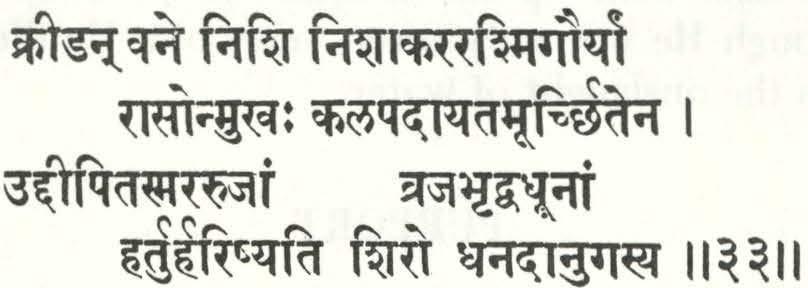
TEXT 33

390 Siimad-Bhagavatam [Canto 2, Ch. 7
kriflan vane niSi nisiikara-rasmi-gauryiirh riis onmukha[l kala-padiiyata-murcchitena uddipita-smara-rujiirh vraja-bhrd-vadhuniirh hartur har4yati siro dhanadiinugasya
kripan-while engagedin His pastimes; vane-in the forest of Vrndavana; niSi-nocturnal; nisiikara-the moon; rasmi-gauryam-white moonshine; riisa-unmukha�-desiring to dance with; kala-padiiyata-accompanied by sweet songs; murcchitena-and melodious music; uddipita-awakened; smara-rujiim-sex desires; vraja-bhrt-theinhabitantsof Vrajabhumi; vadhiinam-of the wives; hartu�-of the kidnappers; hari�yati-will vanquish; sira�-the head; dhanada-anugasya-of the follower of the rich Kuvera.
PURPORT
When the Lord was engaged in His pastimes of the rasa dance in the forest of vrndavana, enlivening the sexual desires of the wives of the inhabitants of Vrndavana by sweet and melodious songs, a demon of the name Sankhacii�a, a rich follower of the treasurer of heaven [ Kuvera], kidnapped the damsels, and the Lord severed his head from his trunk.
TRANSLATION
We should carefully note that the statements described herein are the statements of Brahmajl to Narada, and He was speaking to Narada of events that would happen in future during the advent of Lord Kr��a. The pastimes of the Lord are known to the experts who are able to see past, present and future, and Brahmajl, being one of them, foretold what would happen in the future. The killing of Saitkhacu�a by the Lord is a more recent incident, after riisa-lilii, and not exactly a simultaneous affair. In the previous verses we have seen also that the Lord's engagement in the forest fire affairs wasdescribed along with His pastimes of punishing the Kaliya snake, and similarly the pastimes of the riisa dance and the killing of Sailkhacu�a are also describedherein. The adjustment is that all these incidences would take place in the future, after the time when it was being foretold by Brahmaji to Narada. The demon Sankhaciipa was killed by the Lord during His pastimes at Horika in the month of Phalguni, and the same ceremony is still observed in India by the burning of the effigy of Saitkhacii�a one day prior to the Lord's pastimes at Horika generally known as IIoli.
Generally the future appearance and the activities of the Lord or His incarnations areforetold inthe scriptures,andthusthe pseudo-incarnations are unable to cheat persons who are in theknowledge of the events as they are described in the authoritative scriptures.

Text 33) Scheduled Incarnations with Specific Functions 391
TEXTS 34-35 � ��\Cl\ \tfl�� ..... • ,........ ..z::.

�'f.��;n: tf,fqliTOiStf.mT: I
3Trit:q�IIC!'"�ii����rfi
�mmr+--�N������t: II�CJII
if �l ���fi{f�T�f:l 3lT�T'11!
r.tlW.flllt����mtm: I
ye cu prulumbu-lihrLm-durduruhdy-ari�fanwllcbhu-kurhsu-yuvuniifz l.:up i-paur-l)rukiidyiifz unye ca siilvu-ltuja-brdvrda-danlllllllkrrtWfJliJ1.-�u-sum bara-vidiiralhu-ru ktlli-mukh.vii[L
ye vii mrdhe sum ili-siilinu iilluciipiifz hiimboja-nwls.yu-ku.ru-srii.juya-l.:aikayiidyii[L yiisyanty adarsanam alum bala-piirtha-bhimavyiijiihvuyena hari[Lii nilayarh tadiyam
ye-all those; ca-totally; pralamba-the demon namedPralamba;khara �ardhavasura; dardura-Bakasura; kc5i-the Ke81 demon; ari§{a-the mon Ari�tasura; malla-a wrestler in the court of Kamsa; ibhaJvalayaplc)a; kamsa-the King of Mathura and the maternal uncle of !?�a; yavanii[l-the kings of Persia and other adjoining places; kapirivida; pau!l!iraka-iidyiifz-Pau��raka and others; anye-others; ca-as Jch as; siilvu-King Salva; kuja-Narakasura; balvala-King Balvala; ntavakra-the brother of Sisupala, a dead rival of Kr��a's; saptok§angSaptok�a;sambara-King Sambara;viduratha-King Vidiiratha; rukmi:tkhyii[l-Lhe brother of Rukmil)l, the first Queen of Kg;J;ta at Dvaraka. -all those; oo-eilhf�r; mrcJhe-in the balllefield; samiti-siilina[l-all ry pow1:rful;iitta-ciipiifz-wellequippedwithbowsandarrows;kiimboja1: King of Kamhoja; matsya-Lhe King ofDvarbhariga; kum-the sons of •rlarafi�ra; .�rii.juya- King Spijaya;kaikaya-iidyiifz-theKingofKekayaand •wrs; yrl.�yanti-would attain;adarsanam-impersonal merging within the r1hmajyoti; alam - whal to speak of; bala-Baladeva, the elder brother of

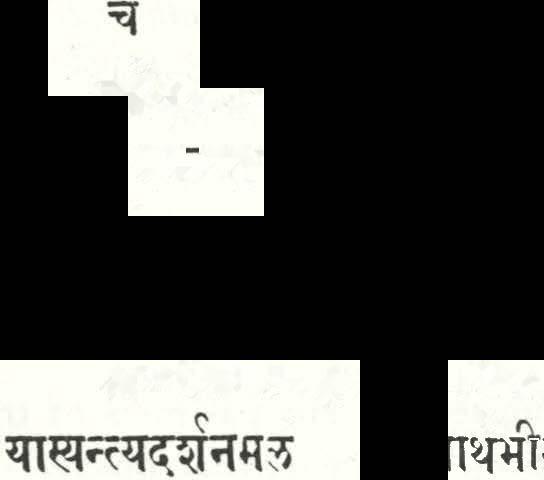
2 �)J'imad-llhilgavalam
[ C<mlo 2, Ch. 7
�
•
T;{� Q<::"lii�J:_II�'-\II
C' ��t:� �ftun
Kr�Qa; partha-A�una; bhima-thesecond PaQI;lava; vyaja-ahvayena-by the false names; hari!lii-by Lord Hari; nilayam-the abode; tadiyam-of Him.

TRANSLATION
All demonic personalities like Pralamba, Dhenuka, Baka, Kesi, Ari&ta, Ca�ura, MuHika, Kuvalayapi�a elephant, Kamsa, Yavana, Narakasura, and PauQc:h·aka, and great marshals like Salva, Dvivida monkey, and Balvala, Danlavakra, the seven bulls, Sambara, Viduratha and Rukmi, as also great warriors like Kamboja, Matsya, Kuru, Sp'ijaya and Kekaya, would all fight vigorously, either with the Lord Hari directly or with Him under His names of Baladeva, Arjuna, Bhima, etc.And thedemons, thus being killed, would attain either the impersonal brahmajyoti or His personal abode in the VaikuQtha planets.
PURPORT
All manifestations, both in the material and spiritual worlds, are demonstrations of the different potencies of Lord Kf�Q.a. The Personality of Godhead Baladeva is llis immediate personal expansion, and Bhima, A�una, etc. , are His personal associates. The Lord would appear (and He dot�s so whenever He appears) with all His associates and potencies. Tlwrdon� Ll11� rcbdlious S(}uls, like the demons and dt�moniac men, menLimu�d by rwnws likt' Pralamba, dt:., would bt� killed either by the Lord llirnsd f or hy I lis ussot:iates. All these uffairs will be cl('arly ex plained in the Tenth Canto. But we should know well that all the above-mentioned livinl!: 1�ntiti1�s kill1�d would uttain salvation either IJy being merged in Llw brahmajyoti of the Lord or being allowed to enter into the abodes of the Lord called VaikuQ�has. This is already explained by Bhil?madeva ( First Canto). All persons who participated in the Battlefield of Kurukl?etra or otherwise with the Lord or with Baladcva, etc., would be benefit kd by attaining spiritual existence according to the situation of Llw mind at the time of death. Those who recogniz ed Llu� Lord would 1�11ler Vuikup!lra, and those who estimated the Lord as a powtTful being only would atlain salvation by merging into the spiritu al cxistcnc1� of tht' impt'rsonal bmlrnwj_yoli of thl� Lord. But CVITY OIW or ti H�lll would gl'l release from rnalcrial l�xistcrH:I�. Since Sllt:h is Llw ht�ndit or !hose who played wilh lire Lord inirn ieuiJy, OIH� 1:an i rnal!:iiH� whal would Ill' !he position of lfro:-;c who fh�voully Sl�rv<�d Llu� Lord ill lrallscclldl�lllal rclaliollslrip willr llir11.
Texts 34-35 J Scheduled Incarnations with Specific Functions 393
TEXT 36

kiilena milita-dhiyiim avamrsya nftliirh
stokiiyu§iirh sva-nigamo bata dura-piira�
iivirhitas tv anuyugarh sa hi satyavatyiirh
veda-drumarh vita-paso vibhaji§yati sma
kiilena-in course of time; milita-dhiyiim-of the lessintelligent persons; avamrsya-considering the difficulties; nfr-iim-of humanity at large; stoka-iiyu§iim-of the short-living persons; sva-nigama� -the Vedic literatures compiled by him; bata- exactly; dura-piira�- greatly difficult; iivirhita�- having appeared as; tu-but; anuyugam-in terms of the age; sa�-He, the Lord; hi-certainly; satyavatyiim:._in the womb of Satyavati; veda-drumam-the desire tree of the Vedas; vita-pa§a�-by division of branches; vibhaji§yati-would divide;sma-as it were.
TRANSLATION
The Lord Himself in His incarnation as the son of Satyavati [Vyasadeva] would consider His compilation of the Vedic literature to be very difficult for the less intelligent persons with short life, and thus He would divide the tree of Vedic knowledge into different branches, according to the circumstances of the particular age.
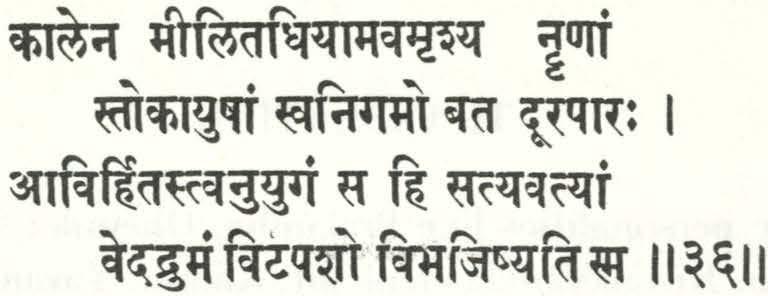
PURPORT
Herc:in Brahma mentions the futurecompilationof Srimad-Bhiigavatam for the short-lived persons of the Kali age. As explained in the First Canto, Lhe less in tellig1mt persons ofthe age ofKali would be not only short-lived, buL also perplexed with so many problems of life due to the awkward situalion of the godless human society. Advancement of material com-
394 Srimad-Bhagavatam [Canto 2, Ch. 7
fortsofthebodyis activityinthemode ofignoranceaccordingto the laws of material nature. Real advancement of knowledge means progress of knowledge in self-realization. But in the age of Kali the less intelligent men mistakenly consider the short lifetime of one hundred years (now factually reduced to about forty or sixty years) to be aU in all. They are less intelligent because they have no information of the eternity of life, and they identify with the temporary material body existing for forty years and consider it the only basic principle oflife.Such persons are described as equal to the asses and bulls. But the Lord, as the compassionate father of all living beings, imparts unto them the vast Vedic knowledge in short treatises like the Bhagavad-gitii and, forthe graduates,the Srimad-Bhiigavatam. The Puriir-as andtheMahiibhiirata are alsosimilarly madeby Vyasadevaforthedifferent types of men in the modes of material nature. But none of them are independent of the Vedicprinciples.
TEXT 37

deva-dvi§iirh nigama-vartmani ni�thitiiniim purbhir mayena vihitiibhir ad.riya-turbhi[!
lokiin ghnatiim mati-vimoham atipralobham
ve§am vidhiiya bahu bhii§yata aupadharmyam
deva-dvi§iim-of those who were envious of the devotees of the Lord; nigama-t he Vedas; vartmani-on the path of; ni§thitiiniim-of the well situated; purbhi[!-by rockets; mayena- made by thegreatscientist Maya; vihitiibhi[!-made by; adrsya-tUrbhilz-unseen in the sky; lokiin-the different planets; ghnatiim-of the killers; mati-vimoham-bewilderment of the mind; atipralobham-very attractive; ve§am-dress; vidhiiya- having done so; bahu bhii§yate- would talk very much; aupadharmyam- subreligious principles.
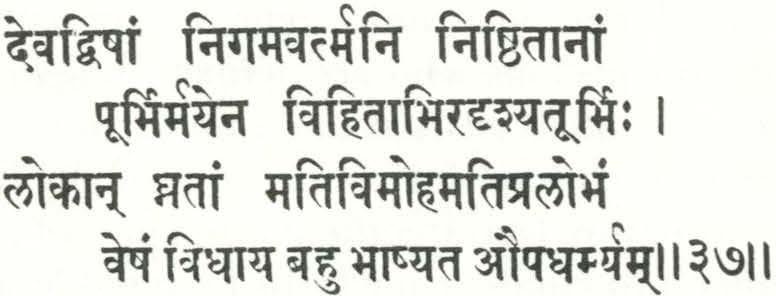
Text 37) Scheduled Incarnations with Specific Functions 395
When the atheists, after being well versed in the Vedic scientific knowledge,would annihilate inhabitants of different planets, flying unseen in the sky on well-built rockets prepared by the great scientist Maya, the Lord would bewilder their minds by dressing Himself attractively as Buddha and would preach on subreligious principles.
PURPORT
This incarnation of Lord Buddha is not exactly the same Buddha incarnation as we have in the present history of mankind. According to Srila ]iva Gosvami, the Buddha incarnation mentioned in this verse appeared in a different Kali age. In the duration of life of one Manu there are more than seventy-two Kali-yugas, and in one of them the particular type of Buddha mentioned here would appear. Lord Buddha incarnates at a time when the people are most materialistic and preaches common-sense religious principies. Such ahirhsii is not a religious principle itself, but it is an important quality for persons who are actually religious. It is a commonsense religion because one is advised to do no harm to any other animal or living being because such harmful actions are equally harmful to him who does the harm. But before learning these principles of nonviolence one has to learn two other principles, namely to be humble and to be prideless. Unless one is humble and prideless, one cannot be harmless and nonviolent. And after being nonviolent one has to learn tolerance and simplicity of living. One must offer respects to the great religious preachers and spiritualleaders and alsotrain the senses for controlled action, learning to be unattached to family and home, and enacting devotional service to Lh1: Lord, etc. At the ultimate stage one has to accept the Lord and become llii-i 1kvotce; otherwise there is no religion. In religious principles there must be God in the center; otherwise simple moral instructions are simply subreligious principles, generally known as upadharma, or nearness to religious principles.
TEXT 38

396 Snmad-Bhagavatam [Canto 2, Ch. 7
TRANSLATION
�����fq�::mt t:� �: em�:��: tff'1fo�fu.jJiJio:{T ��T �:I
yarhy iilaye�v api satiirh na hare� kathii� syu� pii�a[!flino dvija-janii V[§Ulii nrdevii�
sviihii svadhii v�afl iti sma giro na yatra siistii bhavi§yati kaler bhagaviin yugiinte
yarhi-when it would so happen; iilaye§u-in the residence of; api-even; satiim-civilized gentlemen; na-no; harefi,-of the Personality of Godhead; kathii�-topics; syu�-would take place; pii§a!1flina�-atheists; dvija-janiifi.persons declaring themselves to be the higher three classes (briihma11as, k�atriyas and vai.Syas); vr� alii�- the lower class sudras; nr-deva�-ministers of the government; sviihii-hymns to perform sacrifices; svadhii-the ingredients to perform sacrifices; va�at-the altar of sacrifice; iti-all these; sma-shall; giraf!,-words; na-never; yatra-anywhere; sastii-the chastiser; bhavi�yati- wouldappear; kale �-of the Kali age; bhagaviin-t.he Personality of Godhead; yuga-an te-at the end of.
TRANSLATION
Thereafter, at the end of Kali-yuga, when there would exist no topics on the subject of God, even at the residences of so-called saints and respectable gentlemen of the three higher castes, and when the power of government would be transferred to the hands of ministers elected from the lowborn siidra class or those less than them, and when there would be nothing known of the techniques of sacrifice, even by word, at that time the Lord would appear as the supreme chastiser.

PURPORT
The symptoms of the worst conditions of the material world, at the last stage of this age, called Kali-yuga, are stated herein. The sum and substance of such conditions is godlessness. Even the so-caJied saints and higher castes of the social orders, generally known as the dvija-janas or Lhe twiceborn, will become atheists. As such, all of them will practically forgel even the holy name of the Lord, and what to speak of His aclivilies. The higher castes of society, namely the intelligent class of men guiding the destinies
Text 38] Scheduled Incarnations with Specific Functions r-.. ,....... ,..... .... �m �:n ��fij � r�t ;J �=:.t
�+i�f>�RJ�iffi"i:_�� 11��11
397
of the social orders, the administrative class of men guiding the law and order ofthe society, and the productive class of men guiding the economic development of the society, must all be properly well versed in knowledge of the Supreme Lord, knowing factually His name, quality, pastimes, entourage, paraphernalia and personalities. The saints and the higher castes or orders of the society are judged by their proportion of knowledge in the science of God,or tattva-jii.iina, and not by any kind of birthright or bodily designations. Such designations, without any knowledge of the science of God and practical knowledge of devotional service, are considered to be but decorations of dead bodies. And when there is too much inflation of these decorated dead bodies in society, there develop so many anomalies in the progressive, peaceful life of the human being. Because of the lack of training or culture in the upper section of the social orders, they are no moreto bedesignated asthe dvija-janas, or the twice-born. The significance of being twice-born has been explained in many places in these great literatures, and again one i� being reminded herewith that birth, executed by the sex life of the father and the mother, is called animal birth. But such animal birth and progress of life on the animal principles of eating, sleeping, fearing and mating (without any scientific culture of spiritual life) is called the sudra life, or, to be more explicit, the uncultured life of the lower class of men. It is stated herein that the governmental power of the society in the Kali-yuga would be passed over to the uncultured, godless laborer classes of men, and thus the nrdevas (or the ministers of the government) would be the vnalas, or the uncultured lower-class men of society. No one can expect any peace and prosperity in a human society full of uncultured lower classes of men. The symptoms of such uncultured social animals are already in vogue, and it is the duty of the leaders of men to take note of it and try to reform the social order by introducing the principles of twice-born men trained in the science of God consciousness. This can be done by expanding the culture of Srimad-Bhiigavatam all over the world. In the degraded condition of the human society, the Lord incarnates as the Kalki avatiira and kills all the demonic without mercy.

398 Snmad-Bhagavatam [Canto 2, Ch. 7
TEXT 39 � ijtflS��l � � ��T: �Tij9.J �JRC{'Ff't{l��1�u: I
sarge tapo'ham ;l'§ayo nava ye prajesii�
sthiine 'tha dharma-makha-manv-amariivanisiift ante tv adharma-hara-manyuvasiisuriidyii
miiyii-vibhutaya imiift puru-sakli-bhiijaft

sarge-in the beginning of the creation; tapaft-penance; aham-myself; �aya[1-sages;nava-nine;ye prajesiift-those who would generate;sthiinein the middle while maintaining the creation; atha- certa inly ; dharma-religion; makha-Lord Vi�!J-U; manu-the father of mankind; amara-the demigods deputed to control the affairs of maintenance;avanisii�-and the kings of different planets;ante-at the end;tu-but;adharma-irreligion; hara-Lord Siva; manyu-vasa-subjected to anger; asu.ra-lidyiift-atheists, the enemies of the devotees;maya-energy;vibhutayaft-powerful representatives; ima�-al1 of them; puru-sakti-bhajaft- of the Supreme Powerful Lord.
TRANSLATION
At the beginning of creation there is penance, myself [Brahm a), the Prajapatis, and great sages who generate; then, during the maintenance of the creation, there is Lord Vi�!lu, the demigods with controlling powers, and the kings of different planets. But at the end there is irreligion, and then Lord Siva and the atheists full of anger, etc. All of them are different representative manifestations of the energy of the supreme power, the Lord.
PURPORT
The material world is created by the energy of the Lord, which is manifested in the beginning of the creation by the penance of Brahmajl, the first living being in the creation, and then there are the nine Prajapatis, known as great sages. In the stage when the creation is maintained, there are devotional service to Lord Vi§ii)U, or factual religion, the di fferent demigods, and the kings of different planets who maintain the world. At last, when the creation is preparing to wind up, there is first the principle of irreligion, then Lord Siva along with the atheists, full

Text 39] Scheduled Incarnations with Specific Functions
399
of anger. But all of them are but different manifestations of the Supreme Lord. Therefore Brahma, Vi�pu and Mahadeva (Siva) are different incarnations of the different modes of material nature. Visnu is the Lord of the mode of goodness. Brahma is the lord of the mod� of passion, and Siva is the lord of the mode of ignorance. Ultimately, the material creation is but a temporary manifestation meant to give the chance of liberation to the conditioned souls who are entrapped in the material world, and one who develops the mode of goodness under the protection of Lord Vi;;vu has the greatest chance of being liberated by following the Vaig1ava principles and thus being promoted to the kingdom of God, no more to return to this miserable material world.
TEXT 40

ft�on� ��il�Jl9tr ���
�:tnf'�trN�fWiqir ��ffi 1
� �: �����m N'l�
vi§[wr nu virya-garwniirh katamo'rhatiha
yaft piirthiviiny api kavir vimame rajiirhsi
caskambha yaft sva-rahasiiskhalatii tri-p.T§tharh
yasmiit tri-siimya-sadaniid uru-kampayiinam
v4f1o[l-of Lord Vi�pu; nu-but;virya-prowess; garwniim-in the matter of accounting; katama[t-who else; arhati-is able to do it; iha-in this world; ya[t-one who; piirthiviini-the atoms; api-also; kavi[t-great scientist; vimame-might have counted; rajiimsi-particles; caskambha-could catch; ya[t-one who; sva-rahasii-by His own leg;askhalatii-without being hampered; tri-p.T§tham-the topmost planetary space; yasmiit-by which; tri-siimya-the neutral state of the three modes; sadaniit-up to that place; um-kampayiinam-moving very greatly.
TRANSLATION
Who can describe completely the prowess of Vi��u? Even the scientist, who might have counted the particles of the atoms of the universe, cannot
400 Srimad-Bhagavatam [Canto 2, Ch. 7
do so. Because it is He only who, in His form of Trivikrama, moved Hisleg effortlessly beyond the topmost planet, Satyaloka, up to the neutral state of the three modes of material nature. And all were moved.
PURPORT
The highest scientific advancement of the material scientist is atomic energy. But the material scientist is not able to have an estimation of the particles of atoms contained in the whole of the universe. But even if one is able to count such atomic particles or is able to roll up the sky, like one's bedding, even then one is unable to estimate the extent of the prowess and energy of the Supreme Lord. He is known as Trivikrama because once, in His incarnation of Vamana, He expanded His legbeyond the highest planetary system of Satyaloka and reached the neutral stateof the modes of nature called the covering of the material world. There are seven layers of material coverings over the material sky, and the Lord could penetrate even those coverings. And with His toe He made a hole through which the water of the Causal Ocean filters into the material sky, and the current is known as the sacred Ganges, which purifies the planets of the three worlds.In other words,no one is equal to thetranscendentally powerful Vi�I)U. He is omnipotent, and no one is equal to or greater than Him.
TEXT 41

;n;� Nwtr��t ����
iW-fN� �� �StfU � I
;yftf"l_ �IJTT'l. �m;{';{ �: �fjts��+rwfflon�m1{,!I��II
niintam vidiimy aham ami munayo'gra-jiis te miiyii-balasya puru§asya kuto'varii ye
giiyan gurtiin dasa-satiinana iidi-devaft
se§o'dhuniipi samavasyati niisya piiram
na-never ; antam-end; vidami-do I know; aham-myself; ami-and all those; munaya{l- great sages; agra-jii{l-born prior Lo yourself; te-you ; miiyii-balasya-of the omnipotent; purU§asya-of the Personality of God-
Text 41] Scheduled Incarnations with Specific Functions 401
head; kuta�-what to speak of others; avarii�-born after us; ye- t hose gayan-by singing; gur-an-the qualities; da.Sa-sata-anana�-orw who has ten hundred faces; adi-deva�-the first incarnation of the Lord; .Se$a�-known as Se�a; adhunii-up to date; api-- even; samavasyati-can achieve; na-not: asya-of Him ; piiram- limit.

TRANSLATION


Neither myself nor all the sages who were born before you know fully the omnipotent Personality of Godhead. So what can others, who are born after us, know about Him? Even the first incarnation of the Lord. namely Se�a, has not been able to reach the limit of such knowledge, although He is describing the qualities of the Lord with ten hundred faces.
PURPORT
The omnipotent Personality of Godhead has primarily three potentiaJ manifestations, namely internal, external, and marginal potencies, with unlimited expansions of these three energies. As such, the potential expansions can never be caJculated by anyone because even the Personality of God Himself, as the incarnation of Se�a, could not estimate the potencies, although He has been describing them continuaJly with His om thousand faces.
yefiiim sa e�a bhagaviin dayayed ananta� sarviitmanasrita-pado yadi nirvyalikam te dustariim atitaranti ca deva-mayam nai�am mamaham iti dhift sva-srgala-bhak$ye

402 Srimad-Bhagavatam [Canto 2, Ch. �
TEXT 42 "' � � �rr;n;{ ���;:r�: ��r�;r.nr�(ftfGJ��r��, �nm����� "' • �(l'ild'd'(l� � �'iP'IT �trt�f'IRrm: ���it������
ye§ll!ll-unlothose only;sa[l.-the Lord;e§a[l.-the;bhagavan-the Personality of Godhead; dayayet-does bestow His mercy; ananta[l.-the unlimited potential;sarva-atmana-by all means without reservation;asrita-pada[l. -surrendered soul; yadi-if such surrender;nirvyalikam-without pretention; te-Lhose only; dustaram-insurmountable;atitaranti-can overcome; ca-and the paraphernalia; deva-mayam-diverse energies of the Lord;nanot;e§am-ofthem;mama-mine;aham-myself;iti-thus;dhi[l,-conscious; sva-dogs;srgala-jackals; bhak§ye-in the matter of eating.
TRANSLATION
But anyone who is specifically favored by the Supreme Lord, the Personality of Godhead, due to unalloyed surrender unto the service of the Lord, can overcome the insurmountable ocean of illusion and can understand the Lord also. But those who are attached to this body, which is meant to be eaten up at the end by dogs and jackals, cannot do so.

PURPORT
The unalloyed devotees of the Lord know the glories of the Lord in the sense that they can understand how great the Lord is and how great is His expansion of diverse energy. Those who are attached to the perishable body can hardly enter into the realm of the science of Godhead. The whole materialistic world, based on the conception of the material body as the self, is ignorant of the science of God. The materialist is always busy working for the welfare of the material body, not only of his own but also that of his children, kinsmen, communitymen, countrymen, etc. They have many branches of philanthropic and altruistic activities from a political, national, and international angle of vision, but none of the field work can go beyond the jurisdiction of the misconception of identifying the material body with the spirit soul. Unless, therefore, one is saved from the wrong conception of the body and the soul, there is no knowledge of Godhead, and unless there is knowledge of God, all advancement of malerial civilization, however dazzling, should be considered to be a failure.
Text 42) Scheduled Incarnations with Specific Functions 403
TEXTS
vediiham anga paramasya hi yoga-miiyiirh
yuyarh bhavas ca bhagaviin atha daitya-varyaft
patni manoft sa ca manus ca tad-iitmajiis ca priicinabarhir rbhur anga uta dhruvaS ca
ik§viikur aila-mucukunda-videha-giidhiraghv-amban§a-sagarii gaya-niihu§iidyii[!
miindhiitralarka-satadhanvanu-rantidevii devavrato balir amurttarayo dilipaft
saubharyutanka-sibi-devala-pippaliidasiirasvatoddhava-pariisara-bhuri§ertiift ye 'nye vibhi§arta-haniimad-upendradattapiirthiir§ti§erta-vidura-srutadeva-varyiift

veda-know it; aham-myself; anga-0 Narada; paramasya-of the Supreme; hi-certainly; yoga-miiyiim-potency; yuyam-yourself; bhavaftSiva; ca-and; bhagaviin-the great demigod; atha-as also; daitya-varyaft





Prahlada Maharaja, the great devotee of the Lord born in the family of the atheist; patni-Satarupa; manoft-of Manu; saft-he; ca-also; manuft-
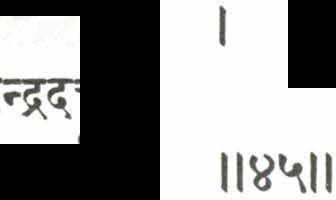
404 ::;nmad-Hhagavatam
43-45 " '"' . � � 'lll•l'iltfT • � <:' Tt ��� �� ���:q:I LCanto Z, Ch_ 7 ��: � :q 'i����T� Sll+llfNrn:� � ������II �������W1TN'��u ;p;r;JJiqiQt: 1 ���trl � �1R��:ql �: 11'6'611 �1ij�furat�OE4�fqtq��'"' "' �ij14Aq{I�I{�Rqan:
Svayambhuva;ca-and;tat-atmaja� ca-and his children like Priyavrata, Uttanapada, Devahiiti, etc.

TRANSLATION
0 Narada, although the potencies of the Lord are unknowable and immeasurable, still, because we are all surrendered souls, we know how He acts through yogamaya potencies. And, similarly, the all-powerful Siva, the great king of the atheist family, namely Prahlada Maharaja, Svayambhuva Manu, his wife Satariipa, his sons and daughters like Priyavrata, UWinapada, Akiiti, Devahiiti, Prasiiti, etc., Pracinabarhi, ltbhu, Ariga the father of Vena, Maharaja Dhruva, l�vaku, Aila, Mucukunda, Maharaja Janaka, Gadhi, Raghu, Ambari�a, Sagara, Gaya, Nahu�a, Mandhata, Alarka, Satadhanu, Anu, Rantideva, Bhi�a, Bali, Amiirtaraya, Dilipa, Saubhari, Utarika, Sibi, Devala, Pippalada, Sarasvata, Uddhava, Parasara, Bhiiri�J.la, Vibhi�aJ.la, Haniiman, Sukadeva Gosvam1, Arjuna, Ar�ti�ena, Vidura, Srutadeva, etc., all also know the potencies of the Lord.
PURPORT
All the great devotees of the Lord, as mentioned above, who flourished in the past or present, and all devotees of the Lord who will come in the future, are aware of the different potencies of the Lord along with the potency of His name, quality, pastimes, entourage, personality, etc. And how do they know? Certainly it is not by mental speculation, nor by any attempt by dint of limited instruments of knowledge. By the limited instruments of knowledge (either senses or the material instruments like microscopes and telescopes) one cannot even fully know the Lord's material potencies, which are manifested before our eyes. For example there are many millions and billions of planets far, far beyond the scientist's calculation. But these are only the manifestations of the Lord's material energy. What can the scientist hope to know of the spiritual potency of the Lord by such material efforts? Mental speculations, by adding some dozens of "if's" and "maybe's," cannot aidthe advancement of knowledge -on the contrary, such mental speculation will only end in despair by dismissing the case abruptly and declaring the nonexistence of God. The sane person, therefore, ceases to speculate on subjects beyond the jurisdiction of his tiny brain, and as a matter of course he tries to learn to surrender unto the Supreme Lord, who alone can lead one to the platform
Texts 43-45] Scheduled Incarnations with Specific Functions 405
of real knowledge. In the Upani§ads it is clearly said that the Supreme Personality of Godhead can never be known simply by working very hard and taxing the good brain, nor can He be known simply by mental speculation and jugglery of words. The Lord is knowable only by one who is a surrendered souL Herein Brahmaji, the greatest of all material living beings, acknowledges this truth. Therefore, the fruitless spoiling of energy by pursuingthe path of experimental knowledge mustbe given up. One should gain knowledge by surrendering unto the Lord and by acknowledging the authority of the persons mentioned herein. The Lord is unlimited and, by the grace of the yogamiiyii, helps the surrendered soul to know Him proportionately with the advance of one's surrendering process.
te vai vidanty atitaranti ca deva-miiyiim stri-sudra-hii[La-sabarii api piipa-fivii{t yady adbhuta-krama-pariiyar-a-sila-sik§iis tiryag-janii api kim u sruta-dhiirar-ii ye

te-such persons; vai-undoubtedly; vidanti-do know; atitaranti-surpass; ca-also; deva-miiyiim-the covering energy of the Lord; stri-such as women; sudra-the laborer class of men; hur-a-the mountaineers; sabarii{lthe Siberians, or those lower than the sudras; api-although; piipa-jiviiftsinful living beings; yadi- provided; adbhuta-krama-one whose acts are so wonderful; pariiya[La-those who are devotees; sila-behavior; sik§ii{ltrained up by, tiryak-janii"{t-even those who are not human beings; apialso; kim-what; u-to speak of; sruta-dhii ra[Lii{t-those who have taken to the idea of the Lord by hearing about Him; ye-those.

TRANSLATION
Surrendered souls, even from the groups leading sinful lives, such as the woman, the laborer class, the mountaineers, the Siberians, etc., or
406 Srimad-Bhagavatam [Canto 2, Ch. 7
��f€l�r�tl� :q �T �q�u 3lf1�'Tern 1 ����;rr 3lA��utlit II�G.II
TEXT 46
even the birds and beasts, can also know about the science of Godhead and become liberated from the clutches of the illusory energy by surrendering unto the pure devotees of the Lord and by following in their footsteps in devotional service.
PURPORT
Sometimes there are inquiries as to how one can surrender unto the Supreme Lord. In the Bhagavad-gitii (Bg. 18.66) the Lord asked Arjuna to surrender unto Him, and therefore persons unwilling to do so question as to where God is and to whom they should surrender. The answer to such questions or inquiries is given herein very properly. The Personality of Godhead may not be present before one's eyes, butif one is sincere in wanting such guidance the Lord will send a bona fide person who can guide one properly back to home, back to Godhead. There is no need of material qualifications for making progress in the path of spiritual realization. In the material world, when one accepts some particular type of service, he is required to possess some particular type of qualification also. Without this one is unfit for such service. But in the devotional service of the Lord the only qualification required is surrender. Surrendering oneself is in one's own hand.If one likes,he can surrender immediately without any delay, and that begins his spiritual life. The bona fide representative of God is as good as God Himself. Or, in other words, the loving representative of the Lord is more kind and more easy to approach. A sinful soul cannot approach the Lord directly, but such a sinful man can very easily approach a pure devotee of the Lord. And if one agrees to put himself under the guidance of such a devotee of the Lord, he can also understand the science of God and can also become like the transcendental pure devotee of the Lord and thus get his liberation back to Godhead, back home for eternalhappiness.


Sorealization ofthe science ofGodhead andrelieffromthe unnecessary, uselessstrugglefor existenceare notat alldifficultforthe willingcandidate. But they are very difficult for persons who are not surrendered souls but only simple, profitless speculators.

Text 47] Scheduled Incarnations with Specific Functions 407
TEXT 47 � st�tlret'tllti m�1mf m:� �: q(+{k¥4<1+44( I � o:r � �(ithi(i:h€41"{ �q� � w-��¥{(0{(
'R��

sasvat praSiintam abhayarh pratibodha-miitrarh
suddharh samarh sad-asata[l paramiitma-lallvam sabdo na yatra puru-kiirakaviin kriyiirtho
miiyii paraity abhimukhe ca vilajjamiinii tad vai padarh bhagavata[l, paramasya purhso
brahmeti yad vidur ajasra-sukharh visokam
saSvat-eternal; prasiintam-without disturbance; abhayam-without fear pratibodha-miitram-a consciousness opposed to the material counterpart suddham-uncontaminated;samam-without distinction;sat-asataft- of th< cause and e ffect; paramiitma-laltvam-the principle of primeval cause sabdaft-speculative sound ; na-not; yatra-where there is; puru-kiirakaviir -resulting infruitive action; kriyii-artha{t-for the matterof sacrifice; miiyi -iUusion; paraiti-flies away ; abhimukhe- in front of; ca-also; vilajjamiint -being ashamed of; tat-that ; vai-is certainly; padam- ultimate phase bhagavata{t-of the Personality of Godhead; paramasya-of the Supreme purhsa{t-of the person; brahma-the Absolute; iti-thus; yat- which ; viduf --known as; ajasra-unlimited; sukham-happiness; viSokam-without grief
TRANSLATION
What is realized as the Absolute Brahman is full of unlimited bli& without grief. That is certainly the ultimate phase of the supreme enjoyer the Personality of Godhead. He is eternally void of all disturbances, with out any fear, complete consciousness as opposed to matter, uncontam inated, without any distinction, the principle primeval cause of all causel and effects, in whom there is no sacrifice for fruitive activities, and ir whom the illusory energy does not stand.
PURPORT
The suprern<� enjoyer, Personality of Godhead, is the Supreme Brahman or th<� summum bonum heeause of His �u:ing the supreme cause of all <:aus<�s. 'nu� <:one<:ption of imp<:rsonal Brahman n:alizalion is the first step. dw� to IIis disliru:Lion from Lh<� illusory <:orH:<:ption of material <�xislcnce. In olh<�r words, irn ru�rsonal Brahrnan is a f<�alun� of Lh<� A bsolule dislincl
408 Srimad-Bhagavatam .�e. • • ..... �ef��:
[Canto 2, Ch. �
�ftf�f��ftf5J�11�\911
from th<� mat<�rial variegatedness, just as light is a conct�ption distinct from its counterpart, uarktwss. But the light has its variegatedness, which is seen by thos<� who furth<�r advance in th(� light, and thusthe ultimate reali:wtion of Brahman is the source of the Brahman light, the SupremePersonality of Godhead, the summum bonum or the ultimate source of everything. Therdore, meding the Personality of Godhead includes the realization of the impersonal Brahman as reali.,ed a1 first in contrast with material inebriet y. The Personality of Godhead is the third step of Brahman realization. As explained in the First Canto, one must understand all three features of the Absolute-Brahman, Pararnatma, and Bhagavan.

Pratibodha-miitram isjust theopposite conception of material existence. ln matter there are material miseries, and thus in the first realization of Brahman there is the negation of such material inebrieties and a feeling of eternal existence distinct from the pangs of birth and death, disease and old age. That is the primary conception of impersonal Brahman.
The Supreme Lord is the Supreme Soul of everything, and therefore in the supreme conception affection is realized. The conception of affection is due to the relationship of soul to soul. A father is affectionate to his son because there is some relationship of nearness between the son and the father. But that sort of affection in the material world is full of inebriety. When the Personality of Godhead is met, the fullness of affection becomes manifested because of the reality of the affectionate relationship. He is not the object of affection by material tinges of body and mind, but He is the full, naked uncontaminated object of affection for all living entities because He is the Supersoul or Paramatma within everyone's heart. In the liberated state of affairs, the full-fledged affection for the Lord is awakened.
As such, there is an unlimited flow of happiness, everlasting, without any fear of being broken as we have experienced here in the material world. The relationship with the Lord is never broken; thus there is no grief and no fear. Such happiness is inexplicable by words, and there can be no attempt to generate such happiness by fruitive activities by arrangement and sacrifices. But we must know also that happiness, unbroken happiness,exchangedwith the Supreme Person,the Personality of Godh<�ad as described in this verse, transcends the impersonal conception of the Upani§ads. Jn the Upani§ads the description is more or less negation of the material conception of things, but this is not denial of the transcend(�ntal senses of the Supreme Lord. Herein also the same is affirmed in the statements about th(� material dem(�nts; tlu�y an� all tramwcndcntal, free from all contamination of material identification. And also the liberated souls
Text 47) Scheduled Incarnations with Specific Functions 409
an: not devoid of senses; otherwise there cannot be any reciprocation oi unhampered spiritual happiness exchanged belween them in spunlancou� unbrokt:n joy. All the senses, both of the Lord and of the dcvolees, an without any material c_ontamination. They arc so because they are beyond the material cause and effects, as it is clearlymentioned herein (sad-asata{l, param). The illusory material energy cannot work there, being ashamed before the Lord and Histranscendental devotees. In the material world the sense activities are not without grief, but here it is clearly said thal the senses of the Lord and the devotees are without any grief. There is a distinct difference between the material and spiritual senses. And it should be understood without denying the spiritual senses because of a material conception.
The senses in the material world are surcharged with material ignorance. In every way the authorities have recommended purification of the scnseE fromthe material conception. In the material world thesenses are manipulated forindividualand personal satisfaction, whereas in the spiritual world thesenses are properly used for the purpose for which they were originally meant, namely the satisfaction of the Supreme Lord. Such sensual activities arc natural, and therefore sense gratification there is uninterrupted and unbroken by material contamination because the senses are spiritually purified. And such satisfaction of the senses is equally shared by the transcendental reciprocators. Since the activities are unlimited and constantly increasing, there is no scope for material attempts or artificial arrangements. Such happiness of transcendental quality is called brahmasaukhyam, which will be clearly described in the Fifth Canto.
TEXT 48

sadhryan niyamya yatayo yama-karta-hetim jahyu{l svariip iva nipiina-khanitram indr a{l
sadhryah - artificial mentalspeculation or meditation; n iyam_ ya-controlling; yataya{l-the mystics; yama-karta-hetim-the process of spiritualculturc; jahyuft-are given up; svariit-fully independent; iva-as; nipiina-well; k� anitram-trouble for digging; in dra[l-the controlling demigod supplying rams.

410 Srimad-Bhagavatam L Canto 2, Ch. 7
In such a transcendental stale there is no need of artificial control of the mind, mental speculation or meditation, as performed by the jnanis and yogis. Such processes are given up, as the heavenly King, Indra, does not take the trouble to dig a well.

PURPORT

A poor man in want of water digs a well and undertakes the trouble of digging. Similarly, those who are poor in transcendental realiz.ation speculate on the mind or meditate by controlling the senses. But they do not know that such control of the senses and achievement of spiritual perfection are simultaneously made possible as soon as one is factually engaged in the transcendental loving service of the Supreme Person, the Personality of Godhead. It is for this reason that the great liberated souls also desire to be associated in hearing and chanting the activities of the Lord. The example of lndra is very appropriate in this connection. King lndra of heaven is the controlling deity or demigod for arranging clouds and supplying rains in the universe, and as such he does not have to take the trouble to dig a well for his personal water supply. For him, digging a well for a water supply is simply ludicrous. Similarly, those who are factually engaged in the loving service _of the Lord have attained the ultimate goal of life, and for them there is no need of mental speculation to find out the true nature of God or Hisactivities. Nor do such devotees have to meditate upon the imaginary or realidentity of the Lord. Because they are factually engaged in the transcendental loving service of the Lord, the Lord's pure devotees have already achieved the results of mental speculation and meditation. The real perfection of life is therefore to be engaged in the transcendental loving service of the Lord.

Text 49] Scheduled Incarnations with Specific Functions 411
TRANSLATION
TEXT 49 � � f?f�iFlfol�� "" ��f.Wtl� mt": I � �lt!N•I'if��� ���;{f�ij'�: ����II
sa sreyasiim api vibhur bhagaviin yatu'sya
bhiiva-svabhava-vihitasya sataft prasiddhift

dehe sva-dhiitu-vigame 'nuvisiryamare
vyvmeva tatra puru§o na viSiryate ja{t
saft-He; sreyasiim-all auspiciousness; api- also; vibhuft-l he master; bhagaviin-the Personality of Godhead; yataft--because; asya-of the living entity; bhiiva-natural modes;sva-bhiiva-own constitution; vihitasya-performances; sataft-all good work; prasiddh*- ultimate success; dehe- of the body; sva-dhiitu-forming elements; vigame- being vanquished; annafter; visiryamare- having given up; vyoma- sky ; iva-like ; tatra-thereupon ; pnru§a/t- theliving entity; na-never; viSiryate-becomes vanquished; ajaft- due to being unborn.
TRANSLATION
The Personality of Godhead is the supreme master of everything auspicious because the results of whatever actions are performed by the living being, either in the material or spiritual existence, are awarded by the Lord. As such, He is the ultimate benefactor. Every individual living entity is unborn, and therefore even after the annihilation of the material elementary body, the living entity exists, exactly like the air within the body.
PURPORT
The living entity is unborn and eternal, and as it is confirmed in the Bhagavad-gitii (Bg. 2.30), the living entity is not exhausted even though the mat1�rial elementary body is vanquished. As long as the living entity is in th1: material existence, actions performed by him are rewarded in the next life, or even in the present life. Similarly, in his spiritual life also adions an: rewarded by the Lord by the five kinds of liberation. Even Lhc impersonalist eannot achieve the desired merging into the existence of the Supn�me without being favored by the Supreme Personality of Godhead. It is confirmed in th1� Bhagavad-gitii also (Bg. 4.11) that the Lord awards similar results, as one desires, in one's present life. The living entities are giv1:n fn:1:dom to make their choice, and the Lord awards them accordingly.
It is the duty of everyone, therefore, to worship devoutly only the Personality of Godhead to achieve his desired goal. The impersonalist,
412 Srimad-Bhagavatam [Canto 2, Ch. 7
instead of speculating or meditating, can directly execute the routine devotional service of the Lord and thus easily obtain the desired goal.
The devotees, howt�ver, are naturally inclined to become associates of the Lord without being merged in the spiritual existence, as conceived by the impersonalisl. The devotees, therefore, following their constitutional instincts, achieve the desired goal of becoming servitors, friends, fathers, mothers or conjugal lovers of the Lord. The devotional service of the Lord involves nine transcendental processes of hearing and chanting, etc., and hy performing such easy and natural devotional services the devotees achieve the highest perfeetional results, far, far superior to merging into the (�xistcncc of the Brahman. The devotees are, therefore, never advised to indulge in speculating upon the nature of the Supreme, or artificially meditating on the void.
One should not, however, misunderstand that after the annihilation of this present body there is no body by which one can associate with the Lord face to face. The living entity is unborn. It is not that he is manifest with the creation of the materiaJ body. On the other hand, it is true that the material body develops only by the desire of the living entity. The evolution of the material body is due to such desires of the living being. According to the desires of the living being, the material body develops. So from the spirit soul the material body comes into existence, generated fromthe living force. As the living being is eternal, so he exists just like the air within the body. Air is within and without the body. Therefore when the external covering, the material body, is vanquished, the living spark, like the air within the body, continues to exist. And by the direction of the Lord, because He is the ultimate benefactor, the living entity is at once awarded the necessary spiritual body befitting his association with th1� Lord in the manner of siiriipya (equal bodily feature), siilokya (equal facility to live in the same planet with the Lord), siir§ti (equal possession of opulence like the Lord), and siimipya (1�qual association with Lhc Lord).
The Lord is so kind that even if a devotee of the Lord cannot fulfill tht' complcle course of devotionaJ service unaJloyed and uncontaminated by material association, he is given another chance in the next life by being awarded a birth in the family of a devotee or rich man so that without being engaged in the struggle for material existence, the devotee can finish the remaining purification of his existence and thus immediately, aflt'r relinquishing the present body, go back home, back to Godhead. Thil' is 1:onfirrru�d in the Bhagavad-gitii.
In this (:onru�dion detailed information is available in tht' Wwp;aua/san.darblw of Srila Jiva Gosvami Prabhupada. Once achieving Lhe spiritual

Text 49] Scheduled Incarnations with Specific Functions 413
existence, the devotee is eternally situated there, as already discussed in the previous verse.
TEXT 50

m��sflll���N��: I (1+41�� ��G:;:q�ld\� �d\ 11'-\oll
so 'yam te 'bhihitas tiita bhagaviin visva-bhiivanaft samiisena harer niinyad anyasmiit sad-asac ca yat
saft-that; ayam-the same; te-unto you; abhihitaft- cx plained by me; tiita- my dear son;bhagaviin- the Personality of Godhead; viSva-bhiivanaft -the creator of the manifested worlds;samiisena-in brief; ha reft - without Hari, the Lord;na- never; anyat- anything else; anyasmiit- being the cause of;sat-manifestedorphenomenal;asat-noumenal; ca-and ; yat- whatever there may be.
TRANSLATION
My dear son, I have now explained in brief the Supreme Personality of Godhead, who is creator of the manifested worlds. Without Him, Hari, the Lord, there are no other causes of the phenomenal and noumenal existences.
PURPORT
As we have generally the experience of the temporary, material world and conditioned souls trying to lord it over the material worlds, so Brahmajl explained to Naradadeva that this temporary world is the work of the external potency of the Lord, and the conditioned souls struggling here for existence are the marginal potency of the Supreme Lord Personality of Godhead, and but for Him, Hari, the Supreme Lord, there is no other cause for all these phenomenal activities. He is the primeval cause of all causes. This does not mean, however, that the Lord Himself is distributed impersonally. He is aloof from all these interactions of the external and m�rginal potencies. In the Bhagavad-gitii, it is confirmed
414 Srima d-Bhagavatam [ Canto 2, Ch. 7
(Bg. 9.4) that by His potencies alone He is present everywhere and anywhere, and everything that is manifested rests on His potency only, but He, as the Supreme Personality of Godhead, is always aloof from them. The potency andthe potent are simultaneously one and different from one another.
One should not deprecate the Supreme Lord for the creation of this miserable world, j ust as one should not blame the king for creating a prisonhouse in the government. The prisonhouse is a necessary institution of the establishment of the government for those who are disobedient to the laws of the government. Similarly, this material world, full of miseries, is a temporary creation of the Lord for those who have forgotten Him and are trying to lord it over the false manifestation. He, however, is always anxious to get the fallen souls back home, back to Godhead, and for this He has givensomany chances to the conditioned souls via the authoritative scriptures, His representatives, and personal incarnations also. Since He has no direct attachment to this material world, He is not to be blamed for its creation.
TEXT 51

� � ;m� � �w�l mm� � � �� 114.�11
idarh bhiigavatarh niima yan me bhagavatoditam smigraho'yarh vibhutiniirh tvam etad vipulikum
idam-this; bhiigavatam-the science of Godhead; nama-of the name; yat-that which; me-unto me; bhagavata-by the Personality of Godhead; uditam- enlightened; sangrahafl.-is the accumulation of; ayam-His; vibhutiniim-of the diverse potencies;-tvam-your good self; etat-this science of Godhead; vipuli-expand; k um- do it.
TRANSLATION
0 Narada, this science of God, Srimad-Bhagavatam, was spoken to me in a nutshell by the Supreme Personality of Godhead, and it was spoken in
Text 51] Scheduled Incarnations with Specific Functions 415
a nutshell as the accumulation of His diverse potencies. Please expand this science yourself.

PURPORT
The Bhiigavatam in a nutshell, spoken in about half a dozen verses by the Personality of Godhead, as it will appear ahead, is the science of God, and it is the potential representation of the Personality of Godhead. He, being absolute, is nondifferent from the science of God, Srimad-Bhiigavatam. Brahmaji received this science of Godhead from the Lord directly, and he handed over the same to Narada, who in his turn ordered Srila Vyasadeva to expand it. So the transcendental knowledge of the Supreme Lord is not mental speculation by the mundane wranglers, but is uncontaminated, eternal, perfect knowledge beyond the jurisdiction of material modes. The Bhiigavata Purar.a is therefore the direct incarnation of the Lord in the form of transcendental sound, and one should receive this transcendental knowledge from the bona fide representative of the Lord in the chain of disciplic succession from the Lord to Brahmaji, from Brahmaji to Narada, from Narada to Vyasa, from Vyasadeva to Sukadeva Gosvami, from Sukadeva Gosvami to Sfita Gosvami, as the ripened fruit of the Vedic tree drops from one hand to another without being broken by falling suddenly from the high branch down to the earth. Therefore unless one hears the science of Godhead from the bona fide representative of the disciplic succession, as above mentioned, it will be a difficult job for one to understand the theme of the science of Godhead. It should never be heard from the professional Bhiigavatam reciters who earn their livelihood by gratifying the senses of the audience.
TEXT

416 Srimad-Bhllgavatam [Canto 2, Ch. 7
52 �ro��m��� (Nt�:+triiR�e� � (ft(!Qf �����II yathii harau bhagavati nrr-iim bhaktir bhavi§yati sarviitmany akhiliidhiire iti sankalpya varr.aya
yathii-as much as; harau-unto the Personality of Godhead; bhagavatiunto the Lord; nwiim-for human beings; bhakti[t-devotional service; bhav4yati-become enlightened; sarva-iitmani-theAbsolute Whole; akhilaiidhiire-unto the summum bonum; iti-thus; sankalpya-by determination; varrwya-describe.
TRANSLATION
Please describe the science of Godhead with determination and in a manner by which it will be quite possible for the human being to develop transcendental devotional service unto the Personality of Godhead Hari, the Supersoul of every living being and the summum bonum source of all energies.

PURPORT
Srimad-Bhiigavatam is the philosophy of devotional service and the scientific presentation of man's relationship with the Supreme Personality of Godhead. Prior to the age ofKali there was no need for such a book of knowledge to know the Lord and His potential energies, but with the beginningoftheageofKalithe human society became gradually influenced by four sinful principles, namely illegitimate connection with women, intoxication, gamblingand unnecessary killing of animals. Because of these basic sinful acts, gradually man became forgetful of his eternal relation with God. Therefore man became blind, so to speak, to his ultimate goal of life. The ultimate goal of life is not to pass a life of irresponsibility like the animals and indulge in a polished way in the four animal principles, namely eating, sleeping, fearing and mating. For such a blind human society in the darkness of ignorance, Srimad-Bhiigavatam is the torchlight to see things in proper perspective. Therefore it was necessary to describe the science of God from the very beginning, or from the very birth of the phenomenal world.
As we have already explained previously, Srimad-Bhiigavatam is so scientifically presented that any sincere student of this great science will beable tounderstand thescienceofGod simply byreadingit with attention or simply by regularly hearing it from the bona fide speaker. Everyone is hankering after happiness in life, but in this age, blind as they arc, the members of human society have no proper vision that the Personality of Godhead is the reservoir of all happiness because He is the ultimate source ofeverything:janmiidasya yata[t. Happinessin complete perfection without
Text 52) Scheduled Incarnations with Specific Functions 417
hindrance can be achieved only by our devotional relationship with Him. And it is only by His association that we can get rid of the distressful material existence. Even those who are after the en oyment of this material world can also take shelter of the great science of Srimad-Bhii avatam and they will be successful at the end. Narada is therefore requested or ordered by his spiritual master to present this science with determination and in good plan. Narada was never advised to preach the principles of Bhiigavatam to earn a livelihood, but he was ordered by his spiritual master to take the matter very seriously in a missionary spirit.


TEXT 53

miiyiirh varr-ayato'mu§ya isvarasyiinumodata[l. s.rr-vata[l. sraddhayii nityarh miiyayiitmii na muhyati
miiyiim-affairs of the external energy; vaqwyata[l.-while describing; amu§ya-of the Lord; i:Svarasya-of the Personality of Godhead; anumodata[l. -thus appreciating; snwata[l.-thus hearing; sraddhayii-with devotion; nityam- regularly; miiyayii- by the illusory energy; iitmii-the living entity; na-never; muhyati-becomes illusioned.

TRANSLATION
Activities of the Lord, in association with His different energies, should be described, appreciated and heard in accordance with the teachings of the Supreme Lord. If this is done regularly with devotion and respect, one is sure to get out of the illusory energy of the Lord."
PURPORT
The science of learning a subject matter seriously is different from the sentiments of the fanatics. The fanatics or the fools may consider the
418 Srimad-Bhagavatam [ Canto 2, Ch. 7
Lord's activities inrelation with external energy useless for them, and they may falsely claim to be higher participants in the internal energy of the Lord, but factually the Lord'sactivities, eitherinrelation with the external energy or with the internal energy, are equally good. On the other hand, thosewho are notcompletely free from theclutches of the external energy of the Lord should devoutly hear regularly about the activities of the Lord in relation with the external energy. They should not foolishly jump up to the activities of the internal energy, falsely attracted by the Lord's internal potential activities like His riisa-lwi. The cheap reciters of the Bhiigavatam are very much enthusiastic about the Lord's internal potential activities, and the pseudo-devotees, absorbed in material sense enjoyment, falsely jump lo the stage of liberated souls and thus fall down deeply into the clutches of external energy.
Some of them think that to hear about the pastimes of the Lord means to hear about His activities with the gopis or about His pastimes like uplifting Lhe Govardhana Hill, etc., and they have nothing to do with the Lord's plenary expansions as the puru§iivatiiras and Their pastimes of creation, maintenance, or annihilation of the material worlds. But a pure dcvolee knows that there is no difference between the pastimes of the Lord, either in riisa-lilii or in creation, maintenance or destruction of the material world. Rather, the description of such activities of the Lord as puru§iivatiiras are specifically meant for persons who are in the clutches of the external energy. Riisa-lilii, etc., are meant for the liberated souls and not for the conditioned souls. The conditioned souls, therefore, must hear the Lord's pastimes in relationship with the external energy with appreciation anddevotion, and such acts are as good as the hearing of riisa-lilii in the liberated stage. A conditioned soul should not imitate the activities of liberated souls. Lord Sri Caitanya never indulged in hearing the riisa-lilii with ordinary men.
In the Srimad-Bhiigavatam, the science of God, the first nine cantos prepare the ground for hearing the Tenth Canto. This will be further explained in the last chapter of this canto. In the Third Canto it will be more explicit. A pure devotee of the Lord, therefore, must begin reading or hearing $rimad-Bhiigavatam from the very beginning, and not from the Tenth Canto. We have several times been requested by some so-called devotees to take up the Tenth Canto immediately, but we have refrained from such an action because we wish to present Srimad-Bhiigavatam as the science of Godhead and not as a sensuous understanding for the conditioned souls. This is forbidden by such authorities as Sri Brahmaji. By reading and hearing $rimad-Bhiigavatam as a scientific presentation,

Text 53] Scheduled Incarnations with Specific Functions 419
the conditioned souls will gradually be promoted to the higher status of tran cendental knowledge after being freed from the illusory energy based on sense enjoyment.
Thus end the Bhaktivedanta purports of the Second Canto, Seventh Chapter, of the Srimad-Bhagavatam, entitled "Scheduled Incarnations with Specific Functions."

420 Srimad-Bhagavatam [Canto 2, Ch. 7
CHAPTER EIGHT

Questions by King Parik�it
TEXT l
riijoviica brahmar.ii codito brahman gur.iikhyiine'gur.asya ca yasmai yasmai yathii priiha niirado deva-dar§anaft
riijii-the King; uviica-inquired; brahmar.ii-by Lord Brahma; codita[!being instructed; brahman-0 learned briihmar.a (Sukadeva Gosvaml); gur-a-iikhyiine-in narrating the transcendental qualities; agur-asya-of the Lord, who is without material qualities; ca- and ; yasmai yasmai-and whom; yathii-as much as;proha-explained;niirada[t-Narada Muni; devadarsanaf!-one whose audience is asgood as that of any demigod.
TRANSLATION
King Par�it inquired from Sukadeva Gosvami: How did Narada Muni, whose hearers are as fortunate asthose instructed by Lord Brahma, explain the transcendental qualities of the Lord, who is without material qualities, and before whom did he speak?
PURPORT
Devar�i Narada was directly instructed by Brahmaji, who was also directly instructed by the Supreme Lord; therefore the instruction_s imparted by Narada to his various disciples are as good as those of the Supreme Lord. That is the way of understanding Vedic knowledge. It comes down from the Lord by disciplic succession, and this transcendental knowledge is distributed to the world by this descending process.

421
There is no chance, however, to receive the Vedic knowledge from mentaJ speculators. Therefore, wherever Narada Muni goes, he represents himself as authorized by the Lord, and his appearance is as good as that of the Supreme Lord. Similarly, the disciplic succession which strictly follows the transcendental instruction is the bona fide chain of disciplic succession, and the test for such bona fide spiritual masters is that there should be no difference between the instruction of the Lord originally imparted to His devotee and that which is imparted by the authority in the line of disciplic succession. How Narada Muni distributed the transcendental knowledge of the Lord will be explained in later cantos.
lL will appear also that the Lord existed prior to the material c:reation, and therefore His transcendental name, quality, etc., do not represent any material quality. Whenever, therefore, the Lord is described as agu!la, or without any quality, it does not mean that He has no quality, but that He has no material quality, such as the modes of goodness, passion, or ignorance, as the conditioned souls have. He is transcendental to all malt:'rial conceptions, and thus He is described as agu[l-a.
TEXT 2

etad veditum icchiimi
tattvarh tattva-vidiirh vara harer adbhuta-viryasya
kathii loka-sumangalii{l
II � II
elal-all thes(:; veditum-jusl understand; icchiimi-do 1 wish; tattvamthe truth; laltva-vidiim-of those who are well versed in the maller of Absolute Truth; vara-the great; hare{l-of the Lord; adbhuta-viryasya-of the one who possesses wonderful potencies; kalhii�-narrations; loka-for all pla nets; su-mwigala[l.-auspicious.
TRANSLATION
The King said: I wish to know. Narrations concerning the Lord, who possesses wonderful potencies, are certainly auspicious for living beings in all planets.
PURPORT
.�rimad-Hhiigavatam, whieh is full of narration of the activities of the Supn:rru: Lord, is auspicious for all living beings residing in every planet.
422 Srimad-Bhagavatam [Canto 2, Ch. 8
tm:��01flt�(!��I
«fgij•:fTtt� � ��:
One who Lake it as belonging lo a particular eel i certainly mistaken. Srimad-Bhiigavatam i certainly a very d<"ar scripture for Lh<' d<'volf'e of the Lord. but it is auspicious even for the nondevolec al o bc cau e it explain· that even the nondcvolees hovning under the pcll of material e·ne:rgy c·an b<" ddive:rc:d from such dutchcs if they hear with devotion and allcnlion the: narration of the: Srimad-Bhiigavatam from the: right source n:pn·1-wnling t he· Lord by disciplic succession.
TEXT 3
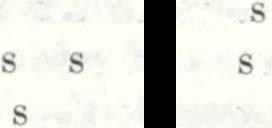
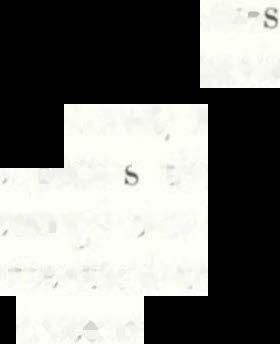

C$tt4((4 � �t�I�RctZJ;I�M I
�Amf;r:�����Cfie�('f:_II � II
kathayasva mahiibhiiga
yathiiham akhiliitmani kr�fle nivesya niftsangarh
manas tyak�ye kalevaram
kathayasva-please continue speaking; mahiibhiiga-0 greatly fortunate one; yathii-as much as; aham-1; akhila-iitmani-unlo the upreme Soul; kr�fle-unto LordSri Kr��a; nivesya-having placed;niftsangam-being freed from material qualities; manaft-mind; tyah§ye-may relinquish; kalevaram -body.
TRANSLATION
0 greatly fortunate Sukadeva Gosvami, please continue narrating Srimad-Bhagavatamso that I canplace my mindupontheSupremeSoul, Lord Kr��a, and, being completely freed from material qualities, thus relinquish this body.
PURPORT
To be fully engaged in hc:aring the: lransc:cndenlal narration descrillt'd in the lexl of Srimad-Bhiigavatam means to be c:onstantly associall'd with the Supreme Soul Sri Kr�J)a. And to be constantly associated with the Supreme Lord Kr��ameansto be liberated from the qualities of matter. Lord Kr�pa is like the sun, and the material contamination is like the darkness. J\.., darkness is dissipated in the presence of the sun, so Lo be constantly
Text 3 J Questions byKingPar�it 423
engaged in the association of the Lord Sri Kr�r)a means to be uncontaminated by the material qualities. Contamination by material qualities is the cause of repeated birth and death, and liberation from material qualities is transcendence. Maharaja Parik�it is now a realized soul by this secret of liberation through the grace of Sukadeva Gosvami, for the latter informed the King that the highest perfection of life is to be in remembrance of Niiraya�a at the end of life. Maharaja Parik�it was destined to give up his body at the end of seven days, and thus he decided to continue the remembrance of the Lord by His association with the topic of SrimadBhiigavatam, and thus to quit his body in full consciousness of the presence of the Lord Sri Kr��a, the Supreme Soul.
The hearing of Srimad-Bhiigavatam performed by the professional men is· different from the transcendental hearing of Ma�araja Parik�it. Maharaja Parik�it was a soul realized in the Absolute Truth, Sri Kmra, the Personality of Godhead. The fruitive materialist is not a realized soul; he wants to derive som1: material benefit from his so-called hearing of Srimad-Bhiigavatam. Undoubtedly such an audience, hearing Srimad-Bhiigavatam from the professional men, can derive some material benefit as desired by them, but that does not mean that such a pretense of hearing Srimad-Bhiigavatam for a week is as good as that of Maharaja Parik�it.
It is the duty of the sane to hear Srimad-Bhiigavatam from a self-realized soul without being duped by professional men, and one should continue such hearing till the end of one's life so that one can actually have the transcendental association of the Lord and thus be liberated simply by hearing Srimad-Bhiigavatam.
Maharaja Parik�it had already given up all his connections with his kingdom and family, the most attractive features of materialism, but still he was conscious of his material body. He wanted to be free of such bondage also by the constant association of the Lord. TEXT

424 Srimad-Bhagavatam [Canto 2, Ch. 8
��: ��� f;wi �on�� ��f�� 1 m;r ;ffi�)qiJl +tff.rl'l, fl� � II \l II srrwata{l. sraddhayii nityarh
ca sva-ce§titam kiilena niitidirgher-a
visate hrdi
4
grr-atas
bhagaviin
srrwata{l-of lhose who hear; sraddhayii- in earnestness; n ityam- regularly, always· gr!latafl-laking lhe malter; ca-also; sva-ce§titam- se riou ly by one's own endeavor; k alena-duration ; na-not; atidirghe!la-very prolonged time; bhagaviin -the Personality of Godhead Sri Kr�l).a; vi.Satebecomcs manifest; hrdi-within one's hearL

TRANSLATION
Persons who hear Srimad-Bhagavatam regularly and are alwa s taking the matter very seriously will have the Personality of Godhead ri Kr��a manifested in their hearts within a short time.
PURPORT
Cheap devotees or the material devotees of the Lord are very much desirous lo seethe Lord personally without making any requi ite qualification. Such third-grade devotees should know well that material attachment and seeing the Lord eye to eye cannot go together. It is not such a mechanical process that the professional Bhiigavatam reciters can do the job onbehalfofthethird-grade materialist pseudo-devotee. Theprofessional men are useless in this connection because they are neither self-realized nor interested in the liberation of the audience. They are simply interested inmaintainingthematerial establishment of family attachment and earning some material benefits out of the profession. Maharaja Parik�it had no more than seven days to live, but for others Maharaja Parik�it personally recommends that one should hear Srimad-Bhiigavatam regularly, nityam, always by one's own effort and with serious devotion also. That will help oneto see the Lord Sri Kr�l}a manifested in one's heart within no time.
The pseudo-devotee, however, is very anxious to see the Lord by his whims, not making any serious effort to hear Srimad-Bhiigavatam regularly and without detachment from material benefi l. That is not lhe way recommended by an authority like Maharaja Parik�it, who heard and benefitted by hearing Srimad-Bhiigavatam.

TEXT 5


Text 5] Questions by King Par�it 425
Srimad-Bhagavatam
prav4ta� karrw-randhrerta
sviiniim bhiiva-saroruham
dhunoti samalarh krwa�
salilasya yathii sarat
prav4 ta�-thus being entered; karrta-randhrerta-through the holes--of the ears; sviiniim-according to one's liberated position; bhiiva-constitutional relationship; sara[l. -ruham-the lotus flower; dhunoti-cleanses; samalam-material qualities likelust, anger' avarice,hankering, etc.; k[§[ta� -Lord Kf�l)a, the Supreme Personality of Godhead; salilasya-of the reservoir of waters; yathii-as it were;sarat-the autumn season.

TRANSLATION
The sound incarnation of Lord Kr��a, the Supreme Soul [i.e. SrimadBhagavatam), entering into the heart of a self-realized devotee, sits on the lotus flower of his loving relationship and thus cleanses the dust of material association, such as lust, anger, hankerings, etc., and acts like the autmpnal rains upon the pools of muddy water.
PURPORT
It is said that a single pure devotee of the Lord can deliver all the fallen soulsof theworld, andthusonewhois actuallyin the confidence of a pure devotee like Narada or Sukadeva Gosvami and thus empowered by one's spiritual master, as Narada was by Brahmiiji, can not only deliver himself from the clutches of miiyii, or illusion, but can deliver thewhole world by his pure and empowered devotional strength. The comparison to the autumnal rain which falls on the muddy reservoirs of water is very appropriate. During the rainy season, all waters of the rivers become muddy, but in the month of July-August,the autumn season, when there isaslightrainfall,themuddy waters ofthe rivers all over the world become at once clear. By addition of some chemical, a small reservoir of water like that of the metropolitan waterworks tanks, etc., can be cleared, but by such a tiny effort it is not possible to clear up all the reservoirs of water like the rivers, etc. Similarly, a powerful pure devotee of the Lord can deliver not only his personal self but also many others inhis association.
In other words, the cleansing of the polluted heart by other methods (like r:ulture of empiric knowledge or mystic gymnastics) can simply
426
[Canto 2, Ch. 8
cleanse om�· own heart, but devotionalserviceto the Lordi sopowerful thatit can clean c the hearts of the people in general, by the devotional service of the pure empowered devotee. A truerepre entativeofthe Lord like Narada, Sukadeva Gosvami, Lord Caitanya, the six Gosvamis and later Srila Bhaktivinode Thakur or Srimad Bhaktisiddhanta Sarasvati Thakur,etc.,candeliverallpeoplebytheirempowereddevotionalservice.
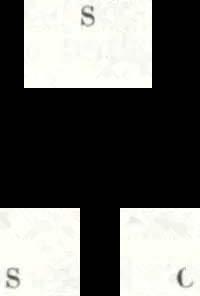
By sincere efforts to hear Srimad-Bhiigavatam one realizeshisconstitu· tiona!relationshipwiththe Lordinthetranscendentalhumorofservitude, friend hip, paternal affectionorconjugallove,andbysuchself-realization one becomes situated at once in the transcendental loving service of the Lord. All uch puredevoteeslikeNaradawerenotonlyself-realizedsouls, but they were engaged in preaching work automatically by spiritual impetus, and thus they delivered many poor souls entangled in the materialmode . They becamesopowerfulhecausetheysincerelyfollowed thr Bhiigavatam principle by regular hearing and worshiping. By such action the ac·urnulated material lusts, etc., become clean ed by the per onal endeavor ofthe Lordwithintheheart.The Lordisalwayswithin the heart of the living being, but He becomes maniLested by one's devotional ervicc.
Purification of the heart by culture of knowledge or mystic yoga may be all right for the time being for an individual person, but it i like cleansing the tagnant water in small quantity by chemical processes. Suchclarificationofwatermay standforthetimebeingand thesediments settle down, but by a slight agitation everything becomes muddy. The idea i that devotional service tothe Lordistheonlymethodofcleansing the heart for good. Whereasother methods may be superficially goodfor the time being, there is a risk of becoming muddyagaindue toagitation of the mind. Devotional service to the Lord, with specific attention for hearing Srimad-Bhiigavatam regularlyand always, isthebestrecommended method for liberation fromtheclutchesofillusion.


Text 6] Questions by King Par�it 427
dhautiitmii puru�a{l. kmw.piida-mulam na muiicati mukta-sarva-pariklesa{l. piintha{l. sva-sarar-am yathii
TEXT 6
dhauta-iitmii-a person whose heart has been cleansed; puru§a{l.-the living being; kmw-the Supreme Personality of Godhead; piida-miilnmthe shelter of the lotus feet; na-never; muiicati-gives up; mukta-liberated; sarva-all; parikle§a{l.-of all miseries of life; piintha�-the traveler; sva-sarartam-in his own abode; yathii-as it were.
TRANSLATION
A pure devotee of the Lord, whose heart is once cleansed by the process of devotional service, never relinquishes the lotus feet of Lord Kf�l)a because they fully satisfy him, as the traveler is satisfied at home after a troubled journey.
PURPORT
One who is not a pure devotee of the Supreme Lord Kr�I:ta is not completely cleansed in the heart. But a perfectly cleansed person never quits the devotional service of the Lord. In discharging such devotional service, as it was ordered by Brahmajl to Narada in the preaching of Srimad-Bhiigavatam, sometimes the representative of Lhe Lord engaged in preaching work meets various so-called difficulties of life. This was exhibitedby LordNityananda when He delivered the two fallen souls Jagai and Madhai, and similarly Lord Jesus Christ was crucified by the nonbelievers. But such difficulties are suffered by the devotees in preaching work very gladly because in such activities, alLhough apparently very severe, the devotees of the Lord feel transcendental pleasure because the Lord is satisfied. Prahlada Maharaja suffered greatly, but still he never forgot the lotusfeet of theLord. This is because a pure devotee of Lhe Lord is so purified in the heart that he cannot leave the shelter of Lord KnH:ta in any circumstances. There is no self-interest in such service. The progress of culturing knowledge by the jiiiinis or the bodily gymnastics by the yogis are ultimately given up by the respective performers, but a devotee of the Lord cannot give up the service of the Lord, for he is ordered by his spiritual master. Pure devotees like Narada or Nityananda Prabhu take up the order of the spiritual master as the sustenance of life. They do not mind what becomes of the future of their lives. They take the matter very seriously as the order comes from the higher authority, from the representative of the Lord, or from the Lord Himself.
The example set herein is very appropriate. A traveler leaves home to search for wealth in far distant places, sometimes in the forest and

428 Srimad-Bhagavatam [Canto 2, Ch. 8
sometimes on the ocean and sometimes on hilltop . Certainly there are many troubles for the traveler when he is in such unknown place . But all such troubles are at once mitigated as soon as the ense of his family affection is remembered, and as soon as he returns home he forget all such troubles on the way.
A pure devotee of the Lord is exactly in a family tie with lhe Lord, and therefore he is undeterred in discharging his duty in full affectionate tie with the Lord.
TEXT 7

yad adhiitu-mato brahman dehiirambho 'sya dhiitubhi{l. yadrcchayii hetunii vii bhavanto jiinate yathii
yat-a it is; adhiitu- mata{l. - without being materially con tituted; brahman-0 learned briihmarza; deha- the material body; iirambha{l.-the beginning of; asya-of the living being; dhiitubhi{l.-by matter; yadrcchayiiwithout cause, accidental;hetunii-due to some cause; vii-either; bhavanta{l. -your good self;jiinate-as you may know it; yathii-so you inform me.
TRANSLATION
0 learned brahmru:ta, the transcendental spirit soul is different from the material body. Does he acquire the body accidentally or by some cause? Will you kindly explain this, for it is known to you.
PURPORT
Maharaja Parilqit, being a typical devotee, is not only satisfied by confirming the importance of hearing the Srimad-Bhiigavatam from the representative of Brahmajl by disciplic succession, but he is still more anxious to establish the philosophicalbasis of $rimad-Bhiigavatam. $rimadBhiigavatam is the science of the Supreme Personality of Godhead, and as
Text 7) Questions by King Pa�it 429
� � � � ��l ��'l. �ms� �Pl! 1 ���ttl ��on ::tl �ffi �t;ffl � II \9 II
such all questions that may arise in the mind of a serious student must be cleared by the statements of the authority. A person on the path of devotional service may inquire from his spiritual master all about Lhe spiritual position of God and the living beings. From the Bhagavad-gitii, as well as from the Snmad-Bhiigavatam, it is known that qualitatively the Lord and the living beings are one. The living being in the conditioned state of material existence is subjected to many transmigrations by continuously changing the material body. But what are the causes of such material embodiment of the part and parcel of the Lord? Maharaja Parik�it inquires about this very important matter for the benefit of all classes of candidates on the path of self-realization and devotional service to the Lord.


Indirectly it is confirmed that the Supreme Being, the Lord, makes no such material changes of body. He is spiritually whole, with no difference between His body and His soul, unlike the conditioned soul. The liberated living beings, who associate with the Lord in person, are also exactly like the Lord. Only the conditioned souls awaiting liberation are subjected to change of bodies. How was the process first begun?
In the process of devotional service, the first step is to take shelter of the spiritual master and then inquire from the spiritual master all about the process. This inquiry is essential in order to be made immune to all kinds of offenses in the path of devotional service. Even if one is fixed in devotional service like Maharaja Parik�it, he must still inquire from the realized spiritual master all about this. In other words, the spiritual master must also be well versed and learned so that he may be able to answer all these inquiries from the devotees. Thus one who is not well versed in the authorized scriptures andnotabletoanswerall such relevant inquiries should not pose as a spiritual master for the matter of material gain. It is illegal to become a spiritual master if one is unable to deliver the disciple.
430 Srimad-Bhagavatam [Canto 2, Ch_ 8
TEXT8 3lRft� ����lq_q� ����;{��Ill� I . -\' � �;p:{ ;:r ��q ��::q���Cl: �... 1 ijf.H;rn"Tf?ml m:m: ���f;:r� II� II iisid yad-udariit padmarh loka-sarhsthiina-lak§ar-am
yiiviin ayam vai puru�a iyattiivayavaift prthak
tiiviin asiiv iti proktaft
samsthiivayavaviin iva
iisit-as it grew; yat-udariit-from whose abdomen; padmam-lotus flower;loka-world;samsthiina-situation;lak§arwm-possessed of; yiiviinas it were;ayam-this;vai-certainly;pur�afl.-the Supreme Personalit y of Godhead; iyattii- measurement; avayavaift-by embodiment; prthak-different;tiiviin-so;asau-that;iti proktaft-it is so said; samsthii-situation; avayavavan-embodiment;iva-like.
TRANSLATION


If the Supreme Personality of Godhead, from whose abdomen the lotus stem sprouted, is possessed of a gigantic body according to His own caliber and measurement, then what is the specific difference between the body of the Lord and those of other common living entities?
PURPORT
One should note how Maharaja Parik�it intelligently put the questions before his spiritual masterfor scientific understanding of the transcendental body of Lhe Lord. It has been described in many places before this that Lhe Lord assumed a very gigantic body, like Kara!lodakasay1 Vi�!lu, from whose hair pores innumerable universes have generated. The body of the Garbhodaka8ay1 Vi�!lu is described as sprouting the lotus stem within which all the planets of the universe remain, and at the top of the stem there is the lotus flower on which Lord Brahma is born. In the creation of lhe material world He undoubtedly assumes the gigantic body, and living enlities also gel bodies, big or small, according to the respective nece sity. For example, an elephant gets a gigantic body according to its need , and so also an ant gets its body according to its needs. Similarly, if the Personality of Godhead assumes a gigantic body to accomodate the universes or.the planets of a particular universe, there is no difference in Lhc principle of assuming or accepting a particu lar type of body in terms of necessity . A living being and the Lord cannot be distinguished simply by the difference of the magnitude ofthe body. So the answerdepends on the specific significance of the body of the Lord, as distinguished from the body of lhc common living being.
Text 8] Questions by King Pa�it
431
aja� srjati bhiitiini
bhiitiitmii yad-anugrahiit
dadrse yena tad-riipam
niibhi-padma-samudbhava�
aja�-one who is born without a material source; srjati- creates; bhiltiini-all those materially born;bhiita-iitmii-having a body of matter; yat- whose; anugrahiit-by the mercy of; dadrse-could see; yena-by whom; tat-rilpam-His form of body;niibhi-navel;padma-lotus flower; samudbhavaft-being born of.
TRANSLATION
Brahma, who was not born of a material source but of the lotus flower coming out of the navel abdomen of the Lord, is the creator of all those who are materially born. Of course, by the grace of the Lord, Brahma was able to see the form of the Lord.
PURPORT
The first living creature, Brahma, is called ajaft because he did not take his birth from the womb of a mother materially born. He was directly born from the bodily expansion of the lotus flower of the Lord. Thus it is not readily understandable whether the body of the Lord and that of Brahma are of the same quality or different. This must also be clearly understood. One thing is, however, certain: Brahma was completely dependent on the mercy of the Lord because after his birth he could creale living beings by the Lord's grace only, and he could see the form of Lhe Lord. Whether the form seen by Brahma is of the same quality as that of Brahma is a bewildering question, and Maharaja Parilqit wanted to get clear answers from Snla Sukadeva Gosvami.

432
" ,... �: �HT 4{(lll';f 4{ijl�l{l ��a��
[Canto 2, Ch. 8 �� �rf ij�q
Srimad-Bhagavatam TEXT 9
I
c:rrfllq����n II � II
TEXT 10

I
IIZ o II
sa ciipi yatra puru§O viSva-sthity-udbhaviipyayaft muktviitma-miiyiirh miiyesaft sete sarva-guhii-sayaft
safl.-He; ca-also; api- as He is; yatra - where; puru§afi. -the Personality of Godhead; viSva-the material worlds; sthiti-maintenance; udbhavacreation; apyayafl. -annihilation; muktvii-without being touched; iitmamiiyiim-own energy; miiyesafl.-the Lord of all energies; sete-does Lie on; sarva-guhii-sayaft-one who lies in everyone's heart.
TRANSLATION
Please also explain the Personality of Godhead, who lies in every heart as the Supersoul and as the Lord of all energies, hut is untouched by His external energy.
PURPORT
Undoubtedly the form of the Lord who was seen by Brahmii must be transcendental, otherwise how could He simply look upon the creative energy without being touched? It is understood also that the same puru§a lies intheheart of every living entity. This also requiresproper explanation.

TEXT ll
puru§iivayavair lokiift
sa-piiliift piirva-kalpitiift
lokair amu§yiivayaviift
sa-piilair iti §usmma
Text ll) Questions by King P�it
" ..... ,..... ,.....
�?£ ��Ill
� :qnq
Ff�T�-l�QJ�:
ijCfctfl�ffl� il�: �ij (1�!!lil��:
433
puru�a-universal form of the Lord (viriita puru§a[l}; avayavai[l.-by different parts of the body ; lokii[l.-the planetary system; sa-piilii[l.-with respective governors;purva-formerly;kalpitii[l.-discussed;lokai[l.-by Lhe different planetary systems;amu�ya-llis;avayauii[l.-differcnt parts of the body;sa-piilai[l.-with the governors; iti-thus; susruma-1 heard.
TRANSLATION
0 learned brahm�a, it was formerly explained that all the planets of the universe with their respective governors are situated in the different parts of the gigantic body of the vira!a puru�a. I have also heard that the different planetary systems are supposed to be in the gigantic body of the virata puru�a. But what is their actual position? Will you please explain that?
TEXT 12

yiiviin kalpo vikalpo vii yathii kiilo'numiyate bhuta-bhavya-bhavac-chabda iiyur-miinarh ca yat sata[l.
yavan-as it is; kalpafl-the duration of time between creation and annihilation; vikalpafl- subsidiary creation and annihilation; vii-either; yathii-as also; kiilafl-the time; anumiyate-is measured; bhuta-past; bhavya- future; bhavat-present; sabdaf!-sound; iiyuf!-duration of lif e; mii.nam-measurement; ca-also; yat-which; sataft-of all living beings m all planets.
TRANSLATION
AJHo please explain the duration of time between creation and annihilation, and that of other subsidiary creations, as well as the nature of time, indicated hy the sound of past, present and future. Also, please explain the duration and measurement of life of the different living beings known as the demigods,thehuman beings,etc., indifferentplanets ofthe universe.
434 Srimad-Bhagavatam [Canto 2, Ch. 8
�m��r.irfcr�r.(!qt ;rt �m tr.t��'ltfij 1 C'. ����� 3TP�Itr.:l T.J ���cr: II Z �II
Past, present and future are different features of time to indicate the duration of life for the universe and all its paraphernalia, including the different living beings in different planets.
Clil�T�W-fr
TEXT 13

kiilasyiinugatir yii tu lak§yate '[!vi brhaty api yiivatyaft karma-galayo yiidrsir dvija-sallama
kiilasya-of the eternal Lime; anugatift -- beginning ; yii tu-as they are; lak§yate-expcrieneed; a!wi-small; brhati-great ; api-even; yiivatyafl.-as long as; karma-gataya�-in terms of the work performed; yiidrfift-as it may;dvija-sattama-0 purest of all briihma[!as.
TRANSLATION
0 purest of the brahm�as, please also explain the cause of the different durations of time, both short and long, as well as the beginning of time, following the course of action.
Text 14 J Questions by King Par�it 435
PURPORT
��tTijs�t
�
�tl'Ttr I
��fif:�e�Ht
tT�: ;r.�tT(1m
IIZ �II
� .... ... .... ' �f� ;:r.qe•H�Plr �41 ��� I !!� gf�Jl;ri�hqftiJflitllll�all{ IIZ �II
kamw-samiiviiyo yathii ycnopagrhyate
gu!tiniirh caiva pari[liimam abhipsatiim
TEXT 14 "
yasmin
grL[liiniirh
yasmin-in which;karma-actions;samavayaft-accumulation;yatha-as far as; yena-by which;upagrhyate-takes over;gurtiinam-of the different modes of material nature;gur-inam-of the living beings;ca-also; evacertainly;parir-amam-resultant;abhipsatiim-of the desires.
TRANSLATION
Then again, kindly describe how the proportionate accumulation of the resultant actions of the different modes of material nature act upon the desiring living being, promoting or degrading him among the different species of life,beginning fromthe demigodsdown to the most insignificant creatures.

PURPORT
The actions and reactions of all works in the materialmodes of nature, either inthe minuteform or inthe giganticform,are accumulated, andthus the result of such accumulated actions and reactions of karma, or work, becomemanifested inthe same proportion. How suchactions andreactions take place, what are the differentprocedures, andin what proportion they act are all the subject matter of Maharaja Parik�it's inquiries from the greatbrahmarw, Sukadeva Gosvami.
Lifeinthehigher planets,known asthe abode of thedenizens of heaven, is obtained notbythe strength of spacecraft (as is nowbeing contemplated by the inexperienced scientists), but by works done in the mode of goodness.
There is even restriction on the very planet where we arenow living for entrance offoreigners to a country wherethe citizens aremore prosperous. For example, the American government has many restrictions for entrance of foreigners from less prosperous countries. The reason isthat the Americans do not wish to share their prosperity with any foreigner who has not qualified himself as a citizen of America. Similarly, the same mentality is prevailing in every other planet also where thereare more andmore intelligent living beings residing. The higher planetary living conditions are all in the mode of goodness, and anyone desiring te enter the higher planets like the moon, sun, Venus, etc., must qualify thoroughly by activity in complete goodness.
Maharaja Parik�it's inquiries are on the basis of proportionate actions of goodness which qualify oneinthis planet to be promoted to the highest regions of the universe.
436 Srimad-Bhagavatam [Canto 2, Ch. 8
Even on this planet of our present residence, no one can achieve a good position within the social order without being qualified with proportionate good work. o one can forcibly sit on the chair of a high court judge without being qualified for the post. Similarly, no one can enter into the higher regions of the planetary system without being qualified by good works in this life. Persons addicted to the habits of passion and ignorance have no chance of entering the higher planetary system simply by an electronic mechanism.
According to the statement of the Bhag avad-gitii (Bg. 9.25), persons trying to qualify themselves for promotion to the higher regions of heavenly planets can go there; similarly, persons trying for the Pitrlokas can go there; similarly, persons trying to improve the conditions on this earth can also do that, and persons who are engaged in going back home, back to Godhead, can also achieve the result. These various actions and reactions of work in the mode of goodness are generally known as pious work with devotional service, culture of knowledge with devotional service, mystic powers with devotional service and (at last) devotional service unmixed with any other varieties of goodness. This unmixed devotional service is transcendental and is called the parii bhakti, which alone can promote a person to the transcendental kingdom of God. Such a transcendental kingdom is not a myth, but is as factual as the moon planet. It requires the transcendental qualities to understand the kingdom of God and God Himself.
TEXT 15

bhu-piitiila-kakub-vyomagraha-nak�atra-bhubhrtiim
sarit-samudra-dvipiiniim
sambhava5 caitad-okasiim
bhu�-piitiila-underneath the land; kakub-four sides of the heavens; vyoma-the sky; graha-the planets; nakfiatra-the stars; bhubhrtiim -of the hills; sarit-the river; samudra-the sea; dvipiiniim-of the islands; sambha uaft -appearance; ca-also; etat-their; okasiim-of the inhabitants.

Text 15) Questions by King Pa�it 437
TRANSLATION
0 best of the brahmal)as, please also describe how the creation of the globes throughout the universe, the four directions of the heavens, the sky, the planets, the stars, the mountains, the rivers, the seas and the islands, as well as their different kinds of inhabitants, takes place.
PURPORT
The inhabitants of different varieties of land, etc., are differently situated, and not all of them are equal in all respects. The inhabitants of the land are different from the inhabitant of the water or the sky, and similarly the inhabitants of the different planets and stars in the sky are also different from one another. No place is vacant by the laws of the Lord, but the creatures of one particular place are different from others. Even in the human society the inhabitants of the jungles or those of the desert are different from those of the cities and villages. They are so made according to different qualities of the modes of nature. Such adjustment of the laws of nature is not blind. There is a great plan behind the arrangement. Maharaja Parik�it requests the great sage Sukadeva Gosvami to explain all these authoritatively, in accordance with proper understanding.
TEXT 16

pramii[lam a[l!fa-kosasya
bahyiibhyantara-bhedataft

mahatiim ciinucaritam
var[tii.Srama-vini.Scayaft
pramii[lam-extent and measurement; a[l!fa-kosasya-of the universe; biihya-outer space; abhyantara-inner space; bhedata[l,-by division of; mahatiim-of the great souls; ca-also; anucaritam-character and activities; var!1a-castes; ii.Srama-orders of life; uiniScayaft-specifically describe.
438 Srimad-Bhagavatam [Canto 2, Ch. 8
!f'fllJf'{����� . " . � �mr
Also, please describe the inner and outer space of the universe by specific divisions, as well as the character and activities ofthe greatsouls, and also the characteristics of the different classifications ofthe castes and orders of social life.

PURPORT
Maharaja Parilqit is a typical devotee of Lord Kr�l).a, and as such he is anxious to know the complete significance of the creation of the Lord. He wants to know the inner and outer space of the universal form. It is quite fitting for the realsearcher ofknowledgeto knowall about this. Thosewho are of the opinion that the devotees of the Lord are satisfied with some sentiments only can find good lessons in the inquiries of Maharaja Parik�it as to how much a pure devotee is inquisitive to know things in their true perfection. The modern scientist is unable to know about the inner space of the universal horizon, and what to speak of the space which covers the universes.
Maharaja Parik�it is not simply satisfied with material knowledge only. He is inquisitive about the characters and activities of the great souls or devotees of the Lord. The glories of the Lord and the glories of His devotees, combined together, comprise the c.omplete knowledge of Srimad
Bhagiivatam. Lord Kr�l).a showed His mother the complete universal creation within His mouth, while she, completely charmed by her son, wanted to see the inner mouth of the Lord just to see how much earth the child had eaten. By the grace of the Lord the devotees are able to see everything in the universe within the mouth of the Lord.
The very idea of the scientific divisions of four classes of human society and four orders of life is also inquired about herewith on the basis of individual personal quality. Thefourdivisions are exactlylikethefour divisions of one's personal body. The parts and parcels of the body are nondifferent from the body, but by themselves they are only parts and parcels of the body. That is the significance of the whole scientific ystem of four orders of castes and social orders. The value of such scientific divisions of human society can only be ascertained in terms of the proportionate development of devotional service to the Lord. Any person employed in the government service is a part and parcel of the entire government, including the president. Everyone is a government servant, but no one is the government himself. That is the position of all living entities in the
Text 16] Questions by King Pariksit 439
TRANSLATION
government of the Supreme Lord. o one can artificially claim to the supreme po ition of the Lord, but everyoneismeant toserve the purpose of the supreme whole.
TEXT 17



yugiini yuga-miinam ca dharmo yas ca yuge yuge avatiiriinucaritam yad iiScaryatamam hare�
yugiini-the different ages; yuga-miinam-the duration of eachage; caas well as; dharma�-the particularoccupational duty;ya� ca-and which; yuge yuge - in each and every yuga or particularage; avatiira-the incarnation; anucaritam-and the activities of the incarnation; yat-which; iiScaryatamam-the most wonderful activities; hare�-of the Supreme Lord.
TRANSLATION
Please explain all thedifferentages inthe durationofthe creation,and also the duration of such ages. Also tell me about the different activities ofthe different incarnationsofthe Lordindifferentages.
PURPORT
Lord Kr�!la is the original Personality of Godhead, and all theincarnations of the Supreme Lord, although nondifferent from Him, are emanations from the Supreme. Maharaja Parik�itinquires from the great learned sage Sukadeva Gosvami about the different activities of such incarnations so that the incarnation of the Lord may be confirmed by His activities in the authoritative scriptures. Maharaja Parik�it is not to be carried away by the sentiments of the commonmanto acceptan incarnation ofthe Lord verycheaply. Insteadhe wishedto accept theincarnation of the Lordbysym tomsmentionedin theVedicliteraturesand confirmed by an iiciirya like Sukadeva Gosvami. The Lord descends by His internal

440 Srimad-Bhagavatam [Canto 2, Ch. 8
���?tl�a�
� ��t;i =tt �+lf �?tl �it � I
�: 11 Z '!�II
energy without any obligationto the laws of materialnature, and thus His activities are also uncommon. The specific activities of the Lord are mentioned, and one should know that the activities of the Lord and the Lord are identical due to being on the absolute plane. Thus to hear the activities of the Lord means to associate with the Lord directly, and association of the Lord directly means purification from material contamination. Wehave already discussed thispoint in the First Volume.
TEXT 18

• ..... C' ,...._'
�orr �:m:ITfT �:��: trr�Fl?<l �11[�: 1
�afr.ltUJ\qrlllf =q ��: �;;�'! i:!T�m� II Z �II
nrru"irh siidhararto dharmafl. savi.Se§as ca yiidrsafl. srertiniirh riijanJirtiirh ca dharmafl. krcchre§u jivatiim
nntiim-of human society; siidhiirartafl.- general; dharmafl. -religious affiliation; sa-ui.Se§afl.-specific; ca-also; yiid[Safl.-as they are; srertinii.m-of the particularthree classes; riijar�irtiim-of the saintly royalorder;ca-also; dharmafl.-occupational duty; krcchre�u-in the matter of distressed conditions; jivatiim-of the living beings.
TRANSLATION
Please also explain what may generally be the common religious affiliations of human society, as well as their specific occupational duties in religion, the classification of the social orders as well as the administrative royal orders, and the religious principles for one who may be in the distressed condition of life.
PURPORT
The common religion of all classes of human beings, regardless of whosoever and whatsoever one may be, is devotional service. Even theanimals may be included in devotional service to the Lord, and the best example
Text 18] Questions by King Par�it 441
is set by Sri Bajraitgajl or Hanuman, the great devotee of Lord Sri Rama. AB we have already discussed, even the aborigines and cannibals can also be engaged in the devotional service of the Lord if they happen to be under the guidance of a genuine devotee of the Lord. In the Skanda Puriir-a there is a narration that a hunter in the jungle became the most enlightened devotee of the Lord by the guidance of Sri Narada Muni. Therefore devotional service to the Lord can be equally shared by every living being.


Religious affiliation in terms of different countries and cultural circumstances is obviously not the common religion of the human being, but the basic principle is devotional service. Even if a particular type of religious principle does not recognize the supremacy of the Supreme Personality of Godhead, the followers still have to obey the disciplinary principles laid down by a particular leader. Such a leader of a religious sect is never the supreme leader because such a circumstantial leader comes to the position of leadership after undergoing some penance. The Supreme Personality of Godhead does not,however,require tobe under disciplinary action to become leader, as we see in the activities of Lord Kr�!ta·
The occupational duties of the castes and the orders of society, following the principles of livelihood, also depend on the principle of devotional service. In the Bhagavad-gitii it is stated that a person can achieve the highest perfection of life simply by awarding the results of one's occupational duty unto the devotional service of the Lord. People following the principles of devotional service of the Lord can never be put into difficulty, and thus there cannot be any question of iipad-dharma, or religion in distress. AB will be explained in this book by the greatest authority, Srila Sukadeva Gosvami, there is no religion save and except the devotional service of Lhe Lord, though this may be presented in different forms.
442 Srimad-Bhiigavatam [Canto 2, Ch. 8
19 ��Rt qR� ��uf ��IJf� I ��f-:rf�p:i'frr�r\;�fR&f.fiiN � II� �II tattviiniirh parisankhyiinarh lak§ar-arh hetu-lak�ar-am puru§iiriidhana-vidhir yogasyiidhyiitmikasya ca
TEXT
tattvanam-of theelementsthatconstitute the creation;parisankhyanam -of the nu·mber of such elements;lak§arwm-symptoms;hetu-lak§ap.amthe symptoms of the CaHses; puru§a-complete; arcidhana-devotional service; vidhi�-rules and regulations; yogasya-cultivation of the yoga system; adhyatmikasya-spiritual methods leading to devotional service; ca-also.
TRANSLATION
Kindly explain all about the elementary principles of creation, the number of such elementary principles,their causes,and their development, and also the process of devotional service and the method of mystic powers.
TEXT 20

��}\�fflw+r�� �fir;n� I
��q%���an��Rl�T11Jtfr: II� o II
yogesvaraiSvarya-gatir linga-bhangas tu yoginiim vedopaveda-dharmar-am itihiisa-purar-ayo�
yogesvara-the master of the mystic powers;aiSvarya-opulence;gati�advancement;Zinga-astral body;bhanga�-detachment;tu-but; yoginam --of the mystics;veda-transcendental knowledge;upaveda-knowledge in pursuanceof the Veda indirectly;dharmar-am-of the religiosities;itihasahistory;purar-ayo�-of the Purar-as.
TRANSLATION
What .are the opulences of the great mystics, and what is their ultimate realization? How does the perfect mystic becomedetached from the subtle astral body?What is the basic knowledge of the Vedic literatures, including the branches of history and the supplementary Pur�as?
PURPORT
The yogesvara, or the masterof mysticpowers,.canexhibit eight kindsof wonders of perfection by becoming smaller tli.an the atom or lighter than
Text 20] Questions by King Pan�it 443
a feather, getting anything and everything he desires, going anywhere and everywhere he likes, creating even a planet in the sky, etc. There are many yogesvaras having different proficiencies in these wonderful powers, and the topmost of all of them is Lord Siva. Lord Siva is the greatest yogi, and he can perform such wonderful things, far beyond the ordinary living beings. The devotees of the Lord, the Supreme Personality of Godhead, do not directly practice the process of mystic powers,but, by the grace of the Lord, His devotee can defeat even a great yogesvara like Durvasa Muni, who picked up a quarrel with Maharaja Ambari�a and wanted to show the wonderful achievements of his mystic powers. Maharaja Ambari�a was a pure devotee of the Lord, and thus without any effort on his part the Lord saved him from the wrath of Yogesvara Durvasa Muni,and thelatter was obliged to beg pardon from the King. Similarly, at the time of Draupadi's precarious position, when she was attacked by the Kurus who wanted to see her naked in the open assembly of the royal order, the Lord saved her from being stripped by supplying an unlimited length of sari to cover her. And Draupadi knew nothing of mystic powers. Therefore the devotees are also yogesvara by the unlimited power of the Lord, just as a child is powerfulby the strength of the parents. They do nottry to protect themselves by any artificial means, but are saved by the mercy of the parents.
Maharaja Parik�it inquired from the learned briihma[La· Sukadeva Gosvami about the ultimate destination of such great mystics or how they attain such extraordinary powers by their own efforts or by the grace of the Lord. He inquired also about their detachment from the subtle and gross material bodies. He inguired also about the purports of the Vedic knowledge, and, as is stated in the Bhagavad-gitii (Bg. 15.15), the whole purport of all the Vedas is to know the Supreme Personality of Godhead and thus become a transcendental loving servant of the Lord.


444 Srimad-Bhagavatam [Canto 2, Ch. 8
TEXT
samplava[l. sarva-bhutiiniim vikrama[l. pratisankrama[l. 4tiipurtasya kiimyiiniim tri-vargasya ca yo vidh*
21
samplavafi.-the perfect means or complete devastation; sarva-bhutiinam -of all living beings; vikramafi.-specific power or situation;pratisankramafi. -ultimate destruction; i§tii-performance of Vedic rituals;pilrtasya-pious acts in terms of religion; kiimyanam-rituals for economic development; tri-vargasya-the three means of religion, economic development and sense satisfaction;ca-also;yafi.-whatsoever;vidhifi.-procedures.
TRANSLATION

Please explain unto me how the living beings are generated, how they are maintained, and how they are annihilated. Tell me also of the advantages and disadvantages of discharging devotional service unto the Lord. What are the Vedic rituals and injunctions of the supplementary Vedic rites, and what are the procedures of religion, economic development and sense satisfaction?

PURPORT
Samplavafi., in the sense of "perfect means," is employed to denote the discharging of devotional service, and pratisamplavafi. means just the opposite, or that which destroys the progress of devotional service. One who is firmly situated indevotional service of the Lord can very easily executethe function of conditional life. Living the conditional life is just like plying a boat in the middle of the ocean. One is completely at the mercy of the ocean, and at every moment there is every chance of being drowned in the ocean by slight agitation. If the atmosphere is all right, the boat can ply very easily, undoubtedly, but if there is some storm, fog, wind, or cloud, there is every po sibility of being drowned in the ocean. No one can control the whims of the ocean, however one may be materially well equipped. One who has cro sed the oceans by ship may have sufficient experience of such dependence upon the mercy of the ocean. But one can ply over the ocean of material existence by the grace of the Lord very easily, without any fear of storm or fog. It all depends on the will of the Lord;no one can help if there is some unfortunate danger in the state of conditional life. The devotees of the Lord, however, cross the ocean of material exi tence without anxiety because a pure devotee is always protected by the Lord (Bg. 9.13). The Lord gives special attention to His devotees in their activities within material, conditional life. (Bg. 9.29) Therefore everyone should take shelter of the lotus feet of the Lord and be a pure devotee of the Lord by all means.
Text 21] Questions by King Pa�it 445
One should know, therefore, from the expert spiritual master the advantages and disadvantages of discharging devotional service, just as Maharaja PanK�it asked his spiritual master Sn1a Sukadeva Gosvami. According to Bhakti-rasiimrta-sindhu, the science of devotional service, one should not eat more than what he requires to maintain body and soul together. Vegetable diets and milk are sufficient for maintenance of the human body, and therefore one has no need to eat anything more to satisfy the palate. One should also not accumulate money to become puffed up in the material world. One should earn his livelihood easily and honestly, for it is better to become a coolie for honest livelihood than to become a great man in the society by hook and crook. There is no harm if one becomes the richest man in the world by honest dealings, but one should not sacrifice the honest means of livelihood simply to accumulate wealth. Such an endeavor is harmful to devotional service. One should not talk nonsense. A devotee's business is to earn the favor of the Lord. Therefore a devotee should always glorify the Lord in His wonderful creations. A devotee should not decry the creation of the Lord, defying Him by saying that He has created a false world. The world is not false. Factually we have to take so many things from the world for our maintenance, so how we can say that the world is false? Similar!y, how can one think of the Lord as being without form? How can one become formless and at the same time have all intelligence and consciousness, direct and indirect? So there are many things for a pure devotee to learn, and he should learn them perfectly from a bona fide personality like Sukadeva Gosvami.
The favorable conditions for discharging devotional service are that one should be very enthusiastic in serving the Lord. The Lord in His form of Sn Caitanya Mahaprabhu wanted the cult of devotional service to the Lord to be preached all over the world, in every nook and corner, and therefqre a pure devotee's duty is to discharge this order as far as possible. Every devotee should be very enthusiastic, not only in performing his daily rituals of devotional service, but in trying to preach the cult peacefully by following in the footsteps of Lord Caitanya. If he is not superficially successful in such an attempt, he should not be deterred from the discharge of his duty. Success or failure has no meaning for a pure devotee because he is a soldier in the field. Preaching the cult of devotional service is something like declaring war against materialistic life. There are different kinds of materialists, such as the fruitive workers, the mental speculators, the mystic jugglers, and so many others. All of them are against the existence of Godhead. They would declare that they are themselves God, although in every step and in every action they are dependent on the mercy of the

446 Srimad-Bhagavatam [Canto 2, Ch. 8
Lord. Therefore a pure devotee may not associate with such gangs of atheists. A strong devotee of the Lord will not be misled by such atheistic propaganda of the nondevotees, but a neophyte devotee should be very cautious about them. A devotee should see to the right discharge of devotional service underthe guidance of a bona fide spiritual master and should not stick only to the formalities. Under the direction of the bona fide spiritual master one should see how much service is being executed, and not simply in the matter of rituals. A devotee should not hanker after anything, but he should be satisfied with things that may automatically come to him by the will of the Lord. That should be the principle of a devotional life. And all these principles are easily learned under the guidance of ·a sp!ritual master like Sukadeva Gosvami. Maharaja Parik�it inquired from Sukadeva correctly, and one should follow his example.
Maharaja Parik�it inquired about the process of creation, maintenance and destruction of the material world, the process of Vedic rituals and the method of executing pious activities in terms of the supplementary Vedas like the Puriiras, Mahiibhiirata, etc. As explained before, the Mahiibhiirata is the history of ancient India, and so also the Puriiras. Pious acts are prescribed in the supplementary Vedas (smrtis), and they are specifically mentioned in the matter of digging tanks and wells for water supply of the people in general. To implant trees on the public roads, to construct public temples and places of worship of God, to establish places of charity where the poor destitutes can be provided with foodstuff, and similar activities, are called purta.

Similarly, the process of fulfilling the natural desires for sense gratification was also inquired about by the King for the benefit of all concerned.

Text 22] Questions by King Pa�it 447
TEXT 22 �' �m;rt �: tm� ���: , ... � . �'lTall � ot{Wfwt �'«<! ����II yo viinusayiniirh sarga[l p�ar.!iasya ca sambhava[l iitmano bandha-mok�au ca vyavasthiinarh sva-riipata[l
ya[l-all tho e; oo-either; anusayinam-merged into the body of the Lord; sarga[l-creation; pa§ar.!lasya-of the infidels; ca-and; sambhava[lappearance; atmana{l-of the living beings; bandha-conditioned; mok§aUbeing liberated; ca-also; vyavasthanam-being situated; sva-riipata[l-in an unconditioned tate.
TRANSLATION
Please also explain how, merged in the body of the Lord, living beings are created, and how the infidels appear in the world. Also please explain how the unconditioned living entities exist.
PURPORT
The progressive devotee of the Lord must inquire from the bona fide spiritual master how living entities merged in the body of the Lord again come back at the time of creation. There are two kinds of living entities. There are the ever liberated unconditioned living beings as well as the ever conditioned living beings. Of the ever conditioned living beings, there are two divisions. They are the faithful and the infidels. Of the faithful there are again two divisions, namely the devotees and the mental speculators. The mental speculators desire to merge into the existence of the Lord, or to become one with the Lord, whereas the devotees of the Lord desire to keep separate identities and constantly engage in the service of the Lord. The devotees who are not fully purified, as well as the empiric philosophers, become conditioned again during the next creation for further purification. Such conditioned souls become liberated by further progress of devotional service to the Lord. Maharaja Parik�it asked all these questions from thebona fide spiritualmaster in orderto become fully equipped in the cience of God.

448 Srimad-Bhagavatam [Canto 2, Ch. 8
TEXT 23 ��;::;rt �� f.rijJ��r:r:rt I � �� tf� �ltf���ijmfu�?!f.J�:11��II yatha:tma-tantro bhagavan vikri!iaty atma-mayaya
vis[jya vii yathii miiyiim udiiste siik�ivad vibhufl.
yathii-as; iitma-tantrafl.-independent; bhagaviin -the Personality of Godhead; viknpati-enjoys His. pastimes; iitma-miiyayii-by His internal potency; vis[jya-giving up; vii-as also; yathii-as He desires; miiyiim-the external potency; udiiste-remains; siik�ivat-just as the witness; vibhufl.the almighty.

TRANSLATION
The independent Personality of Godhead enjoys His pastimes by His internal potency and at the time of annihilation gives them up to the external potency, and He remains a witness to it all.
PURPORT
Lord Sri Kr�l).a, being the Supreme Personality of Godhead and fountainhead of all other incarnations, is the only independent person. He enjoys His pastimes by creation as He desires and gives them up to the external energy at the time of annihilation. By His internal potency only He kills thedemon Putanii, even though enjoying His pastimes in the lap of His mother Yasodii. And when He desired to leave this world He created the pastimes of killing His own family members (Yadu-kula) and remained unaffected by such annihilation. He is the witness of everything that is happening, and yet He has nothing to do with anything. He is independent in every respect. Maharaja Paiilq;it desired to know more perfectly, for a pure devotee ought to know well.
TEXT 24

sarvam etac ca bhagavan prcchato me'nupiirvasafl. tattvato'rhasy udiihartum
. prapanniiya mahii-mune
Text 24) Questions by King Parik{lit
449
sarvam-all these; etat-inquiries; ca-also that I have not been able to ask; bhagavan-0 great sage; prcchata{l-of the inquisitive; me-myself; anupurvasa{l-from the beginning; tattvata{l-just in accordance with the truth; arhasi-may kindly be explained; udiihartum-as you will let know; prapanniiya-one who is surrounded; mahii-mune-0 great sage.
TRANSLATION
0 great sage, representative of the Lord, kindly satisfy my inquisitiveness in all that I have inquired from you and all that I may not have inquired from you from the very beginning of my questionings. Since I am a surrendered soul unto you, please impart full knowledge in this connection.
PURPORT
The spiritual master is always prepared to impart knowledge to the disciple and specifically when the disciple is very inquisitive. Inquisitiveness on the part of a disciple is greatly necessary for the progressive disciple. Maharaja_ Parik�it is a typical disciple because he is perfectly inquisitive. If one is not very inquisitive about self-realization, one need not approach a spiritual master simply to make a show of discipleship.
Maharaja Parik�it is inquisitive, not only for all that he has inquired, b�t he is also anxious to know what he has not been able to inquire. Factually it is not possible for a man to inquire about everything from the spiritual master, but the bona fide spiritual master is able to enlighten the disciple in every way for the disciple's benefit.
TEXT 25


3N 3f'flafft �� 'RitiD�: I 3A1: ��g�
�i'ft·1{:�: � 11�'�11
atra pramiirwm hi bhaviin parame§thi yathiitma-bhu{l · apare ciinut4thanti purve�iirh piiroa-jai{l k rtam
450 Srimad-Bhagavatam [Canto 2, Ch. 8
atra-in this matter; pramartam-evidentiaJ facts;hi-certainly; bhaviinyourself; parame§thi-Brahmii, the creator of the universe; yatha-as; atma-bhu�-born directly from the. Lord; apare-others; ca-only; anuti§thanti-just to follow; purve§iim-as a matter of custom; piirva-jai[tknowledge suggested by a previous philosopher; krtam-having been done.
TRANSLATION
0 great sage, you are as good as Brahma, the original living being. Others follow custom only, as followed by the previous philosophical speculators.
PURPORT
It may be argued that Sukadeva Gosvami is not the only authority of perfect knowledge in transcendence because there are many other sages and their followers. Contemporary to Vyasadeva or even prior to him there were many other great sages, such as Gautama, Kal)iida, J aimini, Kapila and A�tavakra, and aJl of them have presented a philosophical path by themselves. Patafijali is also one of them, and all these six great !§is have their own way of thinking, exactly like the modern philosophers and mental speculators. The difference between the six philosophical paths put forward by the renowned sages above mentioned and that of Sukadeva Gosvami, as presented in the Srimad-Bhtlgavatam, is that all the six sages mentioned above speak the facts according to their own thinking, but Sukadeva Gosvami presentsthe knowledge which comes down directly from Brahmaji, who is known as atma-bhu�, or born of and educated by the Almighty Personality of Godhead.
Vedic transcendental knowledge descends directly from the Personality of Godhead. By His mercy, Brahma, the first living being in the universe, was enlightened, and from Brahmaji, Narada was enlightened, and from Narada , Vyasa was enlightened. Sukadeva Gosvami received such transcen· dental knowledgedirectly from hisfather, Vyasadeva. Thus theknowledge, being received from the chain of disciplic succession,is perfect. One cannot be a spiritual master in perfection unless and until one has received the same by disciplic succession. That is the secret of receiving transcendental knowledge. The six great sages mentioned above may Le great thinkers, Lut their knowledge Ly mental speculation is not perfect. However perfect an empiric philosopher may be in presenting a philosophical thesis, such

Text 25] Questions by King Pan�it 451
knowledge is never perfect because it is produced by an imperfect mind. Such great sages also have their disciplic succession, but they are not authorized because such knowledge does not come directly from the independent Supreme Personality of Godhead, Narayapa. No one can be independent except Narayapa; therefore no one's knowledge can be perfect due to being dependent on the flickering mind. Mind is material, and thus knowledge presented by material speculators is never transcendental and can never become perfect. Mundane philosophers, being imperfect in themselves, disagree with other philosophers because a mundane philosopher is not a philosopher at all unless he presents his own theory. Intelligent persons like Maharaja Parilqit do not recognize such mental s eculators, however great they may be, but hear from the authorities like Sukadeva Gosvami, who is nondifferent from the Supreme Personality of Godhead by the paramparii system, as is specially stressed in the Bhagavadgitii.
TEXT 26



9(
�s��<�41t'l�
na me 'savafl pariiyanti brahmann anilSaniidami pibato 'cyuta-piyii§am tad viikyiibdhi-vinifls[tam
na-never; me-mine; asavaft-life; pamyanti-becomes exhausted; brahman-0 learned briihma'{la; anasaniit ami-because of fasting; pibatafl-hecause of my drinking; acyuta-the infallible; piyii§am-nectar; tat-your ; viikyabdhi- ocean of speech; viniftsrtam-flowing down from.
TRANSLATION
0 learned brahm�a, because of my drinking the nectar of the message of the infallible Personality of Godhead, which is flowing down from the ocean of your speeches, I do not feel any sort of exhaustion due to my fasting."
452 Srimad-Bhagavatam [Canto 2, Ch. 8
��: 'RlttRI" iltAost����·�+tr 1
�et"f.f.trTf*lRA:�11��11
The disciplic succession from Brahma, Narada, Vyasa and Sukadeva Gosvami is particularly different from others. The disciplic succession from other sages is simply a waste of time, being devoid of Acyuta-kathii, or the message of the infallible Lord. The mental speculator can present their theories very nicely by reason and arguments, but such reasons and arguments are not infallible because they arc defeated by better mental speculators. Maharaja Parik�it was not interested in the dry speculation of the flickering mind, but he was interested in the topics of the Lord because factually he felt that by hearing such a nectarean message from the mouth of Sukadeva Gosvami he was not feeling any exhaustion, even though he was fasting because of his imminent death.

One can indulge in hearing the mental speculators, but such hearing cannot be prolonged for any length of time. One will be exhausted very soon by hearing such hackneyed ways of thinking, and no one in the world can be satisfied simply by h�aring such useless speculations. The message of the Lord, especially from a personality like Sukadeva Gosvami, can never be tiring, even though one may be exhausted from other causes.
In some editions of the $rimad-Bhiigavatam, the text of the last line of this verse reads anyatra kupitiid dvijiit, which means the King might be overwhelmed by the thought of his imminent death by snakebite. The snake is also twice-born, and its anger is compared with the cursing. briihma!la boy who was without good intelligence. Maharaja Parilqit was not at all afraid of death because of being fully encouraged by the message of the Lord. One who is fully absorbed in Acyuta-kathii can never be afraid of anything in this world.
Text 27) Questions by King Par�it 453
PURPORT
TEXT 27 �� � 1341'4Rstffl � qi$011illf+IRI�: I iUA(Idl � malW�(lijwt � IFN�ll siita uviica sa upiimantrito riijiiii kathiiyiim iti sat-pate{!. brahmariito bhrsarit prito vi�r-uriitena saritsadi
sri suta{l. uvac a-Srila Suta Gosvami said; sa{t-he (Sukadeva Gosvami); upamantrita�-thus being inquired; rajiia-Ly the King; kathiiyam-in the topics of; iti-thus; sat-pate�-of the highest truth; brahmariita{tSukadeva Gosvami; bhrsam-very much; prita[t-pleased; vi§r-uriitena-by Maharaja Parik�it;samsadi-inthemeeting.
TRANSLATION
Siita Gosvami said: Thus Sukadeva Gosvami,being invitedby Maharaja Par�it to speak on topics of the Lord Sri Kr��a with the devotees, was verymuch pleased.
PURPORT

Snmad-Bhagavatam can only be legitimatelydiscussedamongthedevotees of the Lord. As the Bhagavad-gita was authoritatively discussed between Lord Kr�!la and Arjuna (the Lord and the devotee respectively), similarly Srimad-Bhagavatam, which is the postgraduate study of the Bhagavad-gita, can also be discussed between the scholars and devotees like Sukadeva Gosvami and Maharaa Parik�it. Otherwise the real tasteof the nectar cannot be relished. Sukadeva Gosvami was pleased with i\1aharaja Parik�it because he was not at all tired of hearing the topics of the Lord,andhewasmoreandmoreanxiousto hearthemonandonwith interest. Foolish interpreters unnecessarily tackle the Bhagavad-gita and Snmad-Hhiigavatam whenthey haveno accessto thesubjectmatter. There isnouseinnondevotees'meddling withthetwotopmost Vedicliteratures, andtherefore Sankaracaryadidnottouch Snmad-Bhagavatam forcommentation. In his wmm<�ntation on the Bhagavad-gitii., Sripada

Sarikariicarya
accepted Lord Kr�!la astheSupremePersonalityof Godhead,butlateron h(: commented from the impersonalist's view. But, being consciousofhis position,he didnotcommentonthe Snmad-Bhagavatam.
Srila Sukadeva Gosvami was protected by Lord Km1a (vide Brahmavaivarta Purii[la), and therefore he is known as Brahmarii.ta, and Sriman Parik�it Maharaja was protected by Vi�!I-U, and thus he is known as the Vi�!luriita. As devotees of the Lord, they are always protected by the Lord. It is clear also in this connection that a Visnurii.ta should hear ,grimad-Bhiigavatam from Brahmarata and no one -;;lse because others misrepresent the transcendental knowledge and thus spoil one's valuable time.

454 Srimad-Bhagavatam [Canto 2, Ch. 8
TEXT 28

!IT{ � ;m� � �tA«f'olid� I ilri �·���stl:ffi �tAth�q � 11�<=11
praha bhiigavatarh nama
puriirtarh brahma-sammitam
brahmarte bhagavat-proktarh
brahma-kalpa upiigate
praha-he said; bhiigavatam-the science of the Personality of Godhead; nama-of the name; purartam-the supplement of the Vedas; brahmasammitam-just in pursuance of the Vedas; brahmarte-unto Lord Brahma; bhagavat-proktam-was spoken by the Personality of Godhead; brahmakalpe-the millennium in which Brahma was first generated; upiigatejust in the beginning.

TRANSLATION
He just began to reply to the inquiries of Maharaja P"arik�it by saying that the science of the Personality of Godhead was spoken first by the Lord Himself to Brahma when he was first born. Srimad-Bhagavatam is the supplementary Vedic literature, and it is j�st in pursuance of the Vedas.
PURPORT
Srimad-Bhiigavatam is the science of the Personality of Godhead. The impersonalist always tries to misrepresent the personal feature of the Lord without knowing the science of this great knowledge, and SrimadBhagavatam is in pursuance of the Vedas and scientific knowledge of the Personality of Godhead. To learn this science one should take shelter of the representative of Sri Sukadeva and follow in the footsteps of Maharaja Parik�it without foolishly attempting to interpret, thereby committing a great offense at the feet of the Lord. The dangerous ways of interpretations by the nondevotee class of men have played havoc in understanding the Srimad-Bhagavad-gitii and the Srimad-Bhiigavatam, and the careful student should be always alert in this matter if he at all wants to learn Lhe science of Godhead.
Text 28] Questions by King Par�it
455
TEXT 29

� � 1f(TI�: ql"t�lllaWRr I t' II��II
yad yat parik§id !§abhafl piirpuniim anuprcchati iinupurvyera tat sarvam iikhyiitum upacakrame
yat yat-whatsoever; pan?t§it-the King; r§abhafl-thebest; piirpuniimin the dynasty of Pa�9u; anuprcchati- goes on inquiring; iinupurvyerathe beginning to the end; tat-all those; sarvam- fully; iikhyiitu.m-to describe; upacakrame-he just preparedhimself.


TRANSLATION
He also prepared himself to reply to all that King Parik�it inquired from him. Maharaja Parik�it was the best in the dynasty of the Pal)9us, and thus he was able to ask the right questions from the right person."
PURPORT
Maharaja Parik�il askP-d many questions, some of them very curiously, to know things as they are, but it is not necessary for the master to answer Lhcm in the order of the disciple's inquiries, one after the other. But Sukadeva Gosviimi, experienced teacher that he was, answered all the questions in a syslemalic way as they were received from the chain of disciplic succession. Andhe answered all of them without exception.
Thus P-nd the Bhaktivedanta purports of the Second Canto, Eighth Chapll�r,oflhl� �rimad - 11hagavata m, entitled "Questions By King Pan?t§it."
456 Srimad-Bhagavatam [Canto 2, Ch. 8
CHAPTER NINE
AnswersbyCiting theLordsversion
sri suka uviica iitma-miiyiim rte riijan parasyiinubhaviitmana/;I. na gha{etiirtha-sambandha/;1. svapna-dr�tur iviinjasii

sri sukaft uvaca- SrtSukadeva Gosvam1 said; iitma-the Supreme Personality o� Godhead; miiyiim-energy; rte-without; rajan-0 King; parasyaof the pure soul; anubhava-iitmanal),-of the purely conscious; na - never; ghateta-it can so happen; artha- meaning; sambandha�-relation with the material body; svapna-dream; dra§tu�-of the seer; iva-like it; anjasiicomplctely.
TRANSLATION
Sri Sukadeva Gosvami said: 0 King, unless one is influenced by the energy of the Supreme Personality of Godhead, there is no meaning to the relationship of the pure soul in pure consciousness with the material body. It is just like the dreamer seeing his own body working.
PURPORT
The question of Maharaja Parik�it is perfectly answered as to how a living entity began his material life, although he is apart from the material body and mind. The spirit soul is distinct from the material conception of his life, but he is absorbed in such a material conception because of being influenced by the external energy of the Lord, called iitma-miiyii. This is already explained in the First Canto in comwction with Vyasadcva's
"' ��:
TEXT l ��� �l�¥tl41'iij m:twt_ qw.t��if41�;t: I
��ftUs:tftlII�II
457
realization of the Supreme Lord and His external energy. The external energy is controlled by the Lord, and the living entities are controlled by the external energy-by the will of the Lord; Therefore,although the living entity is purely conscious in his pure state, he is subordinate to the will of the Lord in being influenced by the external energy of the Lord. In the Bhagavad-gitii also the same thing is confirmed (Bg. 15.15), that the Lord is present within the heart of every living entity, and all consciousness and forgetfulness of the living entity are influenced by the Lord.
Now the next question will automatically be made as to why the· Lord influences the living entity to such consciousness and forgetfulness. The answer is that the Lord clearly wishes that every living entity be in his pure consciousness as the part and parcel of the Lord and thus be engaged in the loving service of the Lord ashe is constitutionally made;but because the living entity is partially independent also, he may not be willing to serve the Lord, but may try to become as independent as the Lord is. The whole nondevotee class of living entities are all desirous of becoming equally as powerful as the Lord, although they are not fit to become so. The living entities are illusioned by the will of the Lord because they wanted to become like Him. As a person thinks of becoming a king without possessing the necessary qualification, similarly when the living entity desires to become the Lord Himself, he is put in a condition of dreaming that he is a king. Therefore the first sinful will of the living entity is to become the Lord, and the consequent will of the Lord is that the living entity forgets his factual life and thus dreams of the land of utopia where he may become one like the Lord. The child cries to have the moon from the mother, and the mother gives the child a mirror to satisfy the crying and disturbing child with the shadow of the moon. Similarly, the crying child of the Lord is given over to the shadow of the material world to lord it over as karmi and to give this up in frustration to become one with the Lord. Both these stages are dreaming illusions only. There is no necessity of tracing out the history when the living entity desired this. But the fact is that as soon as he desired such, he was put under the control of iitmamiiyii by the direction of the Lord. Therefore the living entity in his material condition is dreaming falsely that this is "mine" and this is "I." The dream is that the conditioned soul thinks of his material body as "I" or falsely thinks that he is the Lord and that everythingin connectionwith that material body is "mine." Thus in dream only themisconceptionof "I" and "mine" persists life after life. This continues life after life, as long as the living entity is not purely conscious of his identity as the subordinate part and parcel of the Lord.

458 Srimad-Bhagavatam [Canto 2, Ch. 9
In hi pure consciousness, however, there is no such misconceived dream, and in that pure conscious state the living entity does not forget that he i never the Lord, but that he is eternally the servitor of the Lord in transcendental love.
TEXT 2 '1� �� � il��q�1 I �oit g� �� �11�11

bahu-riipa iviibhiiti miiyayii bahu-riipayii
ramamiir-o gur-e�v asyii
mamiiham iti manyate
bahu-riipafl-multiforms; iva-as it were; iibhiiti-manifested; miiyayiiby the influence of the exterior energy; bahu-riipayii-in multifarious forms; ramamiirtafl-enjoying as it were;gu�e�u- in the modes of different qualities; asyiifl-of the external energy; mama-mine; aham-1; iti-thus; manyate-thinks.
TRANSLATION

The illusioned living entity appears in so many forms which are offered by the external energy of the Lord, and the encaged living entity, while enjoying in the modes of material nature, misconceives, thinking in terms of "I" and "mine."
PURPORT
The different forms of the living entities are different dresses offered by the illusory external energy of the Lord according to the modes of nature desired to be enjoyed by the living being. The external material energy is represented by her three modes, namely goodness, passion and ignorance. So even in the material nature there is a chance of an independent choice by the living entity, and according to his choice the material energy offers him different varieties of material bodies. There are 900,000 varieties of material bodies in the water, two million vegetable bodies, 1,100,000 worms and reptiles, one million forms of birds, three million different bodies of beasts, and 400,000 human forms. Altogether there are 8,400,000 varieties of bodies in different planets of the universe, and the living entity is traveling by so many transmigrations according to different modes of enjoying spirit within himself. Even in one particular body the living entity changes from childhood to boyhood,
Text 2) Answers by Citing the Lord's Version 459
from boyhood to youth, from youth to old age and from old age to another body created by his own action. The living entity creates his own uody by his personal desires, and the external energy of the Lord supplies him the exact form by which he can enjoy his desires to Lhe fullest extent. The tiger wanted to enjoy the blood of another animal, and therefore, by the grace of the Lord, the material energy supplies him the body of the tiger with facilities for enjoying blood from another animaL Similarly, a living entity desiring to get the body of a demigod in the higher planet can also get it by the grace of the Lord. And if he is intelligent enough, he can desire to get a spiritual body to enjoy the company of the Lord, and he will get it. So the minute freedom of the living entity can be fully utilized, and the Lord is so kind that he will award him the same type of body that he desires. It is like dreaming of a golden mountain. A person knows what a mountain is, and he knows also what gold is. Out of his desire only he dreams of a golden mountain, and when the dream is over he sees something elsein his presence. He finds in his awakened state that there is neither gold nor a mountain, and what to speak of a golden mountain.
The different positions of the living entities in the material world under multifarious manifestations of bodies arc due to the misconception of "mine" and "L" The kanni thinks of this world as "mine," and the jiiiini thinks "I am" <:verything. The whole material conception of politics, sociology, philanthropy, altruism, etc., conceived by the conditioned souls is on the basis of this misconceived "I" and "mine," and this I and mine are products of a strong desire to enjoy material life. Identification of the body and the place where the body is obtained under different conceptionsof socialism, nationalism, family affection, and so on and so forth is all due to forgetfulness of the real nature of the living entity, and the whole misconception of the bewildered living entity can be removed by the association of Sukadeva Gosvam'i and Maharaja Parik�it, as all this is explained in the Srimad-Bhiigavatam.

460 S�imad Bhagavatam [Canto 2, Ch. 9
TEXT 3 �m��m�ctil�+tlte4l: 1 �ij•l�(t+&i\ii�tl�� � II � II yarhi viiva
mahimni sve parasmin kiila-miiyayofl
yarhi-at any time; viiva-certainly; mahimni-in the glory; sve-of himself; parasmin-in the Supreme; kala-time; miiyayo[l- also the material energy; rameta-enjoys; gata-sammoha�-being freed from misconception; tyaktvii- giving up; udiiste-in fullness; tadii-that; ubhayam-both.
TRANSLATION
As soon as the living entity becomes situated in his constitutional glory and begins to enjoy the transcendence beyond time and material energy, he at once gives up the two misconceptions of life [mine and I) and thus becomes fully manifested as the pure self.
PURPORT
The two misconceptions of life, namely "I" and "mine," are verily manifested in two classes of men. In the lower state the conception of "mine" is very prominent, and in the higher state the misconception of "T" is prominent. In the animal state of life the misconception of "mine" is perceivable even in the category of cats and dogs, and they fight with one another with the same misconception of "mine." In the lower stage of human life the same misconception is also prominent in the shape of "It is my body," "It is my house," "It is my family," "It is my caste," "It is my nation," "It is my country," and so on. And in the higher stage of speculative knowledge, the same misconception of "mine" is transformed into "I am," or "It is all I am," or "I," etc. There are many classes of men comprehending the same misconception of "I" and "mine" in different color. But the realsignificance of such "I" can onlyberealizedwhen one is situated in the consciousness of "I am the eternal servitor of the Lord.'' This is pure consciousness, and the whole Vedic literatures teach us this conception of life.
The misconception of "I am the Lord," or "I am the Supreme," is more dangerous than the misconception of "mine." Although there are sometimes directions in the Vedic literatures to think oneself one with the Lord, that does not mean that one becomes identified in every respect with the Lord. Undoubtedly there is oneness of the living entity with the Lord in many respects, but ultimately the living entity is subordinate to

Text 3] Answers by Citing the Lord's Version rameta gata-sammohas tyaktvodiiste tadobhayam 461
the Lord, and he is constitutionally meant for satisfying the sensesofthe Lord. The Lord therefore asks the conditioned souls to surrender unto Him. Had the living entities not been subordinate to the supreme will, why would the living entity be asked to surrender? Had the living being been equal in all respects, then why was he put under the influence of miiyii? We have already discussed many times that the material energy is controlled by the Lord. The Bhagavad-gitii confirms this controlling power of the Lord over the material nature (Bg. 9.10). Can a living entity who claims to be as good as the Supreme Being control the material nature? The foolish "I" would reply that he would do so in the future. Even accepting that in the future one would be as good a controller of the material nature as the Supreme Being, then why is he now under the control of the material nature? The Bhagavad-gitii says that one can be freed from the control-of the material nature by surrendering unto the Supreme Lord, but if there is no surrender, then the living entity will never be able to control the material nature. So this misconception of "I" must also be given up by practicing the way of devotional service or firmly being situated in the transcendental loving service of the Lord. A poor man without any employment or without any occupation may undergo so many troubles in life, but if by chance the same man gets a good service under the government, he at once becomes happy. There is no profit in denying the supremacy of the Lord, who is the controller of all energies, but one should be constitutionally situate-d in one's own glory, namely to be situatedinthe pure consciousness of being the eternal servitor of the Lord. In his conditional life the livingentityis servant of the illusory miiyii, and in his liberated state he is the pure unqualified servant of the Lord. To become untinged by the modes of material nature is the qualification for entering into the service of the Lord. As long as one is a servant of mental concoctions, one cannot be completely free from the disease of "I" and "mine."
The Supreme Truth is without any contamination of the illusory energy because He is the controller of that energy. The relative truths are apt to be engrossed with illusory energy. The best purpose is, however, served when one is directly facing the supreme truth, as when one faces the sun. The sun overhead in the sky is full of light, but when the sun is not in the visible sky, all is in darkness. Similarly, when one is face to face with the Supreme Lord, he is freed from all illusions, and one who is not so is in the darkness of illusory miiyii. The Bhagavad-gitii confirms this as follows:

462 Srimad Bhagavatam [Canto 2, Ch. 9
miirh ca yo 'vyabhiciirerw bhakti-yogena sevate sa gur-iin samatityaitiin brahma-bhiiyiiya kalpate (Bg. 14.26)


So the science of bhakti-yoga, of worshiping the Lord, glorifying the Lord, hearing the Srimad-Bhiigavatam from the right sources (not from the professional man but from a person who is Bhiigavatam in life) and being always in the association of pure devotees, should be adopted in earnestness without being misled by misconceptions of "I" and "mine." The karmis are fond of the conception of "mine," and the jiiiinis are fond ofthe conceptionof "I," and both of them are unqualified to be free from the bondage of the illusory energy. Srimad-Bhiigavatam, .and primarily the Bhagavad-gitii, are both meant for delivering a person from the misconception of "I" and "mine," and Snla Vyasadeva transcribed them for the deliverance of the fallen souls. The living entity has to be situated in the transcendental position wherethere is no more influenceof time norof the material energy. In conditioned life the living entity is subjected to the influence of time in the dream of past, present and future. The mental speculator tries to conquer the influence of time by future speculation of becoming Vasudeva or the Supreme Lord himself by means of culture of knowledge and conquering over ego. But the proeess is not perfect. The perfect process is to accept Lord Vasudeva as the Supreme in everything, and the best perfection of culturing knowledge is to surrender unto Him because He is the source of everything. In that conception only can one et rid of the misconception of I and mine. Both Bhagavad-gitii and the Srimad-Bhiigavatam confirm it. SrilaVyasadevahasspecificallycontributed to the illusioned living entities the science of God and the process of bhakti-yoga inhis great literature Srimad-Bhiigavatam, and the conditioned soul should fully take advantage of this great science.

Text 4) Answers by Citing the Lord's Version
463
4 31h:+t'l���� � �•lctl"fll(I � cl� �<Wt�l€h�ilR:�:II � II iitma-tattva-visuddhy-artharh yad iiha bhagaviin rtam brahmar.e dariayan riipam
TEXT
avyalika-vratiid.rta[l,
atma-tattvam-the science of God or that of the living entity;visuddhipurification; artham-goal;yat-that which; aha-said; bhagavan-the Personality of Godhead; rtam-in reality; brahma!le-unto Lord Brahma; dariayan-by showing; rupam-eternal form;avyalilca-without any deceptive motive;vrata-vow;adrtah-worshiped.
TRANSLATION
0 King,thePersonalityofGodhead, beingvery much pleased with Lord Brahma because of his nondeceptive penance in bhakti-yoga, presented His eternal and transcendental form before Brahma. And that is the objective goal for purifying the conditioned soul.
PURPORT
Atma-tattvam is the science of both God and the living entity. Both the Supreme Lord and the living entity are known asiitmii. The Supreme Lord is caUed Paramiitmii or Parambrahma, and the living entity is called the atmii orthebrahma or thejiva. Both theParamiitmii and thejiviitmii, being transcendental to the material energy, are called iitmii. So Sukadeva Gosvami explains this verse with the aim of purifying the truth of both the Paramiitmii and the jiviitmii. Generally people have many wrong conceptions about both of them. The wrong conception of the jiviitmii is to identify the material body with the pure soul, and the wrong conception of Paramiitmii is to think Him.on an equal level with the living entity. But both misconceptions can be removed by one stroke ofbhakti-yoga, just as in the sunlight both the sun and the world and everything within the sunlightareproperlyseen. In the darkness no one can see the sun, nor himself, nor the world. But in the sunlight one can see the sun, himself and the world around him. Srila Sukadeva Gosvami therefore says that for purification of both wrong conceptions, the Lord presented His eternal form before Brahmaji, being fully satisfied by Brahma's nondeceptive vow of dischargingbhakti-yoga. Exceptforbhakti-yoga, anymethod for realization ofiitrrta-tattva, or the science ofiitmii, willprovedeceptivein the longrun.
In the Bhagavad-gita, the Lord says that only bybhakti-yoga can one know Him perfectly, and then one can enter into the science of God. Brahmaji undertook great penance inperformingbhakti-yoga, and thus he was able to see the transcendental form of the Lord. His transcendental form is one hundred percent spiritual, and one can see Him only by

464 Srimad Bhagavatam [Canto 2, Ch. 9
spiritualized vision after proper discharge of tapasya or penance in pure bhakti-yoga. The form of the Lord which was manifested before Brahma is not one of the forms with which we have experience in the material world. Brahmaji did not perform such severe types of penance just to see aformofmaterial production. Therefore the question by Maharaja Parik�it about the form of the Lord is answered. The form of the Lord is sac-cidiinanda, or eternal, full of knowledge and full of bliss. But the material form of the living being is neither eternal, nor full of knowledge, nor blissful. That is the distinction between the form of the Lord and that of the conditioned soul. The conditioned soul, however, can regain his form of eternal knowledge and bliss simply by seeing the Lord by means of bhakti-yoga.
The summary is that due to ignorance the conditioned soul is encaged in the temporary varieties of material forms. But the Supreme Lord has no such temporary form like the conditioned souls. He is always possessed of an eternal form of knowledge and bliss, and that is the difference between the Lord and the living entity. One can understandthis difference by the process of bhakti-yoga. Brahma was then told by the Lord the gist of Srimad-Bhiigavatam in four original verses. Thus Srimad-Bhiigavatam is not a creation of the mental speculators. The sound of Srimad-Bhiigavatam is transcendental, and the resonance of Srimad-Bhiigavatam is as good as that of the Vedas. Thus the topic of the Srimad-Bhiigavatam is the science of both the Lord and the living entity. Regular reading or hearing of SrimadBhiigavatam is also performance of bhakti-yoga, and one can attain the highest perfection simply by the association of Srimad-Bhiigavatam. Both Sukadeva Gosvami and Maharaja Parik�it attained perfection through the medium of Srimad-Bhiigavatam.

Text 5] Answers by Citing the Lord's Version 465
TEXT 5 ij' 31l�� :jfiRd qU �: ��mFf fu�l �t Wflvot"l""0i{ ��;r ��Rtf 3Jtf?<Jf'O{f(fatR� �II�II sa
svadhi§p.yam iisthiiya
tiim niidhyagacchad d.riam atra sammatiim prapanca-ninniip.a-vidhir yayii bhavet
iidi-devo jagatiim paro gurufi.
sisrk§ayaik§ata
sa�-he;adi-deva�-the first demigod;jagatam-of the universe;para�supreme; guru�-spiritual master; svadhi§p,xam-his lotus seaL; iisthaxa-to find out the source of it; sisrk§a)'ti-for the matter of creating the universal affairs; aik§ata-began to think;tam-in that matter; na-could not; adhxagacchat-understand; d . r8am-the direction;. atra-therein; sammatam-just the proper way; prapaiica-material; nirmap,a-construction; vidh*process;xaxii-as much as; bhavet-should be.

TRANSLATION

Lord Brahma, the first spiritual master, supreme in the universe, could not trace out the source of his lotus seat, and while thinking of creating the material world, he could not understand the proper direction for such creative work, nor could he find out the process for such creation.
PURPORT
This verse i · the prelude for explaining the transcendental nature of the form and the abode of the Lord. In the beginning of Srimad-Bhiigavatam it is already said that the Supreme Absolute Truth exists in His own abode without any touch of the deluding energy. Therefore the kingdom of God is not a myth but factually a different and transcendental sphere of planets known as the Vaikur;Jthas. This will also be explained in this chapter. Such knowledge of the spiritual sky far above this material sky and its paraphernalia can be known only by dint of devotional service or bhakti_yoga. The power of creation by Lord Brahma was also achieved by bhakti_yoga. Brahmaji was bewildered in the matter of creation, and he could not even trace out the source of his own existence. But all this knowledge was fully achieved by him through the medium of bhakti-_yoga. By bhakti-_yoga on1: can know the Lord, and by knowing the Lord as the Supreme, one is ahle to know everything else. One who knows the Supreme knows everything else. That is the version of all Vedas. Even the first spiritual master of the universe was enlightened by the grace of the Lord, so who dst: can attain perfect knowledge of everything without the mercy of the Lord'( If anyone desires to seck perfect knowledge of everything, he must s1:ek the merey of the Lord, and there is no other means. To seck knowlf:!Jgt: on the strength of one's personal attempt is a sheer waste of time.
466 Srimad Bhagavatam [Canto 2, Ch. 9
I

��!I �����
f�ft��;n;rt �� � �: II�II
sa cintayan dvyak§aramekadiimbhasy upiisrrwd dvir-gaditarh vaco vibhuft spade§u yat §Opa5am ekavirhsarh
ni�kiiicaniiniirh nrpa yad dhanarh viduft
saft- he; cintayan- while thus thinking; dvi- two; ak�aram-syllables; ekadii-onceuponatime;ambhasi-inthewater; upiisrrwt-heardit nearby; dvift-twice; gaditam-uttered; vacaft-words; vibhuft-thegreat; sparse�uof the spar-Sa letters; yat-which;�oflasam-thesixteenth; ekavirhsam-and the twenty-first; n4kiiicaniiniim-of the renounced order of life; nrpa-0 King; yat-whatis;dhanam- wealth ; viduft-as itisknown.
TRANSLATION
While thus engaged in thinking, in the water, Brahmaji heard twice from nearby two syllables joined together. Oneof thesyllableswastaken from the sixteenth and the other from the twenty-first of the sparsa alphabets, and both joined to become the wealth of therenounced order oflife.
PURPORT
In Sanskrit language, the consonant alphabets are divided into two divisions, namely the sparsa-varcws and the tiilavya-varr-as. From ka to ma theletters are known as the sparsa-varr-as, and thesixteenth of thegroup is called ta, whereas the twenty-first letter is called pa. So whenthey are joined together,theword tapa, orpenance,isconstructed. Thispenanceis the beauty and wealth of the briihmaras and therenouncedorder of life_ According to Bhiigavata philosophy, every human being is meant simply for this tapa and for no other business, lweause bypenanceonly canone realize his sdf; and sdf-n:aliz.ation, and nol sense gralificalion, is the
Text 61 Answers by Citing the Lord's Version
TEXT 6 " "' ij l+.(.-iji{1_ �..... ,..... �,.... . " " �qtfi!UW{ T�� q:qt ltll;!
467
business of human life. This tapa, or penance, was begun from the very beginning of the creation, and it was first adopted by the supreme spiritual master, Lord Brahma. By tapasya only can one get the profit of human life, and not by a polished civilization of animal life. The animal does not know anything except sense gratification in the jurisdiction of eat, drink, be merry and enjoy. But the human being is made to undergo tapasya for going ba�k to Godhead, back to home.

When Lord Brahma was perplexed about how to construct the material manifestations in the universe and went down within the water to find out the means and the source of his lotus seat, he heard the word tapa vibrated Lwice. To take the path of tapa is the second birth of the desiring disciple. The word upiisnwt is very significant. It is similar to upanayana, or bringing the disciple nearer to the spiritual master for the path of tapa. So Brahmajl was thus initiated by Lord Kr�l)a, and this fact is corroborated by Brahmaji himself in his book the Brahma-sarhhitii. In the Brahma-samhitii Lord Brahma has sung in every verse govindam iidi-purusam tam aham bhajiimi. Thus Brahma was initiated by the Kr�l)a mantra, by Lord Kr�l)a Himself, and thus he became a Vai�J)ava, or a devotee of the Lord, before he was able to construct the huge universe. It is stated in the Brahma-samhitii that Lord Brahma was initiated into the eighteen-letter Kr�l)a mantra, which is generally accepted by all the devotees of Lord Kr�J)a. We follow the same principle because we belong to the Brahma sampradiiya, directly in the disciplic chain from Brahma to Narada, from Narada to Vyasa, from Vyasa to Madhva Muni, from Madhva Muni to Madhavendra Pun, from Madhavendra Pun to Isvara Pun, from Isvara Pur! to Lord Caitanya and gradually to His Divine Grace Bhaktisiddhanta Sarasvatl, our divine master.
One who is thus initiated in the disciplic succession is able to achieve the same result or power of creation. Chanting of this holy mantra is the only shelter of the desireless pure devotee of the Lord. Simply by such tapasya, or penance, the devotee of the Lord achieves all perfections like Lord Brahm a.
468 Srimad Bhagavatam [Canto 2, Ch. 9
TEXT 7 f;t� m<U� � fer� (131(f4:4G\q�t(4{1W{: �NtOt(+U�<4(t( � � ��tf� � it;{:II\9II
niSamya tad-vaktr-didrk§ayii diSo vilokya tatriinyad apasyamiina�
svadh4r-yam iisthiiya vim.riya taddhitam tapasy upiidi§ta iviidadhe mana{t
niSamya-after hearing; tat-that; vaktr-the speaker; didrk§ayii-just to find out who spoke; diSa{t-ali sides; vilokya-by seeing; tatra-there; anyat-any other; apasyamiina{t- not to be found; svadhifir-yam-on his lotus seat; iisthiiya-sit down; vi mrsya-thin king; tat-it; hitam-welfare ; tapasi-in penance; upiidifita{l-as he was instructed; iva-in pursuance of; iidadhe-gave; mana{t -attention.
TRANSLATION
When he heard the sound, he tried to find out the speaker, searching on all sides. But when he was unable to find anyone besides himself, he thought it wise to sit down on his lotus seat firmly and give his attention to the execution of penance, as he was instructed.
PURPORT
To achieve success in life, one should follow the example of Lord Brahma, the first living creature in the beginning of creation. After being initiated by the Supreme Lord to execute tapasya, he was fixed in his determination to do it and although he could not find anyone besides himself,he could rightly understand that the sound wastransmitted by the Lord Himself. Brahma was the only living being at that time because there was no other creation, and none could be found there except himself. In the beginning of the First Canto, First Chapter, first verse of the SrimadBhiigavatam, it is alreadymentionedthat Brahma was initiated bythe Lord from within. The Lord is within every living entity as the Supersoul, and He initiated Brahma because Brahma was willing to receive the initiation. The Lord can similarly initiate everyone who is inclined to have it.
As alreadystated, Brahma isthe original spiritual master fortheuniverse, and since he was initiated by the Lord Himself, the message of $rimadBhagavatam is coming down by disciplic succession, and in order torecf'ive the real message of Srimad-Bhiigavatam one should approach the current link, or spiritual master in the chain of disciplic succession. After being initiated by the proper spiritual master in that chain of succession, one should engage himself in the discharge of tapasya in the execution of

Text 7] Answers by Citing the Lord' s V ersion
469
devotional service. One should not, however, think himself on the level of Brahmii to be initiated directly by the Lord from inside because in the present age no one can be accepted to be a pure as Brahmii. The post of Brahmii to officiate in the creation in the universe is offered to themost pure Jiving being, and unle s one is so qualified one cannot expect to be treated Like Brahmiiji directly. But one can have the same facility through unalloyed devotees of the Lord, and scriptural instructions (as revealed in the Bhagavad-gi:tii and Sri:mad-Bhiigavatam especially), and also the bona fide spiritual master available to the incere soul. The Lord Himself appears a the spiritual master to a person who is sincere in heart to serve the Lord. Therefore the bona fide spiritual master who happens to meet the sincere devotee should be accepted as the most confidential and beloved repre entative of the Lord.lf a person is postedunder the guidance of such a uona fide piritual master, it may be accepted without any doubt that the desiring person has achieved the grace of the Lord.
ij4�414:41�4ijl

divyam sahasriibdam amogha-darsano
jitiiniliitmii vijitobhayendriya[l
atapyata smiikhila-loka -tiipanam
tapas tapiyiims tapatiim samiihita[l
divyam-pertaining to the demigods in the higher planets; sahasra-one thousand; abdam-years; amogha-spotless , without a tinge of impurity; darsanafl-one who has such a vision of life; jita-controlled; anila-life; iitmii-mind; vijita-controlled over; ubhaya-both; indriyafl-one who has such senses; atapyata-executed penance; sma-in the past; akhila-all; loka-planet; tiipanam-enlightening; tapafl-penance; tapiyiin-extremeiy hard penance; tapatiim-of all the executors of penances; samiih itafl- thus situated.

470 Srimad Bhagavatam [Canto 2, Ch. 9
� . � �� T� ('(��l�+t+tP4a;�l fijf�flf��TW�ffl+ltn�: I � � . 3Rr=�<J OOT���l��WFf
TEXT 8
. .
Lord Brahma underwent penances for one thousand years by the calculations of the demigods. He heard this transcendental vibration from the sky, and he accepted it as divine. Thus he controlled his mind and senses, and the penances which he executed were a great lesson for the living entities. Thus he is known as the greatest of all ascetics.

PURPORT
Lord Brahmaheard the occult sound tapa, but he did not see the person who vibrated the sound. And still he accepted the instruction as beneficial for him, and th�refore he engaged himself in meditation for one thousand celestial years. One celestial year is equal to 6 x 30 x 12 x 1000 of our years. His acceptance of the sound was due to his pure vision of the absolute nature of the Lord. And due to hi correct vision, he made no distinction between the Lord and the Lord's instruction. There is no difference between the Lord and sound vibration coming from Him, even though He is not personally present. The best way of understanding i to accept such divine instruction, and Brahma, the prime spiritual master of everyone, is the living example of this process of receiving transcendental knowledge. The potency of transcendental sound is never minimized because the vibrator is apparently absent. Therefore Srimad-Bhii.gavatam or the Bhagavad-gitii or any revealed scripture in the world is never to be accepted as an ordinary mundane sound without transcendental potency. One has to receive the transcendental sound from the right source and accept it as a reality and prosecute the direction without any hesitation. The secret of success is to receive the sound from the right source of a bona fide spiritual master. Mundane manufactured sound has no potency, andas such,seemingly transcendental sound received from an unauthorized person also has no potency. One should be qualified enough to discern such transcendental potency, and either by discriminating or by fortunate chance if one is able to receive the transcendental sound from the bona fide spiritual master, his path of liberation is guaranteed. The disciple, however, must be ready to execute the order of the bona fide spiritual master as Lord Brahma executed the instruction of his spiritual master, the Lord Himself. Following the order of the bona fide spiritual master is the only duty of the disciple, and this completely faithful execution of the order of the bona fide spiritual master is the secret of success.
Text 8) Answers by Citing the Lord's Version 471
TRANSLATION
Lord Brahma controUed his two grades of senses by means of sense perception and sense organs because he had to ehgage such senses in the executionof the order of the Lord. Therefore controlling the senses means to c:nl!;agc: the m in the transcendental service of the Lord. The Lord's order de:-wc:nds in disc:iplic succession through the bona fide spiritual master, and thus c:xcc:tllion of the order of t.hc: bona fide spiritual master is factual c·onlrol of Lhc: sensc:s. Such e xecu tion of penance in full faith and sincerity mack Brahmajl so powerful that he became the creator of the universe. And oc:eause he wasable to attain suchpower, he is called the best amongst all Lhc: tapusvis.
TEXT 9

tasmai sva-lokarh bhagaviin sabhiijita[l.
sandaT'Sayiimiisaparam na yat-param
vyapeta-sanklesa-vimoha-siidhvasarh sva-dr�tavadbhir puru�air abh4tutam
tasmai-unto him; sva-lokam-His own planet or abode; bhagaviin-the Personality of Godhead; sabhiijitaft-being pleased by t he penance of Brahma; sandarsayiimiisa-manifested; param-the supreme; na-not; yatof which ; param-further supreme; vyapeta-completely given up; sanklesa -five kinds of material afflictions; vimoha-without illusion;siidhvasamfearfulness of material existence; sva-dr�tavadbhi[l.-by those who have perfectly realized the self; puru�ai[l.-by persons; abh4tutam- worshiped by.
TRANSLATION
The Personality of Godhead, being thus very much satisfied with the penance of Lord Brahma, was pleased to manifest His personal abode, Vaiku��ha, Lhe supreme planet above all others. This transcendental abode of Lhe Lord is adored by all self-realized persons freed from all kinds of miseries and fearfulness of illusory existence.
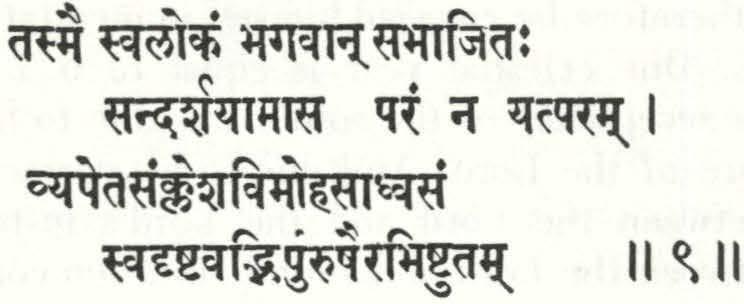
472 Srimad Bhagavatam [ Canto 2, Ch. 9
Tlw LrouLic� of penance accepted by Lord Brahma were certainly in the lirH: of devotional service (bhakti). Otherwise there was no chance of VaikU(l�ha or svalokam, the Lord's personal abodes, becoming visible to Brahnriijl. The personal abodes of the Lord, known as Vaikutttha , are n1:iLh1:r mylh nor material, as conceived by the impersonalists. But such reali�ation of Lhe transcendental abodes of the Lord is possible only through devotional service, and thus the devotees enter into such abodes. Then: is undoubtedly trouble in executing penance, but the trouble accepted in executing bhakti-_yoga is transccnden�al happiness from the v1:ry beginning, whc:rcas the trouble of penance in other processes of selfrealization (namely jiiiina_yoga, dh:viina_yoga. etc.) \vithout any Vaiku(l!ha realization ends in trouble only and nothing more. There is no profit in biting husks without grains. Similarly, there is no profit in executing troublesome penances other than bhakti-yoga for self-realization.
Execution of bhakti-_yoga is exactly like sitting on the lotus sproutl'd out of the abdomen of the transcendental Personality of Godhearl, for Lord Brahma was seated there. Brahmaji was able to please the Lord, and the Lord was also pleased to show Brahmaji His personal abode. Srila Jlva Gosvami narrates, in the comments of his Krama-sandarbha annotation of Srimad-Bhiigavatam, quotations from the Giirga Upani§ad, Vedic evidence. It is said that Yajfi.avalkya described this transcendental abode of the Lord to Gargi, and it is said there that the abode of the Lord is situated above the highest planet of the universe, namely Brahmaloka. This abode of the Lord, although described in the revealed scriptures like the Bhagavad-g'itii and the Srimad-Bhiigavatam, remains only a myth for the less intelligent class of men with a poor fund of knowledge. Herein the word svad!§tavadbhi is very significant. One who has actually reali�ed his sdf reali�cs Lhetranscendental formof one'sself. Impersonal reali:wlion of self and the Supreme is not complete, because it is just an opposite conception of material personalities. The Personality of Godhead and the personalities of devotees of the Lord arc all transcendental; they do not have material bodies. The material body is overcast with five kinds of miserable conditions, namely ignorance, material conception, attachment, hatred and absorption. As long as one is overwhelmed with these five kinds of material miseries, there is no question of entering into the Vaikup�halokas. Impersonalconception of one's self isjust the negationof materialpersonality, farfrom thepositive existenceof personal form. These personal formsof the transcendental abode will be explained in the follow-

Text 9) Answers by Citing the Lord's Version 473
PURPORT
ing verses. Brahmajlalso described this highest planet of the Vaikur.thaloka as Goloka Vrndavana, where the Lord resides as a cowherd boy keeping tran cendental surabhi cows and surrounded by hundreds and thousands of goddesses of fortune.
cintamar-i-prakara-sadmasu kalpavrk§alak§avrte§u surabhir abhipiilayantam lak§mi- sahasra-sata-sambhrama-sevyamanarh govindam iidi-puru§arh tam aharh bhajiimi (Bs. 5.29)
The statement of the Bhagavad-gita, yad gatva na nivartante tad dhiima paramarh mama, is also confirmed herewith. Param means tran cendental Brahma. Therefore, the abode of the Lord is also Brahma, nondifferent from lhe Supreme Personality of Godhead. The Lord is known as Vaikur;1tha, and His abode is also known as Vaikur;ttha. And uch Vaikur;1tha realization and worship can be made possible by transcendental form and sense.

TEXT 10 srm


� � fiN ;r � Cfa��$fl'i! I
� � 1: II� oII
pravartate yatra rajas tamas tayofi. sattvarh ca miSrarh na ca kala-vikramafi. na yatra miiya kim utapare harer anuvrata yatra surasurarcitafi.
pravartate-prevail; yatra-wherein; raja[!. tamafi.- the modes of ignorance and passion; tayofi.-both of them; sattvam-the mode of goodness; ca-and; misram-mix:ture; na-never; ca-and; kiila-time; vikramafi.influence; na-neither; yatra-therein; maya-illusory external energy; kim-what; uta-there is; apare-others; hare[l.-of the Personality of Godhead; anuvratiifi.-devotees; yatm-wherein; sura-the demigods; asura -the demons; arcita[l.-wor!ihiped .
474 Srimad Bhiigavatam [Canto 2, Ch. 9
� �ttl'itttitl:
;r ���am�-
Jn that personal abode of the Lord, the material modes of ignorance and passion do nol prevail, nor is there any of their influence in the matter of goodnt',ss. There is no predominance of the influence of time, so what to speak of the illusory external energy that cannot enter in that region. Without discrimination, both the demigods and the demons worship the Lord as devotees.
PURPORT
The kingdo m of God, or tlw atrnosplwre of Vaiku�1(ha natun�, which is called th<: tripiid-vibhuti, is IInce ti111cs bigger than the material universes and is <h :s nikd hnc, as also in the Hhagavad-gitii, in a nut hell. This universe, < ·o ntaininj!; l,illion: of stars and planets , is one of the billions of su<:h ttlli\!·rses clw; tt'tTd toj!;dlwr wi thin the compass of mahat-tattva. And all Lhnw millions and billions of ttnivcrs<�s combined together consti· lute only one fourth of the magniltt dc of the whole creation of the Lord. Thnc is the spiritual sky also; LH'yond this sky the spiritua l planets arc Llwrc under the narrH�S of Vaikll�t�ha, and all of them constitute three fourths of the entire creation of the Lord. God's creations arc always innumerable. Even the leaves of a tree cannot be counted by a man, nor the hairs on his head. However, foolish men are puffed up with the idea of becoming God Himself, though unable to create a hair of their own bodies. Man may discover so many wonderful vehicles of journey, but even if he reaches the moon by his much advertised spacecraft, he cannot remain there. The sane man, therefore, without being puffed up, as if he were the God of the universe, abides by the instructions of the Vedic literature, th<� easiest way to acquire knowledge in transcendence. So let us know through the authority of Srimad-Bhiigavatam of the nature and constitution of the transcendental world beyond the material sky. In that sky the material quaJities, especially the modes of ignorance and passion, are completely absent. The mode of ignorance influences a living entity to the habil of lust and hankering, and this means that in the Vaiku!lthalokas the living entities are free from these two things. As confirmed in the Bhagavad-gitii, in the brahma-bhuta stage of life one becomes free from hankering and lamentation. Therefore the conclusion is that the inhabitants of Lh<' Vaikul).tha planets are aJI brahma-bhiita living enlilics, as distinguished from the mundane creatures who are all eompacl in hankering and lamt'n· Lalion. Wlu�n one is nul in the modes of ignorance and passion, on<' is

Text 10) Answers by Citing the Lord's Version 475
TRANSLATION
supposed to be situated in the mode of goodness in the material world. Goodness in the material world also at times become contaminated with touches of the modes of passion and ignorance. In the Vaiku�thaloka, it is unalloyed goodness only.
The whol.e situation there is one of freedom from the illusory manifestation of the external energy. Although illusory energy is also part and parcel of the Supreme Lord, still illusory energy is differentiated from the Lord. The illusory energy is not, however, false, as claimed by the monist philosophers. The rope accepted as a snake may be an illusion to a particular person, but the rope is a fact, and the snake is also a fact. The illusion of water on the hot desert may be illusion for the ignorant animal searching out water in the desert, but the desert and water are actual facts. Therefore the material creation of the Lord may be an illu ion to the nondevotee class of men, but to a devotee even the material creation of the Lord is a fact, as the manife tation of His external energy. But this energy of the Lord is not all. The Lord has His internal energy also, which has another reation known to be the Vaiku�thalokas, where there is no ignorance, no passion, no illusion and no past and present. With a poor fund of knowledge one may be unable to understand the existence of such things as the Vaiku�tha atmosphere, but that does not nullify its existence. That spacecraft cannot reach these planets does not mean that there are no such planets, for they are described in the revealed scriptures.

As quoted by Snla Jiva Gosvami, we can know from the Niiradapancariitra that the transcendental world or Vaiku�tha atmosphere is enriched with transcendental qualities. These transcendental qualities, as revealed through the devotional service of the Lord, are distinct from the mundane qualities of ignorance, passion and goodness. Such qualities are nonattainable by the nondevotee class of men. In the Piidma Puriil)a, Uttara-hhal)pa, it is stated that beyond the one-fourth part of God's creation, there is the three-fourths part manifestation. The marginal line between the material manifestation and the spiritual manifestation is the Viraja River, and beyond the Viraja, which is a transcendental current flowing from the perspiration of the body of the Lord, there is the threefourths part manifestation of God's creation. This part is eternal, everlasting, without any deterioration, and unlimited, and contains the highest pcrfectional stage of living conditions. In the Siilikhya-kaumudi it is slated that unalloyed goodness or transcendence is just opposite to the material modes. All living entities are eternally associated without any break, and th1� Lord is the chief and prime entity there. In the Agama Purii[WS also, the transcendental abode is described as follows: The asso-

476 Srimad Bhagavatam [Canto 2, Ch. 9
ciated members Lherc are free to go everywhere within the creation of the Lord, and Lherc is no limit to such creation, particularly in Lhe region of the three-fourths magnitude. Since the nature of that region is unlimited, Lherc is no history of such association, nor is there end of it.
The conclusion may be drawn that because of the complete absence of Lhe mundane qualities of ignorance and passion, there is no queslion of creation nor of annihilation. In the material world everything is created and everything is annihilated,and theduration of life between the creation and annihilation is temporary. In the transcendental realm there is no creation and no de truction, and thus Lhe duration of life i eternal unlimitedly. In other words, everything in the transcendental world is cverlasling, full of knowledge and bliss without any deterioration. Since there is no deterioration, there i no past, present and future in the estimation of time. It is clearly stated in this verse that the influence of time is conspicuous by its absence. The whole material existence i manifested by actions and reactions of clements which make the influence of time prominent in the matter of past, present and future. There are no such actions and reactions of cause and effects there, so the cycle of birth, growth, exi tence, transformations, deterioration and annihilation, or the six material changes, are not existent there. It is the unalloyed manifestation of the energy of the Lord without any illusion as experienced here in the material world. The whole Vaikul)thaexistenceproclaimsthat everyone there is a follower of the Lord. The Lord is the chief leader there without any competition of leadership, and the people in general are all followers of the Lord. It is confirmed in the Vedas, therefore, that the Lord is the chief leader, and all other living entities are subordinate to Him, as only the Lord satisfies all the needs of all other living entities.

Text 11] Answers by Citing the Lord's Version 477
11 "' ��en: ��: fq��T: �: �$: I � �� ��lf�OfSJffi;r�: ij�;:f�:II��II syiimiivadiitiifl. sata-patra-locanii[l pi.Sa�iga-vastriifl. su-rucafl. su-pesasafl. saroe catur-biihava unmi§an-mapipraveka-n4·kiibhara�;tiifl. su-varcasafl.
TEXT
syama-sky-bluish; avadata[l-glowing;sata-patra-lotusflower; locanii[leyes; pisahga-yellowish; vastrii[l-clothing; su- ruca[l-greatly attractive; su -pesasa�-growing youthful; sarve-all of them; catu[l-four; biihava[lhands; unmi§an-rising luster; mar-i-pearls; praveka-superior quality; ni§ka-<lbharar-ii[l-ornamental medallion; su-varcasa[l-effulgent.
TRANSLATION
The inhabitants of the Vaikul).tha planets are described as having a glowing sky-bluish complexion. Their eyes resemble the lotus flower, their dress is of yellowish color and their bodily features very attractive. They are just the age of growing youths, they all have four hands, they are all nicely decorated with pearl necklaces with ornamental medallions, and they all appear to be effulgent.
PURPORT
The inhabitants in VaikuJJ.thaloka are all personalities with spiritual bodily features not to be found in the material world. We can find the descriptions in the revealed scriptures like Srimad-Bhagavatam. Impersonal descriptions of transcendence in the scriptures indicate that the bodily features in VaikuJJ.thaloka are never to be seen in any part of the universe, As there are different bodily features in different places of a particular planet,or as there are different bodily features between bodies in different planets, similarly the bodily features of the inhabitants in the Vaikul).thalokas are completely different from those in the material universe. For example, the four hands are distinctfrom two hands inthis world.
TEXT 12

praviila-vaidurya-mrrtiila-varcasa[l
parisphurat-kur-flala-mauli-malina[l
pravala-coral; vaidurya-a special diamond; mrr-iila-celestial lotus; varcasa[l-rays; parisphurat-blooming; ku{l!fala-earring; mauli-heads; malina[l-wilh garlands.
478 Srimad Bhagavatam [Canto 2, Ch. 9
��t�'i'lll�i:t+l«:
qf{�(�:t�o:s�f�tf�:II��II
Some of them are effulgent like the coral and diamond in complexion and have garlands on their heads, blooming like the lotus flowers, and some wear earrings.
PURPORT
There are some inhabitants who have attained the liberation of sarilpya, or possessing bodily features like that of the Personality of Godhead. The vaidurya diamond is especially meant for the Personality of Godhead, but one who achieves the liberation of bodily equality with the Lord is especially favored with such diamonds on the body.
TEXT 13

�:IIZ�ll
bhr.tlj4rubhir ya[t•parito virajate lasad-vimanavalibhir mahatmanam vidyotamana[l pramadottamadyubhi[l sa-vidyud abhravalibhir yatha nabha[l

bhraj41)ubhi[l-by the glowing; yaft- the Vaikul)tha-lokas; paritaftsurrounded by; virojate-thus situated; Zasat-brilliant; vimana-airplanes; avalibhi[l-assemblage; maha-atmanam-of the great devotees of the Lord; vidyotamiina[l-beautiful like the lightning; pramada- ladies ; uttamacelestial; adyubhi[l-by complexion; sa-vidyut-with electric lightning; abhravalibhi[l-with clouds in the sky; yathii-as it were; nabha[l- the sky.

TRANSLATION
The VaikuQ!ha planets are also surrounded by various airplanes, all glowing and brilliantly situated, belonging to the great mahatmas or devotees of the Lord. The ladies also are as beautiful as lightning because of
Text 13 J Answers by Citing the Lord's Version 479
TRANSLATION
m�: qfuft � �iiTi1t;fi�-� mit�:
their celestial complexions, and all these combined together appear just like the sky decorated with both clouds and lightning.
PURPORT
lt appears that in the Vaikur;ttha planets there are airplanes also brilliantly glowing, and they are occupied by the great devotees of the Lord with ladies of celestial beauty as brilliant as lightning. As there are airplanes, so there must be different types of carriages also like the air· planes, but they may not be driven machines, as we have experience in this world. Because everything is of the same nature of eternity, bliss and knowledge, the airplanes and carriages are of the same quality as Brahman. As there is nothing except Brahman, so it should not be misconceived that there is only void and no variegatedness. To think like that is due to a poor fund of knowledge, otherwise no one would have such a misconcep· tion of voidness in the Brahman. As there are airplanes, ladies, and gentlemen, so there must be cities and houses and everything else just suitable to the particular planets. One should not carry the ideas of imperfection from this world to the transcendental world without taking into considera· tion the nature of the atmosphere, as completely free from the influence of time, etc., as described previously.
TEXT 14

srir yatra riipi[ly urugiiya-piidayoft
karoti miinam bahudhii vibhiitibhift
prenkham sritii yii kusumiikariinugair vigiyamiinii. priya-karma giiyati
sn"[l-the goddess of fortune; yatra-in the vaikur;ttha planets; riipi[li-in her transcendental form; urugiiya-the Lord, who is sung of by the great devotees; piidayoft-under the lotus feet of the Lord; karoti-does; miinam
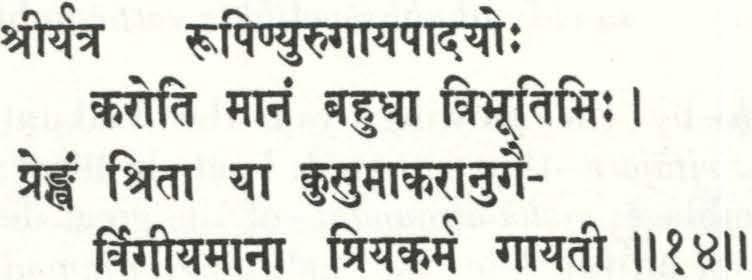
480 Srimad Bhagavatam [Canto 2, Ch. 9
-respectful services; bahudhii-in diverse paraphernalia; vibhiitibhiftaccompanied by her personal associates; prenkham-movement of enjoyment; sritii-taken shelter of; yii-who; ku sumiikara-spring; anugaift-by the black bees; vigiyamiinii-being followed by the songs; priya-karmaactivities of the dearmost; giiyati-singing.
TRANSLATION
The goddess of fortune in her transcendental form is engaged in the loving service of the Lord's lotus feet, and being moved by the black bees, followers of spring, she is not only engaged in variegated pleasure-service to the Lord, along with her constant companions-but also she is engaged in singing the glories of the Lord's activities.
TEXT 15

dadarsa tatriikhila-siitvatiirh patirh
sriyaft patirh yajna-patirh jagat-patim
sunanda-nanda-prabaliirhartiidibh*
sva-pii�adiigrai[l. parisevitarh vibhum
dadar-Sa-Brahma saw; tatrq-there in the Vaikut;�thaloka; akhila-entire; siitvatiim-of the great devotees; patim-the Lord; sriyafi.-of the goddess of fortune; patim-the Lord; yajiia- sacrifice; patim-the Lord; jagat-the univer e; patim-the Lord; sunanda- S unanda; nanda-Nanda; -prabalaPrabala; arharta-ArhaJ;ta; iidibhifl,-by them; sva-piir§ada-own associates; agraifi,-by the foremost; parisevitam-being served in transcendental love; vibhum-the Great Almighty.
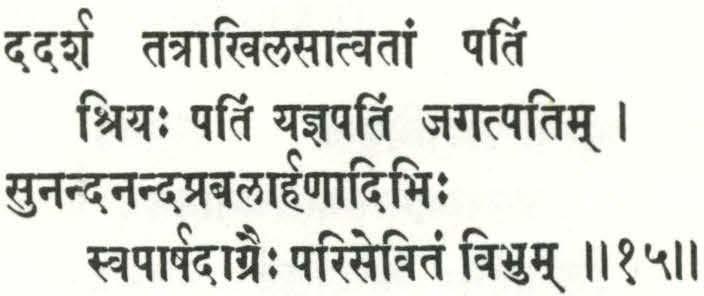
TRANSLATION
Lord Brahma saw in the Vaiku�tha planet the Personality of Godhead, who is the Lord of the entire devotee community, the Lord of the goddess offortune,the Lord of all sacrifices, andthe Lord of the universe, and who
Text 15) Answers by Citing the Lord's Version 481
is served by the foremost servitors like Nanda, Sunanda, Prabala, and Arha�a, His immediate associates.

PURPORT
When we speak of the king it is naturally understood that the king is accompanied by his confidential associates, like his secretary, private secretary, aide-de-camp, ministers, advisers, etc. So also when we see the Lord we see Him with His different energies, associates and confidential servitors, etc. So the Supreme Lord, who is the leader of all living entities, the Lord of all devotee sects, the Lord of all opulences, the Lord of sacrifices and the enjoyer of everything in His entire creation, is not only the Supreme Person, but also He is always surrounded by His immediate associates, all engaged in their loving transcendental service to Him.
TEXT

bhrtya-prasiidiibhimukham drg-iisavam
prasanna-hiisiirur-a-locaniinanam
kiritinam kur!lalinam catur-bhujam
pitiirh-sukam vak�asi lak�itam sriyii
bhrtya-the servitor; prasada-affection; abhimukham-favorably facing; drk-the very sight; iisavam-an intoxication; prasanna-very much pleased; hilsa-smile; arura-reddish; locana-eyes; ananam-face; kiritinam- with helmet; kur!lalinam-with earrings; catuft-bhujam-with four hands; pitiim -yellow; sukam-dress; vak�asi-on the chest; lak§itam- marked with; sriyii-the goddess of fortune.

TRANSLATION
The Personality of Godhead, seen leaning favorably towards His loving servitors, His very sight intoxicating and attractive, appeared to be
482 Srimad Bhagavatam [Canto 2, Ch. 9
��� ��
16 =o""4��,� �'"'( f�R;;j
tft�� ��« �� f� II�G.II
very much satisfied. He had a smiling face decorated with an enchanting reddish hue. He was dressed in yellow robes and wore earrings and a helmet on his head. He had four hands, and His chest was marked with the lines of the goddess of fortune.
PURPORT
In the Piidma Purii[ta, Uttara-khaft!ia, there is a full description of the yoga-pitha or the particular place where the Lord i in audience to His eternal devotees. In that yoga-pitha, the personifications of religiousness, knowledge, opulence, and renunciation are all seated at the lotus feet of the Lord. The four Vedas, namely .[?.k, Siima, Yajus, and A tharoa, are presenttherepersonallyto advise the Lord. The sixteen energies headed by Cap�a are all present there. Cap�a and Kumuda are the two first doorkeepers, and at the middle door there are the doorkeepers named Bhadra and Subhadra, and at the last door there are J aya and Vijaya. There are other doorkeepers also, named Kumuda, Kumudak�a, Pup�arika, Vamana, Sankukarlla, Sarvanetra, Sumukha, etc. The palace is well decorated and protected bythe above-mentioneddoorkeepers.
TEXT 17

� �:tfl���f��:
� � �(1{¥tiii1'4T� II�\911
adhyarha[tiyiisanam iisthitarh pararh
vrtarh catu[l.-§o!ia.Sa-panca-saktibhifi. yuktarh bhagaifi. svair itaratra ciidhruvaifi.
sva eva dhiiman ramamiirtam iSvaram
adhyarhartiya-greatly worshipable; iisanam-throne; iisthitam-scated on it; param-the Supreme; vrtam-surrounded by; catufi.-four, namely pf'(lk[ti, puru§a, mahat and ego; §O!iasa-t he sixteen ; panca- t he five; saktibhifl.-by the energies; yuktam- empowercd with; bhagai{1- l lis opuleru:e�; svaifl-personal; itaratra-other minorprow<�sses; ca-a !so; adhmvaifl-INII·
Text 17] Answers by Citing the Lord's Version 483
,....
3l�afF:IRf.l�ttft;.«i tR . ....
"
I �� �if: �mm �'if�: -,:)
porary; sva-own; eva-certainly; dhaman-abode; ramama[la.m-enjoying; isvaram-the Supreme Lord.
TRANSLATION

The Lord was seated on His throne and was surrounded by different energies like the four, the sixteen, the five, and the six natural opulences, along with other insignificant energies of the temporary character. But He was the factual Supreme Lord, enjoying His own abode.
PURPORT
The Lord is naturally endowed with His six opulences, namely He is the richest in wealth, He is the most powerful, He is the most famous, He is the most beautiful, He is the greatest in knowledge, and He is the greatest renouncer as well. And for His material creative energies, He is served by four, namely the principles of prakrti, puru§a, mahat-tattva and ego. He is also served by the sixteen, namely the five elements, earth, water, air, fire and sky, the five perceptive sense organs, namely the eye, ear, nose, tongue and skin, and the five working sense organs, namely the hand, the leg, the stomach, the evacuation outlet and the genitals. Together with the mind, they are sixteen in all. And the five includes the sense objects, namely form, taste, smell, sound and touch. All these twenty-five items serve the Lord in the material creation, and all of them are personally present to serve the Lord. The insignificant opulences numbering eight (the U§ta.-siddhis, attained by yogis for temporary overlordship) are also under His control, but He is naturally full with all such powers without any effort, and therefore He is the Supreme Lord.
The living being, by severe penance and performances of bodily exercises, can temporarily attain some wonderful power, but that does not make him the Supreme Lord. The Supreme Lord by His own potency is unlimitedly more powerful than any yogi, He is unlimitedly more learned than any jii.ani, He is unlimitedly richer than any wealthy person, He is unlimitedly more beautiful than any beautiful living being, and He is unlimitedly more charitable than any philanthropist. He is above all, and no one is equal to or greater than Him. Nor can anyone reach His level of perfection in all the above powers by any amount of performance of penance or yogic demonstration. The yogis are dependent on His mercy. Out of His immensely charitable disposition He can award some temporary
484 Srimad Bhagavatam [Canto 2, Ch. 9
powers to the yogis because of the yogis' hankering after them, but to His unalloyed devotees, who do not want anything from the Lord save and except His transcendental service, the Lord is so pleased that He gives Himself in exchange for unalloyed service. TEXT 18 ���lijla;qft'{iijlr{iit
tad-darianii.hliida-pariplutii.ntaro
hr�yat-tanufl, prema-bhariisru-locanafl, naniima piidiimbujam asya visva-srg
yat piiramaharhsyena pathii.dhigamyate
tat-by that audience of the Lord; dar5ana-audience; ii.hliida-joy ; paripluta- overwhelmed; antara�-within the heart; hnyat-full in ecstasy; tanu�-body; prema-bhara-in full transcendental love; asru-tears; locana� -in the eyes; naniima-bowed down;piidiimbujam-under the lotus feet; asya-of the Lord; viSva-srg-the creator of the universe; yat-which; piiramaharhsyena-by the great liberatedsoul;pathii-thc path ;adhigamyate -is followed.
TRANSLATION
Lord Brahrna, thus seeing the Personality of Godhead in His fullness, became overwhelmed with joy within his heart, and thus in full transcendental love and ecstasy, his eyes became full with tears of love. He thus bowed down before the Lord. That is the way of highest perfection for the living being [paramahamsa].
PURPORT
In the beginning of the Srimad-Bhiigavatam it is stated that this .great literature is meant for the paramaharhsas. Param nirmatsariiriim satiim,

Text 18] Answers by Citing the Lord's Version 485
"' "'
���
�ifff?j: 3l���: I ;r.w{
fq��-�,({R� tp;ffi� 11��11
i.e. the Srimad-Bhiigavatam is meant for such persons who are completely free from malice. In the conditioned life the malicious life begins from the top, namely bearing malice against the Supreme Personality of Godhead. The Personality of Godhead is an established fact in all the revealed scriptures, and in the Bhagavad-gi:tii the personal feature of the Supreme Lord is especially mentioned, so much so that in the last portion of the great literature it has been emphatically stressed that one should surrender unto the Personality of Godhead to be saved from the miseries of life. Unfortunately, persons with impious backgrounds do not believe in the Personality of Godhead, and everyone wants to become God himself without any qualification. This malicious nature in the conditioned soul continues even up to the stage when a person wants to be one with the Lord, and thus even the greatest of the empiric philosophers speculating on becoming one with the Supreme Lord cannot become a paramahamsa because the malicious mind is there. Therefore the paramaharhsa stage of life can only be attained by those who are fixed in the practice of bhaktiyoga. This bhakti-yoga begins if a person has the firm conviction that simply discharging devotional service to the Lord in full transcendental love can elevate him to the highest perfectional stage of life. Brahmaji believed in this art of bhakti-yoga; he believed inthe words ofthe Lordto execute tapa, and he discharged the function \vith great penance and thus achieved the great success of seeing the V aiku�thalokas and the Lord also by personal experience. No one can reach the abode of the Supreme Lord by any mechanical means of the mind or machine, but one can reach the abode of the V aiku��halokas simply by following the process of bhaktiyoga because the Lord can be realized only through the bhakti-yoga process. Lord Brahmiiji was actually sitting on his lotus seat, and from there, by executing the process of bhakti-yoga in great seriousness, he could see the Vaiku�thalokas with all variegatedness as well as the Lord in person and His associates.
Following in the footsteps of Lord Brahma, any person, even up to this day, can attain the same perfection by following the path of the paramahamsa as recommended herein. Lord Caitanya also approved of thismethod of self-realization for men in this age. One should first, with all conviction, believe in the Personality of Godhead Sri Kr�J!a, and without making efforts to realize Him by speculative philosophy, one should prefer to hear about Him from the Srimad-Bhagavad-gi:tii and later on from the text of the Srimad-Bhiigavatam. He should hear such discourses from a person Bhiigavatam and not from the professional man, nor from the karmi:, jiiiini: or yogi. That is the secret of learning the science. One does not need to be

486 Srimad Bhagavatam [Canto 2, Ch. 9
in the renounced order of life; he can remain in his present condition of life,_ but he must search out. the association of a bona fide devotee of the Lord and hear from him the transcendental message of the Lord with faith and conviction. That is the path ofthe paramaharhsa recommended herein. Amongst various holy names of the Lord, He is called also ajita, or one who can never be conquered by anyone else. Yet He can be conquered by the paramahamsa path, as is practically realized and shown by the great spiritual master Lord Brahmii. Lord Brahma has personally recommended this paramahamsa-pantha in his own words as follows:
jiiiine prayiisam udapiisya namanta eva jivanti sanmukharitiirh bhavadiyaviirtiim sthiine sthitiift sruti-gatiirh tanuviinmanobhir ye priiyaso )ita-jito'pyasi tais trilokyiim
Lord Brahma said, "0 my Lord Kr�!J.a, a devotee who abandons the path of empiric philosophical speculation aimed at becoming merged in the existence of the Supreme and engages himself in hearing Your glories and activities from a bona fide siidhu, or saint, and who lives an honest life in the occupational engagement of his social life,can conquer Your sympathy and mercy even though You are ajita, or unconquerable by anyone."
(Bhiig. 10.14.3) That is the path of the paramaharhsas, which was personally followed by Lord Brahmii and later on recommended by him for attaining perfect success in life.
tam priyamiir-am samupasthitarh kavirh
prajii-visarge nija-siisaniirhar-am babhii§a i§at-smita-soci§ii girii

priyaft priyam prita-maniift kare sp[San
tam-unto Lord Brahmii; priyamiil)am-worthy of being dear; samupasthitam-present before; kavim-the great scholar; prajii-living entities;
Text 19] Answers by Citing the Lord's Version 487
ij ��oi mrn� ctiR �cmtr A��R1'11�atll_ I � ���'RWllMttl ftm fir:r:fWfs0ij+i'11: �� IIZ�II
TEXT 19
visarge-in the matter )f creation;nija- His own;sasana-control;arha!1am -just suitable; babhii§e-addressed; 4at-mild; smita-smiling; soci§iienlightening;girii-words;priya�-the beloved;priyam-the counterpart of love; prita-manii{!- being very much pleased; lwre- by the hand; sprsunshaking.
TRANSLATION
And seeing Brahma present before Him, the Lord accepted him as worthy to create living beings, to be controlled as He desired, and thus being much satisfied with him, the Lord shook hands with Brahma and, slightly smiling, addressed him thus.
PURPORT
The creation of the material world is not blind nor accidentaL The living entitie who are ever conditioned, or nitya-bandha, are thus given a chance for liberation under the guidance of His own representative like Brahma.The Lord instructs Brahma in Vedicknowledge in order to diffuse this knowledge to the conditioned souls. The conditioned souls are forget· ful souls in their relationship with the Lord, and thus a period of creation and the process of dissemination of Vedic knowledge are necessary activities of the Lord. Lord Brahma has great responsibility to deliver the conditioned souls, and therefore he is very dear to the Lord.

Brahma also does his duty very perfectly, not only by generating the living entities but also by spreading his party for reclaiming the fallen souls. The party is called the Brahma-sampradiiya, and any member of this party to date is naturally engaged in reclaiming the fallen souls back to Godhead, back to home. The Lord is very much anxious to get back His parts and parcels, as stated in the Bhagavad-gitii. No one is more dear than the one who takes the task of reclaiming the fallen souls back to Godhead.
There are many renegades from the Brahma-sampradaya whose only business is to make men more forgetful of the Lord and thus entangle them more and more in material existence. Such persons are never dear to the Lord, and the Lord sends them deeper into the darkest region of matter so that such envious demons may not be able to know the Supreme Lord.
Anyone, however, preaching the mission of the Lord in the line of Brahma-sampradiiya is always dear to the Lord, and the Lord, being satisfied with such a preacher of the authorized bhakti cult, shakes hands with him in great satisfaction.
488 Srimad Bhagavatam [Canto 2, Ch. 9
TEXT 20

�.m�w:u
��mt'ffl: �iT � f� I "' ffi � � �: iliitfill11¥( 11�01\
sri bhagaviin uviica
tvayiiham to�ita� samyag veda-garbha sisrk�ayii ciram bhrtena tapasii dusto�a� kuta-yoginiim-
sri bhagaviin uviica-the all-beautiful Personality of Godheadsaid; tvayii -by you; aham-I am; t o�ita�-pleased; sam_yak-complete; veda-garbhaimpregnated with the Vedas; sisrk�ayii-for creating; ciram-for a long time; bhrtena-accumulated ; tapasii-by penance; dus to�a�-very hard to please; kuta-yoginiim-for the pseudo mystics-

TRANSLATION
The beautiful Personality of Godhead addressed Lord Brahma: 0 Brahma, impregnated with the Vedas, I am very much pleased with your long accumulated penance with the desire for creation. Hardly am I pleased with the pseudo mystics.
PURPORT
There are two kinds of penance: one for sense gratification and the other for self-realization. There are many pseudo mystics who undergo severe penances fortheir own satisfaction,and there are others who undergo severe penances for the satisfaction of the senses of the Lord. For example, the penances undertaken to discover nuclear weapons will never satisfy the Lord because such a penance is never satisfactory. By nature's own way, everyone has to meet death, and if such a process of death is accelerated by anyone's penances, there is no satisfaction of the Lord. The Lord wants every one of His parts and parcels to attain eternal life and blissby coming home to Godhead,and the wholematerial creation is meant for that objective. Brahma underwent severe penances for that purpose, namely to regulate theprocess of creation so thatthe Lord might
Text 20] Answers by Citing the Lord's Version
489
be satisfied, and therefore the Lord was very much pleased with him, and for this Brahma was impregnated with Vedic knowledge. The ultimate purpose of Vedic knowledge is to know the Lord and not to misuse the knowledge for any other purposes. Those who do not utilize Vedic knowledge for that purpose are known as kii.!a-yogis, or pseudo transcendentalists who spoil their lives with ulterior motives.
TEXT 21

varam varaya bhadram te varesam miibhiviiiichitam brahman chreya[l.-pariSriima[l. purhsiim mad-darsaniivadhi[l.
varam-benediction; varaya-just ask from; bhadram-auspicious; teunto you; varesam-the giver of all benediction; mii (miim}-from Me; ubhiviiiichitam-wishing; brahman-0 Brahmii; sreya?l-the u ltimate success; pari-sriima[l.-for aU penances; pumsiim-for everyone; mat-My; dadana-realization; avadhi[l.-up to the limit of.
TRANSLATION
I wish you good luck. 0 Brahma, you can ask from Me, the giver of all benediction, all that you may desire. You may know that the ultimate benediction, as the result of all penances, is to see Me by realization.
PURPORT
Th1: ultima!�: realization of the Supreme Truth is to know and see eye to eye the Pt:rsonality of Godhead. Realization of the impersonal Brahman and locali:wd Paramatma features of the Personality of Godhead is not ultimate n:alization. When one realizes the Supreme Lord, one does not �t ruggle hard to perform such penances. The next stage of life is to dis1:harg1: devotional service to the Lord just to satisfy Him. In other words,

490 Srimad Bhagavatam [ Canto 2, Ch. 9
one who has realized and seenthe Supreme Lord has attained allperfection because everything is included there in that highest perfectional stage. The impersonalisls and Lhe pseudo mystics, however, cannot reach this state.
TEXT 22

mani§itiinubhiivo')ram mamalokiivalokanam yadupasrutyarahasi cakarthaparamarhtapafi.
mani§ita-ingenuity ; anubhiivafi. - perception ; ayam- this; mama- My; loka-abodc; avalokanam- seeing by actual experience; yat- because; upasrutya-hearing;rahasi-in great penance; cakartha- having performed; paramam-highest ; tapaf!.-penance.
TRANSLATION
The highesl perfectional ingenuity is the personal perception of My abodes, and Lhis has been possible because of your submissive attitude in the performance of severe penance on My order.
PURPORT
The highest pcrfcctional stage of life is to know the Lord by actual perception, by the grace of the Lord. This can be attained by everyone who is willing to discharge the act of devotional service to the Lord as enjoined in the revealed scriptures that are standard and accepted by the bona fide iiciiryas, spiritual masters. For example, the Bhagavad-gitii is the approved Vedic literature accepted by all the great iiciiryas, such as Sankara, Ramanuja, Madhva, Caitanya, Visvanatha, Baladeva, Siddhanta Sarasvali and many others. In that Bhagavad-gitii the Personality of Godhead, Sii Kr�!la,asksthat one should alwaysbe mindful of Him,one should always be His devotee, one should always worship Him only, and one should always bow down before the Lord. And by doing so one is sure to

Texl 22) Answers by Citing the Lord's Version 491
go back home., back to Godhead, without any doubt. In other places also the same order is there, that one should give up all other engagements and fully surrend<�r unto the Lord without any hesitation. And the Lord will give such a devotee all protection. And these arethe secrets of attainingthe highest perfectional stage. Lord Brahma exactly followed these principles without any superiority complex, and thus he attained the highest perrcdional sta�<: of exp<�riencingthe abode of the Lord and the Lord Himself with all II is paraphernalia. Impersonal realization of the effulgence of the body of the Lord is not the highest perfectional stage, nor is the stage of Paramatma n�ali:t.ation. The word mani§ita is significant. Everyone is falsely or fa<:lually proud of his so-called learning. But the Lord says that du: hi�hf'st perfcetional stage of learning is to know Him and His abode, devoid of all illusion.

pratyadi§tam maya tatra tvayi karma-vimohite tapa me hrdayam sak§adatmiiham tapaso'nagha
pratyadi§tam-ordered by; maya-by Me ; tatra- because of; tvayi- unto you; karma-dut y ; vimohite-being perplexed; tapa[t-penance; me-Mine ; hrdayam- heart ; sak§ilt-directly; atma-life and soul; aham-Myself; tapasa[t- of one who is engaged in penance; anagha-0 sinless one.

TRANSLATION
0 Brahma, the sinless, you may know from Me that it was I who ordered you to undergo penance at first on your being perplexed in your duty, because such penance is My heart and soul, and because of that, penance and I are nondifferent.
PURPORT
The penance by which one can see the Personality of Godhead eye to eye is to be understood as devotional service to the Lord and nothing else
492 Srimad Bhagavatam [Canto 2, Ch. 9
b('(:attsc only by <.lis(:harging devotional service in transcendPnlal love can one approa(:h the Lord. Such penance is the internal potency of the Lord and is nondiff(!rcnt from Him. Such acts of internal potency are exhibited by nonattachmcnt for material enjoyment. The living entities are encagcd in the conditions of material bondage because of their propen ity for ovcrlordship. But by engagement in the devotional service of the Lord one becomes detached from such enjoying spirit. The devotees automatically become detached from worldly enjoyment, and this detachment is the result of perfect knowledge. Therefore the penance of devotional service include knowledge and detachment, and that is the manifestation of the transcendental potency.

One cannot enjoy material illusory prosperity if he desires to return home, back to Godhead. One who has no information of the transcendental bli s in the association of the Lord foolishly desire to enjoy this temporary material happiness. In the Caitan_ya-caritiimrta it is said that if someone sincerely wants to see the Lord and at the arne time wants to enjoy this material world, he is considered to be a fool only. One who wants to remain here in the material world for material enjoyment has no business entering into the eternal kingdom of God. Such a foolish devotee is favored by the Lord by His snatching all that he may posse s in the material world. If such a foolish devotee of the Lord again tries to recoup his position, then the merciful Lord again snatches away all that he may have possessed. By such repeated failures in material prosperity he becomes very unpopular with his family members and friends. In the material world the family members and the friends honor persons who may be very successful in accumulating wealth by any means. The foolish devotee of the Lord is thus put into forcible penance by the grace of the Lord, and at the end the devotee becomes perfectly happy, being engaged in the service of the Lord. Therefore penance in devotional service of the Lord, either by voluntary submission orbeing forcedby the Lord,is necessaryfor attaining perfection, and thus such penance is the internal potency of the Lord.
One cannot, however, be engaged in the penance of devotional service without being completely free from all sins. As is stated in the Bhagavadgitii, only a person who is completely free from all reactions of sins can engage himself in the worship of the Lord. Brahmajl was sinless, and therefore he faithfully discharged the advice of the Lord, "tapa tapa,'' and the Lord, being satisfied with him, awarded him the desired result. Therefore love and penance combined can only please the Lord, and thus one is able to attain His complete mercy. He directs the sinless, and the sinless devotee attains the highest perfection of life.
Text 23] Answers by Citing the Lord's Version 493
TEXT 24

�Til wm�� wP� � �: 1 fm Qtlm f.r� tM if �� ijq: 11 � �11
srjiimi tapasaivedam
grasiimi tapasii puna[!.
bibharmi tapasii visvam
viryam me duscaram tapab
srjiimi-I create; tapasii-by the same energy of penance; eva-certainly; idam-this; grasiimi lapasii-I do withdraw also by the same energy; puna[t-again; bibharmi-do maintain; tapasii-by penance; visvam-Lhe cosmos; viryam- polency ; me- 1ine; duscaram- evere; tapa[!-penance.
TRANSLATION
I create this cosmos by such penance, I maintain it by the same energy, and I withdraw it all by the same energy. Therefore the potential power is penance only.
PURPORT
In executing penance, one must be determined to return home, back to Godhead, and must decide to undergo all types of tribulations for that end. Even for material prosperity, name and fame, one has to undergo severe types of pena11ce, otherwise no one can become an important figure in this material world. Why, then, are there severe types of penance for perfection of devotional service? An easygoing life and attainment of perfection in transcendental realization cannot go togelht!r. The Lord is more clever Lhan any living entity; therefore He wants to see how painstaking the devotee is in devotional service. The order is received from the Lord, either directly or through the bona fide spiritual master, and to execute that order, howI:VI!r painstaking, is the severe Lype of penance. One who follows the prim:ipl1: rigidly is sure to achi1:vc success in attaining the Lord's mercy.
494 Srimad Bhagavatam [Canto 2, Ch. 9
TEXT 25

;4fYlql'€1
�������Stff�
�Pl I � ��wt � Mtlf'«t4( ll�'dII
sri brahmoviica
bhagavan sarva-bhutiiniim adhyak�o'vasthito guhiim veda hy apratiruddhena prajniinena ciki�itam
sri brahmii uviica-Lord Brahma said; bhagavan-0 my Lord; sarva-all; bhiitiiniim-of all living entities; adhyak�afi.-director; avasthita{l.-situated ; guhiim-within the heart; veda-know; hi-certainly; apratiruddhena- without hindrance; prajniinena-by superintelligence; cikir�itam- endeavors.
TRANSLATION
Lord Brahma said: 0 Personality of Godhead, You are situated in every living entity's heart as the supreme director, and therefore You are aware of all endeavors by Your superior intelligence, without any hindrance whatsoever.
PURPORT
The Bhagavad-gitii confirms that the Lord is situated in everyone's heart as the witness, and as such He is the supreme director of sanction. The director is not the enjoyer of the fruits of action, but without His sanction no one can enjoy. For example, in a prohibited area a habituated drunkard puts forward his application to the director of drinking, and the director,considering his case,sanctions only a certain amount of liquor for drinking. Similarly, the whole material world is full of many drunkards, in the sense that each and every one of the living entities has something in his mind to enjoy, and everyone desires the fulfillment of his desires very strongly. The almighty Lord, very kind to the living entity, as the father is kind to the son, fulfills the living entity's desire for his childish satisfaction. With such desires in mind, the living entity does not actually enjoy,
Text 25] Answers by Citing the Lord's Version
495
but he serves the bodily whim unnecessarily, wilhoul profil. The drunkard docs nut derive any profit oul of drinking, but because he has become a servant of the drinking habit and does nol wish to gt�t out of it, the merciful Lord gives him all facilities to fulfill such desires.
The impersonalists recommend that one should become desireless, and others recommend banishing desires altogether. That is impossible; no one can banish desires altogether because desiring is tht: living symptom. Withaut having desires aliving entity would be dead,which he is nol. Therefore, living conditions and desire go together. Perfection of desires may be achieved when one desires to serve the Lord, and the Lord also desires that every living entity should banish all personal desire and cooperate with the desires of the Lord. That is the last instruction of Lhe Bhagavadgitii. Brahmajl agreed to this proposal, and therefore he is given the responsible post of creating generations in the vacant universe. Oneness with the Lord is therefore to dovetail one's desires with the desires of the Supreme Lord. That makes for the perfection of all desin�s.
The Lord, as the Supersoul in the heart of every living being, knows what is there in the mind of each living entity, and no one can do anything without the knowledge of the Lord within. By His superior intelligence, the Lord gives everyone the chance to fulfill his desires lo thefullest extent, and Lhe resultant reaction is also awarded by Lhe Lord.
TEXT 26

��� ;mr�;nf�l
��?.IT� ii[y;fF;rt � �mqur: ������
tathiipi niitha-miinasya
niitha niithaya niithitam
pariivare yathii rope
janiyiirh te tv ariipirwft
tathii api in spite of that; niitha-miinasya-of the one who is asking for; niitha-of the Lord; nathaya-please award; niithitam-as it is desired; pariivare-in the matter of mundane and transcendental; yathii-as it is; rope- in Lhe form;jiiniyiim-may it be known; te-Your; tu-but; arnpii;ta[l. -one who is formless.
496 Srimad Bhagavatam [Canto 2, Ch. 9
TRANSLATION
In spite of that, my Lord, I am praying to You, kindly to fulfill my desire. May I please be informed how, in spite of Your transcendental form, You assumethemundaneform,although Youhavenosuchformat all.
TEXT 27

yathiitma-miiyii-yogena niinii-sakty-upab[lhhitam vilumpan visdan g[h{lan bibhrad iitmiinam iitmanii
yathii-as much as;iitma-own;miiyii-potency;yogena-bycombination; niinii-various; sakti-energy; upab[lhhitam-by combination and permutation; vilumpan-in the matter of annihilation; visdan-in the matter of generation; g[h{lan-in the matter of acceptance; bibhrat-in 'the matter of maintenance; iitmiinam-own self; iitmanii-by the self.
TRANSLATION
And how You, by Your own Self, manifest different energies for annihilation, generation,acceptanceandmaintenance bycombinationand permutation.
PURPORT
The whole manifestation is the Lord Himself by diffusion of His different energies only, namely the internal, external and marginal, just as the sunlight is the manifestation of the energy of the sun planet. Such energy is simultaneously one and different from the Lord, just as the sunshine is simultaneously one and different from the sun planet. The energies are acting by combination and permutationby the indication of the Lord, and the acting agents, like Brahma, v�!lU and Siva, are also different incarna-
Text 27) Answers by Citing the Lord's Version 497
��APili\WJwtlwtl�liffllq;jf(ij4(_ I ��Mqiil�w-lf.r�aJ�Wiwr-fl II ��II
tions of the Lord. In other words, there is nothing but the Lord, and still the Lord is different from all such manifestive activities. How it is so will be explained later on.
kripasy amogha-sankalpa urr-aniibhir yathorr-ute tathii tad-v4ayiim dhehi mani§iim mayi miidhava
kripasi-as You do play; amogha-infallible; sankalpa-determination; urr.tiibhi[l-the spider; yathii-as much as; urr-ute-covers; tathii-so and so; lal-vi�ayiim-in the subject of all those; dhehi-do let me know; mani§iimphilosophically; mayi-unto me; miidhava-0 master of all energies.


TRANSLATION
0 master of all energies, please tell me philosophically all about them. You play like the spider who covers itself by its own energy, and Your determination is infallible.
PURPORT
By the inconceivable energy of the Lord, every creative element has its own potencies, known as the potency of the element, potency of knowledge and potency of different actions and reactions. By a combination of such potential energies of the Lord there is the manifestation of creation, maintenance and annihilation in due course of time and by different agents like Brahma, Vi��u and Mahesvara. Brahma creates, Vi��u maintains, and Lord Siva destroys. But all such agents and creative energies are emanations from the Lord, and as such there is nothing except the Lord, or th1: one supreme source of different diversities. The exact e x ampie is the spider and spider's web. The web is created by the spider, and it is mainlaifled by the spider, and as soon as it likes, the whole thing is wound up
498 Srimad Bhagavatam [Canto 2, Ch. 9
within the spider. The spider is covered within the web. If an insignificant spider is so powerful as to act according to its will, why can't the Supreme Being act by His supreme will in the creation, maintenance and destruction of the cosmic manifestations? By the grace of the Lord, a devotee like Brahma, or one in his chain of disciplic succession, can understand the almighty Personality of Godhead eternally engaged in His transcendental pastimes in the region of different energies.
TEXT 29

�•1€4�0� �liT ��:I
�: �mtl if� 41\�M(I�����II
bhagavac-chik�itam aharh karavar-i hy atandrita[l. nehamiina[l. prajii-sargarh badhyeyarh yad-<mugrahiit
bhagavat-by the Personality of Godhead; sik�itam-taught by; ahammyself; karaviirti-be acting; hi-certainly; atandrita[l.-instrumental; na-never; ihamiina[l.-although acting; prajii-sargam-generation of the living entities; badhyeyam-be conditioned;yat-as a matter of fact; anugrahiitby the mercy of.
TRANSLATION
Please tell me so that I may be taught in the matter by the instruction of the Personality of Godhead, and thus I may act instrumentally to generate living entities, without being conditioned by such activities.
PURPORT
Brahmaji does not want to become a speculator dependent on the strength of his personal knowledge and conditioned to material bondage. Everyone should know in clear consciousness that one is, in the execution of all activities, an instrument. A conditioned soul is instrumental in the hands of the external energy, gur-amayi miiyii, or the illusory energy of the Lord, and in the liberated stage the living entity is instrumental to the will
Text 29] Answers by Citing the Lord's Version 499
of the Personality of Godhead directly. To be instrumental to the direct will of the Lord is the natural constitutional position of the living entity, whereas to be an instrument in the hands of the illusory energy of the Lord is material bondage for the living entity. In that conditioned state, the living entity speculates on the Absolute Truth and His different activities. But in the unconditional stage, the living entity directly receives knowledge from the Lord, and such a liberated soul acts flawlessly, without any speculative habit. The Bhagavad-gitii confirms emphatically (Bg. 10.10-ll) that the pure devotees, who are constantly engaged in the loving transcendental service of the Lord, are directly advised by the Lord, so much so that the devotee unwaveringly makes progress on the path home, back to Godhead. Pure devotees of the Lord are therefore not proud of their definite progress, whereas the nondev?tee speculator is in the darkness of illusory energy and is very much proud of his misleading knowledge based on speculation without any definite path. Lord Brahmawanted to be saved from that pitfall of pride, although he was posted in the most exalted position within the universe.
yii.vat sakhii. sakhyur ivesa te krtaft
prajii.-visarge vibhajiimi bho janam aviklavas te parikarmap.i sthito
mii me samunnaddha-mado ]a-miininaft
yii.vat-as it is; sakhii-friend; sakhyuft-unto the friend; iva-like that; iSa-0 Lord; te-You; krtaft-have accepted; prajii-the living entities; visarge-in the matter of creation; vibhajii.mi-as I shall do it differently; bhoft-0 my Lord;janam-those who are born; aviklavaft-without being perturbed; te- Your; parikarmap.i-in the matter of service; sthitaft-thus situated; mii.-neverit may be; me-unto me; samunnaddha-resulting arise; madaft-madness; aja-0 unborn one; miininaft-thus being thought of.
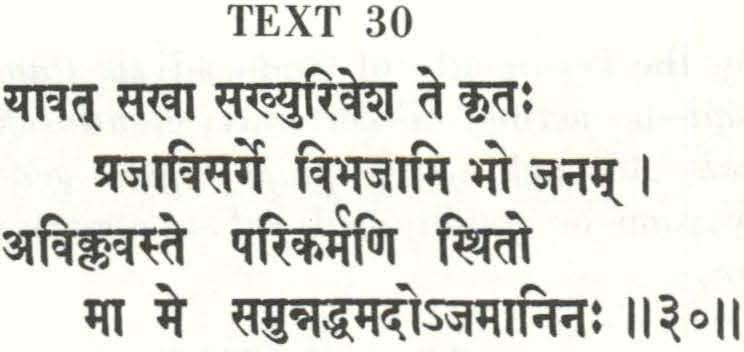

500 Srimad Bhagavatam [Canto 2, Ch. 9
0 my Lord, the unborn, You have shaken hands with me just like tt friend does with a friend [as if equal in position]. I shall be engaged in the crealion of different types of living entities, and I shall be occupied in Your service. I shall have no perturbation, but I pray that all this may not give rise to pride, as if I were the Supreme.
PURPORT
Lord Brahma is definitely situated in the humor of friendship with Lhe Lord. Every living being is eternally related with the Personalily of Godhl�ad in one of five different transcendental humors, namely siinta, diisya, sakhya, viitsalya and miidhurya. We have already discussed these five kinds of humors in relationship with the Personality of Godhead. It is clearly cxhibilcdhereinthat Lord Brahma is related to the Personality of Godhead in Lhc� lranscendental humor of friendship. A pure devotee may be related wilh lhe Lord in any one of the transcendental humors, even in the humor of parenthood, but the devotee of the Lord is always a transcendental servitor. No one is equal to or greater than the Lord. That is the version of the Bhagavad-gitii. Brahmaji, although eternally related with the Lord in the transcendental humor of friendship, and although entrusted with the most exalted post of creating different grades of living entities, still is conscious of his position, that he is neither the Supreme Lord nor is supremely powerful. Itis possible that some personality, within or without the universe, even though extremely powerful, sometimes shows more power than the Lord Himself. Stillthe pure devotee knows that this power is a vibhuti delegated by the Lord, and such a delegated powerful living entity is never independent. Sri Hanumanjicrossed theIndianOcean byjumping over the sea, and Lord Sri Ramacandra engaged Himself in marching over the bridge, but this does not meanthat Hanumanji was more powerful than the Lord. Sometimes the Lord gives extraordinary powers to His devotee, but the devotee knows always that the power belongs to the Personality of Godhead and that the devotee is only an instrument. The pure devotee is never puffed up like the nondevotee class of men who falsely think that they are God. It is astonishing to see how a person who is being kicked by the laws of the Lord's illusory energy in every step can falsely think of becoming one with the Lord. Such thinking is the last snare of the illusory energy offered to the conditioned soul. The first

Text 30] Answers by Citing the Lord's Version 501
TRANSLATION
illusion is that he wants to become Lord of the material world by accumulating wealth and power, but when he is frustrated in that attempt he wants to be one with the Lord. So both becoming the most powerful man in the material world or desiring to become one with the Lord are different illusory snares. And because the pure devotees of the Lord are surrendered souls, they are above the illusory snares of miiyii. Because he is a pure devotee, Lord Brahma, even though the first dominating deity in the material world, and therefore able to do many wonderful things, would never, like the nondevotee with a poor fund of knowledge, have the audacity to think of becoming one with the Lord. People with a poor fund of knowledge should take lessons from Brahma when they are puffed up with the false notion of becoming God.
Factually Lord Brahma does not create the living entities. In the beginning of the creation he is empowered to give different bodily shapes to the living entities according to their work during the last millennium. Brahmaji's duty is just to wake the living entities from their slumber and to engage them in their proper duty. The different grades of living entities are not created by Brahmaji by his capricious whims, but he is entrusted with the task of giving the living entities different grades of body so that they can work accordingly. And still he is conscious that he is only instrumental, so that he may not think of himself as the Supreme Powerful Lord.

Devotees of the Lord are engaged in the specific duty offered by the LorJ, and such duties arc successfully carried out without hindrance because they are ordained by the Lord. The credit of success does not go to the doer but to the Lord. But persons with a poor fund of knowledge Lake the credit of success into their own accounts and give nothing to the credit of the Lord. That is the symptom of the nondevotee class of men.

502 Snmad Bhagavatam [Canto 2, Ch. 9
TEXT 31 sri bhagaviin uviica jiiiinam parama-guhyarh me yad vijiiiina-samanvitam
sri bhagavan uvaca-thePersonalityofGodheadsaid; jiianam-knowledge acquired; parama-extremely; guhyam-confidential; me-of Mine; yatwhichis; vijiiana-realization; samanvitam-coordinated;sa-rahasyam-with devotional service;tat-of that; angam ca- necessary paraphernalia;grhar-a -just try to take up;gaditam-explained; maya-by Me.
TRANSLATION
The Personality of Godhead said: Knowledge about Me as described in the scriptures is very confidential, and it has to be realized in conjunction with devotional service. The necessary paraphernalia for that process is being explained by Me. You may take it up carefully.
PURPORT
. Lord Brahma is the topmost devotee of the Lord within the universe, and therefore the Personality of Godhead replied to his four principal inquiries in four important statements, which are known as the original Bhagavatam in four verses. These were Brahma's questions: l. What are the forms of the Lord both in matler and transcendence?

2. How are the different energies of Lhe Lord working?
3. How does the Lord play with His different energies?
4. How may Brahma be instructed to discharge the duty entrusted with Him? The prelude to the answers is this verse under discussion, wherein the Lord informs Brahma that knowledge of Him, the Supreme Absolute Truth, as it is stated in the revealed scriptures, is very subtle and cannot be understood unless one is self-realized by the grace of the Lord. The Lord says that Brahma may take the answers as He explains them. This means that transcendental knowledge of lhe absolute Supreme Being can be known if it is made known by the Lord Himself. By Lhe mental speculation of the greatest mundane thinkers, the Absolute Truth cannot be understood. The mental speculators can reach up to the standard <?f impersonal Brahman realization, but factually, complete knowledge of transcendence is beyond the knowledge of impersonal Brahman. Thus it is called the supreme confidenlial wisdom. Out of many liberaled souls, someone may be qualified to know the Personality of Godhead. In the Bhagavad-gita il is also said by the Lord Himself thal out
Text 31) Answers by Citing the Lord's Version sa-rahasyarh tad-angarh ca grhiir-a gaditarh maya 503
of many hundredsof thousandsof people, one may try for perfection in the hu111an !if!', and out of many liberated souls one may know Him as He is. Thcrrfore, the knowledge of the P!�rsonality of Godhead may be attained bv devotional ::;en icc only. Rahasyam means devotional service. Lord J(r��Ja instructed Arjuna in. the Bha�avad-gi.tii because I!e found Arjuna to be a dev(>tec and friend. Wilhoul such qualifications, no one can enter into l he 111 yslery of Lhc Bhagavad-gLLii. Therefore, one cannot understand the P!'rsonalily of Godhead unless one becomes a devotee and discharges devotional service. This mystery is love of Godhead. Therein lies the main qualification for knowing the mystery of the Personality of Godhead. And to attain the stage of transcendental love of Godhead regulative principles of devotional service must be followed. The regulative principles are called uidhi-bhakti, or devotional service of the Lord, and they can be practiced by a neophyte with his present senses. Such regulative principles are mainly ba ed on hearing and chanting of the glories of the Lord. And such hearing and chanting of the glories of the Lord can be made possible in the a so· ciation of devotees only. Lord Caitanya therefore recommended five main principles for attaining perfection in the devotional service of the Lord. The first is association ofdevotees (hearing); second is chanting the glories of the Lord; third, hearing Srimad-Bhiigavatam from the pure devotee; fourth, residing in a holy place connected with the Lord; and fifth, worshiping the Deity of the Lord \vith devotion. uch rules and regulations are parts of devotional service. So, as requested by Lord Brahmii, the Personality of Godhead will explain all about the four questions put forward by Brahmii, and others also which are parts and parcels of the same questions.
ttNI'1(
�
TEXT 32


yiiviin aham yathii-bhiivo yad-riipa-gu!la-karmaka[l tathaiva tattva-vijii.iinam astu te mad-anugrahiit
yiiviin-as I am in eternalform; aham-Myself; yathii-as much as; bhiiva[l -transcendental existence; yat-those; riipa-various forms and colors;
504 Srimad Bhiigavatam [Canto 2, Ch. 9
� tf(q!JOiif;-it;: I
�W�1'1'4� ij 'id\���ld_ ������
gura-qualities; karmaka�-activities; tathii-so and so; eva-certainly; tattva-vijiiiinam- factual realization;astu-Iet it be unto you;te-unto you: mat- Mine; anugrahiit- by causeless mercy.
TRANSLATION

All of Me, namely My actual eternal form, My transcendental existence, color, qualities and activities-let all be awakened within you by factual realization, out of My causeless mercy.
PURPORT

The ecret of uccc s in understanding the intricacie of knowledge of the Absolute Truth, the Personality of Godhead, is the cau eless mercy of the Lord. Even in the material world, the father of many son di close the secret of his po ition to the pet sons. The father discloses the confidence unto the son whom he thinks worthy. An important man in the ocial ordercan be knownby his mercy only. Similarly, one must be very clear to the Lord in order to know the Lord. The Lord is unlimited: no one can know Him completely, but one's advancement in the transcendental loving service of the Lord can make one eligible to knowthe Lord. Here we can see that the Lord is sufficiently pleased with Brahmiijl, and therefore He offers His causeless mercy to him so that Brahmiiji may have the factual realization of the Lord by His mercy only.
In the Vedas also it is said that a person cannot know the bsolute Truth Personality of Godhead simply by dint of mundane education or intellectual gymna tic . One can know the Supreme Truth if one has unflinching faith in the bona fide spiritual master as well a in the Lord. Such a faithful per on, even though illiterate in the mundane ense, can know the Lord automatically by the mercy of the Lord. In the Bhagavadgitii al o, it is said thatthe Lord reserves the right of not being exposed to everyone, and He keeps Himself concealed from the faithless by His yoga-miiyii potency.
To the faithful the Lord reveals Hi11Jself in His form, quality and pastimes. The Lord is not formless, as it is wrongly conceived by the impersonalist, but Hi form is not like one that we have experienced. The Lord di closes Hi form, even to the extent of mea urement, to His pure devotees, and that is the meaning of yiiviin, as is explained by Srila ]'iva Gosvami, the greatest scholar of Snmad-Bhagavatam.
Text 32] Answers by Citing the Lord's Version 505
TheLorddiscloses His transcendentalnatureofexistence. The mundane wranglers make mundane conceptions of the form of the Lord. It is said in the revealed scriptures that the Lord has no mundane form; therefore persons with a poor fund of knowledge conclude that He must be formless. They cannot distinguish between the mundane form and the spiritual form. According to them, without a mundaneformonemust be formless. This conclusion is also mundane because formlessness is the opposite conception of form. Negation of the mundane conception does not establish a transcendental fact. In the Brahma-sarhhitii it is said that the Lord has a transcendental formandthat Hecan utilizeany one of His sensesfor anypurpose. Forexample, Hecan eat with His eyes,and Hecan see with His leg. In themundaneconceptionof form, noonecaneat with one'seyesnor see withhis leg. Thatis thedifferencebetween themundane body and the spiritual body of sac-cid-iinanda. Spiritual body does not meanformless,butadifferenttypeof bodywhichwecannotconceivewith ourpresent mundanesenses. Formless therefore means devoidofmundane form, or possessing a spiritual body of whichthenondevoteecanhaveno conception bythespeculative method.
The Lord discloses to the devotee His unlimited varieties of transcendental bodies,all identicalwith oneanother with different kinds of bodily features. Some of the transcendental bodies of the Lordareblackish, and some of them are whitish. Some of them are reddish, and some of them are yellowish. Some of them are four-handed, and some of them are two-handed. Some of them are like the fish, and some of them are like the lion. All these different transcendental bodies of the Lord, without any differential category, are disclosedto the devotees ofthe Lord bythe mercy of the Lord, and thus the impersonalists' false arguments claiming the formlessness of the Supreme Truth do not appeal toa devoteeof the Lord, even thoughsuch adevoteemaynot beveryadvancedindevotional service.
The Lord has unlimitednumbers of transcendental qualities, andoneof them is His affection for His unalloyed devotee. In the history of the mundane world we can appreciate His transcendental qualities. The Lord incarnates Himself for theprotectionof Hisdevoteesandfor theannihilation of the faithless. His activities are in relationship with His devotees, and the Srimad-Bhiigavatam is full of such activities of the Lord in relationship with His devotees,andthe nondevotees haveno knowledge of suchpastimes.TheLord liftedtheGovardhanaHillwhenHewasonlyseven years old and protected His pure devotees at Vrndavana from the wrath of lndra, whowas overfloodingtheplacewithrain. Nowthis liftingofthe

506 Srimad Bhagavatam [Canto 2, Ch. 9
Govardhana Hill by a seven-year-old boy may be unbelievable for the faithless, but for the devotees it is absolutely believable. The devotee believes in the almighty potency of the Lord, while the faithless say that the Lord is almighty but do not believe it. Such men with a poor fund of knowledge do not know that the Lord is the Lord eternally, and that one cannot become the Lord bymeditation for millions of years nor by mental speculation for billions of years.
The impersonal interpretation of the mundane wranglers is completely refuted in this verse because it is clearly stated here that the Supreme Lord has His qualities, form, pastimes, and everything that a person has. All these descriptions of the transcendental nature of the Personality of Godhead are factual realization by the devotee of the Lord, and by the causeless mercy of the Lord they become revealed to His pure devotee, and to no one else.


aham eviisam evcigre
niin yad yat sad-asat param pa.Sciidaham yad etac ca yo'va.Si§yeta so'smy aham
aham-I, the Personalityof Godhead; eva-certainly; iisam-existed;evaonly; agre-before the creation; na-never; a n yat-anything else; yat-all those; sat-the effect; asat-the cause; param-the supreme; pasciit-at the end; aham-1, the Personality of Godhead; yat-all these; etat-creation; ca-also; yaft-everything; ava.S i§ yeta- remains; saft-that;asmi-1 am; aham -I, the Personality of Godhead.
TRANSLATION
Brahma, it is I, the Personality of Godhead, who was existing before the creation when there was nothing but Myself. Nor was there the material nature, the cause of this creation. That which you see now is also I, the Personality of Godhead, and after annihilation what remains will also be I, the Personality of Godhead.
Text 33) Answers by Citing the Lord's Version 507
We should note very carefully that the Personality of Godhead is addressing Lord Brahma and specifying with great emphasis Himself, pointing out that it is He, the Personality of Godhead, who existed before the creation, it is He only who maintains the creation, and it is He only who remains after the annihilation of the creation. Brahma is also a creation of the Supreme Lord. The impersonalist puts forth the theory of oneness in the sense that Brahma, also being the same principle of "I" because he is an emanation from the I, the Absolute Truth, is identical with the Lord, the principle of I, and thus there is nothing more than the principle of I, as explained in this verse. Accepting the argument of the impersonali t, it is to be admitted that the Lord i the creator I, and the Brahma is the created I. Therefore there is a difference between the two "I's," namely the predominator I and the predominated I. Therefore there are still two I's, even accepting the argument of the impersonalist. But we must note carefully that these hvo I's are accepted in the Vedic literature (Kathopan4ad) in the sense of quality. The Kathopan4ad says,
The creator "I" andthe created"I" are both acceptedin the Vedas as qualitatively one because both of them are nityas and cetanas. But the singular "I" is the creator "I," and the created "I's" are of plural number because there are many "I's" like Brahma and those generated by Brahma. It is the simple truth. The father creates or begets a son, and the son also creates many other sons, and all of them may be one as human beings, but at the same time from the father, the son and the grandsons are all different. The son cannot take the place of the father, nor can the grandsons. Simultaneously the father, the son and the grandson are one and different also. As human beings they are one, but as relativities they are different. Therefore the relativities of the creator and the created or the predominator and the predominated have been differentiated in the Vedas by saying that the predominator "I"isthefeeder ofthepredominated "I's," andthus there is a vast difference between the two principles of "I."
In another feature of this verse, no one can deny the personalities of both the Lord and Brahma. Therefore in the ultimate issue both the predominator and predominated are persons. This conclusion refutes the conclusion of the impersonalist that in the ultimate issue everything is impersonal. This impersonal feature stressed by the less intelligent imper-

508 Srimad Bhagavatam [Canto 2, Ch. 9
PURPORT
nityo nityiiniim cetanas cetaniiniim eko bahuniim yo vidadhiiti kiimiin
(Katha 2.2.13)
sonalist school is refuted by pointing out that the predominator "I" is the Absolute Truth, and He is a person. The predominated "I," Brahma, is also a person, buthe is notthe Absolute. For realization of one's selfin spiritual psychology it may be convenient to assume oneself as the same principle as the Absolute Truth, but there is always the difference of the predominated and the predominator, as is clearly pointed out here in this verse, which is gro sly misused by the impersonalists. Brahma is factually seeing eye to eye his predominator Lord who, in His transcendental eternal form, exists even after the annihilation of the material creation. The form of the Lord, as seen by Brahma, existed before the creation of Brahma, and the material manifestation with all ingredients and agents of material creation are also energetic expansions of the Lord, and after closing the exhibited energy of the Lord, what remains is the same Personality of Godhead. Therefore the form of the Lord exists in all circumstances of the creation, maintenance and annihilation. The Vedic hymns confirm this fact in the statement, "viisudevo vii idam agra iisin na brahmii na ca sahkaraft eko vai niiriiya[J.a iis�n na brahmii na isiino, etc." Before the creation there wasnone except Vasudeva. There was neither Brahma nor Sankara. Only arayaQa was there and no one else,neither Brahma nor !sana. Snpada Sankaracarya also confirms in his comments on the Bhagavad-gitii that arayaQa, or the Personality of Godhead, is transcendental to all creation, but the whole creation is the product of avyakta. Therefore the difference between the created and the creator is always there, although both the creator and created are of the same quality.


The other feature ofthe statement isthat the supremetruth is Bhagavan, or the Personality of Godhead. The Personality of Godhead and His kingdom have already been explained. The kingdom of Godhead is not void as conceived by the impersonalists. The VaikuQtha planets are full of transcendental variegatedness,including the four-handed residents of those planets, and with great opulence of wealth and prosperity, and there are even airplanes and other amenities required for high-grade personalities. Therefore the Personality of Godhead exists before the creation, and He exists with all transcendental variegatedness in the Vaikul).thalokas. The Vaikul).thalokas,also accepted inthe Bhagavad-gitii asbeing ofthe saniitana nature, are not annihilated even after the annihilation of the manifested cosmos. Those transcendental planets are of a different nature altogether, and that nature is not subjected to the rules and regulations of material creation, maintenance or annihilation. The existence of the Personality of Godhead implies the existence of the VaikuQthalokas,as the existence of a king implies the existence of a kingdom.
In various places of Srimad-Bhiigavatam and in other revealed scriptures
Text 33] Answers by Citing the Lord's Version 509
the existence of the Personality of Godhead is mentioned. For example, Maharaja Parik�it asks, "Sa cii.pi yatra puru�o viSva-sthity-udbhavii.pyaya[l muktvii.tma-mii._yii.rh mii.yesa� sete sarva-guhtisaya[1?" How does the Personality of Godhead, the cause of creation, maintenance and annihilation, who is always freed from the influence of the illusory energy and is the controller of the same, lie in everyone's heart? Similar also is a question of Vidura's: "Tattvii.nii.rh bhagavarhs te§ii.rh katidhii. pratisahkrama� tatremarh ka upii.siran kausvid anuserata." Sridhara Svami explains this in his notes:, "During the annihilation of the creation, who serves the Lord lying on the Se�a, etc." This means that the transcendental Lord with all His name, fame, quality and paraphernalia exists eternally. The same confirmation is also in the Kii.si-Khapt}a -in connection with Dhruva-carita. It is said there, "Na cyavante'pi yad-bhaktii mahatyiirh pralayiipadi ato 'cyutokhile loke sa eka� sarvago 'vyaya�." Even the devotees of the Personality of Godhead are notannihilated during the period of the entire annihilation of the material world, not to speak of the Lord Himself. The Lord is everexistent in all three stages of material change.
The impersonalist adduces no activity in the Supreme, but in this discussion between Brahma and the Supreme Personality of Godhead the Lord is said to have activities also, as He has His form and quality. The activities of Brahma and other demigods during the time and maintenance of the creation are to be understood as the activities of the Lord. The king, or the head executive of a state, may not be seen in the government offices, for he may be engaged in royal comforts. Yet it should be understood that everything is being done under his direction, and everything is at his command. The Personality of Godhead is never formless. He may not be visible in His personal form in the material world to the less intelligent class of men, and therefore He may be sometimes called formless. But actually He is always in His eternal form in His Vaikup.tha planets as well as in other planets of the universes as different incarnations. The example of the sun is very appropriate in this connection. The sun in the night may not be visible to the eyes of men in the darkness, but the sun is visible wherever it has risen. Because the sun is not visible to the eyes of the inhabitants of a particular part of the earth does not mean that the sun has no form.
In the Aitarey{l Upani�ad there is the hymn "ii.tmaivedam agra ii.sit puru�a-vidha[l." This mantra indicates the Supreme Personality of Godhead (Kr�!la) even before the appearance of the puru�a incarnation. In the Bhagavad-gitii it is said (Bg. 15.18) that Lord Kr�!la isPuru§ottama because He is the Supreme Puru�a, transcendental even to the puru�a ak�ara and the

510 Srimad Bhagavatam [Canto 2, Ch. 9
puru§ak§ara. The ak§arapuru§a, orthe Maha-Vi��u,throws His glance over prakrti, or material nature, but the existence of the Puru�ottama was there even before that. The Aitareya Upani§ad therefore confirms the statement of the Bhagavad-gitii that Lord Kr��a is the Supreme Person (Puru§ottama).
In some of the Vedas it is also said that in the beginning only the impersonal Brahman was there. But according to this verse, the impersonal Brahman, which is the glowing effulgence of the body of the Supreme Lord,may be called the immediate cause, but the cause of allcauses orthe remote cause is the Supreme Personality of Godhead. The Lord's impersonal feature is existent in the material world because by material senses or material eyes theLord cannot be seen or perceived. One has to spiritualize the senses before one can expect to see or perceive the Supreme Lord. But He is always engaged in His personal capacity, and He is eternally visible to the inhabitants of Vaiku�thaloka, eye to eye. Therefore He is materially impersonal, just as the executive head of the state may be impersonal in the government offices, although he is not impersonal in the government house. Similarly, the Lord is not impersonal in His abode, which is always nirasta-kuhakam, as is stated in the very beginning of the Bhiigavatam. Therefore both the impersonal and personal features of the Lord are acceptable, as mentioned in the revealed scriptures. This Personality of Godhead is very emphatically explained in the Bhagavad-gitfi in connection with the verse, "brahmarohiprati§thiiham, (Bg. 14.27). Therefore in all ways the confidential part of spiritual knowledge is realization ofthePersonality ofGodhead,and notHis impersonal Brahman feature. One should therefore have his ultimate aim of realization not in the impersonal feature but in the personal feature of the Absolute Truth. The example of sky within the pot and the sky without the pot may be helpful to the studentfor his realization of the all-pervading quality of the cosmic consciousness of the Absolute Truth. But that does not mean that the individual part and parcel of the Lord becomes the Supreme by a false claim. It means only that the conditioned soul is a victim of the illusory energy in her last snare. To claim to become one with the cosmic consciousness of the Lord is the last trap set by the illusory energy or daivi miiyii. Even in the impersonal existence of the Lord, as it is in the material creation, one should be after the personal realization of the Lord, and that is the meaning of "pasciidaharityadetaccayo'vasi§yetaso'smyaham.''
Brahmaji also accepted the same truth when he was instructing Narada. He said, "So 'yam te 'bhihitas tiita bhagaviin visva-bhii_yana!t., (Bhiig. 2.7.50). There is no other cause of all causes than tlu�

Text 33] Answers by Citing the Lord's Version 511
upreme Per onality of Godhead, Hari, and therefore this ver e aham eva never indicate anything other than the Supreme Lord, and one should therefore follow the path of Brahma-sampradiiya, or the path of Brahmaji to Na.rada, to Vyasadeva, etc., and make it a point in life to realize the Supreme Personality of Godhead, Hari, or Lord Kr�J.la. This very confiden· tial instruction to the pure devotees of the Lord was also given to A1juna and to Brahma in the beginning of the creation. The demigods like Brahma, Vi�J.lu, Mahesvara, Indra, Candra, Varu1.1a are undoubtedly different forms of the Lord for execution of different functions; the different elemental ingredients of material creation, as well as the multifarious energies, also may be of the same Personality of Godhead, but the root of all of them is the Supreme Personality of Godhead, Sri Kr�J.la, and one should be attached to the root of everything rather than bewildered by the branches and leaves. That in the instruction given in this verse.
TEXT 34
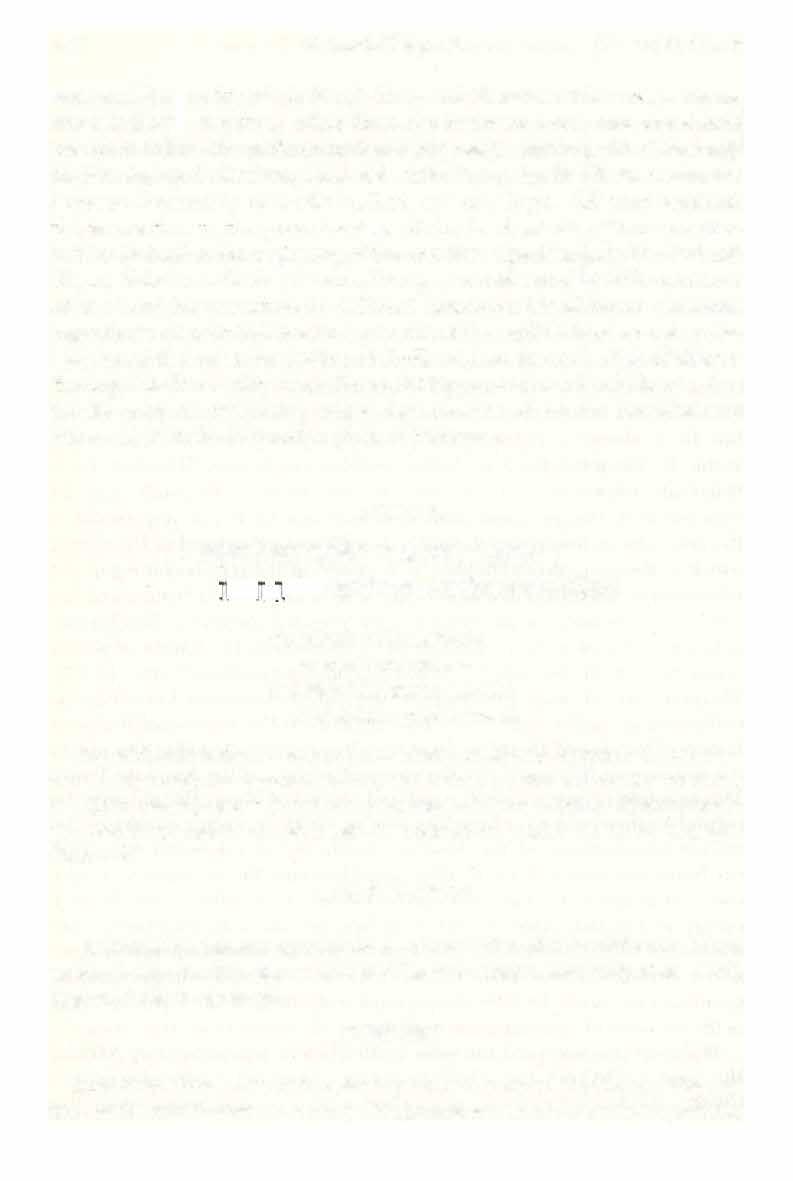
rte'rtharh yat pratiyeta na pratiyeta ciitmani tad vidyiid iitmano miiyiirh yathiibhiisc yathii tamafl.
rte-wit ho ut; artham-value; yat-which; pratiyeta-appears to be; nadoes not; pratiyeta-appears to be; ca-certainly; iitmani-in My relation; tat-tha t ; vidyiit-must you know; iitmana[l-Mine; miiyiim-illusory energy; yathii-as much as; iibhiisafl.-in reflection; yathii-as it is; tamafl.darkness.





TRANSLATION
0 Brahma, whatever appears to be of any value, if it is without relation to Me, has no reality. Know it as My illusory energy, that reflection which appears to be in darkness.
PURPORT
In the previous verse it has already been concluded that in any stage of the cosmic manifestation-namely its appearance, its sustenance, its growth,
512 Srimad Bhagavatam [Canto 2, Ch. 9
�� � 31�mt ;J W�mt �� I
mlfTtfq'TS�tr?.fT�: II��II
its interactions of different energies, its deterioration and its disappearance-all has its basic relation with the existence of the Personality of Godhead. And as such, whenever there is forgetfulness of this prime relation with the Lord, and things are accepted as real without being related with the Lord, that conception is called the product of the illusory energy of the Lord. Because nothing can exist without the Lord, it should he known that the illusory energy is also an energy of the Lord. The right conclusion of dovetailing everything in relationship with the Lord is called yoga-miiyii, or the energy of union, and the wrong conception of detaching a thing from its relationship with the Lord is called daivi miiyii, or mahii-miiyii, of the Lord. Both the miiyiis also have connection with the Lord because nothing can exist without being related with llim. As such, the wrong conception of detaching relationships from the Lord is not false but illusory.
Misconceiving one thing for another thing is called illusion. The example of accepting the rope as a nake is illusion, hul it is not false. The rope, as it exists in the front of the illusioned person, is nol at all false, but the acceptance is illusory. Therefore the wrong conception of accepting this material manifestation as being divorced from the energy of the Lord is illusion, but it is not false. And this illusory conception is called the reflection of the reality in the darkness of ignorance. Anything that appears as apparently not being "produced out of My energy" is called miiyii. The conception that the living entity is formless or that the Supreme Lord is formless is also illusion. 1n the Bhagavad-gitii (Bg. 2.12) it is said by the Lord in the midst of the battlefield that the warriors who were standing in front of Arjuna, Arjuna himself, and even the Lord were all existing before, they were existing on the battlefield of Kuruk�etra, and they would all continue to he individual personalities in the future also, even after the annihilation of the present body and even after being liberated from the bondage of material existence. In all circumstances, the Lord and the living entities are individual personalities, and the personal features of both the Lord and living beings are never abolished; only the influence of the illusory energy, the reflection of light in the darkness, can, by the mercy of the Lord, be removed. In the material world, the light of the sun is also not independent, nor is that of the moon. The real source of light is the brahmajyoti, which diffuses light from the transcendental body of the Lord, and the same light is reflected in varieties of light: .the light of the sun, the light of the moon, the light of the fire,·or the light of electricity. So the identity of self as being unconnected with the Supreme Self,the Lord, is also illusion, and the false claim that "I am the Supreme"

Text 34] Answers by Citing the Lord's Version 513
is also the last illusory snare of the same miiyii, or the external energy of the Lord.
The Vediinta-sutra in the very beginning affirms that everything is born from the Supreme, and thus, as explained in the previous verse, all individual living entities are born from the energy of the supreme living being, the Personality of Godhead, as Brahma himself was born from the energy of the Lord, and all other living entities are born from the energy of the Lord through the agency of Brahma, and none of them has any existence without being dovetailed with the Supreme Lord.

Theindependenceofthe individualliving entityis notrealindependence, but is just the reflection of the real independence existing in the Supreme Being, the Lord. The false claim of supreme independence by the conditioned souls is illusion, and thisconclusion isadmitted in this verse.
Persons witha poor fund ofknowledge become illusioned,and therefore the so-called seientists, physiologists, empiric philosophers, etc., become dazzled by the glaring reflection of the sun, moon, electricity, etc., and deny the existence of the Supreme Lord, putting forward theories and different speculations about creation, maintenance and annihilation of everything material. The medical practitioner may deny the existence of the soul in the physiological bodily construction of an individual person, but he cannot give life to the dead body, even though all the mechanisms of the body exist even after death. The psychologist makes a serious study of the physiological conditions of the brain, as if the construction of the cerebral lump is the machine of the functioning mind, but in the dead body the psychologist cannot bring back the function of the mind. These scientific studies of the cosmic manifestation or that of the bodily construction independent of the Supreme Lord are different reflective intellectual gymnastics only,but atthe endthey areallillusion andnothing more. All such advancement of scienceandknowledge in the present context of material civilization is the action of the covering influence of the illusory energy. The illusory energy has two phases of existence, namely the covering influence and the throwing influence. By the throwing influence the living entities are thrown into the darkness of ignorance, and by the covering influence she covers the eyes of men with a poor fund of knowledge about the existence of the Supreme Person who enlightened Lhe supreme individual living being, Brahma. The identity of Brahma with the Supreme Lord is never claimed herein, and therefore such a foolish claim by the man with a poor fund of knowledge is another display of Lhe illul:iory energy of the Lord. The Lord says in the Bhagavad-gitii (Bg. 16.18-20) that demoniac persons who deny the existenceof the Lord
514 Srimad Bhagavatam [Canto 2, Ch. 9
are thrown more and more into the darkness of ignorance, and thus such demoniac persons transmigrate life after life without any knowledge of the Supreme Personality of Godhead.
The sane man, however, is enlightened in the disciplic succession from 13rahmaji, who was personally instructed by the Lord, or in the disciplic succession from Arjuna, who was personallyinstructed by the Lord in the Bhagavad-gitii. He accepts the statement of the Lord, aham saroasya prabhavo matta� saroam pravartatel iti matvii bhajante miim budhii bhiivasamanvitiift" (Bg.l 0.8). The Lord is the original source of all emanations, and everything that is created, maintained and annihilated exists by the energy of the Lord. The sane man who knows this is actually learned, and therefore he becomes a pure devotee of the Lord, engaged in the transcendental loving service of the Lord.
Although the reflectory energy of the Lord displays various illusions to the eyes of persons with a poor fund of knowledge, the sane person knows clearly that the Lord can act, even from far, far beyond our vision, by His different energies, just as the fire can diffuse heat and light from a distant place. In the medical science of the ancient sages, known as the .if.yur-veda, there is definite acceptance of the Lord's supremacy in the following words: "jagad-yonir anicchasya cid-iinandaika-riipirw� pumso 'sti prakrtir nityii praticchiiyeva bhiisvata� acetaniipi caitanya-yogena paramiitmana� akarod viSvam akhilam anityam niitakii-krtim." There is one Supreme Person who is the progenitor of this cosmic manifestation, whose energy acts as prakrti, or the material nature, dazzling like the reflection.By such illusory action of the prakrti, even the dead matter is caused to move by the cooperation of living energy of the Lord, and the material world appears like a dramatic performance to the ignorant eyes. The ignorant person, therefore, may even be a scientist or physiologist in the drama of prakrti, while the sane person knows the prakrti as the illusory energy of the Lord. By such a conclusion, and as is confirmed by the Bhagavad-gitii, it is clear that the living entities are also a display of the superior energy (parii prakrt*) of the Lord, just as the material world is a display of the inferior energy (aparii prakrtiM of the Lord. The superior energy of the Lord cannot be as good as the Lord, although there is very little difference between the energy and the possessor of the energy, or the fire and the heat. Fire is possessed of heat, but heat is not fire. This simple thing is not understood by the man with a poor fund of knowledge who falsely claims that the fire and heat are the same. This energy of the fire (namely heat) is explained here as a reflection, and not directly fire. Therefore the living energy represented by the living entities is the reflection of the Lord, and

Text 34) Answers by Citing the Lord's Version 515
never the Lord Himself. And as the reflection of Lhe Lord, the existence of the living cntily is dependent on the Supreme Lord, who is the original lighl. This material energy may be compared with darkness, as actually it is darkness, and Lhe activities of the living entities in the darkness are re· flections of the original lighl. The Lord should be understood by the context of this verse. Nondcpcndence of both the energies of the Lord is explained as miiyii, or illusion. No one can make a solution of the darkness of ignorance simply by the reflection of light. Similarly, no one can come out of the material existence simply by Lhc reflected light of the common man, but one has to receive the light from the original light itself. The reflection of sunlight in the darkness is unable to drive out the darkness, but the sunlight which is outside the reflection can drive out the darkness completely. In darkness no one can see the things in a room. Therefore a person in the dark is afraid of snakes and scorpions, although there may not be such things. But in the light the things in the room can be clearly seen, and the fear of snakes and scorpions is at once removed. Therefore one has to take shelter of the light of the Lord, as in the Bhagavad-gitii or the $nmad-Bhiigavatam, and not the reflective personalities who have no touch with the Lord. No one should hear Bhagavad-gitii or $nmadBhiigavatam from a person who is a nonbeliever in the existence of the Lord. Such a person is already doomed, and any association with such a doomed person makes the associater also doomed.
According to the Padma Purii[la, within the material compass there are innumerable material universes, and all of them are full of darkness. Any living being, beginning from Brahmas (there are innumerable Brahmas also in innumerable universes) to the insignificant ant, are all born in darkness, and they require factual light from the Lord to see Him directly, just as the sun can be seen only by the direct light of the sun. No lamp or manmade torchlight, however powerful it may be, can help one to see the sun. The sun reveals itself. Therefore the action of different energies of the Lord or the Personality of Godhead Himself can be realized by the light manifestedby the causeless mercy of the Lord. The impersonalists say that God cannot be seen. God can be seen by the light of God and not by manmade speculations. Here it is specifically mentioned as vidyiit, which is an order by the Lord to Brahma. This direct order of the Lord is a manifestation of His internal energy, and this particular energy is the means of seeing the Lord eye to eye. Not only Brahma but anyone who may be graced by the Lord to see such merciful direct internal energy can also realize the Personality of Godhead without any mental speculation.

516 Srimad Bhagavatam [Canto 2, Ch. 9
TEXT 35





yathii mahiinti bhUtiini bhiite�ilcciivace�v anu pravi�tiiny aprav4tiini
tathii te�u na te�v aham
yatha-as it is: mahiinti-the universal: bhutiini- elemcnt : bhute�u uccaavace�u-in the minule and gigantic: anu-afler: pravi�tiini-enl ered : apravi�tiini-not entered: tathii-so much -o; te�u-in them: na-nol: te§uin them: aham-�Jy elf.
TRANSLATION
0 Brahma, please know that the universal elements enter into the cosmos and at the same time do not enter into the cosmos; similarly, I Myself also exist within everything created, and at the same time I am outside of everything.

PURPORT
The great elements of material creation, namely earth, water, fire, air and ether, etc., all enter into the body of all manifested entities, namely the seas, mountain , aquatics, plants, reptiles, birds, bea t , human beings, demigods and everyone materially manifested, and at the same time such elements are differently situated. In the developed stage of consciousness, the human being can tudy both physiological and physical cience. but the ba ic principles of such sciences are nothing but the material elements and nothing more. The body of the human being and the body of the mountain, a also the body of the demigods, including Brahma, are all of the same ingredients, namely earth, water, etc., and at the same time the elements are beyond the body. The elements were created fir t, and therefore they entered into the bodily construction later on, but in both circumstances they entered the cosmos as well as not entered. Similarly, the Supreme Lord, by His different energies, namely the internal and external, is within everything in the manifested cosmos, and at the arne time He is
Text 35] Answers by Citing the Lord's Version
517
outside of everything, situated in the kingdom of God (V aiku�thaloka) as described before. This is very nicely stated in the Brahma-sarhhitii as follows:
iinanda-cinmaya-rasa-pratibhiivitiibhis tiibhir ya eva nijariipatayii kaliibhi[l. goloka eva nivasaty akhilatma-bhii.to govindam iidi-puru§arh tam aha1h bhajiimi (Bs. 5.37)

"I worship the Personality of Godhead Govinda, who, by expansion of His internal potency of transcendental existence, knowledge and bliss, enjoys in His own and expanded forms. Simultaneously He enters into every atom of the creation."
This expansion of His plenary parts is also more definitely explained in the same Brahma-sarhhitii as follows:
eko 'py asau racayiturh jagad-ar4a-1wtirh yac-chaktir asti jagad-ar.!fa-cayii yad-anta[l
ar.!fiintarastha-paramiir.u-cayiintarastharh govindam iidi-puru�arh tam aharh bhajiimi (Bs. 5.35)
"I worship the Personality of Godhead Govinda, who, by one of His plenary portions, enters into the existence of every universe and every particle of the atoms and thus manifests His infinite energy all over the material creation unlimitedly."
The impersonalists can imagine or even perceive that the Supreme Brahman isthus all-pervading, and therefore they conclude that there is no possibility of His personal form. Herein lies the mystery of His transcendental knowledge. This mystery is the transcendental love of Godhead, and one who is surcharged with such transcendental love of Godhead can see the Personality of Godhead in every atom and every movable or immovable object without any difficulty. And at the same time he can see the Personality of Godhead in His abode of Goloka, enjoying eternal pastimes with His eternal associates, who are also expansions of His transcendental existence. This vision is the real mystery of spiritual knowledge, asis statedbythe Lordinthebeginning, "sa-rahasyarh tad-angarh ca_"
This mystery is the most confidential part of the knowledge of the Supreme, and it is impossible to be discovered by the mental speculators hy dint of intellectual gymnastics. The mystery can be revealed through Lhe proc;ess recommended by Brahmajiinhis Brahma-sarhhitii as follows:
518 Srimad Bhagavatam [Canto 2, Ch. 9
premiiiijana-cchurita-bhak ti-vilocanena santa� sadaiva hrdaye�u vilokayanti
yam syiimasundaram acintya-gur-a-svariiparh govindam iidi-puru�arh tam aharh bhajiimi.
(Bs. 5.38)

"I worship the original Personality of Godhead, Govinda, whom the pure devotees whose eyes are smeared with the ointment of love of Godhead always observe within their hearts. This Govinda, the original Personality of Godhead, is Syamasundara with all transcendental qualities."
Therefore, although He is present in every atom, the Supreme Per· sonality of Godhead may not be visible to the dry speculators; still the mystery is unfolded before the eyes of the pure devotees because their eyes are anointed with love of Godhead. And this love of Godhead can be attained only by the practice of transcendental loving service of the Lord, and nothing else. The vision of the devotees is not ordinary; it is purified by the process of devotional service. In other words, as the universal elements are both within and without, similarly the Lord's name, form, quality, pastimes, entourage, etc., as they are described in the revealed scriptures or as they are being performed in the Vaikul)thalokas, far, far beyond the material cosmic manifestation, are factually being televised in the heart of the devotee. The man with a poor fund of knowledge cannot understand, although by material science one can see things far away by means of television. Factually, the spiritually developed person is able to have the television of the kingdom of God always reflected within his heart. That is the mystery of knowledge of the Personality of Godhead.
The Lord can award anyone and everyone liberation (mukti) from the bondage of material existence, yet He rarely awards the priVIlege of love of Godhead, as is confirmed by Narada, "mukti dadhiiti karhicil sma na bhakti-yogam." This transcendental devotional service of the Lord is so wonderful that the occupation keeps the deserving devotee always rapt in psychological activities, \vithout any deviation from the absolute touch. Thus love of Godhead, developed in the heart of the devotee, is a great mystery. It was previously told by Brahmajl to Narada that the desires of Brahmaji are never unfulfilled because he is always absorbed in the transcendental loving service of the Lord; nor has he any desire in his heart save and except the transcendental service of the Lord. That is the beauty and mystery of the process of bhakti-yoga. As the Lord's desire is infallible, as He is acyuta, similarly the desires of the devotees in the transcendental service of the Lord are also acyuta, infallible.It is very diffic.ult, however, for the layman to understand without knowledge of the mystery
Text 35 J Answers by Citing the Lord's Version
519
of devotional service, as it is very difficult to know the potency of touchstone. As touchstone is rarely found, a pure devotee of the Lord is al o rarely to be seen, even amongst the millions of libera ted souls (katsv api mahiimune ). Out of aU kinds of perfections attained by the process of knowledge, yoga perfection in devotional service i the highest of all and the most mysterious also, even more mysterious than the eight kinds of mystic perfection attained by the process of yogic performances. In the Bha�avad-g'itii. the Lord therefore advised Arjuna about this bhakti-_yoga:
sarva-guhyatamam bhilya� Sff!U me paramarh vaca�
'·jwt hear from .\le again about the most confidential part of instructions in the Bhagavad-gitii.." (Bg. 18.64) The same wa· confirmed by Brahmaj1 to Narada in the following words: "idarh bhii.gavatam nama yan me bhagavatoditam/ sangraho 'yam vibhutinii.m tvam etad vipulilwm. Yathii harau bhagavati n[f!ii.m bhaktir bhavi§yati." Brahmaji aid to arada. "Whatever I have spoken to you about the Bhiigavatam was explained to me by the Supreme Personality of Godhead, and I am advising you to expa,nd these topics nicely so that people may easily under tand the mysterious bhakti-yoga bytranscendental loving serviceto the Lord." It is to be noted herethatthe mystery of bhakti-yoga was disclosed to Brahmaji by the Lord Himself, and the same was explained by Brahmaji to Narada, and Narada explained the same to Vyasa and from Vyasa to Sukadeva Gosvami, and that same knowledge is coming down, in the unalloyed chain of disciplic succession. If one is fortunate enough to have received the knowledge in the transcendental disciplic succession, surely he may have the chance of understandingthe mystery ofthe Lord and that ofthe Snmad-Bhiigavatam, the sound incarnation ofthe Lord.

TEXT 36


etiivad eva jijniisyarh
tattva'-jijniisunii.tmana�
anvaya-vyatirekii.bhyii.rh yat syii.t sarvatra sarvadii.
520 Srimad Bhagavatam [Canto 2, Ch. 9
'«11�(-:tM�l���M�IijW\IS�:I 31-=:fq04M�tii+llt���� II��II
etavat-up to this: eva-certainly; jijiiiisyam-is to be required; tattvaAbsolute Truth; jijiiiisuna-the student; atmana[t-of the Self; anvayadirectly; vyatirekiibhyiim-indirectly ; yat-whatever; syat-it may be; sarvatra-in all space and time; sarvada-in all circumstance .

TRANSLATION
A person who is searching after the Supreme Absolute Truth, the Personality of Godhead, has to search it out up to this, certainly in all circumstances, and in all space and time, and both directly and indirectly.
PURPORT
To unfold the mystery of bhakti-yoga, as it is explained in the previous verse. is the ultimate stage of all inquiries or the highest objective for the inquisitive. Everyone is searching after self-realization in different ways, namely by karma-yoga, by jiiana-_yoga, by dh_yana -yoga, by raja-yoga, or by bhakti-_yoga, etc. To Pngage in self-realization is the responsibility of every living entity developed in consciousness. One who is developed in consciou ness certainly makes enquiries intothe my tery of lhe self,of the cosmic situation and of the problems of life, in all spheres and fields, namely social, political, economic, cultural, religious, moral, etc., and in their differentbranches. Buthere is explained the goal of all uch inquiries. The Vediinta-sutra philosophy begins with this inquiry of life and the Bhagavatam answers such inquiries up to this point. or the mystery of all inquiries. Lord Brahma wantedto be perfectly educated by the Personality of Godhead, and here is the answer by the Lord finished in four nutshell verses, namely beginning from aham eva to this verse, etavad eva. This is the end of all self-realization processes. )len do notknowthat the ultimate goal of life is Vi�!lu or the Supreme Personality of Godhead due to being bewildered by the glaring reflection in the darkness, and as such everyone is entering into the darkest region of material existence, driven by the uncontrolled senses. The whole material existence has sprung up by sense gratification, desires based principally on the sex desire, and the result is that in spite of all advancement of knowledge,the final goal of allactivities of the living entities is sense gratification. But here is the real goal of life, and everyone should know it by inquiries put before a bona fide spiritual master expert in the science of bhakti-yoga, or from a living personality of Bhiigavatam life. Everyone is engaged in various kinds of scriptural in-
Text 36] Answers by Citing the Lord's Version 521
qumes, but the Srimad-Bhiigavatam gives answers to all of the various students of self-realization: this ultimate objective of life is not to be searched out without any great labor or perseverance. One who is imbued with such sincere inquiries must ask the bona fide spiritual master in the disciplic succession from Brahmaji, and that is the direction given here. Because the mystery was disclosed before Brahmaji by the Supreme Personality of Godhead, the mystery of all such inquiries regarding selfrealization must be put before such a spiritual master who is directly the representative of the Lord, acknowledged in that disciplic succession. Such a bona fide spiritual master is able to clear up the whole thing by evidences from the revealed scriptures, both directly and indirectly. Although everyone is free to consult the revealed scriptures in this connection, still one requires the guidance of a bona fide spiritual master, and that is the direction in this verse. The bona fide spiritual master is the most confidential representative of the Lord, and one must receive direction from the spiritual master in the same spirit as Brahmaji received them from the Personality of Godhead, Lord Kr��a. The bona fide spiritual master in that bona fide chain of disciplic succession never claims to be the Lord Himself, although such a spiritual master is greater than the Lord in the sense that he can deliver the Lord by his personally realized experience. The Lord is not to he found simplyby education or by a good fertile brain, but surely He can be found by the sincere student through the transparent medium of the bona fide spiritual master.
The revealed scriptures give direction directly to this end, but because the bewildered living entities are blinded by the glaring reflection in the darkness, they are unable to find out the truth of the revealed scriptures. For example, in the Bhagavad-gitii the whole direction is targetted toward the Personality of Godhead Lord Sri Kr��a, but for want of a bona fide spiritual master in the line of Brahmaji or the direct hearer, Arjuna, there are different distortions of the revealed knowledge by many unauthorized persons who just want to satisfy their own whims. Undoubtedly the Bhagavad-gitii is accepted as one of the most brilliant stars in the horizon of the spiritual sky,yet the interpretations of the great book of knowledge have so grossly been distorted that every student of the Bhagavad-gitii is still in the same darkness of glaring material reflection, and such students are hardly enlightened by the Bhagavad-gitii. In the Gitii practically the same instruction is imparted as in thefour prime verses ofthe Bhiigavatam, but due to wrong andfashionable interpretations by unauthorized persons, one cannot reach the ultimate conclusion. In the Bhagavad-gitii (Bg. 18.61) it is clearly said,

522 Srimad Bhagavatam [Canto 2, Ch. 9
iSvara� saroa-bhutiiniirh hrd-dese 'rjuna ti§thati bhriimayan saroa-bhiitiini yantriirii!fhiini miiyayii
The Lord is situated in the heart of all living beings (as Paramatma), and He is controlling all of them in the material world under the agency of His external energy. Therefore it is clearly mentioned that the Lord is the supreme controller and that the living entities are controlled by the Lord. In Lhe same Bhagavad-gitii (Bg. 18.65) the Lord directs as follows:
manmanii bhava mad-bhakto madyiiji miim namaskuru
miim evai§yasi satyam te pratijiine priyo 'si me

It is clear in this verse of the Bhagavad-gitii that the direction of the Lord is that one should be Godminded, a devotee of the Lord, a worshiper of the Lord, and must offer all obeisances unto Lord Kr�!J.a, and by so doing, the devotee will undoubtedly go back to Godhead, back to home.
Indirectly it is said that the whole Vedic social construction of human society is so made that everyone acts as the part andparcel of the complete body of the Lord. The intelligent class of men, or the briihma"[laS, are situated on the face of the Lord; the administrative class of men, or the k§atriyas, are situated on the arms of the Lord; the productive class of men, or the vaiSyas, are situated on the belt of the Lord; and the laborer class of men, or the sudras, are situated on the legs of the Lord. Therefore the complete social construction is the body of the Lord, and each and every part of the body, namely the briihma!las, the k§atriyas, the vaiSyas and the fiidras, is meant to serve the Lord's whole body conjointly; otherwise it becomes unfit to be coordinated withthe supreme consciousness of oneness. Universal consciousness is factually achieved by coordinated service of all concerned to the Supreme Personality of Godhead, and that alone can insure total perfection.
Therefore even the great scientists, the great philosophers, the great mental speculators, the great politicians, the great industrialists and the great social reformers, etc., cannot give any relief to the restless society of the material world because they do not know the secret of success as mentioned in this verse of the Bhiigavatam, namely that one must know the mystery of bhakti-yoga. In the Bhagavad-gitii also it is said,
Text 36] Answers by Citing the Lord's Version
523
na miirh du�krtino mii!fhii� prapadyante nariidhamii� miiyayii 'pahrta-jiiiinii iisurarh
bhiivam iisritii� (Bg.?.J5)
The so-caJled great leaders of human society, because they are ignoran l of this great knowledge of bhakti-yoga and are always engaged in the ignoble acts of sense gratification, bewildered by the extcrnaJ energy of the Lord, are stubborn rebels against the supremacy of the Supreme Personality of Godhead, and they never agree to surrender unto Him because they are fools, miscreants and the lowest type of human beings. Such faithless nonbelievers may be highly educated in the material sense of the term, but factually they are Lhe greatest fools of the world because by the influence of the external material nature all their so-called acquisition ofknowledge has beenmade null and void.Therefore all advancement ofknowledge in the present context of thingsis being misused in terms of the cats and dogs fighting with one another for sensegratification, and all acquisition of knowledge in science, philosophy, fine arts, nationality, economic development, religiousness and great activities are being spoiled by being used as dresses for dead men. There is no utility in the dresses used for covering a coffin of the dead body save getting a faJse applause from the ignorant public. The Srimad-Bhiigavatam therefore says again and again that without attainment of the status of bhakti-yoga, all activities of the human society are to be considered as absolute failures only. It is said:
pariibhavas tiivad abodha-jiito
yiivan na jijiiiisata iitma-tattvam
yiivat hriyiis tiivad idam mano vai karmiitmakam yena sarira-bandha[l (Bhag. 5:5.5)

As long as one is blind to inquiring after self-realization, all material activities, however great they may be, are all differentkinds of defeat because the aim of human life is not fulfilled by such unwanted and profitless activities. The function of the human bodyis to attain freedom from the material bondage, but as long as one is fully absorbed in material activities, his mind will be overwhelmed in the whirlpool of matter, and thus he will continueto be encaged in thematerialbodie life after life.
evarh manaft karma-vasarh prayuhkte avidyayiitmany upadhiyamiine
pritir na yiivan mayi viisudeve na mucyate deha-yogena tiivat (Bhiig. 5.5.6)
524 Srimad Bhagavatam [Canto 2, Ch. 9
It is one's mind that generates different kinds of bodies for suffering different kindsofmaterial pangs. Therefore as long as the mind is absorbed in fruitive activities, it is to be understood that the mind is absorbed in nP-s<"iencc, and thu one is sure to again and again be subjected to material bondage in different bodies until one develops a transcendental love of GodhP-ad, Vasudeva, the Supreme Person. To become absorbed in the transcendental name, quality, form and activities of the Supreme Person, Vasudeva, meanstochangethetemperof the mind from matter to absolute knowledge, which lead� one to the path of absolute realization and thus frees one from the bondage of material contact and encagements in different material bodies.

Sr11a [Iva Gosvami Prabhupada therefore comments on the words saroatra saroadii in the sense that the principles of bhakti-_yoga, or devotional service to the Lord, are apt in all circumstances, i.e., it is recommended in all the revealed scriptures, it is performed by all authorities, it is important in all places, it is u eful in all causes and effects, etc. As far as all the revealed scriptures are concerned, he quotes fromthe Skanda Puriirw on the topics of Brahma and Narada as follows:
sarhsiire 'smin mahii-ghore janma-mrtyu-samiikule pujanarh viisudevasya tiirakarh viidibhi[t smrtam.
In the material world, which is full of darkness and dangers, combined with birth and death and full with different anxieties, the only way to get outof the greatentanglementis to accept loving transcendentaldevotional serviceofthe LordVasudeva.This is acceptedby all classes of philosophers.
Srila [Iva Gosvami also quotes another commonpassage which is found in three Puriir-as, namely the Padma Puriir-a, the Skanda Puriir-a and Linga Puriir-a. It runs as follows:
iilo�ya saroa-siistriini viciirya ca punaft punaft idam ekam su.ni�pannam dhyeyo niiriiyartaft sada.
"Byscrutinizingly reviewing all the revealed scriptures andjudging them again and again, it is now concluded that Lord Niiriiya!la is the Supreme Absolute Truth, and thus He alone should be worshiped."
The same truth is also indirectlydescribed as follows:
Text 36 J Answers by Citing the Lord's Version 525
piirarh gato pi vediiniirh sarva-siistriirtha-vedyapi yo na sarvesvare bhaktas tam vidyiit puru§iidhamam.
"Even though one may have gone to the other side of all the Vedas, and even though one is well versed in all the revealed scriptures, if one is not a devotee of the Supreme Lord, he must be considered to be the lowest of mankind." Similarly, it is also stated indirectly as follows:
yasyiisti bhaktir bhagavaty akiiicanii sarvair gup,ais tatra samiisate suraft hariiv abhakte§U kuto mahat-gup,amano-ratheniisato dhiivato yahi.

One who has unflinching devotion unto the Supreme Personality of Godhead must have all the good qualities of the demigods, and contrarily one who is not a devotee of the Lord must be hovering in the darkness of mental speculation and thus must be engaged in the material impermanence.
It is also said in the Eleventh Canto of Srimad-Bhiigavatam:
sabda brahmap,i ni§p,iito na ni§p,iiyiit pare yadi
sravas tasya srama-phalo hy adhenum iva rak.sataft
"One may be well versed in all the transcendental literature of the Vedas, but if he fails to be acquainted with the Supreme, then it must be concluded that all of his education is like the burden of the beast or as one's keeping a cow without milking capacity."
Similarly, the liberty of discharging loving transcendental service to the Lord is invested in everyone, even the women, the siidras, the forest tribes, or any other living beings who are born in inful conditions.
te vai vidanty atitaranti ca deva-miiyiirh
stri-sudra-hup,a-sabarii api piipa-jivii[l yady adbhuta-krama-pariiyap,a-silasik�iis
tiryag-janii api kimu sruta-dhiirartii _yc (Bhiig. 2.7.46)
The lowest of human beings can be elevated to the highest stage of devotional life if they are trained up by the bona fide spiritual master well versed in the transcendental loving service of the Lord. If the
526 Srimad Bhagavatam [Canto 2, Ch. 9
lowest can be so elevated, then what to speak of the highest who are well versed in the Vedic knowledge? The conclusion is that devotional service of the Lord is open for all, regardless of who they are. That is the confirmation of its application for all kinds of performers of the service.
Therefore devotional service of the Lord with perfect knowledge through the training of a bona fide spiritual master is advised for everyone, even if they happen not to be human beings. This is confirmed in the Garut;la Puriirw as follows:
kita-pak§i-mrgiir-iim ca harau sannyasta-karmar-iim urdhvam eva gatim manye kim punar jiiiininiim nrr-iim
"Even the worms, birds and beasts are assured of elevation to the highest perfectional life if they are completely surrendered to the transcendental loving service of the Lord, so what to speak of those philo ophers amongst the human beings?"
Therefore there is no need to seek properly qualified candidates for dischargingdevotional service of the Lord. Let them be either well behaved or ill trained, let them be either learned or fools, let them be either grossly attached or in the renounced order of life, let them be liberated souls or desirous of salvation,let them be inexpert in thedischarge of devotional service or expert in the same, all of them can be elevated to the supreme position by discharge of devotional service under the proper guidance. This is also confirmed in the Bhagavad-gitii as follows:
api cet suduriiciiro bhajate miim ananya-bhiik
siidhur eva sa mantavya[l samyag vyavasito hi sa[1
miim hi piirtha vyapiisritya ye 'pi syu,h piipa-yonaya[l
striyo vaiSyiis tathii sildriis te 'pi yiinti pariim gatim
(Bg. 9.30,32)
Even if a person is fully addicted to all sorts of sinful acts, if he happens to be engaged in the loving transcendentalservice of the Lord under proper guidance, he is to be considered the most perfect holy man without a doubt. And thus any person,whatsoever and whosoever he or shemay beeven the fallen woman, the less intelligent laborer class or the dull mercantile type of men, or even men lower than all these-can attain the highest perfection of life by going back home, back to Godhead, provided he or she takes shelter of the lotus feet of the Lord in all earnestness. This sincere earnestness is the only qualification that can lead one to the highest

Text 36] Answers by Citing the Lord's Version 527
perfectional stage of life, and unless and until such real earnestness is aroused, there is a difference between cleanliness or uncleanliness, learning or nonlearning in the material estimation. The fire is always fire, and thus if someone touches the fire, knowingly or unknowingly, the fire will act in its own way without any discrimination. The principle is: harir harati piipiini du§!a-cittair api smrta[l,. The all-powerful Lord can purify the devotee of all sinful reactions, just as the sun can sterilize all sorts of infections by its powerful rays. "Attraction of material enjoyment cannot act upon a pure devotee of the Lord." There are hundreds and thousands of aphorisms in the revealed scriptures. Atmiiriimiis ca munaya[l,. Even the self-realized souls are also attracted by the transcendental loving service of the Lord. Kecit kevalayii bhaktyii viisudeva-pariiya[lii: "Simply by hearing and chanting, one becomes a great devotee of Lord Vasudeva." Na calati bhagavat-padiiravindiil lavanimi§iirdham api sa vairr;aviigrya[l,: "A person who does not move from the lotus feet of the Lord even for a moment or a second is to be considered the greatest of all Vai�l)avas." Bhagavatpiir§adatiirh priipte mat-sevayii pratitarh te: "The pure devotees are convinced of attaining the association of the Personality of Godhead, and thus they are always engaged in the transcendental loving service of the Lord." Therefore in all continents, in all planets, in all universes, there is currency of devotional service of the Lord, or bhakti-yoga, and that is the statement of the Srimad-Bhiigavatam and allied scriptures. Everywhere means in every part of the creation of the Lord. The Lord can be served by all the senses, or even simply by the mind. The South Indian briihmarta who served the Lord simply on the strength of his mind also factually realized the Lord. Success is guaranteed for a devotee who fully engages any one of his senses in the mode of devotional service. The Lord can be served by any ingredient, even the most common commodities-a flower, a leaf, a fruit or a little water, which are available in any part of the universe and without any cost-and thus the Lord is served universally by the universal entities. He can be served simply by hearing, He can be served simply by chanting or reading about His activities, He can be served simply by adoring Him and accepting Him.
In the Bhagavad-g'itii it is stated that one can serve the Lord by offering the result of one's own work; it does not matter what one does. Generally men may say that whatever they are doing is inspired by God, but that is not all. One should actually work on behalf of God as a servant of God. The Lord says in the Bhagavad-g'itii: (Bg. 9.27)

528 Srimad Bhagavatam [Canto 2, Ch. 9
yat karo§i yad asniisi yaj juho�i dadiisi yat yat tapasyasi kaunteya tat kuru�va mad-arparwm
Do whatever you like or whatever may be easier for you to do, eat whatever you may eat, sacrifice whatever you can sacrifice, give whatever you may give in charity, and do whatever you may undertake in penance, but everything must be done for Him only. If you do business or if you accept some employment, do so on behalf of the Lord. Whatever you may eat, you may offer the same to the Lord and be assured that He will return the food after eating it Himself. He is the complete whole, and therefore whatever He may eat as offered by the devotee is accepted because of the devotee's love, but again it is returned as prasiidam for the devotee so that he can be happy by eating. In other words, be a servant of God and live peacefully in that consciousness, ultimately returning home, back to Godhead.
It is said, yasya smrtyii ca niimoktyii tapo-yajiia-kriyiidi.§u niinarh sampurr-atiimeti sadyo vandetam acyutam. I offer my obeisances unto Him, the infallible, because simply by either remembering Him or vibrating His holy name one can attain the perfection of all penances, sacrifices or fruitive activities, and thi process can be universally followed. It is en· joined, akiima� sarva-kamo vii mok§a-kiima
udariidhi/;1. tibrer;a bhakti


yogena yajeta puru§arh param: "A person, though he may be full of desires or may have no desires, may follow this path of infallible bhaktiyoga for complete perfection." One need not be anxious to propitiate each and every demigod and goddess because the root of all of them is the Personality of Godhead. As by pouring water on the root of the tree all the branches and leaves are served and enlivened, so by rendering service unto the Supreme Lord every god and goddess becomes automatically served without extraneous effort. The Lord is all-pervading, and therefore service unto Him is also all-pervading. This fact is corroborated in the Skanda Puriirw a follows: "arcite deva-devese sankha-cakra-gadiidhare. arcita� sarva-deva� syur yata� sarva-gato hari�." When the Supreme Lord, the Personality of Godhead, who carries in His hands a conchshell, wheel, dub, and lotus flower, is worshiped, certainly all other demigods are worshiped automatically because Hari the Personality of Godhead is allpervading. Therefore, in all cases, namely nominative,objective, causative, dative, ablative, pos essive and supportive, everyone is benefitted by such transcendentalloving serviceof the Lord. The man who worships the Lord, the Lord Himself who is worshiped, the cause for which the Lord is worshiped, the source of supply, the place where such worship is done, etc.-everything is benefitted by such an action.
Even during the annihilation of the material world, the process of bhakti-yoga can be applied. Kiilena na�tii pralaye viir-iyam: the Lord is worshiped in devastation because He protects the Vedas from being
Text 36] .Answers by Citing the Lord's Version 529
annihilated. He is worshiped in every millennium or yuga, as it is said,
krte yad dhyiiyato vigmrh tretiiyiirh yajato makhai[l dviipare paricaryayiirh kalau taddhari-kirtaniit

In the Vi�r;uPuriirw it is written: "sa hiinis tan-mahacchidram sa moha� sacavibhrama�yan-muhurtarh kwrarhviipiviisudevarhna.cintayet. "Ifeven for a momentremembrance of Vasudeva, the Supreme Personality of Godhead, is missed, that is the greatestloss, that is the greatestillusion, andthat is the greatest anomaly. The Lord can be worshiped in all stages of life. For instance, even in the womb of their mothers Maharaja Prahlada and Maharaja Pari1).�it worshiped the Lord; even in his very childhood, at the age of only five years, Dhruva Maharaja worshiped the Lord; even in full youth, Maharaja Ambari�a worshiped the Lord; and evenat the last stage of his frustration and old age Maharaja Dhrtara*a worshiped the Lord.
Ajamila worshiped the Lord even at the point of death, and the Lord was worshiped by Citraketu even in heaven and in hell. In the Narasirhha Puriirw it is said that as the hellish inhabitants began to chant the holy name of the Lord they began to be elevated from hell towards heaven. Durvasa Muni has also supported this view: "mucyeta yan-niimny udite niirako 'pi_" Simply by chanting the holy name of the Lord the inhabitants of hell became released from their hellish persecution. So the conclusion· of Srimad-Bhiigavatam, as given by Sukadeva Gosvami to Maharaja Parilqit, is: etadnirvidyiimaniiniimicchatamakuto-bhayam yoginiinam api nir[litam harer niimiinukirtanam: "0 King, it is finally decided that everyone, namely those in the renounced order of life, the mystics, and the enjoyers of fruitive work, should chant the holy name of the Lord fearlessly to achieve the desired success in their pursuits."
Similarly, it is indicated indirectly in various places of revealed scriptures:
l. Even though one is well versed in all the Vedas and scriptures, if one is not a devotee of the Supreme Lord, the Personality of Godhead, he is considered to be the lowest of mankind.
2. In the Garu�aPuriirw, Brhad-NiiradiyaPuriir-a and PadmaPuriir-a, the sameisrepeated: What is the use of Vedic knowledge and penances for one who is devoid of devotional service of the Lord?
3. What is the comparison of thousands of Prajapatis with one devotee of the Lord?
4. Sukadeva Gosvami said (Bhiig. 2.4.17) that neither the ascetic, nor one who is greatly munificent, nor one who is famous, nor the great
530 Srimad Bhagavatam (Canto 2, Ch. 9
philosopher, nor the great occultist, nor anyone else can achieve the desired result without being engaged in the service of the Lord.
5. Even if a place is more glorious than heaven, if there is no glorification of the Lord of Vaikul)tha nor His pure devotee, it should be at once quitted.
6. The pure devotee refuses to accept all the five different types of liberation in order to be engaged in the service of the Lord.
The final conclusion, therefore, is that the glories of the Lord must be always and everywhere proclaimed, one should hear about His glories, one should chant about His glories, and one should always remember His glories because that is the highest perfectional stage of life. As far as fruitive work is concerned, it is limited to an enjoyable body; as far as yoga is concerned, it is limited to the acquirement of mystic power; as far as empiric philosophy is concerned, it is limited to the attainment of transcendental knowledge; and as far as transcendental knowledge is concerned, it is limited to attainment of salvation. Even if they are adopted, there is every chance ofdiscrepenciesin discharging the particular type of functions. But adoptation of the transcendental devotional service of the Lord has no limit, nor is there fear of falling down. The process reaches automatically to the final stage by the grace of the Lord. In the preliminary stage of devotional service there is an apparent requisition of knowledge, but in the higher stage there is no necessity of such knowledge. The best and guaranteed path of progress is therefore engagement in bhakti-yoga, pure devotional service.
The cream of Srimad-Bhiigavatam in the foregoing four Slokas is sometimes squeezed out by the impersonalist for different interpretations in their favor, but it should be carefully noted that the four slokas were first described by the Personality of Godhead Himself, and thus the impersonalist has no scope to enter into them because he has no conception of the Personality of Godhead. Therefore, the impersonalist may squeeze out any interpretations from them, but such interpretations will never be accepted by those who are taught in the disciplic succession from Brahma, as will be cleared up in the following verses. Besides that, the Sruti confirms that the Supreme Truth Absolute Personality of Godhead never reveals Himself to anyone who is falsely proud of his academic knowledge. The Sruti mantra clearly says: niiyam iitmii pravacanena labhyo na medhayii na bahudhii srutena yam evai.§a vnmte tena labhyas tasyai.§a

Text 36] Answers by Citing the Lord's Version 531
iitmii vivrr-ute tanurh sviim
The whole matter i explained by the Lord Himself, and one who ha no approach to the Lord in His personal feature can rarely understand the purport of Srimad-Bhiigavatam without being taught by the bhiigavatas in the disciplic succes ion.
etan matam samiit4tha
paramep,a samiidhinii bhaviin kalpa-vikalpe§u na vimu hyati karhicit
etat-thi i ; matam-the conclusion; samiiti§tha-remain fixed up; paramep,a-by the upreme; samiidhinii-concentration ofthe mind; bhaviin -your elf; kalpa-intermediate devastation; vikalpe§u-in the final devastation; na vim u hya t i- will never bewilder; ka rhic it-anything like complacence.
TRANSLATION
0 Brahma, just follow this conclusion by fixed concentration of mind, and no pride will disturb you, neither in the partial nor final devastations."
PURPORT
As in the Bhagavad-gitii, Tenth Chapter, the Personality of Godhead, Lord Kr�r;ta, has summarized the whole text in four ver es, namely, "aham sarvasya prabhava�," etc., so also the complete Srimad-Bhiigavatam al o has been summarized infour verses, as aham eviisam eviigre, etc., and the secret purpo e of the most important Bhiigavatite conclusion is explained by the original speaker of the Srimad-Bhiigavatam, who was also the original speaker of the Bhagavad-gitii, the Personality of Godhead, Lord Sri Kr�r;ta. Thereare many grammarians and nondevotee material wranglers who have tried to present false interpretations of these four verses of the Srimad-Bhiigavatam, but the Lord Himself advised Brahmaji not to be

532 Srimad Bhagavatam [Canto 2, Ch. 9
TEXT 37 � ijijtf� mat ij� I ����:rti� ;r ffil�Rf Cfifrl'�II�\911
deviated from the fixed conclusion the Lord taught him. The Lord was the teacher of the nucleus four verses of Srimad-Bhiigavatam, and Brahma was the receiver of the knowledge. Misinterpretation of the word aham by the word jugglery of the impersonalist should not disturb the mind of the trict follower of the Srimad-Bhiigavatam. Srimad-Bhiigavatam is the text of the Personality of Godhead and His unalloyed devotees, who are also known as the Bhiigavatas, and any outsider should have no acce·s to this confidential literature of devotional service. But unfortunate!y the imper onalist, who has no relation with the Supreme Per onality of Godhead, ometime tries to interpret Srimad-Bhiigavatam by his poor fund of knowledge in grammar and dry speculation. Therefore, the Lord warns Brahma (and, through Brahma, all future devotees of the Lord in the disciplic succession of Brahma) that one should never be misled by the conclusion of the so-called grammarians or by other men with a poor fund of knowledge, but mu t always fix the mind properly, via the paramparii system. Nooneshould try togive a new interpretation by dint of mundane knowledge. And the first thing, therefore, in pursuance of the system of knowledge received by Brahma is to approach a bona fide guru who i the repre entative of the Lord following the paramparii sy tern. l o one should try to queezeout hisownmeaning by imperfect mundane knowledge. The guru, or the bona fide spiritual master, is competent to teach the di ciple in the right path with reference to the context of all authentic Vedic literature. He doe not attempt to juggle words to bewilder the student. The bona fide spiritual master, by his personal activities, teaches the disciple the principles of devotional service. Without personal service, like the impersonalist and dry speculators, one would go on speculating life after life and would be unable to reach the final conclusion. By following the instructions of the bona fide spirih1al master in conjunction with the principle of revealed scriptures, the student will rise to the plane of complete knowledge, which will be exhibited by development of detachment from the world ofsense gratification. The mundane wranglers are surpri ed as to how one can detach himself from the world of en e gratification, and thus any attempt to be fixed in God realization appears to them to be mysticism. Thi detachment from the sen ory world is called the brahmabhuta stage of realization, the preliminarystageoftran cendentaldevotional life (parii bhakti{t). The brahma-bhuta stage of life is also known as the iitmiiriima stage, in which one is fully self-sati fied and does not hanker for the world of sense enjoyment. This stage of full satisfaction is the proper situation for understanding the transcendental knowledge of the Personality of Godhead. The Srimad-Bhiigavatam affirms this:




Text 37] Answers by Citing the Lord's Version 533
evam prasanna-manaso bhagavat-bhakti-yogata�
bhagavat-tattva·vijniinam mukta·sangasya jayate. (Bhiig.l. 2.20)
Thus in the completely satisfied stage of life, exhibited by full detachment from the world of ense enjoyment as the result of performing devotional service, one can understand the science of God in the liberated stage.
In this stage of full satisfaction and detachment from the sensory world, one can know the mystery of the science of God with aH its confidential intricacies,· and not by grammar or academic peculation. And because Brahma qualified himself for such reception, the Lord was pleased to disclose the purpose of Srimad-Bhiigavatam. This direct instruction by the Lord to any devotee who is detached from the world of sense gratification is possible, as is stated in the Bhagavad-gitii:
te�iirit satata-yuktiiniirit bhajatiirit priti-purvakam
dadiimi buddhi·yogam tam yena miim upayanti te. (Bg. 10.10)

Unto the devotees who are constantly engaged in the transcendental loving service (priti-purvakam) of the Lord, the Lord out of His causeless mercy upon the devotee gives direct instructions so that the devotee may make accurate progress on the path of returning home, back to Godhead. One should not, therefore, try to understand these four verses of SrimadBhiigavatam by mental speculation. Rather, by direct perception of the Supreme Personality of Godhead, one is able to know all about His abode, V aiku�tha, as was seen and experienced by Brahmaji. Such V aiku�tha realization is possible by any devotee of the Lord situated in the transcendf:ntal position as a result of devotional service.
In the Gopiila-tiipani Upani�ad (Sruti) it is said that the Lord appeared before Brahmaji as "gopa-vesome purastiid iivirbhuvaft " : the Lord appeared before Brahma as a cowboy, that is, as the original Personality of Godhead, Lord Sri Kr��a, Govinda, who is later described by Brahmaji in his Brahmasarithitii:
cintiima!li-prakara-sadmasu kalpavrk�a
lak§iivrte§u surabhir abhipiilayantam
lak§mi-sahasra-sata-sambhrama-sevyamiinarh
govindam iidi-puru�arit tam aharit bhajiimi. (Bs. 5.29)
Brahmaji desires to worship the original Personality of Godhead, Lord Sri Kr��a, who resides in the topmost Vaiku�tha planet, known as Goloka
534 Srimad Bhagavatam [Canto 2, Ch. 9
Vrndiivana, and where He is in the habit of keeping surabhi cows as a cowboy, and where He is served by hundreds and thousands of goddesses of fortune (the gopis) with love and respect.
Therefore Lord Sri Kr��a is the original form of the Supreme Lord (kmzas tu bhagaviin svayam). This is also clear in this instruction. The Supreme Personality of Godhead is Lord Kr�!J.a, and not directly Niiriiyar-a or puru§a-avatiiras because such manifestations are subsequent. Therefore Srimad-Bhiigavatam means consciousness of the Supreme Personality of Godhead Lord Sri Kr�!J.a, and Srimad-Bhiigavatam is the sound representation of the Lord as much as the Bhagavad-gitii is. Thus the conclusion is that Srimad-Bhiigavatam is the science of the Lord in which the Lord and His abode are perfectly realized.
TEXT 38

sri suka uviica sampradiSyaivam (Jjano janiiniim parame�thinam paSyatas tasya tad-riipam iitmano nyarurwddharifi.
sri sukafi. uviica-Sn Sukadeva Gosvami said; sampradiSya-thus fully instructing Brahmaji; evam-thus; ajanafi.-the Supreme Lord;janiiniim-of the living entities; parame�thinam-unto the supreme leader, Brahmii; pasyata�-while he was seeing; tasya-His; tat-rU:pam-that transcendental form; iitmana{t-of the Absolute; nyarur-at-disappeared; harifi.-the Lord, the Personality of Godhead.
TRANSLATION
The Supreme Personality of Godhead, Hari, after being seen in His transcendental form, instructing Brahmaji, the leader of the living entities, disappeared," said Sukadeva Gosvami to Maharaja Pan�it.
Text 38] Answers by Citing the Lord's Version 535
��
6+!tfa\.Wcc¥t'5fwit '5\;n;ri q<�mwt'( 1 q�ij«t��it�q'tl�'twtl ;:tt�I(R: II��II
In this verse it is clearly mentioned that the Lord is ajana[t, or the Supreme Person, and He was showing His transcendental form (iitmano rilpam) to Brahmaji while He was instructing him in the summarization of Srimad-Bhiigavatam in four verses. He is ajana[t, or the Supreme Person amongst janiiniim, or all persons. All living entities are individual persons, and amongst all such persons Lord Hari is Supreme, as it is confirmed inthe Sruti mantra, nityo nityiiniim cetana.S cetaniiniim. So there is no place for impersonal features in the transcendental world as there arc impersonal features in the material world. Whenever there is cetana, or knowledge, the per onal feature comes in. In the spiritual world everything is full of knowledge, and therefore everything in the transcendental world is personal; nothing is impersonal there. In the transcendental world, the land, the water, the tree, the mountain, the river, the man, the animal, the bird and everything arc all of the same quality, namely cetana, and therefore everything there is individual and personal. Srimad-Bhiigavatam gives us this information as the supreme Vedic literature, and it was personally instructed by the Supreme Personality of Godhead to Brahmiiji so that the leader of the living entities might broadcast the message to all in the universe in order to teach the supreme knowledge of bhakti-yoga. Brahmaji in his turn instructed Narada, his beloved son, the same message of SrimadBhiigavatam, and Narada, in his turn, taught the same to Vyasadcva, who again taught it to Sukadeva Gosvami, and through Sukadeva Gosvami's grace and by the mercy of Maharaja Parik�it we are all given SrimadHhiigavatam perpetually tolearn the science of the Absolute Personality of Godhead, Lord Kr��a.
TEXT 39

antarhita-on disappearance; indriya-arthiiya-unto Lhe Personality of Codhead, the olljedive of all senses;haroye-unlo Lhe Lord; vihita-aiijal*-

536 Srimad Bhagavatam [Canto 2, Ch. 9
PURPORT
31���� m P«mn§t�: , ��� N-� m� � �������
sasarjedam
antarhitendriyiirthiiya haraye vihitiiiijalilz sarva-bhutamayo vi.Svam
sa purvavat
in folded hands; sarva-bhuta-all living entities; maya�- full of; vi.Svamthe universe; sasarja-created; idam-this ; sa�- he, Brahmiijl; purvavatexactly like before.
TRANSLATION
On the disappearance of the Supreme Personality of Godhead, Hari, who is the object of transcendental enjoyment for the senses of devotees, Brahma, with folded hands, began to recreate the universe full with living entities, as it was previously.
PURPORT
The Supreme Personality of Godhead, Hari, is the object for fulfilling the senses of all living entities. Illusioned by the glaring reflection of the external energy, the living entities worship the senses instead of engaging them properly in fulfilling the desire of the Supreme.
In the Hari-bhakti-sudhodaya there is the following ver c:
ak§ino� phalarh tviidrsarh darsanarh hi tano� phalarh tvadrsa-gatra-sahga� jihvii-phalarh tviidrsa-kirtanarh hi sudurlabha-bhiigavatarh hi loke.

"0 devotee of the Lord, the purpose of the visual sense is fulfilled simply by seeing you, and to touch your body is the fulfillment of this bodily touch. The tongue is meant for glorifying your qualifies because in this world it is very difficult to find a pure devotee of the Lord."
Originally the senses of the living entity were awarded for this purpose, namely to engage them in the transcendental loving service of the Lord or that of His devotees, but the conditioned souls, illusioned by the material energy, became captivated by sense enjoyment. Therefore the whole pro· cess of God consciousness is meant to rectify the conditional activities of the senses and to re-engage them in the direct service of the Lord. Lord Brahma thus engaged his senses in the Lord by recreating the conditioned Living entities to act in the recreated universe. This material universe is thus created and annihilated by the will of the Lord. It is created to giw a chance to the conditioned soul to act to return home, Lack to Godhead, and servants like Brahmajl, Naradajl, Vyasajl and tht>ir company become busy with the same purpose of the Lord: to n�claim the conditioned souls from the field of sense gratification and return them to the normal stage of
Text 39] Answers by Citing the Lord's Version 537
engaging the senses in service of the Lord. Instead of doing so, i.e. converting the actions of the senses, the impersonalists began to make the conditioned souls sense-less, and the Lord also sense-less. That is improper treatment for the conditioned souls. The diseased condition of the senses may betreated by curing the defect, but not uprooting it altogether. When there is some disease in the eyes, the eyes may be cured to see properly. Plucking out the eyes is no treatment. Similarly, the whole material disease is based on the process of sense gratification, and liberation from the diseased condition is to re-engage the senses to see the beauty of the Lord, hear His glories, and act on His account. Thus Brahmajl recreated the universal activities again. TEXT40 ���Rt�«l
prajiipatir dharmapatir ekadii niyamiin yamiin bhadrarh prajiiniim anvicchann iit4that sviirtha-kiimyayii
prajii-pati[l-the forefather of all living entities; dharma-pati[l-the father of religious life; ekadii-once upon a time; niyamiin-rules and regulations; yamiin-principles of control; bhadram-welfare; prajiiniim-of the living beings; anvicchan-desiring; iit4that-situated; sva-artha-own interest; kiimyayii-so desiring.
TRANSLATION
Thus once upon a time the forefather of living entities and the father of religiousness, Lord Brahma, situated himself in the acts of regulative principles, desiring self-interest for the welfare of all living entities.
PURPORT
No one can be situated in an exalted position without having undertaken a regulative life of rules and regulations. An unrestricted life of sense gratification is animal life, and Lord Brahma, in order to teach all concerned within the jurisdiction of his generations, taught the same principles

538 Srimad Bhagavatam [Canto 2, Ch. 9
M�+tl� �'fA: I ��RilW��� 11��11
of sense control for executing higher duties. He desired the welfare of everyone as servants of God, and anyone desiring the welfare of the members of his family and generations must conduct a moral, religious life. The highest life of moral principles is to become a devotee of the Lord because one who is a pure devotee of the Lord has all the good qualities of the Lord. On the other hand, one who is not a devotee of the Lord, however qualified he may be in the mundane sense of the term, cannot be qualified with any good quality worthy of the name. The pure devotees of the Lord, like Brahma and persons in the chain of disciplic succession, do not do anything to instruct their subordinates without acting accordingly themselves.
TEXT 41

tam niirada[t priyatamo
rikthiidiiniim anuvrata[t susrii�amiir-alt silena
pra5rayer-a damena ca
tam-unto him; niirada[t-the great sage Narada; priyatama[t- very dear; rikthiidiiniim-of the inheritor sons; anuvrota[t-very obedient; susrii§amiir-aft-always ready to serve; silena-by good behavior; pra5rayer-a-by meekness; damena -by sense control; ca-also.
TRANSLATION
Narada, the most dear of the inheritor sons of Brahma, always ready to serve his father, strictly follows the instructions of his father by his mannerly behavior, meekness and sense control.
TEXT 42
Text 42] Answers by Citing the Lord's Version 539
�. �: Pt�Ht¥11 ft¥lti:\1'11¥taiHt: I
:q II'JoJ
0..
1�: � 31� �
I
�RRfa;'t'{NtoM�¥1�tuPt: 1 �tttffi �� mR 'Ff€i1'4ft(\ II'll�II
miiyiirh vividi�an v4rwr
miiyesasya mahii-muni�
mahii-bhiigavato riijan pitararh paryato�ayat
miiyiim-energies; vividi�an-desiring toknow; vi�rw�-of the Personality of Godhead; miiyii-isasya-of the master of all energies; mahii-mun*-the great age; mahii-bhiigavata�-the first-class devotee of the Lord; riijan0 King; pitaram-unto his father; paryato�ayat-very much pleased.
TRANSLATION

Narada very much pleased his father and desired to know all about the energies of Vi�I)U, the master of all energies, for he [Narada] was the greatest of all sages and greatest of all devotees, 0 King.
PURPORT
Lord Brahma, being the creator of all living beings in the universe, is originally the father of several well-known sons, like Dak�a, the Sanakas, and Narada. In three departments of human knowledge, namely fruitive work (karma-kiirtfla), transcendental knowledge (jiiiina-kiirfla), and devotional service (upiisanii-kiirtfla), disseminated by the Vedas, Devar�i Narada inherited from his father Brahma devotional service, whereas the Dak�as inherited from their father fruitive work, and Sanaka, Sanatana, etc., inherited from their father information about jfiiina-kiirfla, or transcendental knowledge. But out of them all, Narada is described here as the most beloved son of Brahma because of good behavior, obedience, meekness and readiness to render service unto the father. And Narada is famous as the greatest of all sages because of his being the greatest of all devotees. Narada is the spiritual master of many famous devotees of the Lord. He is spiritual master of Prahlada, Dhruva and Vyasa, down to the forest animal hunter Kirata. His only business is to turn everyone to the transcendental loving service of the Lord.. Therefore all these features of Narada make him the dearmost son of his father, and all this is due to Narada's being a first-class devotee of the Lord. The devotees are always anxious to know more and more about the Supreme Lord, the master of all energies. As is confirmed in the Bhagavad-gitii:
540
Srimad Bhagavatam
[Canto 2, Ch. 9
mac-citta mad-gata -priittii bodhayanta� parasparam kathayantas ca miirh nityarh tu§yanti ca ramanti ca (Bg. 10.9)

The Supreme Lord is unlimited, and His energies are also unlimited. No one can know them completely. Brahmaji, being the greatest living entity within this universe and being directly instructed by the Lord, must know more than anyone within this universe, although such knowledge may not be complete, and thus it is the duty of everyone to ask about the unlimited Lord from the spiritual master in the disciplic succession of Brahma, which descends from arada to Vyasa, from Vyasa to Sukadeva and so on.
TEXT 43
tU§tarh niSiimya pitararh lokiiniirh prapitiimaham deva�i� paripapraccha
bhaviin yan miinuprcchati
tu§tam-satisfied; niSiimya-after seeing; pitaram-the father; lokiiniimof the whole universe; prapitiimaham-the great-grandfather; devar§*- the great sage Narada; paripapraccha-inquired ; bhaviin- yourself ; yat- as it is; mii-from me; anuprccha ti- inquiring.

TRANSLATION
The great sage Narada also inquired in detail from his father Brahma, the great-grandfather of all the universe, after seeing him well satisfied.
PURPORT
The process of understanding spiritual or transcendental knowledge from the realized person is not exactly like asking an ordinary question from the schoolmaster. The schoolmasters in the modern days are paid
Text 43) Answers by Citing the Lord's Version
541
agents for giving some information, but the spiritual master is not a paid agent. Nor can he impart instruction without being authorized. In the Bhagavad-gitii, the process of understanding transcendental knowledge is directed as follows:
tad viddhi pra[!ipiitena pariprasnena sevayii upadeh§yanti te jniina1h jniininas tattva-darsinaft

Arjuna was advised to receive transcendental knowledge from the realized person by surrender, questions and service. Receiving transcendental knowledge is not like exchanging dollars; such knowledge has to be received by service to the spiritual master. As Brahmaji received the knowledge directly from the Lord by satisfying Him fully, similarly one has to receive the transcendental knowledge from the spiritual master by satisfying him. The spiritual master's satisfaction is the means of assimilating transcendental knowledge. One cannot understand transcendental knowledge simply by becoming a grammarian. The Vedas declared:
yasya deve parii bhaktir yathii deve tathii gurau
tasyaite kathitii hy arthaft prahiisante mahiitmana[l
"Only unto one who has unflinching devotion to the Lord and to the spiritual master does transcendental knowledge become automatically revealed." Such a relationship between thedisciple and the spiritual master is eternal. One who is now the disciple is the nextspiritual master. And one cannot be a bona fide and authorized spiritual master unless one has been strictly obedient to his spiritual master. Brahmaji, as disciple of the Supreme Lord, received the real knowledge and imparted it to his dear disciple Narada, and similarly Narada, as spiritual master, handed over this knowledgeto Vyasa and so on. Thereforethe so-called formal spiritual master and disciple are not facsimiles of Brahma and Narada or Narada or Vyasa. The relationship between Brahma and Narada is reality, while the so-called formality is the relation between the cheater and cheated. It is clearly mentioned herewith that Narada is not only well behaved, meek and obedient, but is also self-controlled. One who is not self-controlled, specifically in sex life, can neither become a disciple nor a spiritual master. One must have disciplinary training in controlling speaking, anger, tongue, mind, belly and the genitals. One who has controlled the particular senses mentioned above is called a gosviimi. Without becoming a gosviimi one can neither become a disciple nor a spiritual master. The so-called spiritual
542 Srimad Bhagavatam [Canto 2, Ch. 9
master without sense control is certainly the cheater, and the di ciple of such a so-called spiritual master is the cheated_
One should not think of Brahmaji as a dead great-grandfather, a we have experience in this planet. He is the oldest great-grandfather, and he is still living, and Narada is also living. The age of the inhabitants of the Brahmaloka planet is mentioned in the Bhagavad-gitii. The inhabitants of this small planet earth can hardly calculate even the duration of one day of Brahma.
TEXT 44

tasmii idam bhiigavatam puriirwm da.Sa-lak�af�-am proktam bhagavatii priiha pritaft putriiya bhiita-krt
tasmai-thereupon; idam-this; bhiigavatam-the glories of the Lord or the science of the Lord; puriif�-am-Vedic supplementary; dasa-lak§arwmten characteristics; proktam-described; bhagavatii-by the Personality of Godhead; priiha-said; pritaft-in satisfaction; putriiya-unto the son; bhiita-krt-the creator of the universe.
TRANSLATION
Thereupon the supplementary Vedic literature, Srimad-Bhagavatam, which was described by the Personality of Godhead and contains ten characteristics, was· told by the father [Brahma] to his son Narada with satisfaction.
PURPORT
Although the Srimad-Bhiigavatam was spoken in four verses, it had ten characteristics which will be explained in the next chapter. In the four verses it is first said that the Lord existed before the creation, and thus the beginning of the Srimad-Bhiigavatam includes the Vediinta aphorism,

Text 44] Answers by Citing the Lord's Version 543
janmiidyasya. ]anmiidyasya is the beginning, yet the four verses in which it is said that the Lord is the root of everything that be, beginning from the creation up to the supreme abode of the Lord, naturally explain the ten characteristics. One should not misunderstand by wrong interpretations that the Lord spoke only four verses, and therefore all the rest of the 17,994 verses are all useless. The ten characteristics, as will be explained in the next chapter, require so many verses just to ex· plain them properly. Brahmaji also advised Narada previously that he should expand the idea that he had heard from Brahmaji. Sri Caitanya Mahaprabhu instructed this to Srila Rupa Gosvami in a nutshell, but the disciple Rupa Gosvami expanded this very elaborately, and the same subject was further expanded by Jiva Gosvami and even further by Sri Visvanatha Cakravartl Thakur. We are just trying to follow in the footsteps of all these authorities. So Srimad-Bhiigavatam is not like ordinary fiction or mundane literature. It is unlimited in strength, and however one may expand it to one's own capacity, Bhiigavatam still cannot be finished by such expansion. Srimad-Bhiigavatam, being the sound representation of the Lord, is simultaneously explained in four verses, as well as in four billions of verses all the same, inasmuch as the Lord is smaller than the atom and bigger than the unlimited sky. Such is the potency of SrimadBhiigavatam.
TEXT 45

�: � � fH((4�Ra! orr r
� ;{{If. � ottl«l�lf'ldij'S(ij- l'd�l
niiradaft priiha munaye
sarasvatyiis tate nrpa
dhyiiyate brahma paramarh
vyiisiiyiimita-tejase
niiradaft-the great sage Narada; priiha-instructcd; munaye-unto the great sage; sarasvatyii�-of the River Sarasvati; tate-on the hank; nrpa0 King;dhyiiyate-unto the meditative;brahma-AbsoluteTruth;paramam -the Supreme; vyiisiiya-unto Snl.a Vyasadeva; amita-unlimited ; tejaseunto the powerful.
544 Srimad Bhagavatam [Canto 2, Ch. 9
TRANSLATION
In succession, 0 King, the great sage, Narada, instructed SrimadBhagavatam unto the unlimitedly powerful Vyasadeva, who meditated in devotional serviceupontheSupremePersonality of Godhead, the Absolute Truth, onthe bank ofthe River Sarasvati.
PURPORT
In the Fifth Chapter of the First Canto of Srimad-Bhiigavatam, Narada instructed the great sage Vyasadeva as follows:
atho mahii-bhiiga bhaviin amogha-drk suci-sravii� satya-rato dhrta-vrata� urukramas yiikhila-bandha-muktaye samiidhiniinusmara tadvice�titam
"0 greatlyfortunate, piousphilosopher,your name and fameare universal, and you are fixed in the Absolute Truth with spotless character and infallible vision. I ask you to meditate upon the activities of the Personality of Godhead, whose activities are unparalleled."
So in the disciplic succession of the Brahma-sampradaya, the practice of yoga meditation is not neglected. But because the devotees are bhaktiyogis, they do not undertake the trouble to meditate upon the impersonal Brahman, but, as is indicated here, on Brahma Paramam or the Supreme Brahman. Brahman realization begins from the impersonal effulgence, but by furtherprogress of suchmeditation, manifestationof the SupremeSoul, Paramatma realization, takes place. And progressing further, realization of the Supreme Personality of Godhead is fixed. Sri Niirada Muni, as the spiritual master of Vyasadeva, knew very well the position of Vyasadeva, and thus he certified the qualities of Srila Vyasadeva as fixed in the Absolute Truth with great vow, etc. He advised meditation upon the transcendental activities of the Lord. Impersonal Brahman has no activities, but the Personality of Godhead has many activities, and all such activities are transcendental without any tinge of material quality. 1f the activities of the Supreme Brahman would have been material activities, then Narada would not have advised Vyasadeva to meditate upon them. And the Param Brahman is Lord Sri Kr�!la, as is confirmed in the Bhagavad-gitii. In the Tenth Chapter of the Bhagavad-gitii, when Arjuna realized the

Text 45] Answers by Citing the Lord's Version 545
factual position of Lord Kr�tJa, he addressed Lord Kr�tta in the following words:
pararh brahma pararh dhiima pavitrarh paramarh bhaviin
puru§arh siisvatarh divyam iidi-devam ajarh vibhum
iihus tviim r�aya� sarve devar�ir niiradas tathii
asito devalo vyiisa� svayarh caiva brav�i me (Bg. 10.12-13)

Arjuna summarized the purpose of the Bhagavad-gitii by his realization of Lord Sri Kr�J}a and thus said, "My dear Personality of Godhead, You are the Supreme Absolute Truth, the Original Person in the eternal form of bliss and knowledge, and this is confirmed by Narada, Asita, Devala and Vyasadeva, and, above all, Your personal self has also confirmed it."
When Vyasadeva fixed his mind in meditation, he did it in bhakti-yoga tranceand actually sawtheSupreme Personwith miiyii, the illusory energy, in contraposition. As we have discussed before, the Lord's miiyii or illusion is also a representation because miiyii has no existence without the Lord. Darkness is not independent of light. Without light, no one can experience the contraposition of darkness. But this miiyii or illusion cannot overcome the Supreme Personality of Godhead, but stands apart from Him (apiisrayam).
Therefore, perfection of meditation is to realize the Personality of Godhead along with His transcendental activities. Meditation onthe impersonal Brahman is a troublesome business for the meditator, as is confirmed in the Bhagavad-gitii:
kleso 'dhikataras te�iim avyaktiisakta-cetasiim (Bg. 12.5)
TEXT 46
yad utiiharh tvayii PHto
vairiijiit puru�iid idam
yathiisit tad upiikhyiiste
prasniin anyiirhs ca krtsnasa�
546 Srimad Bhagavatam [Canto 2, Ch. 9
� �
I ��SI��t���t: II'<��II
W ��lfa:G\4(
yat-what;uta-is, however; aham-I; tvaya-by you; pntafl- I am asked; vairajat-from the universal form;puru§at-from the Personality of Godhead; idam-this world; yathii-as it; iisit- was; tat-that; upiikhyiiste1 shall explain;prllSnan-all the questions; anyiin-others; ca-as well as; krtsnasa{l-in great detaiL ·
TRANSLATION
0 King, your questions as to how the universe became manifested from the gigantic form of the Personality of Godhead, as well as other questions, I shall answer in detail by the explanation of the four verses already mentioned.
PURPORT
As stated in the beginning of the Srimad-Bhagavatam, this great transcendental literature is the ripened fruit of the tree of Vedic knowledge, and therefore all questions that can be humanly possible regarding the universal affairs, beginning from its creation, are all answered in the $rimad-Bhiigavatam. It depends only on the qualification of the person who explains. The ten divisions of Srimad-Bhiigavatam, as explained by the great speaker Srila Sukadeva Gosvam'i, are the limitation of all questions, and intelligent persons will derive all intellectual benefits from them by proper utilization.
Thus end the Bhaktivedanta purports of the Second Canto, Ninth Chapter, of the Srimad-Bhagavatam, entitled "Answers by Citing the Lord's Version."

Text 46] Answers by Citing the Lord's Version 547
CHAPTER TEN

BhagavatamistheAnswer toAllQuestions
Ari suka uviica atra sargo visargai ca sthiinarh po§artam utayal). manvantaresanukathii nirodho muktir iiSraya�
sri suka� uviica-Sukadeva Gosvami said; atra-in this $rimadBhiigavatam; sarga�-statement of the creation of the universe; visarga[l.statement of subcreation; ca-also; sthiinam-the planetary system; po§a!lam-protection; iitaya[l.-creative impetus; manvantara- changes of Manus; iSa-anukathiil).-science of God; nirodha�-going back home, back to Godhead; mukti[l-liberatio n; asrayal).-the summum bonum.



TRANSLATION
Sukadeva Gosvami said: "In the Srimad-Bhagavatam there are ten divisions of statements regarding the following: creation of the universe, subcreation, planetary systems, protection by the Lord, creative impetus, change of Manus, science of God, return to home, back to Godhead, liberation, and the summum bonum. TEXT
�� � m�:
ij�:
TEXT I �'3e1Rr at;r wr1
I WNf
II � II
2 � �'g'l(�� �I �� '4(1�+u'1: ���II�II 549
dasamasya viSuddhy-artham naviiniim iha lhk�aram varrayanti mahiitmiinafl, sruteniirthena ciiiijasii
dasamasya-of the summum bonum; visuddhi-isolation; artham-purpose; naviiniim-of the other nine; iha-in this Srimad-Bhiigavatam; lak§a!Wm-symptoms; vaqwyanti-they describe;mahii-iitmiinafl-the great sages; snitena-by Vedic evidences;arthena-by direct explanation; ca-or; aii.jasii-summarily .
TRANSLATION
In order to eliminate transcendence of the summum bonum, the symptoms of the rest are described sometimes by Vedic inference, sometimes by direct explanation, and sometimes by summary explanation giveQ by the great sages.
TEXT 3

bhuta-miitrendriya-dhiyiim janma sarga udiihrtal;t brahmaro gura-vai�amyiid visargafl pauru§a[l sm[la[l
bhuta-the five gross elements like the sky, etc.;miitrii- objects perceived by the senses; indriya-the senses; dhiyam-of the mind;janma-creation; sargaft-manifestation; udahrtafl-is called the creation; brahma'{taft-of Brahma, the first puru§a; gu'{ta-vai§amyat-by interaction of the three modes of nature; uisargaft-recreation; pauru§aft-resultant activities; smrtafl- it is so known.
TRANSLATION
The elementary creation of sixteen items of matter-namely the five elements [fire, water, land, air and sky], sound, form, taste, smell, touch, eyes, ears, nose, tqngue, skin and mind-is known as sarga, whereas subsequent resultant interaction of the modes of material nature is called visarga.
PURPORT
In order to explain the ten divisional symptoms of the SrimadBhiigavatam, there are seven continuous verses. The first of these under
550 Snmad-Bhagavatam
[Canto 2, Ch. 10
�f� ���:1
-g1Jl�'4+l41�fcf�:�: �(f: II�11
�
reference pertains to the sixteen elementary manifestations of earth, water, etc., with material ego composed of material intelligence and mind, and the subsequent creation is a result of the reactions of the abovementioned sixteen energies of the first puru�a, the Maha-Vi��u incarnation of Govinda, as is later on explained by Brahma in his treatise the Brahmasarhhitii asfollows:

yafl kiirar-iiTTLava-jale bhajati sma yoganidriim ananta-jagadar-fla-saromakupafl iidhiira-saktim avalambya pariirh sva-miirtirh govindam iidi-puru§arh tamaharh bhajiimi (B.s. 5.47)
The first puru�a incarnation of Govinda, Lord Kr��a, known as the Maha-Vi�!}.U, goes into a yoga-nidrii mystic sleep, and the innumerable universes are situated in potency in each and every hair hole of His transcendental body.
AI:, is mentioned in the previous verse, srutena (or with reference to the Vedic conclusions), the creation is made possible from the SupremePersonality of Godhead directly by manifestation of His particular energies. Without such a Vedic reference, the creation appears to be a product of material nature,andthis conclusion comesfrom a poorfund of knowledge. From Vedic reference it is concludedthatthe origin of all energies(namely internal, external, and marginal) is the Supreme Personality of Godhead. And as has been explained hereinbefore, the illusory conclusion is that creation is made by the inert material nature. The Vedic conclusion is transcendental light, whereas the non-Vedic conclusion is material darkness. The internal potency of the Supreme Lord is identical with the Supreme Lord, and the external potency is enlivened in contact with the internal potency. The parts and parcels ofthe internal potency which react in contact with the external potency are called the marginal potency, or the living entities.
Thus the original creation is directly from the Supreme Personality of Godhead, or Param Brahman, and the secondary creation, as reactionary resultant of the original ingredients, is made by Brahma, and the activities of the whole universe are thus started.
Text 4] Bhagavatam is the Answer 551
TEXT 4 mRf�tO&N\JI�: � ��atlc:: I +t;;.c9'6(ifUI � �: •ttttRi-cHII�II
Srimad-Bhagavatam
sthitir vaikur-tha-vijaya� po�ar-arh trul-anugraha�
manvantariir-i sad-dharma utaya� karma-viisanii�
sthit*-right situation; vaikur-tha-vijaya�-victory of the Lord of Vaikurttha; po§ar-am- maintenance ; tat-anugraha�-His causeless mercy; manvantariir-i-reign of the Manus; sat-dharmafz.-perfect occupational duty; iltayafz.-impetus to work; karma-viisaniifz.-desire for fruitive work.
TRANSLATION
The right situation for the living entities is to obey the laws of the Lord and thus be in perfect peace of mind under the protection of the Supreme Personality of Godhead. The Manus and their laws are meant to give right direction in life. The impetus of activity is the desire for fruitive work.

PURPORT
This material world is created, maintained for some time, and again annihilated by the will of the Lord. The ingredients for creation and the subordinate creator, Brahma, are first created by Lord Vi�!J.U in His first and second incarnations. The first Puru§a incarnation is Maha-Vi�!J.U, and the second Puru�a incarnation is the Garbhodakasayi Vi�rtu, from whom Brahma is created. The third Puru�a avatiira is the K�irodakasayi Vi�!J.u, who lives as the Supersoul of everything in the universe and maintains the creation generated by Brahma. Siva is one of the many sons of Brahma, and he annihilates the creation. Therefore the original creator of the universe is Vi�!lu, and He is also maintainer of the created beings by His causeless mercy. As such, it is the duty of all conditioned souls to acknowledge the· victory of the Lord and thus become pure devotees and live peacefully in this world where miseries and dangers of life are always in existence. The conditioned souls who take this material creation as the place for satisfaction of the senses, and thus are illusioned by theexternal energy of Vi�!lu, remain again to be subjected to laws of material nature, creation and destruction.
In the Bhagavad-gitii it is said that beginning from the topmost planet of this universe down to the lowest planet, the Patalaloka, all are destructible, and the conditioned souls may travel in space either by good or bad work or by the modern spacecraft, but they are sure to die everywhere,
552
[Canto 2, Ch_ 10
although the duration of life in different planets is different. The only means to attain eternal life is to go back home, back to Godhead, where there is no more rebirth as in the material planets. The conditioned souls, being unaware of this very simple fact by forgetting the relationship with the Lord of Vaikutitha, try to plan out a permanent life in this material world, being illusioned by the external energy, and thus become engaged in various types of economic and religious development of life, forgetting that they are meant for going back home, back to Godhead. This forgetfulness is so strong due to the influence of miiyii that the conditioned souls do not at all want to go back to Godhead. By sense enjoyment they become victims of birth and death repeatedly and thus spoil human lives which are chances for going back to Vi�tiU· The directive scriptures made by the Manus at different ages and millenniums are called sad-dharma, good guidance for the human beings, who should take up the advantage of all the revealed scriptures on their own interest to make life's succe sful termination. The creation is not false, but it is a temporary manifestation just to give a chance for the conditioned souls to go back to Godhead. And thedesire to go back to Godhead and functions performed in that direction are the right path of work. When such a regulative path is accepted, the Lord gives all protection to His devotees by His causeless mercy, while the nondevotees risk their own activities to bind themselves up in the chain of fruitive reactions. The word sad-dharma is significant in this connection. Sad-dharma, or duty performed for going back to Godhead and thus becoming His unalloyed devotee, is the only pious activity; all others may be pretendingly pious, but actually they are not so. It is for this reason only that the Lord advises in the Bhagavad-gitii to give up all so-called religious activities and be completely engaged in the devotional service of the Lord in order to become free from all anxieties due to the dangerous life of material existence. To work situated in the sad-dharma is the right direction of life. One's aim of life should be to go back home, back to Godhead, and not be subjected to repeated births and deaths in the material world by getting good or bad bodies for temporary existence. Herein lies the intelligence of human life, and one should desire the activities of life in that way.

Text 5] Bhagavatam is the Answer 553
TEXT 5 ��Hi3:t:tf(d nifl�l�qi{;W\11( I �IJO�!MHqW11W1R�iw\1q�: II� II
avatiiriinucaritam
hares ciisyiinuvartiniim pumsiim iSa-kathiifl. proktii niiniikhyiino pabrrhhitiifl.
auatiira-incarnation of Godhead; anucaritam-activities; harefl,-of the Personality of Godhead; ca-also; asya-of His; anuvartiniim-followers; pum siim-of the persons; isa- kathiifl.- science of God; proktiifl,-i said; niinii-various; iikhyiina-narrations; upabrmhitiifl.-described.
TRANSLATION
The science of God describes the incarnations of the Personality of Godhead and His different activities together with the activities of His great devotees.
PURPORT
During the course of existence of the cosmic manifestation, the chronology of )'tistory is created, recording the activities of the living entities. People in general have a tendency to learn history and narrations of different men and times, but due to lack of knowledge in the science of Godhead, they are not apt to study the history of the incarnations of the Personality of Godhead. It should always be remembered that the material creation is created for the salvation of the conditioned souls. The merciful Lord, out of His causeless mercy, descends in the material world to various planets and acts for the salvation of the conditioned souls. That makes the history and narrations worth reading. Srimad-Bhiigavatam offers such transcendental topics of the Lord in relationship with great devotees. Therefore the topics of the devotees and the Lord are to be given respectful aural reception.
TEXT 6

�S�IS�i401Wl�: � �Rfif'l: I
URfifi�l;401ql�mut otfq��: II � II
nirodho 'syiinusayanam iitmanafl. saha saktibhifl. muktir hitviinyathii riipam sva-riiperza vyavasthitifl.
554
Srimad-Bhagavatam
[Canto 2, Ch. 10
nirodhaft-winding up of lhe cosmic manifestation; asya-of His; anusayanam-lying down of the Puru�a incarnation .Maha-Vi�I)U in mystic slumber; iitmanaft-of the living entities; saha- along with; saktibhift-with the energies; muktift-liberation; hitvii-giving up; anyathii- otherwise ; mpam-form; sva-riiper-a- in constitutional form; vyavasthitift-permanent situation.
TRAN S LATION
When the living entity, along with his conditional living tendency, merges with the mystic lying down of the Maha-Vi�!lu, it is called the winding up of the cosmic manifestation. Liberation is the permanent situation of the form of the living entity after giving up the changeable material gross and subtle bodies.

PURPORT
Aswe have discussed several times, there are two types of living entities. Most of them are ever liberated, or nitya-muktas, while some of them are everconditioned.Theeverconditioned souls are apt to develop a mentality of lording over the material nature, and therefore the material cosmic creation is manifested to give the ever conditioned souls two kinds of facilities. One facility is that the conditioned soul can act according to his tendency to lord it over the cosmic manifestation, and the other facility is to give a chance to the conditioned soul to come back to Godhead. So after the winding up of the cosmic manifestation, most of the conditioned souls merge into the existence of the Maha-Vi�!lu Personality of Godhead, lying in His mystic slumber, to be recreated again when there will be the next creation. But some of the conditioned souls, who follow the transcendental sound in the form of Vedic literatures and are thus able to go back to Godhead, attain spiritual and original bodies after quitting the material conditional gross and subtle bodies. The material conditional bodies develop out of the living entities' forgetfulness of the relationship with Godhead, and during the course of the cosmic manifestation, the conditioned souls are given a chance to revive their original status of life by the help of revealed scriptures, so mercifully compiled by the Lord in His different incarnations. Reading or hearing of such transcendental literatures helps one to become liberated even in the conditional state of material . existence. The whole Vedic literatures aim at devotional service of the Personality of Godhead, and as soon as oneis fixed to this point, he at once becomes liberated from the conditional life. The material gross
Text 6] Bhagavatam is the Answer 555
and subtle forms are simply due to ignorance of the conditioned soul, and as soon as he is fixed in the devotional service of the Lord, he becomes eligible to be freed from the conditioned state. This devotional service is transcendental attraction for the Supreme on account of the latter's being the source ofall pleasing humors. Everyone is after some pleasure of humor for enjoyment, but does not know the supreme source of all attraction (rasa vai sa rasarh hy eviiyarh labdhviinandi bhavati). The Vedic hymns inform everyone about the supreme source of all pleasure; the unlimited fountainhead of all pleasure is the Personality of Godhead, and one who is fortunate enough to get this information through the transcendental literatures like Srimad-Bhiigavatam becomes permanently liberated to occupy one's proper place in the kingdom of God.
TEXT 7

�� �� qm s �\�t«W�� I
� 3(1�: qt q � II \9 II
iibhiisa.S ca nirodha.S ca yato 'sty adhyavasiyate sa iisraya�pararh brahma paramiitmeti sabdyate
iibhiisa�- the cosmic manifestation; ca-and; nirodha�- and its winding up; ca-also; yata� - from the source; asti-is; adhyavasiyate-become manifested; saft-He; iisrayaft-reservoir; param-the Supreme; brahmaBeing; pa ramiitmii-the Supersoul; iti-thus; sabdyate-c alled .
TRANSLATION
The supreme one who is celebrated as the Supreme Being or the Supreme Soul is the supreme source of the cosmic manifestation as well as its reservoir and winding up. Thus He is the Supreme Fountainhead Absolute Truth.
PURPORT
Synonyms ofthe supremesource of all energies, as explained in the yery beginning of the Srimad-Bhiigatavam, are janmiidyasya yata�, vadanti tat


556 Sriinad-Bhagavatam [Canto 2, Ch. 10
tattvavidas tattvam yaj jiiiinam advayam, brahmeti paramiitmeti bhagaviin iti sabdyate, called Param Brahma, Paramatma or Bhagavan. The word iti used hereinthe verse completes the synonyms and thus indicates Bhagavan. This will be further explained in the later verses, but this Bhagavan means ultimately Lord Kr�JJabecause the Srima�-Bhiigavatam has already accepted the Supreme Personality of Godhead as Krl?r:ta. Kmws tu bhagaviin svayam. The original source of all energies or the summum bonum is the Absolute Truth which is called Param Brahma, etc., and Bhagavan is the last word of the Absolute Truth. But even with the synonyms of Bhagavan, such as Narayal).a, Vi�I).U, Puru�a, etc., the last word is Kr!l).a, as confirmed in the Bhagavad-gitii: aham sarvasya prabhavo malta� sarvam pravartate, etc. Besides that, the Srimad-Bhiigavatam is the representation of Lord Kr��a as sound incarnation of the Lord. KnTJe sva-dhiimopagate dharmajiiiiniidibhi� saha/ kalau na�ta-drsiim e§a� puriir-iirko'dhunodita�. Thus by general conclusionLord Kr�Qa isthe ultimate sourceof all energies, and the word Kr�Qa means that. And to explain Kr�Qa or the science of Kr�Qa, the Srimad-Bhiigavatam has been prepared. In the First Canto of SrimadBhiigavatam this truth is indicated in the questions and answers by Suta Gosvami and great sages like Saunaka, etc., and in the First and Second Chapters of the canto this is explained. In the Third Chapter this subject is more explicit, and in the Fourth Chapter even more explicit. In the Second Canto the Absolute Truth as the Personality of Godhead is further emphasized, and the indication is the Supreme Lord Kr�J).a. The summary of Srimad-Bhiigavatam in four verses, as we have already discussed, is succinct. This Supreme Personality of Godhead in the ultimate issue is confirmed by Brahma in his Brahma-samhitii as iSvara� parama� kr§rta� sac-cid-Gnanda-vigraha�. So it is concluded in the Third Canto of the Srimad-Bhiigavatam. The complete subject matter is elaborately explained inthe Tenth and Eleventh Cantos of the Srimad-Bhiigavatam. In the matter of changes of the Manus of manvantaras, such as the Sviiyambhuva manvantara and Ciik§U§a manvantara, as they are discussed in the Third, Fourth, Fifth, Sixth and Seventh Cantos of Srimad-Bhiigavatam, Lord Kril).a is indicated. In the Eighth Canto Vaivasvata manvantara explains the same subjectindirectly, and in the Ninth Canto the same purport is there. In the Twelfth Canto the same is further explained, specifically regarding the different incarnations of the Lord. Thus it is concluded by studying the complete Srimad-Bhiigavatam that Lord Sri Kr�l).a is the ultimate summum bonum, or the ultimate source of all energy. And according to the grades of worshipers, the indications of the nomenclature may be differently explained as Narayal).a, Brahma, Paramatma, etc.

Text 7) Bhagavatam is the Answer 557
TEXT 8

;;(Ts\lfl���:��: I �: � ��N�Rt�: II l II
yo 'dhyiitmiko 'yam puru§a� so 'siiv eviidhidaivika� yas tatrobhayaviccheda� puru§o hyiidhibhautika�
yaft-one who; adhyiitmika�-is possessed of the sense organs; ayamthis; puru§alt-personality; sa[!-he; asau-that; eva-also; adhidaivika[tcontrollingdeily;ya[t-that which; tatra-there; ubhaya-of both; vicchedaft -separation; puru§aft-person; hi-for;iidhibhautikaft-the vi ible body or the embodied living entity.
TRANSLATION
The individual person possessing different instruments of senses is called the adhyatmic person, and the individual controlling deity of the senses is called adhidaivic. And the embodiment which is seen on the eyeballs is called the adhibhautic person.
PURPORT
The supremecontrolling summum bonum is the Personality of Godhead in His plenary portion of Paramii.tmii. or the Supersoul manifestation. In the Bhagavad-gitii it is said:
athavii bahunaitena him jiiiitena taviirjuna
vi.§tabhyiiham idarh hrtsnam ekiirhsena sthitojagat
"All the controlling deities like Vi�r;tu, Brahmii. and Siva are different manifestations of the Paramii.tmii. feature of the Supreme Personality of Godhead Sri Kr�r;ta, and He exhibits himself in such manners by entering into each and every universe generated from Him." (Bg. 10.42) But still apparently there are divisions of the controller and controlled. For example, in the food-controlling department the controller of food i:; a person made of the same ingredients as the person who is controlled. Similarly, each and every individual in the material world is con trolkd by
558 Srimad-Bhagavatam [Canto 2, Ch. 10
the higher demigods. For example, we have our senses, but the senses are controlled by superior controlling deities. We cannot see without light, and the supreme controller of light is the sun. The sun-god is in the sun planet, and we, the individual human beings or any other being on this earth, are all controlled by the sun-god as far as our eyes are concerned. Similarly, all the senses that we have are controlled by the superior demigods, who are also as much living entities as we are, but one is empowered while the other is controlled. The controlled living entity is called the adhyiitmic person, and the controlter is called the adhidaivic person. All these positions in the material world are due to different fruitive activities. Any individual living being can become the sun-god or even Brahma or any other god in the upper planetary system by a higher grade of pious work, and similarly one becomes controlled by the higher demigods by lower grades of fruitive activities. So every individual living entity is subject to the supreme control of the Paramatma, who puts everyone in different positions of the controller and the controlled.
That which distinguishes the controller and controlled, i.e. the material body, is called the adhibhautic pum§a. The body is sometimes called pum§a, as is confirmed in the Vedas in the following hymn: "sa vii e§a pum�o 'nna-rasama_ya." This body is called anna-rasa embodiment. This body depends on food. The living entity which is embodied does not eat anything, however, because the owner is spirit in essence. The material body requires replacement of matters for the wearing and tearing of the mechanical body. Therefore the distinction between the individual living entity and controlling planetary deities is in the anna-rasamaya body. The sun may have a gigantic body, and the man may have a smaller body, but all these visible bodies are made of matter; nonetheless, the sun-god and the individual person related as the controller and the controlled are the same spiritual parts and parcels of the Supreme Being, and it.is the Supreme Being who places different parts and parcels in different positions. And thus the conclusion is that the Supreme Person is the sheller of all.

Text 9] Bhagavatam is the Answer 559
TEXT 9 ��'4*1(1� � �I ��������:II�II ekam elwtariibhiive yadii nopalabhiimahe
tritayam tatra yo veda sa iitmii sviisrayiiSraya{l.

ekam-one; ekatara-another; abhiive-;ll the absence of;yadii-because; na-does not;upalabhiimahe-perceptible; tritayam-in three stages;tatrathere;ya{l.-the one;veda-who knows;sa[l iitmii-the Supersoul; sva-own ; iisraya-shelter; iisraya[l-of the shelter.
TRANSLATION
All the above-mentioned three stages of different living entities are interdependent. In the absence of one, the other is not understood. And the Supreme Being who is seeing every one of them as the shelter of the shelter is independent of all, and therefore He is the supreme shelter.
PURPORT
So there are innumerable living entities, one dependent on the other in the relationship of the controlled and the controller. But without the medium of perception, no one can know or understand who is the controlled and who is the controller. For example, the sun controls the power of our vision, and we can see the sun because the sun has its body, and the sunlight is useful only because we have eyes. Without our having eyes, the sunlight is useless, and without sunlight the eyes are useless. Thus they are interdependent, and neither of them is independent. Therefore the natural question arises concerning who made them interdependent, and one who has made such a relationship of interdependence must be ultimately completely independent. As it is stated in the beginning of the Srimad-Bhiigavatam, the ultimate source of all interdependent objectives is the complete independent subject. This ultimate source of all interdependence is the Supreme Truth or Paramatma, the Supersoul, who is not dependent on anything else. He is sviisrayiisraya[l. He is only dependent on His self, and thus He is the supreme shelter of everything. Although Paramatma or Brahman are subordinate to Bhagavan, because Bhagavan is Puru�ottama or the Superperson, He is the source of the Supersoul also. In the Bhagavad-gitii (Bg. 15.18) Lord Kr�r;ta saysthat Heis the Puru�ottama and the source of everything, and thus it is concluded that Sri Kr�!la is the ultimate source and shelter of all entities including the Supersoul or Supreme Brahman. Even accepting that there is no difference between the
560 Srimad-Bhagavatam [Canto 2, Ch. lO
Supersoul and the individual soul, the individual soul is dependent on the Supersoul for being liberated from the illusion of material energy. The individual is under the clutches of illusory energy, and therefore although qualitatively one with the Supersoul, heis under the illusion of identifying himself with matter. And to get out of this illusory conception of factual life,theindividual soul has to depend on the Supersoulto be recognized as one with Him. In that sense also the Supersoulis the supreme shelter. And thereis no doubt about it.
The individual living entity or the jiva is always dependent on the Supersoul Paramatma because the individual soul forgets his spiritual identity whereas the Supersoul Paramiitmii does not forget His transcen· dental po ition. In the Bhagavad-gitii these separate positions of the jivaiitmii andthe paramiitmii are specificallymentioned. IntheFourthChapter, Arjuna, the jiva soul, is represented as forgetful of his many, many previous birth , but the Lord, the Supersoul, is not forgetful. The Lord even remembers when He taught the Bhagavad-gitii to the sun-god some billions of years before. The Lord can remember such millions and billion of years, as is stated in the Bhagavad-gitii as follows:

vediiharh samatitiini vartamiiniini cii.rjuna
ca bhiitiini miirh tu veda na kascana
The Lord in His eternal blissful body of knowledge is fully aware of all that happened in the past, and that which is going on at the present as well as what will happen in the future. And in spite of His becoming the shelter of both the Paramiitmii and Brahman, persons with a poor fund of knowledge are unable to understand Him as He is.
The propaganda of the identity of cosmic consciou.sness with the consciousness of the individual living entities is completely misleading because even a person or individual soul like Arjuna could not remember his past deeds, although he is always with the Lord. And what can the tiny ordinary man know about his past, present and future, falsely claiming to be onewith the cosmic consciousness.

Text 10) Bhagavatam is the Answer 561
bhav4yiirti
TEXT 10 �� � -���:1 �SlR'(���:�:�o
Srimad-Bhagavatam
puru�o '!l!iam vinirbhidya yadiisau sa vinirgata{l iitmano 'yanam anvicchann apo 'sriik�icchuc* sucifl.
puru§a[l.-the Supreme Person, Paramatma; a[t{iam-the universes; vinirbhidya-making them each separately situated; yadii-when; asau-the same; sa[l.-He (the Lord); vinirgata[l.-came out; iitmana[l.-of Himself; ayanam-lying in place; anvicchan-desiring; apa[l.-water; asriik§it-created; suci[l.-the most pure; suci[l.-transcendental.
TRANSLATION
The gigantic universal form of the Lord [Maha-Vli!�u], which came out of the causal ocean, the place of appearance of the first puru�aavatara, after separating the different universes, entered into each of the separate universes, desiring to lie on the created transcendental water [Garbhodaka].
PURPORT
After analysis of the living entities and the Supreme Lord Paramatma, the independent source of all other living beings, Srila Sukadeva Gosvami is now presenting the prime necessity for devotional service of the Lord, which is the only occupational business of all living entities. The Supreme Lord Sri Kr��a and all His plenary portions and extensions of plenary portions are nondifferent from one another, and thus the supreme independence is there in each and every one of them. In order to prove this, Sukadeva Gosvami (as promised to King Panlqit) describes herein the independence of the Puru§a-A vatiira Personality of Godhead, even in the sphere of the material creation. Such activities of the Lord are also transcendental, and therefore theyare also lila, or pastimes, of the absolute Lord. Such pastimes of the Lord are very conducive to the hearers for self-realization in the field of devotional service. Some may argue, why not then relish the transcendental lilii of the Lord as exhibited in the land of Mathura and Vrndavana, which are sweeter than anything in the world?
Srila Visvanatha Cakravarti Thakur replies that the pastimes of the Lord in Vrndavana are meant to be relished by advanced devotees of the Lord. Neophyte devotees will misunderstand such supreme transcendental activities of the Lord, and therefore for the neophyte the Lord's pastimes in

562
[Canto 2, Ch. 10
the material sphere related to creation, maintenance and destruction are verily relishahle by the prakrta, or mundane devotees of the Lord. As the .roga system mainly based on bodily exercises is meant for the person who is too much attached to the bodily conception of existence, similarly the pastimes of the Lord related to creation and destruction of Lhe material world are for those who are too much materiaJiy attached. For such mundane creatures the functions of the body as well as the functions of the cosmic world by physical laws in relationship with Lhe Lord are al o therefore includedin understandingthe lawmaker, the Supreme Personality of Godhead. The scientists explain the material functions by so many technological terms of material law, but such blind scientists forget Lhe lawmaker. The $rimad-Bhiigavatam points out the lawmaker. One should not be amazed by the mechanical arrangement of the complicated engine or dynamo, but one should be praising the engineer who creates such a wonderful working machine. That is the difference between the devotee and nondevotee. Devotees are always full with praising the Lord who directs the physical Laws. In the Bhagavad-gita the direction of the Lord upon the material nature is described as follows:
mayadhyak§ena prakrti� suyate sacariicaram hetunanena kaunteya jagad viparivartate.

"The material nature full of physical laws is one of My different energies; thereforeitisneitherindependentnor blind. Because I am transcendentally all-powerful, simply by My glancing over the material nature, the physical laws of nature work so wonderfully. The actions and reactions of the physical laws work on that account, and thus the material world is created, maintained and annihilated again and again."
Men with poor fund of knowledge, however, become astonished by studying the physical laws both within the construction of the individual body as well as the cosmic manifestation and foolishly decry the existence of God, taking itfor grantedthat the physical laws are independent without any metaphysical control. The Bhagavad-gitii replies to this foolishness in the following words:
avajananti marh mu�ha miinu§irh tanum asritam pararh bhavam ajiinanto mama bhuta-mahesvaram.
"The foolish men [mu�haft) do not know the Personality of Godhead in His eternal form of bliss and knowledge." The foolish man thinks of the
Text 10] Bhagavatam is the Answer 563
transcendental body of the Lord as something like his own, and therefore he cannot think of the Lord's unlimited power of control, even though He is not visible in the acting of the physical laws. The Lord is, however, visible to the naked eyes of the people in general when He descends Himself by His own personal potency. Lord Kr��a incarnated Himself as He is and played very wonderful parts as the Lord Himself, and the Bhagavad-g1Lii concerns such wonderful actions and knowledge, and yet foolish men will not accept Lord Kr��a as the Supreme Lord. Generally they consider the infinitesimal and infinite features of the Lord because they themselves are unable to become either the infinitesimal or the infinite, but one should know that the infinite and infinitesimal sizes of the Lord are not His highest glories. The most wonderful manifestation of the Lord's power is exhibited when the infinite Lord becomes visible to our eye as one of us. Yet His activities are different from those of the finite beings. To lift a mountain at the age of six years or to marry sixteen thou and wives in His prime of youth are some of the examples of His infinite energy, but the milfjhas, after seeing them or hearing about them, decry them as legendary and take the Lord as one of them. They cannot understand that the Lord Sri Kr�tJa, although in the form of a human being by His own potency, is still the Supreme Lord with full potency as supreme controller.
When, however, the milf}has ve submissive aural reception to the messages of the Lord as in the mad- Bhagavad-gitii or in the .Sn-madBhiigavatam through the channel of disciplic succession, such milfjhas also become devotees of the Lord by the grace of His pure devotees. And for this rea on only, either in the Bhagavad-gitii or in the Srimad-Bhiigavatam, the pa times of the Lord in the material world are delineated for the benefit of those men with a poor fund of knowledge.

TEXT 11



at(CC€41ffll( (CC�t!ltJ e«Jiqfttffi(l"t 1


� ;nut�ult ;nq �: II��II
tiisv aviitsit sva-sntiisu sahasram parivatsariin tena niiriiyarw niima yad iipafl. puru§odbhaviifl.
564 Srimad-Bhagavatam [Canto 2, Ch. 10
tasu-in that; avatsit-resided; sva-own; sntasu-in the matter of creation; sahasram-one thousand; parivatsaran-ycars of His measurement; tena-for that reason; narayarwfl.-the Personality of Godhead named NarayaD.a; nama-name; yat-because; apafl. -water; puru§a-udbhava{temanated from the Supreme Person_
TRANSLATION
ThatSupreme Personis not impersonal and therefore is distinctively a nara, or person. Therefore the transcendental water created from the Supreme Nara is known as nara. And because Helies down on that water, He is known as Naray�a.
TEXT 12

dravyarh karma ca kalas ca sva-bhavo jiva eva ca yad-anugrahataft santi na santi yad-upek§aya
dravyam-physical elements; karma-action ; ca-and; kalaf!.-time; caalso; sva-bhavafl. jiva[l-the living entities; eva-certainly; ca-also; yatwhose; anugrahatafl.-by the mercy of; santi-exist; na-does not; santiexist; yat-upek§aya- by negligence .
TRANSLATION
One should know definitely that all material ingredients, activities, time, modes, and the living entities who are meant to enjoy them all, exist by His mercy only, and as soon as He does not carefor them, everythingbecomesnonexistent.
PURPORT
The living entities are the enjoyers of the material ingredients, time, modes, etc., because they want to lord it over the material nature. The
Text 12) Bhagavatam is the Answer 565
����������=if
I �C::�st�: �WI ������II
Lord is the supreme enjoyer, and the living entities are meant to a sist the Lord in His enjoyment and thus participate in the transcendental enjoyment of everyone. The enjoyer and the enjoyed both participate in enjoyment, but, deluded by the illusory energy, the living entities want to become the enjoyer like the Lord, although they are not meant for such enjoyment. The jivas or the living entities are mentioned in the Bhagavadgitii as the superior nature or para prakrti of the Lord, and so also it is mentioned in the Vi§[I.U Purii[ta. Therefore the tiving entities are never the puru§as, or the factual enjoyers. As such, the spirit of enjoyment by the living entity in the material world is false. ln the spiritual world the living entities are pure in nature, and therefore they are associates in the enjoyment of the Supreme Lord. In the material world the spirit of enjoyment by the living entities by dint of their own actions (karma) becomes gradually faded by the laws of nature, and thus the illusory energy dictates in the ear of the conditioned souls to become one with the Lord. This is the last snare of the illusory energy. When the last illusion is also cleared off by the mercy of the Lord, the living entity again becomes reinstated in his original position and thus becomes actually liberated. And for this attainment of liberation from the material clutches, the Lord creates the material world, maintains it for some time (one thousand years of His measurement, as is stated in the previous verse), and then again annihilates it by His will. The living entities are therefore completely dependent on the mercy of the Lord, and all their so-called enjoyments by scientific improvement are crushed into dust when the Lord desires.
TEXT 13

�W11W11AA��0W{�l4RICNI((1f!R�: I
� R<14t4 ���,�����II
eko niiniitvam anvicchan
yoga-talpiit samutthitaft
viryam hirar-mayam devo
miiyayii vyasrjat tridhii
ekafi-1 Je, on1: alone; niiniitvam-varietics; anvicchan-so desiring; yogatalpiit-from the bedstead of mystic slumber; samutthitafi-thus generated; viryam-the sf:mi na; hiraflmayam-golden hue; deuaft- the demigod; miiyayii -by the external energy; uyasrjat-perfectly created; tridhii-in three features.
566 Srimad-Bhagavatam [Canto 2, Ch. 10
The Lord, while lying on His bed of mystic slumber, generated the seminal symbol, golden in hue, through external energy out of His desire to manifest varieties of living entities from Himself alone.
PURPORT
In the Bhagavad-gita the creation and annihilation of the material world are stated as follows:
sarva-bhiitiini kaunteya prakrtirh yanti miimikam
kalpak§aye punas tani kalpadau visrjiimy aham
prakrtirh sviim ava�tabhya visrjiimi puna[!. puna[!.
bhuta-griimam imam krtsnam avasarh prakrter va.Siit.
(Bg. 9.7-8)

"At the end of each millennium the creative forces, namely the material nature as well as the living entities who struggle in the material nature, all merge together into the transcendental body of the Lord, and again when the Lord desires to manifest them, all of them are again displayed by the Lord.
"Therefore Lhe materialnature is working underthe control of the Lord. All of them, under the agency of material nature and under the control of the Lord, are thus repeatedly created and annihilated by the will of the Lord."
As such, before the creation or manifestation of the material cosmic world, the Lord exists as total energy (mahasamasti), and thus desiring Himself to be diffused to many, He expands Himself further into multitotal energy (samasti), and from the multi-total energy Hefurther expands Himself into individuals in three dimensions, namely adhyiitmic, adhidaivic and adhibhautic, as explained before (vyasti). As such, the whole creation and the creative energies are nondifferent and different simultaneously. Because everything is an emanation from Him (the Maha-Vi�!lu or Mahasamasti), nothing of the cosmic energies is different from Him; but all such expanded energies have specific functions and display as designed by the Lord, and therefore they are simultaneously different from Lhe Lord. The living entities are also similar energy (marginal potency) of Lhe Lord, and thus they are simultaneously one and different from Him.
At the stage of nonmanifestation, the living energies remain potenl in the Lord, and when they are let loose in the cosmic manifestation they are exhibited differently in lerms of different desires under Lhe modes of
Text 13] Bhagavatam is the Answer 567
TRANSLATION
nature. Such differential manifestations of the living energies are conditional states of the living entities. The liberated living entities, however, in the saniitana or eternal manifestation, are unconditionally surrendered souls, and therefore they are not subject to the conditions of creation and annihilation. So this creation takes place by the glance of the Lord from His bedstead of mystic slumber. And thus all the universes and the lord of the universe, Brahma, are again and again manifested and annihilated.
TEXT 14

adhidaivam athadhyiitmam adhibhutam iti prabhu� athaikam pauru�am viryam tridhiibhidyata tac chnm
adhidaivam-the controlling entities; atha- now; adhyiitmam-the controlled entities; adhibhutam-the material bodies; iti-thus; prabhu�-the Lord; atha-in this way; ekam-one only; pauru�am- of His Lordship; viryam-potency; tridhii-in three; abhidyata-divided ; tat-that; S[[lUjust hear from me.
TRANSLATION
Just hear from me how the potency of His Lordship divides one into three, called by the names controlling entities, controlled entities and the material bodies, in the manner mentioned above.
TEXT 15
�:� 3114ii1Slld\� �:I
�:��iii' mr: mvit�: llt�ll
anta� sarira iikiiSiit puru�asya vice§tata[l. oja� saho balam jajne
tata� prii[lO mahan asuft
568 Srimad-Bhiigavatam [Canto 2, Ch. 10
atN�+t¥.n��� q: 1 � .n� � � �u�vu
anta� sarire-within the body; iikiisiit-from the sky; puru§asya-of Maha-Vi��u; vice§tata[t- while so trying, or willing; oja�-energy of the senses; saha�-mental force; balam-bodily strength; jajiie-generated; tata�-thereafter; p riirw�-living force; mahiin asu�-the fountainhead of everyone's life.
TRANSLATION
From the sky situated within the transcendental body of the manifesting Maha-Vi��u, sense energy, mental force and bodily strength are all generated, as well as the sum total of the fountainhead of the total living force.
TEXT 16

31�1U1Htti 5{1Qff: � e�"ij!lI acqiW(�qqlwtfkrwt(�qfltf41�11:II��II
anu priiranti yam priiriih prii[tantam sarva-jantu§u apiinantam apiinanti nara-devam iviinugii�
anu prii[tanti-follow the living symptoms; yam-whom; prii[tii�-senses ; prii[tantam-endeavoring; sarva-jantu§u-in all living entities; apiinantamstop endeavoring; apiinanti-all others stop; nara-devam-the king; ivalike; anugii�-the followers.
TRANSLATION
As the followers of the king follow their lord, similarly when the total energy is in motion, all other living entities move, and when the total energy stops endeavoring, all other living entities stop sense activities.
PURPORT
The individual living entities are completely dependent on the total energy of the supreme puru§a. No one has independent existence, just as no electric lamp has independent effulgence. Each and every electrical instrument depends fully on the total powerhouse; the total powerhouse
Text 16] Bhagavatam is the Answer 569
dependson the electric generatingwater reservation;water depends on the cloud; the clouddepends on the sun;thesundependsoncreation, and the creation depends on the movement of the Supreme Personality of Godhead. Thus the Supreme Personality of Godhead is the cause of all causes.
TEXT 17


ff4qteJt 6t�� M(f¥itR1 11 �"II
priir-eniik§ipatii k§ut-tr!l antarii jiiyate vibhoft pipiisato jak§ataS ca priin mukham nirabhidyata
priir-ena- by the living force; iih§ipatii-being agitated; k§ut-hunger; trt-thirst;antarii-fromwithin;jiiyate-generates; vibho[l,-of the Supreme; pipiisata�-being desirous to quench the thirst;jah§ata�-being desirousto eat;ca-and; priik- atfirst; mukham-mouth; nirabhidyata-was opened. ·
TRANSLATION
The living force, being agitated by the virata puru�, generated hunger and thirst, and when He desired to drink and eat, the mouth opened.

PURPORT
The process functioning for all living beingsin thewomb of the mother to develop the sense organs and sense perceptions appears to f?llow the same principles in the case of viriita puru§a, the sum total of all living entities. Therefore the supreme cause of all generation is not impersonal or without desire. The desires for all kinds of sense perception and sense organs are there in the Supreme, and they take place in the individual persons. And this desire is the nature of the supreme living being, the Absolute Truth. Because He has the sum total of all mouths, the individual living entitieshave mouths.Similarlywith all othersenses and senseorgans. Here the mouth is the symbolic representation of all sense organs, and the sameprinciple is applicable in others also.
570 S nmad-Bhagavatam [Canto 2, Ch. 10
��<f.�
6tm fetlft: 1
tJ(if('l(ijlij � �" �m- 1 mit.,I.,I<W��q)sftl•t+q� IIt�II

mukhatas tiilu nirbhinnarh
jihva tatropajiiyate tato niinii-raso jajiie jihvayii yo 'dhigamyate
mukhataft-from the mouth; tiilu-the palate; nirbhinnam-being generated; jihvii-the tongue; tatra-thereupon; upajiiyate-becomes manifested; tataft-thereupon; niinii- rasa�-various tastes; jajiie-became manifested; jihvayii-by the tongue;ya�-which; adhigamyate-become relished.
TRANSLATION
From the mouth the palate became manifested, and thereupon the tongue was also generated. After this all the different tastes came into existence so that the tongue can relish them.
PURPORT
This gradual process of evolution suggests the explanation of the controlling deities (adhidaiva) because Varu�a is the controlling deity for all relishable juices. Therefore the mouth becomes the resting place for the tongue, which tastes all the different juices of which the controlling deity is the VaruJ;ta. It suggests, therefore, that Varul)a was also generated along with the development of the tongue. The tongue and the palate, being instrumental, are adhibhiitam, or the forms of matter, but the_functioning deity who is a living entity is adhidaiva, whereas the person undergoing the function is adhyiitmic, and thus the three categories are also explained as to their birth after the opening of the mouth of the viriita puru§a. The four principles mentioned here in this verse serve to explain the three main principles, namely the adhyiitma, adhidaiva and adhibhiitam, as explained before. TEXT
Text 19) Bhagavatam is the Answer
TEXT 18
571
19 ��qflqi•L��: I �� � � �: e¥C:stl446 ����II
vivak§or mukhato bhumno vahnir viig vyahrtam tayo�

jale caitasya suciram nirodha� samajiiyata
vivak�o�-when there was a need to speak; mukhata�- from the mouth; bhumna�-of the Supreme; vahn*- the fire or the controlling deity of fire; viik-vibration; vyahrtam-speeches; tayo�-by both; jale-in the water; ca-however; etasya- of all these; suciram-very, very long time; nirodha�-suspension; samajayata-did continue.
TRANSLATION
When the Supreme desired to speak, there was vibration of speeches from the mouth. Then the controlling deity Fire generated from the mouth. But when He was lying in the water, all these functions remained suspended.
PURPORT
The peculiarity of the gradual development of the different senses is simultaneously being supported by their controlling deities. It is to be understood, therefore, that the activities of the sense organs are controlled by the will of the Supreme. The senses are, so to speak, offering a license for the conditioned souls, and they are to use them properly under the control of the controlling deity deputed by the Supreme Lord. One who violates such controlling regulations has to be punished by degradation to the lower status of life. Take, for example, the tongue and its controlling deity Varup.a. The tongue is meant for eating, and men, animals and birds each have their different tastes because of different licenses. The taste of the human beings and that of the swine are not on the same level. The controlling deity, however, awards or certifies a particular type of body when the particular living entity develops a taste in terms of different modes of nature. If the human being develops taste without discrimination, as does the swine, then the controlling deity is certainly certified for the next term to award him the body of a swine. The swine accepts any kind of foodstuff, including stools, and a human being who has developed su·ch indiscriminate taste must be prepared for a degraded life in the next life. Such life is also God's grace because the conditioned soul desired a body like that for perfectly tasting a particular type of foodstuff, and if a man
572 S rimad-Bhagavatam
[Canto 2, Ch. 10
gets the body of a swine it must be considered the grace of the Lord because He awards the facility. After death the body is offered by superior control, and not blindly. A human being, therefore, must be on his guard as to what sort of body he is going to have in the next life. Irresponsible life of indiscrimination is risky, and that is the declaration of all scriptures.
TEXT 20

;nffi f.t<f4fq6i � � I
��;:�malt � Nlm: II� oil
niisike nirabhidyetiirh dodhiiyati nabhm�vati tatra viiyu r gandha-vaho ghrii[!.O nasi jighrk�atafl.
niisike-in the nostrils; nirabhidyetiim-being developed; dodhiiyaterapidly blowing; nabhasvati-air respiration; tatra- thereupon; viiyufl.- air; gandha-vahafl.-smelling odor; ghriir-afi.-sense of smell; nasi-in the nose; jighrkfiatafi.-desiring to smell odors.
TRANSLATION
Thereafter, when the supreme puru�a desired to smell odors, the nos trils and respiration generated, the nasal instrument and odors came into existence, and the controlling deity of air, carrying smell, also became manifested.
PURPORT
The nasal instrument, odor, and the controlling deity air, smelling, etc., all became manifested simultaneously when the Lord desired to smell. The Vedic mantras confirm this statement in the Upani§ads' statement that everything is first desired by the Supreme, and then the subordinate living entity can act upon it. The living entity can see only when the Lord sees, the living entity can smell when the Lord smells, and so on. The idea is that the living entity cannot do anything independently. He can imply think of doing something independently, but he cannot act independentlyThis independence of thinking is there by the grace of the Lord, bul the
Text 20) Bhagavatam is the Answer 573
thinking can be given shape by the grace of the Lord, and th<�refore the common saying isthat man proposes and Coddi poses. The whole explanation is on the subject of absolute dependence of the living entities and absolute independence of the Supreme Lord. Le intelligent persons, claiming to be on an equal level with God, first of all must prove themselves to be absolute and independent, and then they must substantiate their claim as one with Cod.
TEXT 21


�f.Hiel��t;f:q�: I
�vfiJuil���: 11��11
yadiitmani niriilokam iitmiinam ca didrk�atafl. nirbhinne ak§ip.i tasya jyotiS cak§ur gul)a-graha�
yada-while; atmani-unto Himself; niriilokam-without any light; iitmiinam-His own transcendental body; ca-also other bodily forms; didrk�ata�-desired to look upon; nirbhinne-due to being sprouted; ak$i[li-ofthe eyes; tasya- of Him;jyot*-the sun; cak§u�-the eyes;guragraha�- the power of seeing.
TRANSLATION
Thus when everything existed in darkness, the Lord desired to see Himself and all that was created. Then the eyes, the illuminating god Sun, the power of vision and the object of sight all became manifested.
PURPORT
The universe is by nature dense darkness, and therefore the total creation is ealled tamas or darkness. The night is the real feature of the universe, for then no one can see anything, including oneself. The Lord, out of His causeless mercy, first desired to see Himself and all the creation as well, and thus the sun became manifested, the power of vision of all living entities became possible, and the objects of vision were also manifested. This means the whole phenomenal world became visible after the creation of the sun.
574 S r1mad-Bhagavatam [ Canto 2, Ch. 10
�:qf��:�gum:: ����II
bodhyamiinasya r�ibhir
iitmanas taj jighrk�ata� karrwu ca nirabhidyetiirh
diSa� srotram gurta-graha�
bodhyamanasya-desiring to understand; r�ibh* by the authorities; iitmana�-of the Supreme Being; tat-that; jighrk�ata�- when he desired to take up; karrwu-the ears; ca-also; nirabh idyetiim-became manifested; diSa�-the direction or the god of air; srotram-the power of hearing; guragraha�-and the objects of hearing.
TRANSLATION
By development of the desire of the great sages to know, the ears, the power of hearing, the controlling deity of hearing, and the objects of hearing became manifested. The great sages desired to hear about the Self.
PURPORT
As is stated in the Bhagavad-gitii, one should try to know by advancement of knowledge about the Supreme Lord, the summum bonum of everything. Knowledge does not mean to know the laws of nature or of physical knowledge that are working by the direction of the Lord. The scientists are eager to hear about the physical laws that are working in the m�terial nature. They are eager to hear through the medium of radio and television about the things which are taking place far away from them in other planets, but they should know that the power of hearing and the instruments for hearing were given to them by the Lord for hearing about the Self, or about the Lord. Unfortunately the power of hearing is misused in hearing the vibrations of mundane affairs. The great sages were interested to hear about the Lord through Vcdic knowledge and nolhing more. And thal is the beginning of aural reception of knowledge.

Text 23) Bhagavatam is the Answer
1EXT 22 tlt\4'41-.� ��-.(ijNc�: I
575
TEXT 23 � �fo;ttcl�Qit�fhtdl'( I ���(hi+ti\�tt: I ..... ij;f �tra4W4ia��ail�: ������
Srimad-Bhagavatam
rostuno mrdu-kathinyalaghu-gurvo§r-a-sitatii.m jighrk�atas tvan nirbhinnii tasyiirh roma-mahiruhiil).

tatra ciintar bahir viitas
tvaca labdha-gur-o vrtaft
vastuna{t-of all matters; mrdu-softness; kiithinya-hardness; laghulightness; guru-heaviness; 0$[1-U-Warmness; sitatiim-coldness; jigh[k�ata{t -desiringtoperceive; tvak-touchsensation; nirbhinnii-distributed; tasyiim -in the skin; roma-hairs on the body; mahi-ruhii{t- as well as the trees, thecontrollingdeities; tatra-there; ca-also; anta{t-within; bahift-outside; viita{t tvacii-sense of touch or the skin; labdha-having been perceived; gur-afl.-objects of sense perception; vrtafl. -generated.
TRANSLATION
When there was a desire to perceive the physical characteristics of matter, as softness, hardness, warmth, cold, lightness, heaviness, etc., the background of sensation, skin, the skin pores, the hairs on the body and their controlling deities (the trees) were generated. Within and without the skin there is an air covering through which sense perception became prominent.
PURPORT
The physical characteristics of matter, as softness, etc., are subject of the sense perception, and thus physical knowledge is the subject matter of the touch sensation. One can measure the temperature of matter by touching with the hand, and one can measure the weight of a matter by lifting with the hand and thus estimate its heaviness or lightness. The skin, the skin pores and the hairs on the body are all interdependent with touch sensation. The air blowing within and without the skin is also an object of sense perception. This sense perception is also the source of knowledge,and therefore it is suggested here that physical or physiological knowledge are subordinate to the knowledge of the Self, as above mentioned. Knowledge of Self can expand to the knowledge of phenomena, bu l physical knowledge cannot lead to the knowledge of Self.
There is, however, intimate relation between the hairs on the body and the vegetation on the body of the earth. The vegetables are nourishment
576
[Canto 2, Ch. 10
for the skin both as food and medicine, as is stated in the Third Canto: "tvacam asya vinirbhinniim vivisur dhi§[lyam O§adhi{!,.,
TEXT 24

� (i(i&d(ij� '1t'1t€h�R1r.t14ttl I • if��f� �� II�IJII
hastau ruruhatus tasya
nii.na-karma-cikir.sayii tayos tu balaviin indra iidiinam ubhayiisrayam
hastau-the hands; ruruhatu�-manifested; tasya- H is; nana- various; karma-work; ciki�aya-being so desirous; tayo�- of them; tu-however; balaviin-to give strength; indra�-the demigod in heaven; iidiinamactivities of the hand; ubhaya-iisrayam-dependent on both the demigod andthehand.
TRANSLATION
Thereafter when the Supreme Person desired to performvarieties of work,thetwohandsandtheircontrollingstrength,andlndra,thedemigod in heaven, became manifested, as also the acts dependent on both the handsandthedemigod.
PURPORT
In every itemwecannotewithprofitthatthesenseorgansoftheliving entity are never independent in anystage.The Lordisknown as the Lord of the senses (Hnikesa), and thus the sense organs of the living entities become manifested by the will of the Lord, and each organ iscontrolled byacertaintypeof demigod. Noone,therefore,can claimanyproprietor· ship of the senses. The living entity iscontrolledbythesenses, thesenses are controlled by the demigods, and the demigods are theservantsof the Supreme Lord. That is the arrangement in the system of creation. The whole thing is controlledultimatelyby theSupreme Lord,and therei no independence either of the material nature or of the living entity. The illusioned living entity who claimstobethelordof hissensesis underthe
Text 24] Bhagavatam is the Answer 577
clutches of the external energy of the Lord, and as long as a living entity continues to be puffed up by his tiny existence, he is to be understood to be under the stringent controlof the external energyof the Lord, and there is no question of liberation from the clutches of illusion (maya), however much one may declare himself a liberated soul.
TEXT 25 iff({�'Rf:q���� I

gatim jig'4ata[l piidaa ruruhate 'bhikiimikam
padbhyiim yajiiafl svayarh havyam karmabhifl kriyate nrbhi[l
gatim-movement; jigi§ata[l - so desiring; piidau-the legs; ruruhatebeing manifested; abhikamikam-purposeful; padbhyam- from the legs; yajiia[l- acertain demigod of the name Vi�t:tu; svayam- personally Himself; havyam- the duties; karmabhil;t-by one's occupational duty; kriyatecaused to be done; nrbhi[l - by different human beings.
TRANSLATION
Thereupon, by so desiring to control movement, His legs became manifested,and from the legsthecontrollingdeity namedVi��u generated. By His personal supervision of this act, all varieties of human being are busily engaged in dutiful occupational sacrifice.
PURPORT
Every human being is engaged in his particular occupational duty, and such activities are visible as men go hither and thither. This is very prominently visible in big cities of the world: people are going all over the cilies with great concern, from one place to another. This movement is nol only limited within the cities but is also visible outside the cities from one place to another, or from one city to another, by different means of vehicles. Theyare moving bycarsand rails onthe roads, by subways within the earth and by planes in the sky for the purpose of business success. But
578 Srimad-Bhagavatam [Canto 2, Ch. 10
��:�R�:fm;ffil:
������
in all these movements the real purpose is to earn wealth for comfortable life. And for this comfortable life the scientist is engaged, the artist is engaged, the engineer is engaged, the technician is engaged, all in different branches of human activity. But they do not know how to make the activities purposeful to fulfill the mission of human life. Without knowing this secret, all their activities are targetted towards the goal of sense gratification without any control, and therefore by all this business they are unknowingly entering into the deep regions of darkness.
Because they have been captivated by the external energy of the Supreme Lord, they have completely forgotten the Supreme Lord Vi�!JU, and thus they have taken it for granted that this life, as presently manifested under the conditions of material nature, is all in all for enjoying the high· est amount of sense gratification. But such a wrong conception of life cannot give anyone the desired peace of mind, and thus in spite of all advancement of knowledge by using the resources of nature, no one is happy in this material civilization. The secret is that in every step they should try to execute sacrifices towards the path of world peace. The Bhagavad-gitii also advises the same secret in the following verses.
sve sve karma[l-y abhiratafl sarhsiddhirh labhate nara[l.
sva-karmanir atafl siddhirh yathii vindati tac chrrm
yatafl pravrttir bhutiiniirh yena sarvam idarh tatam
sva-karma[l-ii tam ab�yarcya siddhirh vindati miinava[l.

The Lord said to A�una, "Just hear from Me how one can attain the highest perfection in life simply by discharging his specified occupational duty.
"Man can attain the highest perfection of life by worshiping the Supreme Lord and by performing sacrifice for the sake of the Supreme Lord Vi�!J.U, who is all-pervading, and by whose control every living being acquires his desired facilities, according to his personal propensity."
There is no harm in having different propensities in life because every human being is proportionately independent to chalk out the plan of his life by different occupations, but he should make it a point in his life to know perfectly well that he is not independent absolutely. He is certainly under the control of the Supreme Lord and under different agencies. And knowing this, he should make it a point that by his work and the result of his labor he serves the Supreme Lord as it is prescribed by the authorities expert in the transcendental loving service of the Supreme Lord Vi�pu. And for performing such occupational duties of life the leg is the most
Text 25] Bhagavatam is the Answer 579
important instrument of the body because without the help of the legs no one can move from one place to another, and therefore the Lord has special control over the legs of all human beings, which are meant for performing yajiias.
TEXT 26 � f�m
nirabhidyata si.Sno vai prajiinandiimrtiirthina[l upastha iisit kiimiiniirh priyarh tad-ubhayii.Srayam

nirabhidyata-cameout;sisna[l-the genitals; vai-certainly; prajii-iinanda -sex pleasure; amrta-arthina[l-aspiring to taste the nectar; upastha[l- the male or female organ; iisit-came into existence; kiimiiniim-of the lustful; priyam-very dear;tat-that; ubhaya-iisrayam-shelter for both.
TRANSLATION
Thereupon, for sex pleasure, begetting offspring and tasting heavenly nectar, the Lord developed the genitals, and thus there is the genital organ and its controlling deity, the Prajapati. The object of sex pleasure and the controlling deity are under the control of the genitals of the Lord.
PURPORT
The heavenly plea ure for the conditioned soul is sex pleasure, andthis pleasure is tasted by the genitals_ The woman is the object of sex pleasure, and both the sense perception of sex pleasure and the woman are controlled by the Prajapati, who is under the control of the Lord's genitals. The impersonalist must know from this verse that the Lord is not impersonal because he has His genitals on which all the pleasurable objects of sex depend. No one would have taken the trouble to maintain children if there were no taste of the heavenly nectar by means of sexual intercourse. This material world is created to give a chance to the conditioned soulsfor rejuvenation for going back home, back to Godhead, and therefore gen-
580 Srimad-Bhagavatam [Canto 2, Ch. 10
� SJ�I��IJiijt�: I �3lRl��fWi���11��11
eralion of the living being is necessary for upkeep of the purpose of creation. The sex pleasure is an impetus for such action, and as such one can even serve the Lord in the act of such sex pleasure. The service is counted when the children born out of such sex pleasure are properly trained in God consciousness. The whole idea of material creation is to revive the dormant God consciousness of the living entity. In other forms of life, besides the human form, the sex pleasure isprominent only without any motive of service for the mission of the Lord. But in the human form of lifethe conditionedsoul canrender service tothe Lord by creating progeny suitable for the attainment of salvation. One can beget hundreds of children and enjoy the celestial pleasure of sexual intercour e provided he is able to train up the children in God consciousness. Otherwi e begetting children is on the level of the swine. Rather, the wine is more expert that the human being because the swine can beget a dozen piglets at a time, whereas the human being can give birth to one only at a time. So one hould always remember thatthe genitals, sex pleasure,the woman, and Lhe offspring are all related in the service of the Lord, and one who forgets this relationship in the service of the Supreme Lord becomes subjected to the threefold miseries of material existence by the laws of nature. Perception of sex plea ure is there even in the body of the dog, but there is no sense of God consciousness. The human form of life is distinct from that of the dog by the perception of God consciousness.
TEXT 27

��tQ� FR� ���
mn
�ffill � � ��: 11�-.sll
utsisrk§or dhiitu-malarh
nirabhidyata vai gudam
tata[l. piiyus tato mitra
utsarga ubhayiiSraya[l.
utsisrk§o{l.-desiring to evacuate; dhiitu-malam-refuse of eatables; nirabhidyata-became open; vai-certainly; gudam-the evacuating hole; tata[l.-thereafter; piiyu[l.-the evacuating sense organ; tata[l.-thereafter ; mitra[l. -the controlling demigod; utsarga[l.-the sub tance evacuated; ubhaya-both ; iisraya[l.-shelter.
Text 27) Bhagavatam is the Answer 581
TRANSLATION
Thereafter, desiring to evacuate the refuse of eatables, the evacuating hole, anus, and the sensory organ thereof developed along with the controlling deity Mitra. The sensory organ and the evacuating substance are both under the shelter of the controlling deity.
PURPORT
Even in the matter of evacuating stool, the refuse is controlled, so how can the living entity claim to be independent?
TEXT 28

iisis[pso[l, pura[l, puryii niibhi-dviiram apiinata[l, tatriipiinas tato mrtyu[l, prthaktvam ubhayiiSrayam
ii.sisrpso[l,-desiring to go everywhere;pura[l,-in different bodies;puryii[l,from one body; niibhi-dviiram-the navel or abdominal hole; apiinata[l,was manifested; tatra-thereupon; apiina[l,-stopping of the vital force; tata[t- thereafter; mrtyu[t- death; prthak tvam-separately; ubhaya-both; iisrayam- sheIter.
TRANSLATION
Thereafter, desiring to move from one body to another, the navel and the air of departure and death were combinedly created. The navel is the shelter for both, namely death and the separating force.
PURPORT
The priip.a-viiyu continues the life, and the apiina-viiyu stops the living force. And both the vibrations are generated from the abdominal hole, navel. This navel is the joint from one body to the other. Lord Brahma
582 Srimad-Bhagavatam [Canto 2, Ch. 10
3TTM�I: �: � �i!((+{qJi(ij! I .... �r.mm �: 'l$.J�<:�ij���tf'J:.II��II
was born out of the abdominal hole of Garbhodakasayi Vi��u as a separate body, and the same principle is followed even in the birth of any ordinary body. The body of the child develops from the body of the mother, and when the child is separated from the body of the mother, it is separated by cutting the navel joint. And that is the way the Supreme Lord manifested Himself as separated many. The living entities are therefore separated parts, and thus they have no independence. "
TEXT 29

aditsor anna-piiniiniim iisan kuk§y-antra-nii{laya[l, nadya[l, samudriis ca tayos tu§ti{l, pU§tis tad-ruraye
iiditso[l-desiring to have; anna-piiniiniim-of food and drink;iisan-there became; kuk§i-abdomen ; antra-intestines; nii�aya[l-and the artery; nadya[l-the rivers; samudrii[l,- seas; ca-also; tayo[l-of them; tu§tiltsustenance;pu§ti{l,-metabolism; tat-of them; iisraye-the source.
TRANSLATION
When there was desire to have food and drink, the abdomen and the intestines and also the arteries became manifested. The rivers and the seas are the source of their sustenance and metabolism.
PURPORT
The controlling deities of the intestines are rivers, and those of the arteries, the seas. Fulfillment of the belly with food and drink is the cause of sustenance, and the metabolism of the food and drink replaces the waste of the bodily energies. Therefore, the body's health is dependent on healthy actions of the intestines and the arteries. The rivers and the seas, being the controlling deities of the two, keep the intestines and the arteries in healthy order.
Text 29] Bhagavatam is the Answer 583
""
3T1T���I�I�I+Ueot���:I ;m: ��� ��: �f!�t� ����II
TEXT 30

Fl����� m ���
�: � � :q ll�oll
nididhy�or iitma-miiyiim hrdayam nirabhidyata
tato mana.S candra iti
sankalpa[l kiima eva ca
nididhyiiso�-being desirious to know ;iitma-miiyiim-own energy; hrdayam- the location of the mind; nirabhidyata-was manifested; tata{lthereafter; mana�-the mind; candra�-the controlling deity of the mind, the moon; iti-thus; sankalpa �-determination; kiima�-desire ; eva-as much as; ca-also.
TRANSLATION
When there was a desire to think about the activities of His own energy, then the heart, the seat of the mind, the mind, the moon, determination and all desire became manifested.
PURPORT
The heart of every living entity is the seat of the Supersoul Paramatma, a plenary expansion of the Supreme Personality of Godhead. Without His presence the living entity cannot get into the working energy according to his past deeds. The living entities who are conditioned in the material world are manifested in the creation in terms of respective inclinations inherent in them, and the requisite material body is offered to each and every one of them by the material energy under the direction of the Supersoul. This is explained in the Bhagavad-gitii (Bg. 9.10). When, therefore, the Supersoul is situated in the heart of the conditioned soul, the requisite mind is manifested in the conditioned soul, and he becomes conscious of his occupation as one is conscious of his duty after waking up from slumber. Therefore the material mind of the living entity develops when the Supersoul sits on his heart, after which the mind, the controlling deity, moon, and then the activities of the mind (namely thinking, feeling, and willing) all take place. The activities of the mind cannot begin without the manifestation of the heart, and the heart becomes manifested when the Lord wants to see the activities of the material creation.
584 Srimad-Bhagavatam [Canto 2, Ch. 10
II��II
tvak-carma-miirhsa-rudhiramedo-majjiisthi-dhiitava�
bhiimy-ap-tejomaya{t sapta priir-o vyomiimbu-viiyubh�
tvak-the thin layer on the skin; carma-skin; miirhsa-flesh; rudhirablood;meda�-fat;majjii-marrow ; asthi-bone; dhiitavaft -elements ; bhumi -earth;ap-water;teja�-fire; mayii�- predominating; sapta- seven; priirw� -breathing air; vyoma-sky; ambu-water; viiyubh*-by the air.
TRANSLATION
The seven elements of the body, namely the thin layer on the skin, the skin, the flesh, the blood, fat, the marrow and the bone, are all made of earth, water and fire, whereas the life breathing air is produced by the sky, water and air.
PURPORT
Construction of the whole material world is prominently made by three elements, namely earth, water and fire. But the living force is produced by sky, air, and water. So water is the common element both in the gross and subtle forms of all material creation, and it should be noted herewith that due to necessity, water, being most prominent in the material creation, is the principal element of all the five. This material body is thus an embodiment of the five elements, and the gross manifestation is perceived because of three, namely, earth, water, and fire. Sensation of touch is perceived due to the thin layer on the skin, and bone is as good as hard stone. Since the breathing air of life is produced of sky, air and water, open air, regular bath and ample space to live in are favorable for healthy vitality. Fresh produce of the earth like grains and vegetables, fresh water and heat are good for the upkeep of the gross body.

Text 32) Bhagavatam is the Answer
1EXT 31 M�: l �wtcij;:it+t�W �$�Tan Q�l+ii'Tflf!M:
585
gt'lk+i�lwfl��� gan: I �: �4fi4�1(k+il�f.{P.i(II._�Nan ����II
TEXT 32
guru'itm.akiinindriyar-i bhutiidi-prabhavii gur-ii� mana� sarva-vikiirii.tmii.

buddhir vijiiiina-rupir-i
gur-a-iitmakiini-attached to the qualities; indriyiir-i-senses ; bhutiidimateriat ego; prabhavii�- inftuenced by; gur-ii�- modes of material nature; mana�-the mind; sarva-all; vikara-affection (happiness and distress); iitma-form; buddh0- intelligence;vijiiana-deliberation; mpir-i-featuring.
TRANSLATION
The sense organs are attached to the modes of material nature, and the modes of material nature are products of the false ego. Mind is subjected to all kinds of material experiences (happiness and distress), and the intelligence is the feature of mind's deliberation.
PURPORT
Illusioned by the material nature, the living entity identifies with false ego. More clearly, when the living entity is entrapped by the material body he at once identifies with the bodily relationships, forgetting his own identity as spirit soul. This false ego associates with different modes of material nature, and thus the senses become attached to the modes of material nature. Mind is the instrument for feeling different material expcrienl:es, bu l intelligence is deliberative and can change everything for the better. The intelligent person, therefore, can attain salvation from the illusion of material existence by proper use of intelligence. An intelligent person can detect the awkward position of material existence and thus begin to inquire as to what he is, why he is subjected to different kinds of miseries, how to get rid of all miseries, and thus, by good association, an advanced intelligent person can turn towards the better life of selfn:alization. It is advised,therefore, that an intelligent person associate with great sages and saints who are on the path of salvation. By such association, one can receive instructions which are able to slacken the conditioned soul's attachment for matter, and thus gradually the intelligent man gets rid of the illusion of matter and false ego and is promoted to the real life of eternity, knowledge and blissfulness.
586
S rimad-Bhagavatam
[Canto 2, Ch. 10
��tRffl � �� � � 'llf1 I �M��{Ui{e�ftwet'( ������
etad bhagavato mparh

sthiilarh te vyiihrtarh mayii mahy-iidibhi.S ciivara'!lair
a§fabhir bahir iivrtam
etat-all these; bhagavata�-of the Personality of Godhead; mpam-form; sthulam-gross ; te-unto you; vyiihrtam-explained; mayii- by me; mahithe planets; iidibhi{t- et cetera; ca-unlimitedly; avararwi�-by coverings; a§tabh*-by eight; bah*-ext;ernal; iivrtam-covered.
TRANSLATION
Thus by all this, the external feature of the Personality of Godhead is covered by gross forms of planets, et cetera, which were explained to you by me.
PURPORT
As explained in the Bhagavad-gitii (Bg. 7.4) the separated material energy of the Personality of Godhead is covered by eight kinds of material coverings: namely earth, water, fire, air, sky, mind, intelligence and false ego. All these are emanations from the Personality of Godhead as His external energy. These coverings are just like the covering of clouds for the sun. The cloud is a creation of the sun, yet it actually covers the eyes so that one cannot see the sun. The sun cannot be covered by the clouds. The cloud can at utmost extend a few hundreds of miles in the sky, but the sun is far greater than millions of miles. So a hundred-mile covering is not competent to cover millions of miles. Therefore, one of the various energies of the Supreme Personality of Godhead cannot, of course, cover the Lord. But these coverings are created by Him to cover the eyes of the conditioned souls who want to lord it over the material nature. Actually the conditioned souls are covered by the illusory creative cloud of matter, and the Lord reserves the right of not being exposed to
Text 33) Bhagavatam
is the Answer TEXT 33
587
the eyes of the conditioned souls. And because they have no eyes of transcendental vision and because they cannot see the Personality of Godhead, they therefore deny the existence of the Lord as well'as the transcendental form of the Lord. The covering of the gigantic material feature is accepted by such men with poor fund of knowledge, and how it becomes so is explained in the following verse.
ata� pararit siik�matamam avyaktarit nirvi.Se�ar-am aniidi-madhya-nidhanarit nityarit viin-manasa� param
ata�- therefore; param-transcendental; siik§matamam- finer than the finest; avyaktam-unmanifested ; nirvi.Se§ar-am-without material features; aniidi-without beginning; madhya without an intermediate stage; nidhanam-without end; nityam-eternal; viik-words; manasa�-of the mind; param-trans·cendental.
TRANSLATION
Therefore beyond this [gross manifestation] there is a transcendental manifestation finer than the finest form, which has no beginning, no intermediate stage and no end; therefore it is beyond the limits of expression or mental speculation and is distinct from the material conception-
PURPORT
The gross external body of the Supreme is manifested at certain intervals, and thus the external feature or form of the Supreme Personality of Godhead is not the eternal form of the Lord, which has no beginning, no intermediate stage and no end. Anything which has beginning, interim and end is called material. The material world is begun from the Lord, and thus the form of the Lord, before the beginning of the material world, is certainly transcendental to the finest or the finer material conception. The ether in the material world is considered to be the finest. Finer than the


588 Srimad-Bhagavatam [Canto 2, Ch. 10
ether is mind, intelligence, and false ego. But all the eight outward cover· ings are explained as outer coverings of the Absolute Truth. The Absolute Truth is therefore beyond the expression and speculation of the material conception, He is certainly transcendental to all material conceptions. This is called niroise�arwm. One should not, however, misunderstand niroise�arwm as being without anytranscendental qualifications. Vise�a[tam means qualities. Therefore nir added with it means that He has no mate· rial qualities or variegatedness. This nullifying expression is described in four transcendental qualifications, namely unmanifested, transcendental, eternal and beyond the conception of mind or word. Beyond the Limits of words means negation of the material conception, and unless one is transcendentally situated, it is not possible to know the transcendental form of the Lord.
TEXT 35

amuni bhagavad-riipe mayii te hy anuvarrtite ubhe api na g[h[tanti miiyii-mte vipa.S-citaft
amuni-aU these; bhagavat-unto the Supreme Personality of Godhead; rope-in the forms; maya- by me; te-unto you; hi-certainly; anuvarrtitedescribed respectively; ubhe-both; api-also; na-never; grhrtanti-accepts; maya-external; S!§te-being so manifested; vipas-citaft-the learned one who knows.
TRANSL ATION
Both the above forms of the Lord, as just described unto you from the material angle of vision, are not accepted by the pure devotees of the Lord who know Him well.
PURPORT
The impersonaliststhink of the Absolute Personality of Godhead in two different ways, as above mentioned. On the one hand they worship the
Text 35] Bhagavatam is the Answer 589
� � 1Nl � �?_It4ftflij I � 3lN Wl ��¥tatta�4 fffi'�: ������
Lord in His vi.Sva-riipa or all-pervading universal form, and on the other they think of the Lord's unmanifested, indescribable, subtle form. The theories of pantheism and monism are respectively applicable to these two conceptions of the Supreme as gross and subtle, but both of them are rejected by the learned pure devotees of the Lord because they are aware of the factual position. This is very clearly mentioned in the Eleventh Chapter of the Bhagavad-gitii., Arjuna's experience of the viSva-riipa of the Supreme Lord Sri Kr�':la.
adnta-piiroam hr§ito 'smi dr§fvii bhayena ca pravyathitarh mana me tad eva me darsaya deva riiparh prasida devesa jagannivii.sa (Bg. 11.45)
Arjuna, as a pure devotee of the Lord, never previously saw the contemplated universal form of the Lord (viSva-riipa), but when he did see, his curiosities became satisfied. But he was not happy to see such a form of the Lord because of his attachment as a pure devotee. He was therefore afraid to see the gigantic form of the Lord. He therefore prayed to the Lord to assume His fourhanded Naraya!la or Kr�r;Ia form, which alone couldplease him (Arjuna). Undoubtedly the Lord has the supremepotency to exhibit Himself in multifarious forms, but the pure devotees of the Lord are interested in His forms as are eternally exhibited in the abode of the Lord, known as the tripiid-vibhiiti or kingdom of God. The Lord in the tripiid-vibhiiti abode exhibits Himself in two forms, either with four hands or with two hands. The visva-riipa exhibited in the material manifestation has unlimited hands and unlimited dimensions with everything unlimited. The pure devotees of the Lord worship Him in His Vaikur;Jtha forms as Naraya!la or Kr�r;Ia. Sometimes the same Vaikur;Itha forms of the Lord are in the material world also by His grace as Sri Rama, Sri Kr�r;Ia, Sri Narasimhadeva, etc., and thus the pure devotees also worship them. Usually the features shown in the material world have no existence in the Vaikur;Itha planets, and thus they are not accepted by the pure devotees. What the pure devotees worship from the very beginning are eternal forms of the Lord existing in the Vaikur;Itha planets. The nondevotee impersonalists imagine the material forms of the Lord,and ultimately they merge in the impersonal brahmajyoti of the Lord, whereas the pure devotees of the Lord are worshipers of the Lord both in the beginning and also in the perfect stage of salvation, eternally. The worship of the pure devotee never stops, whereas the worship of the impersonalist stops after his

590 Srimad-Bhagavatam [Canto 2, Ch. 10
allainment of salvation, being merged in the impersonal form of the Lord known as brahmajyoti. Therefore the pure devotees of the Lord are described here as vipascita, or the learned who are in the knowledge of the Lord perfectly.
TEXT 36

sa viicya-viicakatayii bhagaviin brahma-riipa-dhrk niima-rupa-kriyii dhatte sa-karmiikarmaka� para�
s� - He; viicya- byHisformsandactivities; viicakatayii-by His transcendental qualities and entourage; bhagavan- the Personality of Godhead; brahma-absolute; riipa-dhrk-by accepting visible forms; nama-name; riipa-form; kriyii-pastimes; dhatte-accepts ; sa-karma- engaged in work; akarmaka�-without being affected; para�-transcendence.
TRANSLATION
He, the Personality of Godhead, manifests Himself in a transcendental form, being the subject of His transcendental name, quality, pastimes, entourage and transcendental variegatedness. Although He is unaffected by all such activities, He appears to be so engaged.
PURPORT
Whenever there is need of material creation, the transcendental Personality of Godhead accepts forms in the material world for creation, maintenance and destruction, and one should be intelligent enough to know His activities in truth without being biased to conclude that He descends in the material world by accepting a form created by material nature. Anyformaccepted from the material nature has its affection to everything done in the material world. A conditioned soul who accepts the material form for undergoing a certain term of material activities is subjected to the laws of matter. But here in this verse it is clearly stated that the forms and activities of the Lord, although they appear to be the same as those of
Text 36] Bhagavatam is the Answer 591
ij �:q�� �r-t
•uq�q�
q�I
�� ef!hq���: -«:"'u����
another conditioned soul, are supernatural and impossible for the conditioned soul. He, the Supreme Personality of Godhead, is always unaffected by such activities. In the Bhagavad-gitii the Lord says:





na miirh karmiiri limpanti na me karma-phale sprhii
iti miirh yo'bhijiiniiti karmabhir na sa baddhyati (Bg. 4.14)





The Lord is never affected by the activities which He apparently performs by His different incarnations and personalities, nor does He have any desire to achieve success by fruitive activities. The Lord is full by His different potencies of wealth, strength, fame, beauty, knowledge and renunciation, and thus He has no reason for physical exertion like the conditioned soul. Therefore an intelligent person who can distinguish between the transcendental activities of the Lord and those of the conditioned souls also is not bound by the reactions of activities. The Lord as Visnu, Brahma and Siva conducts the three modes of material nature. Fr�· m Vi�ttu is born Brahma, and from Brahma is born Siva. Sometimes Brahma is a separated part of Vi�ttu, and sometimes Brahma is Vi�ttu Himself. Thus Brahma creates the different species of life all over the universe, which means that the Lord creates the whole manifestation either Himself or through the agency of His authorized deputies. TEXTS


592 Srimad-Bhagavatam [Canto 2, Ch. 10
37-40 N(1lr+41>_"f.�'41wti11.ftlq I �R� mtr�l�gclqilo{II��SII f?ti"i\(IYHijl��i1_f?ti•�ql..-wt(l"{l +tHf �:fq�u:qj� ��r��YN�I�qil"{����II � " 'tf'{l"'tlritli\ ��'(i{fi{I <ct•ll�ll1.qwr. · �fltU"iq 1"{11��II �����1:R'S���lft�: I �ij�lfj�i�f'l�t:dutf��1:11\loll prajii-patin maniin deviin nin pitr-gar-iin prthak siddha-ciirar-a-gandharviin vidyiidhriisura-guhyakiin
kinnariipsaraso niigiin
sarpiin kimpuru§iin nariin
miitf rak.saft pisiiciiritS ca preta-bhuta-viniiyakiin
kii§miir-!lonmiida-vetiiliin
yiitudhiiniin grahiin api khagiin mrgiin pasun vrk§iin ginn nrpa sarisrpiin
dvi-vidhiiS catur-vidhii ye'nye
jala-sthala-nabhaukasaft
kusaliikusalii miSrii�
karmapiim gatayas tv imii�
prajii-patin-Brahmaandhissonslike Dak12a and others;manun-the periodical headslike Vaivasvata Manu, etc.;deU�1n-like Indra, Candra, Varurta, etc.; Hin-like Bhrgu, Vasi11tha, etc.; pitrgariin-the inhabitants of the Pita planets; prthak-separately; siddha-the inhabitants of the Siddha planet;ciirara-inhabitants of the Carapa planet;gandharviin-inhabitants of the Gandharva planets; vidyadhra-inhabitants of the same planet; asura-the atheists; _guhyakiin-the inhabitants of the Yak�a planet; kinnara-the inhabitants of the Kinnara planet; apsarasaft-the beautiful angels of the Apsara planet; niigiin-the inhabitants of the Nagaloka (serpentine);sa1piin-inhabitants of the Sarpaloka (snakes);kimpuru§iinmonkey-shaped inhabitants of the Kimpuru�a planet;nariin-inhabitants of the earth;miitf-inhabitants of the Matrloka;rak§ap-inhabitants of the demoniac planet;pisiiciin-inhabitants of the Pisacaloka;ca-also; pretainhabitants of Pretaloka; bhuta-the evil spirits; viniiyakiin-the goblins; kusmurpa-will o' the wisp; unmilda-lunatics; vetaliin-the jinn; yatudhiiniin-a particular type of evil spirit; grahiin-the good and evil stars; api-also; khagan-the birds; mrgan-the forest animals;pasiin-the household animals; vrk§iin-the ghosts; girin-the mountains; n.1pa-O King; saris.JPii.n-reptiles;dvi-vidhiift-the moving and thestanding living entities; catur-vidha�-living entities born in the embryo, in eggs, in perspiration and in seeds;ye-others;anye-all;jala-water;sthala-land; nabhaukasa�birds;kusala-in happiness;akusal�-in distress;miSr�-in mixed happiness and distress;karmarziim-according to one's own past deeds;gatayaftas result of;tu-but;imii�-al1 of them.

TRANSLATION
0 King, know from me that Brahma and his sons, like Dakl}a, and the periodical heads like Vaivasvata Manu, etc., demigods like
Texts 3 7-40] Bhagavatam
is the Answer
593
lndra, Candra, Varul).a, etc., great sages like Bhrgu, Vyasa, Vasi��ha, etc., the inhabitants of the Pitrloka, the inhabitants of the Siddhaloka, the Caral).as, Gandharvas, Vidy �dharas, Asuras, Yak�as, Kinnaras, Angels, the serpentines, the monkey-shaped Kimpuru�as, the human beings, the inhabitants of Matrloka, the demons, Pisacas, ghosts, spirits, lunatics, evil spirits, good and evil stars, the goblins, the animals in the forest, the birds, the household animals, the reptiles, the mountains, the moving and standing living entities, the living entities who are born in embryos, in eggs, in perspiration and in seeds, and all others who may be in the water, land and sky, who may be in happiness or in distress or in mixed happiness and distress, according to past deeds, are all created by the Supreme Lord.
PURPORT
The varieties of living entities are mentioned in this list, and, with no exception from the highest topmost planet down to the lowest planet of the universe, all of them in different species of life arc created by the Almighty Father Vi�tm, and therefore no one is independent of the Supreme Personality of Godhead. In the Bhagavad-gitii the Lord th€refore claims all living entities as Hi offsprings in the following verse:
sarva-yoni§u kaunteya murtaya� sambhavanti yii�
tiisiim brahma mahad yonir aham bija-prada� pita
(Bg. 14.4)

The material nature is compared to the mother. Although every living being is seen to be coming out of the mother's body, still it is a fact that the mother is not the ultimate cause of such a birth. The father is the ultimate cause of birth. Without the father's seed, no mother can give birth to a child. Therefore the Jiving beings that are within the innumerable universes in different varieties of forms and position are all born out of the seeds of the Almighty Father, Personality of Godhead, and only to the man with a poor fund of knowledge does it appear that they are born out of the material nature. Being under the material energy of the Supreme Lord, all living entities beginning from Brahma down to the insignificant ant are manifested in different bodies according to their past deeds.
The material nature is one of the energies of the Lord (Bg. 7.4). The material nature is inferior in comparison to the living entities, the superior nature. The superior nature and inferior nature of the Lord combined together to manifest the whole universal affairs.
594 Srlmad-Bhagavatam [Canto 2, Ch. 10
Some of the living entities are relatively happy and in better conditions of life, whereas others are in distressed conditions of life. But factually none of them are adually happy in the material conditional life. No one can be happy in prison life, although one is a first-class prisoner and the other is a third-class prisoner. The intelligent person should not try to be promoted from third-class prison life to first-class prison life, but should try to be released from the prison altogether. One may be promoted to first-class prisoner, but the same first-class prisoner is again degraded to a third-class prisoner in the next term. One should try to be free from prison life and go back to home, back to Godhead. That is the real goal for all types of living entities.
TEXT 41

sattvarit rajas tama iti tisra� suranrniirakii� tatriipy ekaika.So riijan bhidyante gatayas tridhii yadaikaikataro'nyiibhyiirit sva-bhiiva upahanyate
sattvam-the mode of goodness; raja�-the mode of passion; tamaft-the mode of darkness; iti-thus; tisra[l-trio; sura- demigod; nr-human being; nii rakiift-one who is suffering hellish conditions; tatra api-even there; ekaikasa[l-another; riijan-0 King; bhidyante-divide into; gataya[tmovements; tridhii-three; yadii-at that time; ekaikatara[l.-one in relation with another; anyiibhyiim-from the other; sva-bhiiva[l.-habit; upahanyate -develops.
TRANSLATION
According to the different modes of material nature-the mode of goodness, the mode of passion and the mode of darkness-there are different living creatures, who are known as demigods, human beings and hellish living entities. 0 King, even a particular mode of nature, being mixed with the other tw�, is divided into three, and thus each kind of livingcreature is influenced by the other modes and acquires its habits also.
Text 41] Bhagavatam is the Answer 595
6�1��'�0 �wt �416��\fl I ���its-�� � �({{� ll'd�ll
ij""� �� Wr ftm: ij<i'11(ijfil: I
PURPORT


The livingentities individually are being conducted by a particular mode of nature, but at the same time there is every chance of being influenced by the other two. Generally, all conditioned souls in the material encagement are influenced by the mode of passion because every one of them is trying to lord it over the material nature to fulfill individual desire. But in spiteof the individual mode of passion, there is always the chance of being influenced by other modes of nature by association. If one is in good association he can develop the modes of goodness, and if he is in bad association he may develop the modes of darkness or ignorance. Nothing is stereotyped. One can change his habit by good or bad association, and one has to become intelligent enough to discriminate between good and bad. The best association is the service of the devotees of the Lord, and by that association one can become the highest qualified man by the grace of pure devotees of the Lord. As we have already seen in the life of Srila Narada Muni, he became the topmost devotee of the Lord simply by the association of pure devotees of the Lord. By birth he was the son of a maidservant and had no knowledge of his father and no academic education, even of the lowest status. But simply by associating with the devotees and by eating the remnants of their foodstuff, he gradually developed the transcendentalqualities of the devotees. By such association, his taste for chanting and hearing the transcendental glories of the Lord became prominent, and because the glories of the Lord are nondifferent from the Lord, he got direct association with the Lord by means of sound representation. Similarly, there is the life of Ajamila (Sixth Canto), who was the son of a briihma!la and was educated and trained properly in the discharge of the duties of a briihmarta but in spite of all this, because he contacted the bad association of a prostitute, was put into the path of the lowest quality of Ca[lpiila, or the last position of human beings. Therefore the Bhiigavatam recommends always the association of the mahat, or the great soul, for opening the gate of salvation. And to associate with persons engaged in lording it over the material world means to enter into thedarkest regionofhell. Oneshould try to raise himself by the association of the great soul, and that is the way of perfection of life.

596 Srimad-Bhagavatam [Canto 2, Ch. 10
TEXT 42 « �� lil•ltldl lllRF{ �.... I ��·uq�"lFt��--;c(ij(IR:fil:11\1�11
sa evedarh jagad-dhatii
bhagaviin dharma-rfipa-dhrk
pu§!'-iiti sthiipayan visvarh
tiryan-nara-suriidibhi�
sa�- He; eva-certainly; idam-this; jagat- dhiitii- the maintainer of the entire universe; bhagaviin-the Personality of Godhead; dharma-rfipa-dhrk -assuming the form of religious principles;pU§fl-iiti-maintains; sthiipayan -after establishing; visvam-the universes; tiryak-living entities lower than the human beings; nara-the human beings; sura-iidibhi�-by the demigodly incarnations.
TRANSLATION
He, the Personality of Godhead, as maintainer of all in the universe, appears in different incarnations after establishing the creation, and thus He reclaims all kinds of conditioned souls amongst the humans, nonhumans and the demigods.
PURPORT
The Supreme Personality of Godhead Vi�t;tu incarnates Himself in different societies of living entities to reclaim them from the clutches of illusion, and such activities of the Lord are not limited only to the human society. He incarnates Himself even as a fish, hog, tree and many other forms, but less intelligent persons who have no knowledge of Him deride Him even if He is in the human society as a human being. The Lord therefore says in the Bhagavad-gitii:
avajiinanti miirh miitjha miinu§irh tanum iisritam pararh bhiivam ajiinante mama bhiita-mahesvaram. (Bg. 9.ll)
As we have already discussed in the previous verses, it is concluded that the Lord is never a product of the material creation. His transcendental position is always unchanged. He is the eternal form of knowledge and bliss, and He executes His almighty will by His different energies. As such He is never the subject of reaction-for all His acts. He is transcendental to all such conceptions of action and reactions. Even if He is visible in the material world, the exhibition is only of His internal energy, for He is above the good and bad conceptions of this material world. In the material world the fish or the hog may be considered lower than the man, but

Text 42)
Bhagavatam is the Answer
597
when the Lord appears as a fish or hog, He is neither of them in the materiaJ conception. It is His causeless mercy that He appears in every society or species of life, but He is never to be considered one of them. Conceptions of the material world such as good and bad, lower and upper, important and insignificant are estimations of the material energy, and the Supreme Lord is transcendental to all such conceptions. The word pararit bhii.vam, or transcendental nature, can never be compared with the material conception. We should not forget that the potencies of the Almighty Lord are always the same and do not decrease because the Lord assumes the form of a lower animal. There is no difference between Lord Sri Rama, Lord Sri Kr9p.a or His incarnations of fish and hogs. He is allpervading and simultaneously localized at any and every place. But the foolish person with a poor fund of knowledge, for want of that pararit bhii.vam of the Lord, cannot understand how the Supreme Lord can take the form of a man or a fish. Everything is compared to its own standard of knowledge, as the frog in the well considers the sea lo be one like the well. The frog in the well cannot even think of the sea, and when such a frog is informed of the greatness of the sea it takes the conception of the sea as a little greater than the well. As such, one who is foolish in the transcendental science of the Lord will find it difficult to understand how Lord Vi9p.u can equally manifest Himself in every society of living entities.
TEXT 43

mn �'1{)S(I�I 4f(l!fil�";J: I
ijf.t;q�0Rrffilmli.lwti.O�fft;:uf.te:IIV�II
tata[l. kii.liigni-rudrritmii. yat Sf§tam idam ii.tmana[l. sanniyacchati tat kale ghaniinikam iviinila[l.
tata{l.-lhereafter at the end; kala-destruction; agni-fire; rudra-ii.tmiiin Lhe form of Rudra; yat-whatever; sntam-created; idam-all these; iitmana[l.-of llis own; sam-completely; niyacchati- annihilates; tat kiileal Lh1: 1:nd of Lhe millennium; ghana-anikam-bunches of clouds; iva-like Lhal of; anila[l.-ai r.
598 Srimad-Bhagavatam [Canto 2, Ch. 10
Thereafter, at the end of the millennium, the Lord Himself in the form of Rudra, the destroyer, will annihilate the complete creation as the wind displaces the clouds.
PURPORT
This creation is very appropriately compared to the clouds. The clouds are created or situated in the sky, and when they are displaced they remain in the same sky without manifestation. Similar!y, the whole creation is made by the Supreme Personality of God in His form of Brahma, il is maintained by Him in the form of Vi��m, and it is destroyed by Him in the form of Rudra or Siva, all in- due course. This creation, maintenance and destruction are nicely explained in the Bhagavad-gitii as follows:
bhuta-griima{l sa eviiyam bhutvii bhutvii praliyate riitryiigame 'vasa{l piirtha prabhavaty ahariigame paras tasmiit tu bhiivo 'nyo 'vyakto 'vyaktiit saniitana{l
ya{l sa sarve§U bhute§U na5yatsu na vinasyati (Bg. 8.19-20)
The nature of the material world is that it is first created very nicely, develops very nicely, stays for a great number of years (even beyond the calculation of the greatest mathematician), but after that it is again destroyed during the night of Brahma without any resistance, and again at the end of the night of Brahma the same is again manifested as creation Lo follow the same principles of maintenance and destruction. The foolish conditioned soul who has taken this temporary world as a permanent settlement has to learn intelligently why such creation and destruction take place. The fruitive actors in the material world are very enthusiastic in the creation of big enterprises, big houses, big empires, big industries and so many big, big things out of the energy and ingredients supplied by the material agent of the Supreme Lord. With such resources, and at the cost of valuable energy, the conditioned soul creates, satisfies his whims, buL unwillingly has to depart from all his creations and enter into another phase of life to create again and again. And to give hope to such foolish conditioned souls who waste their energy in this temporary material world, the Lord gives information that there is another nature which is eternally

Text 43 J Bhagavatam is the Answer 599
TRANSLATION
exislent without being occasionally created or destroyed, and the conditioned soul can understand what he should do and how his valuable energy may be utilized. Instead of wasting his energy in matter, which is sure to be destroyed indue course by the supreme will, he (the conditioned soul) should utilize his energy in devotional service of the Lord so that he can be transferred to the other, eternal nature where there is no birth, no death, no creation, no destruction, but permanent life instead, full of knowledge and unlimited bliss. This temporary creation is thus exhibited and destroyed just to give information to the conditioned soul who is attached to temporary things. It is meant also to give him a chance for selfrealization, and not for sense gratification, which is the prime aim of all fruitive actors.
TEXT 44

itthambhiivena kathito bhagaviin bhagavattama� netthambhiivenahiparam
dm§tum arhanti suraya�
ittham-in these features; bhiivena-matter of creation and destruction; kathita�-described ; bhagaviin -the Personality of Godhead; bhagavattama� -by the great transcendentalists; na-not; ittham-in this; bhiivenafeatures; hi-only;param-most glorious; dra§tum-to see; arhanti-deserve; sii raya[l-great devotees.
TRANSLATION
The great transcendentalists thus describe the activities of the Supreme Personality of Godhead, but the pure devotees deserve to see more glorious things in transcendence, beyond these features.
PURPORT
The Lord is not only creator and destroyer of the material manifestations of His different energies. He is more than simple creator and de-
600 Srimad-Bh agavatam [Canto 2, Ch. 10
� � �� +t•l€4'14{: I �� ft 1ft mtf� ��: H'J'JII ':I
stroyer, for there is His feature of iinanda, or His pleasure feature. This pleasure feature of the Lord is understood by the pure devotees only, and not by others. The impersonalist is satisfied simply by understanding the all-pervasive influence of the Lord, called Brahman realization. Greater than the impersonalist is the mystic who sees the Lord situated in his heart as Paramiitmii, the partial representation of the Lord. But there are pure devotees who take part in the direct pleasure (iinanda) potency of the Lord by factual reciprocation of loving service. The Lord in His abode called the Vaiku�tha planets, which are eternal manifestations, always remains with His associates and enjoys transcendental loving services by His puredevotees in different transcendental humors. The pure devotees of the Lord thus undergo a practice of that devotional service of the Lord during the manifestation of the creation and take full advantage of the manifestation by qualifying themselves to enter into the kingdom of God. The Bhagavad-gitii confirms this:
bhaktyii miim abhijiiniiti yiiviin yas ciismi tattvata� tato miirh tattvato jniitvii viSate tad anantaram. (Bg. 18.55)
By development of pure devotional service one can know factually the Lord as He is and thus become trained in the bona fide service of the Lord and be allowed to enter into the direct association of the Lord in so many capacities. And the highest glorious association with the Lord is made possible in the planet of Goloka Vrndavana, where Lord Kr�pa enjoys Himself with the gopis and His favorite animals, the surabhi cows. Description of this transcendental land of Kr��a is given in the Brahmasarhhitii, considered by Lord Sri Caitanya to be the most authentic literature in this connection.

Text 45] Bhagavatam is the Answer 601
TEXT 45 � dfUr �"ttG:1 � I ·� ¥tt4444t<ltq« ft: ffil. ll'd�ll niisya karma"(li janmiidau parasyiinuvidhiyate kartrtva-prat4edhiirtharh miiyayiiropitarh hi tat
na-never; asya-of the creation; karmarti-in the rnatter of; janma-iidaucreation and destruction; parasya-of the Supreme; anuvidhiyate-it is so described; ka rtrtva-engineering ; prati§edha-artham-counteract; miiyayiiby the external energy; iiropitam-is manifested· hi-for; tat-the creator.
TRANSLATION
There is no direct engineering by the Lord for the creation and destruction of the material world. What is described in the Vedas about His direct interference is simply to counteract the idea that material nature is the creator.
PURPORT
The Vedic direction for creation, maintenance and destruction of the material world is this: "yato vii imiini bhutiini jiiyante yena jiitiini jivanti yat prayanty abhisarhvisanti," i.e. everything is created by Brahman, and after creation everything is maintained by Brahman, and after annihilation everything is conserved in Brahman. Gross materialists without any knowledge of Brahman, Paramatma or Bhagavan conclude material nature to be the ultimate cause of the material manifestation, and the modern scientist also shares this view that material nature is the ultimate cause of all manifestations of the material world. This view is refuted by all Vedic literature. The Vedanta philosophy mentions that Brahman is the fountainhead of all creation, maintenance and destruction, and SrimadBhiigavatam, the natural co.mmentation on the Vediinta philosophy, says, "janmiidy asya yato 'nvayiid itaratas ciirthe�v abhijiialz svariit," etc.
Inert matter is potential energy undoubtedly by interactions, but it has no initiative of its own. Srimad-Bhiigavatam therefore comments on the aphorismof janmiidyasya as abhijiialz and svariit, i.e. theSupreme Brahman is not inert matter, but He is supreme consciousness and is independent. Therefore inert matter cannot he the ultimate cause of the creation, maintenance anddestruction of the material world. Superficially it appears that the material nature is the cause of creation, maintenance and destruction, but material nature is set into motion for creation by the supreme conscious being, the Personality of Godhead. He is the background of all creation, maintenance and destruction, and this is confirmed in the Hhagavad-gitii:
mayiidhyak�erw pralqtilJ. siiyate sacariicaram
hetuniinena kaunteya jagad viparivartate (Bg. 9.10)

602 Srimad-Bhagavatam [Canto 2, Ch. 10
The material nature is one of the energies of the Lord, and she can work under the direction of the Lord (adhyakwrw). When the Lord throws His transcendental glance over the material nature, then only can the material nature act, as the father contacts the mother, and then the mother is able toconceiveachild. The material nature therefore produces the moving and tanding manifestation of the material world after being contacted by the supreme father, and not independently. Therefore although it appears, to the layman, that the mother gives birth to the child, the experienced man knows that the father gives birth to the child. To consider material nature as the cause of creation, maintenance, etc., is c,alled the "logic of nipples on the neck of the goat." The Caitanya-caritiimrta by Srila Kr�p.adasa Kaviraja Gosvami describes this logic of ajagalastana as foUows (a explained by IIis Divine Grace Sri Srimad Bhaktisiddhanta Sarasvati Gosvami Maharaja): "The material nature, as the material cause, is known as pradhiina, and as efficient cause is known as miiyii. But being inert matter, it is not the remote cause of creation." Kaviraja Gosvami states as follows:
ataeva krrrw mul, jagat karan prakrti karan jaichhe ajagalastan (C.c., Adi 5.61)

Because the Kii.rap.ii.rpavasayi V i�p.u is a plenary expansion of Kr�r�a, it is He who electrifies the matter to be in motion. The example of electrification is quite appropriate. A piece of iron is certainly riot fire, b_ut when the iron is made red-hot, certainly it has the quality of fire through its burning capacity. Matter is compared with the piece of iron, and it is electrified or made red-hot by the glance or manipulation of the supreme consciousness of Vi�pu. By such electrification only does the energy of matter become displayed by various actions and reactions. Therefore the inert matter is neither efficient nor is it the material cause of the cosmic manifestation. Sri Kapiladeva has said:
yatholmukiid visphulihgiid dhiimiid viipi svasambhaviit
apy iitma-tveniibhimatiid yathiignil;t prthag ulmukiit
(Bhiig. 3.28.40)
The original fire, its flame, its sparks, and its smoke arc all one, as fire is still fire yet is different from the flame, flame is different from sparks, and sparks are different from the smoke. In every one of them, namely in the flames, in the sparks and in the smoke, the integrity of fire is present, and still all of them and each and every one of them are differently situated with different positions. The cosmi� manifestation is compared to the

Text 45] Bhagavatam is the Answer 603
smoke (when the smoke passes over the sky so many forms appear resembling many known and unknown manifestations), the sparks are compared to living entities, and Lhe flames are compared to material nature, pradhii.na. One must know that each and every one of them is effective simply by being empowered by the quality of fire (original). Therefore every one of them, namely the material nature, the cosmic manifestation and the living entities, are all but different energies of the Lord (fire). Therefore those who accept the material nature as the original cause (prakrti, the cause of creation according to Sarikhya philosophy) of cosmic manifestation are not correct in their conclusion. The material nature has no separate existence without the Lord. Therefore, setting aside the Supreme Lord as the cause of all causes is the logic of ajagalastan, or trying to milk the nipples on the neck of the goat. The nipples on the neck of a goat may seem like sources of milk, but it will be foolish to try to get milk from such nipples.
TEXT 46

3Fi ij QUT: �: eR'fiiN �: 1
AA: eNRuit � �: ��: ���� 11
ayam tu brahma!la� kalpa�
sa-vikalpa udii.hrta� vidhi� siidhii.rar-o yat ra sargii.� prii.krta-vaikrtii.�
ayam-this process of creation and annihilation; tu- but ; brahmar-a[l-of Brahma; kalpaft-his one day; sa-vikalpaft-along with the duration of the universes ; udahrta[l-exemplified; vidhi[l-regulative principles; sadharar-aft -in summary; yatra- wherein ; sargiifl.-creation; p rakrta- in the matter of material nature; vaikrtii[l-disbursement.
TRANSLATION
This process ofcreation and annihilation described herein is in summary the regulative principle during the duration of Brahma's one day, as well as the creation of mahat in which the material nature is dispersed.
PURPORT
There are three different types of creation, called mahiikalpa, vikalpa and kalpa. In the mahiikalpa the Lord assumes the first incarnation of
604 Srimad-Bhagavatam [Canto 2, Ch. 10
Puru�a as Kara!lodakasay1 Vi�!lu with all the potencies of mahat-tattva and the sixteen principles of creative matter and instruments. The creative instruments are eleven, and the ingredients are five, and all of them are products of mahat or materialistic ego, and these creations by the Lord in His feature of Kara!lodakasay1Vi�!lu are called mahiikalpa. Creation of Brahma and dispersion of the material ingredients are called vikalpa, and creation by Brahma in each day of his life is called kalpa. Therefore each day of Brahma is called a kalpa, and there are thirty kalpas in terms of Brahma's days, which is also confirmed in the Bhagavad-gitii as follows:
sahasra-yuga-paryantam ahar yad brahmar-o vidu[t riitrirh yuga-sahasriintiirh te 'horiitravido janii[t (Bg. 8.17)
In the upper planetary system the duration of one complete day and night is equal to one complete year of this earth. This is accepted even by the modern scientist and testified by the astronauts. Similarly, in the region of still higher planetary systems, the duration of day and night is still greater than in the heavenly planets. The four yugas are calculated in terms of the heavenly calendars and accordingly are twelve thousand years in terms of the heavenly planets. This is called divya-yuga, and one thousand divyayugas make one day of Brahma. Creation during the day of Brahma is called kalpa, and creation of Brahma is called vikalpa, and when vikalpas are made possible by the breathing of Maha-Vi�!lu they are called mahiikalpa. There are regular and systematic cycles of these mahiikalpas, vikalpas and kalpas, and in answer to Maharaja Parik�it's question about them, Sukadeva Gosvami answered in the Prabhasa-kharJ«;ia of the Skanda Purar-a, and they are as follows:
prathama[l svetakalpas tu dvitiyo nilalohita[l viimadevas trtiyas tu tato giithiintaroparaly, raurava[l pancamal). prokta[l §a§!ha[t priir-a iti smrta[t
saptamo 'tha brhatkalpa[t kandarpo '§!ama[t ucyate savyotha navama[t prokta iSiino dasama[t smrtal).
dhyiina ekiidasa[t proktas tathii siirasvato 'para[t trayodasa udiinas tu garUf}o 'tha caturdasa[t

kaurma[t pancadaso jneya[t pauqwmiisiprajiipate[t
§Ot}aso niirasirhhas tu samiidhis tu tato 'para[t iigneyo vi§r-uja[t saura[t somakalpas tato'para[t
dviivimso bhiivana[t prokta[t supumiin iti ciipara[t vaikurt!has ciirci§aS tadvat vallikalpas tato'para[t
Text 46] Bhagavatam is the Answer 605
saptavirhso'tha vairiijo gaun7wlpas tathiipara[z miihesvaras tathii proktas tripuro yatra ghiitita�
pitrkalpas tathii ciinte ya� kuhur brahmarta� smrta�
Therefo�c the thirty kalpas of Brahma are: L Svetakalpa, 2. Nilalohita, 3. Vamadeva, 4. Giithantara, 5. Raurava, 6. Priil).a, 7. Brhatkalpa, 8. Kandarpa, 9. Savyotha, 10. !Sana, 11. Dhyana, 12. Sarasvata, 13. Udana, 14. Garu�a, 15. Kaurma, 16. Narasimha, 17. Samadhi, 18. Agneya, 19. Vi�J).uja, 20. Saura, 21. Somakalpa, 22. Bhavana, 23. Supuma, 24. Vaikul).tha, 25. Arci�a, 26. Vallikalpa, 27. Vairaja, 28. Gaurikalpa, 29. Mahesvara, 30. Paitrkalpa.
These are Brahma's days only, and he has to live months and years up to one hundred, so we can just imagine how many creations there are in kalpas only. Then again there are vikalpas which are generated by the breathing of Maha-Vi�p.u, as is stated in the Brahma-sarhhitii (yasyaikaniSvasita-kiilam athiivalambya jivanti lomavilajii jagadar4a-niithiiM. The Brahmas live only during the breathing period of Maha-Vi�J).U. So the exhaling and inhaling of Vi�l).U are mahiikalpas, and all these are due to the Supreme Personality of Godhead, for no one else is the master of all creation .
TEXT 47

qf<l41oi · =Tt


�·�®liil?�l�tl�lt'mi�¥ttil
parimar.am ca kalasya
kalpa-lak§a[tU-Vigraham yathii purastiid vyiikhyiisye
piidmarh kalpam atho SfftU
parimii11am-measurement; ca-also; kiilasya-of time; kalpa- day of Brahmii; lak§a!la-symptoms; vigraham-form ; yathii-as much as;purastiit -hereafter; vyiikhyiisye-shall beexplained; piidmam-by the namePadma; kalpam-duration of day; atho-thus; Sf[lu-just hear.
TRANSLATION
0 King, I shall in due course explain the measurement of time in its gross and subtle features with specific symptoms of each of them, but for the present let me explain unto you the Padma-kalpa.
606 Srimad-Bhagavatam [Canto 2, Ch. 10
���I
� ll\/\911
PURPORT
The present duration of a kalpa of Brahma is called Varaha-kalpa or Svetavaraha-kalpa because the incarnation of the Lord as Varaha took place during the creation of Brahma, who was born on the lotus coming out of the abdomen of Vigm. Therefore this Varaha-kalpa is also called Padma-kalpa, and this is testified by iiciiryas like ]Iva Gosvami as well as ViSvanatha Cakravarti Thakur in pursuance of the first commentator, Svami Sridhara. So there is no contradiction between the Varaha and the Padma-kalpa of Brahma.
TEXT 48
saunaka uviica yadiiha no bhaviin suta
k§attii bhiigavatottama[t caciira tirthiini bhuvas
tyaktvii bandhun su-dustyajiin

saunakalt uviica-Sn Saunaka Muni said; yat-as; aha-you said; na[tunto us; bhaviin-your good self; suta-0 Siita; . k§attii-Vidura; bhiigavatauttama[t-one of the topmost devotees of the Lord; caciira-practiced; tirthiini-placesofpilgrimage; bhuva[t-on the earth; tyaktvii leaving aside; bandhun-all relatives;su-dustyajiin-very difficult to give up.
TRANSLATION
Saunaka J.t�i, after hearing all about the creation, inquired from Siita Gosvami about Vidura, as Siita Gosvami previously informed him how Vidura left home, leaving aside all relatives who were very difficult to leave.
PURPORT
The ��is headed by Saunaka were more anxious to know about Vidura, who met Maitreya ��i while traveling in thepilgrimage sites of the world.
Text 48] Bhagavatam is the Answer 607
�� � �;it�� ��Ri'q: I ��lFrij��<:llicctl�t


TRANSLATION
Saunaka J.t�i said: Let us know, please, what topics were discussed between Vidura and Maitreya, who talked on transcendental subjects, and what was inquired by Vidura and replied by Maitreya. Also please let us know what was the reason for Vidura's giving up the connection of family members, and why he again came home, and please also let us know the activities of Vidura while he was in the places of pilgrimage.

PURPORT
Sri Siita Gosvami was narrating the topics of creation and destruction of the material world, but it appears that the r§is headed by Saunaka were more inclined to hear of transcendental subjects which are on a higher
608
Srimad-Bhagavatam
2, Ch. 10 � . �
" . � �
[Canto
w � ���ll �e�v:t�"RI � 11\1�11 ��m� ��f-1���
� �: II� o II
level than the physical. There are two classes of men, namely those too much addicted to the gross body and the material world, and the others, on the higher level, who are interested morein transcendental knowledge. Srimad-Bhiigavatam gives facility to everyone, both to the materialist and the transcendentalist. And by hearing Srimad-Bhiigavatam, in the matter of the Lord's glorious activities both in the material world and in the transcendental world, men can derive equal benefit. The materialists are more interested in the physical laws, how they are acting, and they see wonders in those physical glamours. Sometimes, due to physical glamours, they for· get the glories of the Lord. They should know definitely that physical activities and their wonders are all initiated by the Lord. The rose flower in the garden gradually takes its shape and color to become beautiful and sweet not by a blind physical law, although it appears like that. Behind that physical law there is the direction of the complete consciousness of the Supreme Lord, otherwise things cannot take shape so systematically. The artist draws a picture of a rose very nicely with all attention and artistic sense, and yet it does not become as perfect as the real rose. If that is the real fact, how can we say that the real rose has taken its shape without intelligence behind the beauty? This sort of conclusion is due to a poor fund of knowledge. One must know from the above description of creation and annihilation that the supreme consciousness is so omnipresent that it can take care of everything with perfect attention. That is the fact of the omnipresence of the Supreme Lord. There are persons, however, still more foolish than the gross materialists, who claim to be transcenden· talists, and they claim to have such supreme all-pervading consciousness, but offer no proof. Such foolish persons cannot know what is going on behind the next wall, yet they are falsely proud of possessing the cosmic all-pervading consciousness of the Supreme Person. For them also, hearing of Srimad-Bhiigavatam is a great help to open their eyes that by simply claiming supreme consciousness one does not become so, but actually one has to prove in the physical world that he has such supreme consciousness. The [§is of Naimi�ara�ya, however, were above the gross materialists and the false transcendentalists, and thus they are always anxious to know the real truth in transcendental matters, as they are discussed by authorities.
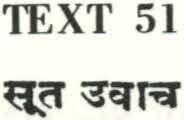

Text 51] Bhagavatam is the Answer 609
� �t W �t*4rit(lf!M: 1 m� � �: !(�·�•«�: 11'-\�11
Srimad-Bhagavatam
siitauviica riijiiii pan1.§itiiPr§to yadavocanmahii-mun* tadvo 'bhidhiisyeS!flula riijiia� prasniinusiirata�

srisiita�uviica-Sri Suta Gosvami replied;riijii.ii-by the King; pan1r.§itiiby Parik�it; pr§t�-as asked; yat- what; avoc at-spoke; mahii-mun0-the great sage;tat-that very thing;va�-unto you; abhidhiisye-1 shall explain; snwta- please hear; riijn�-by the King; prasna- question ; anusiirata� m accordance with.
TRANSLATION
Sri Suta Gosviimi explained: I shall now explain to you the very subjects which were explained by the great sage in answer to King Pari�it's inquiries. Please hear them attentively.
PURPORT
Any question that is put forward may be answered by quoting the authority, and that satisfies the saner section. That is the system even in the law court. The best lawyer gives evidence from the pastjudgement of the court without taking much trouble to establish his case. This is called the paramparii system, and learned authorities follow it without manufacturing rubbish interpretations.
zsvara�parama�kr§[la�sac-cid-iinanda-vigraha�
aniidiriidirgovinda�sarva-kiira[la-kiira[lam
Let us all obey the Supreme Lord whose hand is in everything, without exception.
Thus ends the Bhaktivedanta purports of the Second Canto, Tenth Chapter, ofthe Srimad-Bhagavatam, entitled "BhiigavatamistheAnswer."
END OF THE SECOND CANTO
610
[Canto 2, Ch. 10


 OTHER
OTHER










 His Divine Grace
A.C. Bhaktivedanta Swami Prabhupada
His Divine Grace
A.C. Bhaktivedanta Swami Prabhupada

 Plate 1 The Lord assumed the gigantic form of a boar and fought with the demon HiraQyiik�a. (p. 338)
Plate 1 The Lord assumed the gigantic form of a boar and fought with the demon HiraQyiik�a. (p. 338)

 Plate 2 Dhruva Maharaja is benedicted by the Personality of Godhead. (p. 350)
Plate 2 Dhruva Maharaja is benedicted by the Personality of Godhead. (p. 350)



 Plate 4 The Personality of Godhead Narasinihadeva killed the demon Hiral)yakasipu by piercing him with His nails. (p. 359)
Plate 4 The Personality of Godhead Narasinihadeva killed the demon Hiral)yakasipu by piercing him with His nails. (p. 359)

 Plate 5 After hearing the elephant's plea, the Lord cut the mouth of the crocodile to save the elephant. (p. 364)
Plate 5 After hearing the elephant's plea, the Lord cut the mouth of the crocodile to save the elephant. (p. 364)

 Plate6 Bali
(p. 366}
Plate6 Bali
(p. 366}

 Plate 7 Lord Ramacandra appeared along with His eternal consort Sfta, brother Lak�maQa and servant Hanuman. (p. 375)
Plate 7 Lord Ramacandra appeared along with His eternal consort Sfta, brother Lak�maQa and servant Hanuman. (p. 375)



 Plate 9 The Lord sucked the breast of the Putana witch along with her life air, and the demon's gigantic body fell down. (p. 383)
Plate 9 The Lord sucked the breast of the Putana witch along with her life air, and the demon's gigantic body fell down. (p. 383)

 Plate 10 At the age of three months, Lord Kmta killed the Sakatasura demon, who had remained hldden behind a cart. (p. 383)
Plate 10 At the age of three months, Lord Kmta killed the Sakatasura demon, who had remained hldden behind a cart. (p. 383)

 Plate 11 A demon of the name Sarikhaclic;!a tried to kidnap Kr�t;�a's cowherd damsels. (p. 391)
Plate 11 A demon of the name Sarikhaclic;!a tried to kidnap Kr�t;�a's cowherd damsels. (p. 391)

 Plate 12
At the end of Kali-yuga the Lord appeared as the supreme chastiser. (p. 397)
Plate 12
At the end of Kali-yuga the Lord appeared as the supreme chastiser. (p. 397)



























































































































































































































































































































































































